
| Homepage > The Work of the Assembly > Committees > Social Development > Reports | |||||||||||||||||||||||||||||||||||||||||||||||||||||||||||||||||||||||||||||||||||||||||||||||||||||||||||||||||||||||||||||||||||||||||||||||||||||||||
|
|||||||||||||||||||||||||||||||||||||||||||||||||||||||||||||||||||||||||||||||||||||||||||||||||||||||||||||||||||||||||||||||||||||||||||||||||||||||||
Mr John McCallister MLA |
Ulster Unionist Party |
1. The Chairperson (Mr Hamilton): The Committee will receive a briefing from John McCallister on his proposed private Member's Bill on caravans. John is joined by Annette Holden. I was going to say that speaking to a Committee was a new experience for John, but he has already spoken to the Committee for Enterprise, Trade and Investment about this issue. However, it is, possibly, a surreal experience for him.
2. Mr John McCallister: It is slightly strange to be sitting at this end of the table.
3. Mr F McCann: You had him at the other side of the Chamber as well.
4. The Chairperson: I will try to be gentle with him. [Laughter.]
5. Mr McCallister: That is encouraging. [Laughter.]
6. The Chairperson: The members' packs include a cover note from the Committee Clerk; a copy of John's briefing paper; some correspondence from John dated 2 October 2009; a copy of a memo from the Committee for Enterprise, Trade and Investment dated December 2009; and copies of correspondence from representatives of various holiday parks, including the British Holiday and Home Parks Association (BH&HPA). I remind everyone that this session is being covered by Hansard. Mr McCallister will make a presentation, which will be followed by members' questions.
7. Mr McCallister: Thank you for the opportunity to speak to the Committee. The only legislation pertaining to caravans in Northern Ireland is the Caravans Act (Northern Ireland) 1963, which is concerned with land that is used as caravan sites and licensing by district councils. It does not address issues such as rights of tenure or agreements between holiday caravan owners and site owners and it does not provide any security of tenure or for agreements for those in residential caravans. Such areas are unprotected by the law.
8. The definition of a caravan in the rest of the UK is not the same as that provided in the 1963 Act, in which the dimensions are not stipulated but are determined indirectly for reference to motor vehicle legislation. The definition of a caravan in Northern Ireland relates to a motor vehicle, as transported, on a road. The Bill will include a definition of a caravan. For the purpose of the Bill, the definition of a caravan will include mobile homes, and a specific British standard must be met.
9. The Bill will also give the Minister of the Environment the power to change those dimensions. That will provide flexibility, in the event that the dimensions need to be looked at over time.
10. In England, Wales and Scotland, those who reside in park home caravans are protected under the Mobile Homes Act 1983, which was amended by the Housing (Scotland) Act 2006. If that Act were to be extended to Northern Ireland, it would provide such residents with significant rights of tenancy. However, there is no platform to extend the 1983 Act here. My colleague Lady Hermon, in North Down, looked at extending it before devolution, but there is no way of doing that now. As the Caravans (Northern Ireland) Act 1963 relates to licensing and the use of land, Assembly legislation is required. That is why, after much research, we proposed a private Member's Bill.
11. The proposed Bill is designed to afford protection to two groups of caravan users: those who use static caravans that are permanently based on caravan sites for holiday use; and those in the so-called park home, for whom a caravan is their only residence. The Bill would also bring the definition of a caravan into line with the rest of the UK.
12. In the Bill, static caravans will be referred to as those on seasonal sites. I included static holiday caravans under the umbrella of the Bill after a lot of research and consultation, because it revealed a distinct lack of offers of written agreements for holiday caravan purchasers and, subsequently, the potential for unfair treatment with some terms that were being stated by site owners.
13. A survey of park owners and users of the local holiday static caravan sites to assess fairness in trading practices, consumer contracts and park rules highlighted the need for guidance on issues about caravan ownership as it was evident that caravan owners and many park owners were unsure about their rights and obligations. Such issues that give rise to complaints include trade-in prices and the enforced upgrade of a caravan after a certain time. Furthermore, caravan owners often find it difficult to resolve those issues with the site owners in the absence of a written contract and, even if there is a written contract, such important terms have been omitted.
14. The safeguards that are available to caravan owners in Northern Ireland appear to be those that are offered by the Trading Standards Service section of the Department of Enterprise, Trade and Investment (DETI). It has published a booklet on caravan holiday homes, which contains the questions that people should ask. The booklet also contains information and contacts for caravan owners should something go wrong and emphasises the importance of conducting good research. The Trading Standards Service has received an average of 75 to 80 complaints a year from caravan owners over the past eight or nine years.
15. DETI's guidelines for holiday caravan owners emphasise that, although an individual may own a caravan, he or she does not own the land on which it is pitched. There is also no legal right to sell a caravan on its existing pitch to another party. Through one deal, a park owner will often include the purchase of a caravan and grant an individual a licence or permission to use that holiday caravan in accordance with park rules.
16. Park homes will be referred to in the draft Bill as "protected sites", and the Committee will probably be most interested in those provisions of the draft Bill. Park homes have been in existence in Great Britain for some time, but that housing option is relatively new to Northern Ireland. Such sites probably date back only six or seven years and there are only two recognised developments here. When holiday homes in those developments are purchased, the owners enter into private agreements with the landowners to have the home sited on the park and, because housing law deals only with tenure rights in the rented sector, those occupying caravans as their main residence are regarded as home owners, and those sites fall outside that protection. Park homes are becoming an increasingly popular lifestyle choice for retired people who have released some equity from their houses and wish to move into cheaper and secure communities.
17. The Mobile Homes Act 1983, as amended, excludes static holiday caravans and makes provision for written agreements, which include the names and addresses of parties, dates of commencement and various other aspects that would be expected to be found in an agreement. It also requires that the particulars of the land on which the occupier is entitled to station the caravan and whether the pitch is sufficient are set out. The implied terms of the Act cannot be changed without an Order that is passed both the Houses of Parliament.
18. Written agreements are legally binding on and take effect for the benefit of any successor in title of the owner. The resident is entitled to terminate the agreement by giving the site owner notice in writing not less than four weeks before the date on which the termination is to take effect. Site owners are subject to conditions before they can terminate written agreements. If a resident breaches a term of the agreement, the site owner must serve a notice to remedy that breach within a reasonable time frame and, if the resident fails to comply with that notice, the site owner must apply to the courts to terminate the agreement.
19. More protection is afforded to the tenant in the Act, because it is their primary residence. The implied terms that may be contained in a written agreement could include the right for residents to quiet enjoyment of their caravan; the sums payable; the review at yearly intervals of the sums payable; and the preservation of the amenity of the residential site. Written agreements contain all the needed particulars and allow residents and site owners to know their rights and responsibilities. They are legally binding contracts, and caravan owners and site owners are protected by them.
20. The current safeguards for the kind of contracts for static holiday caravans are dependent on the Unfair Terms in Consumer Contracts Regulations 1999. The advice given by the Office of Fair Trading (OFT) is that a term is likely to be considered unfair if:
"it causes significant imbalance in the parties' rights and obligations under the contract, to the detriment of consumers."
21. The OFT has also published guidance on unfair terms in holiday caravan agreements, which apply across the UK. That was prepared in light of complaints about the standard of conditions that were unfair and unclear. The guidance followed a voluntary code of practice that was approved by the OFT, which arose from a complaint to the then Monopolies and Mergers Commission about holiday caravan sites in Northern Ireland. The OFT subsequently agreed a voluntary code of practice with the National Caravan Council (NCC) and the BH&HPA. We seem to love such abbreviations in government. They are two recognised trade bodies for the industry and they jointly promoted a model contract. It should be noted that the title suggests that the code of practice was voluntary, and therefore site owners are not obliged to use it.
22. During the consultation, we highlighted the inadequacies of the code. At best guess, we have around 13,500 occupied holiday caravan pitches in Northern Ireland. Around 4,000 of those pitches are occupied through written agreements, which is less than 30%. Even though a great many of the parks in Northern Ireland are members of the two trade organisations, that has a very worrying effect in protecting those owning a holiday caravan.
23. In January 2008, the BH&HPA and the NCC agreed with the OFT to offer fairer terms and conditions. However, some site owners are still using terms and conditions that would be considered unfair by the OFT. Some unfair terms include, for example, relocating holiday caravans to a less favourable pitch; fees paid in advance that are not refundable should the holiday caravan owner terminate the agreement; prohibiting the sale of caravans by their owners on the caravan site; and allowing the site owner to retain excessive sums as compensation when the caravan owner cancels the sale contract.
24. In summary, the key to protection is clear and transparent terms. Where a contract is challenged as being unfair or indeed breached, parties to the contract who have issue with the term or breach must be able to seek redress. They can do so only if effective legislation is in place. A statutory requirement for written agreements to include expressed and implied minimum terms will provide the necessary mechanisms to prevent abuse from either party to the contract and provide the necessary protection to the most vulnerable caravan owners in Northern Ireland, namely, people whose only home is their residential caravan. They must be afforded that protection.
25. I place on record my gratitude to Minister Foster and Minister Poots. I am grateful for their assistance in briefing, drafting and getting to the point of what would be achievable in the Bill. I also want to put on record a sincere thank you to Minister Margaret Ritchie and her departmental officials, particularly Stephen Martin, who helped guide the document from an initial draft Bill. They took the Bill through a process of what they called "Northern Ireland-ising" it. I am not sure whether Hansard can translate that. I am very grateful for their support and yours, Chairperson, for your comments to me publicly and privately.
26. The Chairperson: Thank you, John. You highlighted a lot of the issues, particularly that of park homes, which is a fairly new phenomena in Northern Ireland. There are certainly significant gaps in the law that must be adequately addressed to protect people in park homes. We have all seen examples, and I know of places not too far away from where I live where people have been shabbily treated. There is clearly a need to do something.
27. There was some concern, particularly from within the caravanning industry, which is a significant industry in Northern Ireland, about the extent of the proposed Bill. Given that you made some changes to it, will you make it absolutely clear — you made some reference to this already — that the proposed Bill refers only to park homes and static caravans, not touring caravans or motor homes?
28. Mr McCallister: I fully accept your remarks about park homes, and your constituency is one of the areas in which such homes are based. At no time, during either the drafting of the Bill or the process, did we ever want or try to include touring caravans or motor homes, because it did not make sense to do so. If owners of touring caravans or motor homes wish to stop somewhere overnight, but do not like the site or the terms that are on offer or if there is a fall-out with the site owner, they can hook on and leave. There is no issue with doing that, so there was no need to include those types of owners in the Bill.
29. I think that some of the industry has latched onto the way in which the proposed legislation is written. The definition of a caravan, obviously, includes touring caravans, but the use and absence of written agreements for those types of caravans mean that they will be exempt from the legislation. Therefore, at no time, did we plan or want to include them in the Bill, and we made that quite clear to the industry on numerous occasions.
30. The Chairperson: It was important that be made absolutely clear for your benefit, that of the Committee and the people who raised those concerns.
31. Mr F McCann: I have a couple of comments. I commend John for the work that he has put into the proposed Bill. I know many caravan owners who have been badly treated by site owners over many years. John raised a number of the issues that they raised, not least the resale of caravans on sites. Some of the caravan owners who sold their caravans without going through the site owner were, consequently, put off the site. Other caravan owners, after selling their caravans, saw a huge reduction in the amount that they initially paid for their caravans. Protections are, therefore, needed for those owners.
32. Many families who use caravan sites for all or part of the summer believe that they are being overcharged for amenities. Other caravan owners have said that there are a number of sites where they have paid money for few or no amenities and that they have, therefore, been overcharged. I welcome the fact that John is pushing for the inclusion of protections in the Bill for people in those circumstances. I offer you my support.
33. Mr McCallister: Thank you very much for those remarks. Those were the types of issues that kicked-off this process. Annette asked initially why more Members do not propose private Members' Bills. Two years and two months on, I have worked out the reason for that: a serious amount of work has gone into the proposed Bill.
34. We are basing most of the protection on a contract. I know that that might not solve every ill, but at least it will mean that caravan owners know what they have signed up to and what has been agreed with the site owner. Those are the protections that contracts afford. The Trading Standards Service and Minister Foster are confident that that will give them the teeth to pursue some of the issues that Fra raised.
35. The Chairperson: Fra mentioned the selling of caravans. Will the Bill include provision for setting an upper limit of 10% on commission on the sale of caravans?
36. Mr McCallister: Only on the permanent residential sector will there be an upper limit. We used the English model when deciding that.
37. The Chairperson: Will that apply to park homes as opposed to static caravans?
38. Mr McCallister: Yes. The contract will state the conditions. Having worked with our caravan industry, we recognise that it does not survive on pitch fees alone; it requires money from sales. We looked at capping commissions at 10%. NCC and BH&HPA issued an industry guideline of 15% commission, and I would like that to be written into contracts. In fact, the Trading Standards Service should specify that customers should look for such provision when signing contracts.
39. The Chairperson: That is not a matter for the legislation.
40. Mr McCallister: Exactly. We recognise that the industry needs such a provision; however, we also want consumers to be aware that there is an industry guide on the issue. We have come across examples of people charging 40% or 50% commission. I could buy a caravan off Fra, for example, for £6,000 and sell it to Thomas for £12, 000.
41. The Chairperson: You have had your eye wiped, Thomas. [Laughter.]
42. Mr McCallister: Those are the sort of issues that the Bill will address. People have the right to sell their caravans to anyone they want; however, there can be difficulties because they do not own the pitch. The industry and caravan owners want a site owner to have control over who comes on to a pitch. Most caravan holidays are about quiet family enjoyment; people will not want to be beside a caravan that is the venue for stag parties every weekend. That is why control is needed. However, that control should not be abused.
43. Mr Burns: I welcome John to the Committee. I agree that practices in the caravan industry need to be updated. You mentioned the definition of a mobile home, a motor home and a caravan. It seems that many more people are buying motor homes, which, even though the owner may park them on a pitch, are still moveable and still belong to the owner. Mobile homes, however, are a permanent fixture, and I understand people's desire to stay in them for the whole summer. Being residents, they want more rights. As you said, they will not want to be parked beside a caravan whose owners party continually. There can be an issue if the owners of a site do not control such behaviour.
44. Antrim has a popular facility for motor homes and touring caravans. However, it is being taken over by motor homes; they occupy a pitch and get connected to the electricity and the showers and washing facilities. There are no big problems. However, no one tries to pretend that they are permanent residents or that they will be there for more than a couple of weeks. There is a clear distinction between motor homes and a residential caravan, by which I mean a permanent structure. You gave an example of you buying a caravan off Fra and selling it to me. However, that would not be moved off site. Once it is in place, it stays in position, if you know what I mean. After 10 years or so, when those people have gone, all those caravans and mobile homes could be completely refurbished. The owner could get new ones in, which will belong to the site, rather than to the people living in them.
45. Mr McCallister: Over the course of the discussion, I three different products were referred to. Touring caravans and motor homes, which, for example, are hooked up for a couple of weeks, will be excluded from the Bill. There is no need to give people who own such vehicles a contract. If they do not like the services they get in Antrim, for example, they will vote with their feet and go where all holidaying should be done, which is in south Down. It is the same as staying in a hotel. If you do not like it, you can move out.
46. Secondly, there is the static holiday site. In those, someone may own the caravan but not the pitch. The caravan can be removed and someone has the right to move it to a different site.
47. Thirdly, there is the permanent residential sector. As the Chairman said, on a holiday site, people could stay for the entire summer, but a permanent site is their primary residence. People living on such sites need a significant level of protection. If they lose their permanent site, they are homeless. That is different to holiday homes, and people living as permanent residents need such protection. Permanent residents on such sites may own the structure, but not the land on which it is on. Part of the contract will relate to the amenities and how they are kept. The contract gives huge protection to those in a permanent setting.
48. For those hooking into the electric supply for two weeks, it should not be a problem because they do not stay long enough to need a contract. We should not interfere with that sort of free-flowing business.
49. Minister Foster made clear that better regulation should not mean burdening people. We are trying to bring clarity and transparency to the situation; we do not want to over-regulate and kill the industry.
50. Mr Armstrong: I am concerned about park homes, which are like wee bungalows. Then there is the other type of mobile residence, which has wheels and can be moved more easily. What rights are involved in moving them? Who can move them, and where can they be moved to? I understand that the resident may own the structure, but not the land that it is on. Who does the resident go to for permission to move it? Can residents move them themselves, or do they have to go to the person who owns the land to move it? How does that work?
51. Mr McCallister: I hoped that my party colleague might ask me an easy question. The answer to the question is that a mobile residence can be moved.
52. However, it would require a person who is qualified to disconnect the gas and electricity supplies. The rights that you talked about also extend to preventing site owners abusing their positions by having their people do all the work. If the caravan owner has a fault in their caravan, they could get a suitably qualified and accredited person to do the work. That extra right would extend to caravan owners, because there may be a suspicion that site owners could ratchet up prices.
53. To use Mr Armstrong's example, a caravan owner is free to terminate the contract in a park or permanent home provided that the required arrangements are made to remove the caravan and that 28 days notice is given. After that time, the mobile home must be gone from the site. The same would apply to the holiday sector. I suppose not everyone undertakes that work themselves, because they need to use qualified people and have access to transport that meets the legal requirements. However, caravan owners are free to do that.
54. Mr Armstrong: Therefore, does that mean that a caravan owner does not need a landowner to move a caravan off a site?
55. Mr McCallister: Yes, but the move would have to be co-ordinated with the landowner, and, if the contract were terminated early, the caravan owner might be liable. However, the contract would clarify those responsibilities. Of course, the caravan owner would have to adhere to all health and safety guidelines. It could be easier to have the site owners move caravans, because they would know most of those guidelines. However, apart from adhering to health and safety guidelines, there would be nothing to stop a caravan owner moving them.
56. Ms Lo: I join Fra McCann in commending John for proposing the legislation. Members get a lot of criticism for not passing enough legislation, so good on you. If a gap in protection for consumers exists, it is important to increase their rights.
57. I am ignorant about the issue, so, I ask you to excuse the simplicity of my questions. You said that site owners are entitled to 10% commission on the resale of caravans. Why is that? Do they not also get rent?
58. Mr McCallister: Site owners are entitled to 10% commission on the permanent residential caravans. I accept that justifying that figure is not always an easy sell, but it came from the equivalent legislation in England. Extensive research in 2005 led to the House of Commons producing the 10% figure. The Commons considered reducing the figure to 7·5% but felt that 10% was fair.
59. It comes back to the point that the site owner, who provides a service and a lifestyle, relies on a certain number of sales to keep pitch fees lower than they would otherwise be. That means that sales effectively subsidise pitch fees, even in the holiday sector, where it is not specified in law but should be in the written agreement. In fact, the industry guide for the holiday sector is 15% commission. That is connected to the fact that pitch fees in Northern Ireland are significantly lower than they are anywhere else.
60. In trying to work out the best way to proceed, we reviewed the possible models and considered whether it would be better to have no commission on sales but have higher pitch fees. We accepted the House of Commons recommendation of having 10% commission on the sale of permanent residential park homes. We also accepted that that should be in the contracts. It is up to the individual to negotiate what is in their contracts. We want strong guidance from DETI's Trading Standards Service on how that would be applied. I accept that that is a hard sell, because most people believe that there should be no commission, but landlords rely either on the money that that commission generates or on pitch fees. Rents would be significantly dearer if that commission were not applied. It is about balancing the two and being as fair as possible.
61. Ms Lo: The site owners do not have to do anything in any sale, so the 10% commission seems quite a lot to me.
62. Mr McCallister: Site owners are responsible for maintaining the amenity and providing services such as grass cutting, for example.
63. Ms Lo: That is what people pay rent for.
64. Mr McCallister: Yes. Those services would be included in the rent, but rents would be higher in parks that have a limited number of pitches. It is a question of market forces and demand. We went to an industry meeting at which we heard the views of people on the other side of the matter who felt that the 10% commission was unduly tough. Restricting that income would mean that pitch fees would increase dramatically.
65. Ms Lo: Should the current Private Tenancies (Northern Ireland) Order 2006 not cover the rent for residential park homes?
66. Mr McCallister: People can fall between two stools. A person pays rent for a residential park home that he or she owns. That is why we need this private Member's Bill — a caravan owner is technically a homeowner, and, therefore, falls outside the scope of the rented sector. The caravan owner is only renting the pitch, which is the land on which the caravan is stationed. That is why people fall between two stools.
67. Ms Lo: Should we not be thinking of legislation that will allow people to buy the pitch for a permanent residential caravan home?
68. Mr McCallister: The difficulty with that is the management of the site. Someone in business might say that they want permission to develop a piece of land that they own. That means that the person who develops the site will always own the land. The same situation might occur in housing developments, for example, where buying a site might lead to disputes over freehold. If the mobile home were twice the size of this room, for example, and were stationed on a site, who would decide how much land was owned and whether that included a garden around the home? Who would care for that garden if the caravan owner were to let it fall into disrepair? It is much neater if the ownership of the land is kept separate from the licensed use of the site. Given that a caravan owner does not own the land, they can move if they do not like the site. How would a landowner go about evicting a caravan owner if that person owned the land on which the caravan was pitched? There would be all sorts of issues about right of way and access, so it would be too hard to manage.
69. You hit the nail on the head when you talked about the need for the legislation. People fall between tenancy and the rented sector, and there is an issue of protection under the law. At the moment, no laws give the necessary protection.
70. The Chairperson: I have a couple of questions to ask about issues that you raised in your evidence. You said that there had been about 75 or 80 complaints to the Trading Standards Service over the past number of years. What percentage of those complaints was to do with what could be described as contractual issues? How many had nothing to do with contracts but were concerned with other grumbling complaints such as noisy neighbours and so on? Were the vast majority of problems to do with contracts?
71. Mr McCallister: Probably 90% to nearly 100% of the complaints are to do with contracts. We talked to Mr David Livingstone from the Trading Standards Service. He is on what could be described as a Northern Ireland industry forum. He came to meet residents' groups, and he made the point that most problems were contractual ones. The BH&HPA and the NCC, along with the OFT, have created a model contract. It is not as though its implementation will be a burden on the industry. Most of what is needed exists, but it is just not being done in enough places.
72. Many complaints are of a contractual nature; that is why we hope that when the private Member's Bill beds down, the majority of complaints would disappear simply because people would have the contracts in front of them in black and white. It is often the case that people think that they have agreed to two different things unless they see them in writing. I hope that the Bill will clarify many of those issues.
73. The Chairperson: From one perspective, 75 or 80 complaints a year is a lot. However, given the total number of caravans that exist, plus those that come in and out, that number is probably small enough.
74. Mr McCallister: It is a small number, given the size of the holiday consumer sector. However, having spoken to residents of several sites, we found that on some sites there was a level of what might be described as slight intimidation. People felt that if they complained, they would be viewed as troublemakers and would not get their site licence renewed the following year. We came across a number of people who made that clear. We want to have the protection that contracts bring so that both parties know what they have signed up to. The way that things are done at the moment is not an acceptable way of doing business. I stress that the vast majority of site owners run excellent facilities, and it is not fair to them to have to compete with people who do not adhere to best practice. We have been in every part of Northern Ireland and have spoken to industry representatives, to caravanners and to the Equality Commission.
75. The Committee may be interested to know that the Equality Commission was pleased that the Bill will in no way disadvantage the Travelling community and will include some provision for their sites, which are run mainly by the Housing Executive. If the Bill has not been amended already to include some of those sites, it will be.
76. The Chairperson: You said that the overwhelming majority of caravan park owners are good, sound and solid businessmen. You also said that, even though a model contract was available, less than 30% of caravan owners had written agreements. On the one hand, that seems low, but it shows that in more than a quarter of cases, site owners are entering into contracts with the caravan owners who rent pitches.
77. However, in some cases, caravan owners are not being offered the model contract, and you will, obviously, need to address that. In other cases, they have been offered it but have not bothered with it. Please correct me if I am wrong at any stage, but if, or when, the Bill goes through, would everyone need to have a contract in place by a certain time?
78. Mr McCallister: They would have to have a contract in place within six months.
79. The Chairperson: What consideration has been given to the cost impact that that would have on the industry and on caravan owners? One might say that site owners could get that cost through pitch fees. Given that less than 30% of caravan owners have contracts, something will have to be put in place fairly quickly for the remaining 70%. How much will that process cost both the average caravan owner and the total percentage of people who are currently without contracts?
80. Mr McCallister: I accept your points about the 25% to 30% who have contracts. We heard that some site owners were not offering contracts. However, we also heard that some caravan owners and holidaymakers who were offered a contract did not see the need for it, because they had a good relationship with their site owner and did not want to take the route of having a written contract. The point of the Bill is to make it clear that contracts are good for both parties, because they set out the terms of the relationship clearly and transparently. It is a win-win situation for both parties, because they both know what is being offered and what they are signing up to.
81. The cost of drawing up contracts will be minimal because a model contract to which the industry and OFT agreed already exists. Owners can simply ring up and get the contract sorted. Companies will have to pay an administration cost to get contracts up and running, but it must be remembered that all site owners, even those who do not operate on a contracts basis, issue annual site licences at this time of year. Contracts will actually remove the need to issue site licences and thereby replace them. An initial workload will be involved in getting everyone to buy in to that, but caravan owners and site owners will have no great difficulty in getting their hands on a contract. Once in place, contracts are easier to administer than site licences; after the first year they automatically roll over to the next. That will, therefore, reduce the workload of and the cost to businesses after the first year. I think that that is why Minister Foster supported the proposal; it provides a win-win situation without placing excessive costs on the industry.
82. If the Bill passes all the legislative Stages, it could be in place for the autumn. If the Bill were agreed at Second Stage, the decision as to how quickly it could pass Committee Stage would be in the Committee's hands. If the Bill passes Committee Stage, it would then be six months before it received Royal Assent and before we could implement any changes. Site owners in my constituency have already begun the process of drawing up contracts and getting into the routine of administering them. They are also trying to find way of getting their caravan owners to buy in to it and of addressing some of the teething problems that you mentioned. Therefore, there are signs that work is starting to happen on the ground in anticipation of the legislation. There has been fairly widespread support for the Bill from Ministers, the Executive and Committees. There is a strong possibility that we can get it through, providing that the Assembly is still here.
83. The Chairperson: I will do you a deal on your Bill, John.
84. Mr Armstrong: Is it right to say that the contracts are for one year?
85. Mr McCallister: The contracts for residential caravans are different to those for holiday caravans. Contracts for a new caravan or holiday caravans might be set for 10 or 15 years. However, contracts for residential caravans roll on; that is a one-off contract.
86. Mr Armstrong: Are services in holiday caravans cut off in the winter months?
87. Mr McCallister: Yes.
88. Mr Armstrong: That is normal. Services in the park homes, however, are provided for 365 days a year.
89. Mr McCallister: The products are different. The services in park homes are available all the time. The contracts for holiday caravans state the length of time that services will be provided. In Northern Ireland, St Patrick's Day roughly marks the beginning of the holiday period for the seasonal sites and late October or the Halloween weekend marks the end. Occupation is accepted during that period. We do not want people abusing the system. We want councils to have the power to issue the appropriate licences to the site. Therefore, nobody should be living the year round on a holiday site, because those caravans are not made for such living. Living in that way would lead to health problems, because those caravans are designed for holiday use; they are not built to the same standard as mobile homes.
90. Contracts for mobile homes, in which people permanently reside, state that services will run continuously. Those people have stronger protection, because the mobile home is their permanent home.
91. Ms Annette Holden (Ulster Unionist Party): There are two site licences. The site licence that the council issues for a residential park is completely different to the site licence for a holiday park. It authorises occupancy and use of the caravan for a specific period only, and that is why the services are cut off for the holiday park.
92. Mr Armstrong: We do not have many of them in Mid Ulster.
93. The Chairperson: The people there do not know what they are missing.
94. Mr McCallister: There are not many in that area. However, some parks have developed over the years. We want the two definitions and licences, so that no one can abuse a licence that the council granted for the holiday sector to the extent that they are, in fact, living on the site. The product that an individual buys in the holiday sector is not designed for cold weather such as that endured this winter.
95. Ms Lo: Perhaps it would be useful for the site owners to think about including an antisocial behaviour clause in their contracts. A lot of private landlords here are saying that such clauses should be in their contracts so that tenants could be evicted if necessary.
96. Mr McCallister: The agreements include antisocial clauses already. The agreements for the permanent residential sector state that neighbours of the individual concerned have the right to live and enjoy life free from harassment. When signing up to a contract in the holiday sector, individuals will see the code of conduct that they are expected to follow and the standard to which they are expected to adhere. If the individual breaches those rules, the site owner has the legitimate right to say that the individual did something on a particular date. The individual might get a warning or be evicted from the site. The inclusion of such clauses in contracts gives other owners and neighbours of the individual the freedom to enjoy life free from harassment. It is key that everyone is free from harassment, whether they are in their permanent homes or on holiday.
97. The Chairperson: Thank you very much, John. That is very useful, and I hope that it has cleared up members' concerns about some previous evidence that we received. What sort of timetable do you have in mind for the Bill? When will the Bill be introduced to the House?
98. Mr McCallister: We are at the stage of the developing the explanatory and financial memorandum. Thereafter, because of the fines that exist for the residential sector, we must send a letter to the Secretary of State to get consent on the fines issue, after which the Speaker will review it. That should be finished in the next couple of weeks. If the First Stage does not happen before Easter recess, we anticipate that it will happen pretty much immediately after Easter. The Second Stage could be a month after that, and, when that hurdle is cleared, the Committee can have the Bill for a number of weeks.
99. The Chairperson: It is like a caravan being moved around.
100. Mr McCallister: It depends on how much time the Committee takes to scrutinise the Bill; it may need longer than the normal six weeks. However, that is the time frame that we are hoping for. We hope that the Bill has reached Committee Stage by early or mid-May.
101. The Chairperson: I think that you are saying that it will fall into the summer recess.
102. John and Annette, thank you very much for your time. That session has been useful and helpful, and, as Anna said, the legislation that is proceeding at the minute does not receive enough praise. I encourage you to continue what you are doing, and I wish you all the best with it. We will meet to discuss the matter again soon.
103. Mr McCallister: Thank you, Chairman and members. If the Committee thinks that it would be useful, I am more than happy to come back during the scrutiny stage or at any time.
Members present for all or part of the proceedings:
Mr Simon Hamilton (Chairperson)
Ms Carál Ní Chuilín (Deputy Chairperson)
Mr Billy Armstrong
Mrs Mary Bradley
Mr Mickey Brady
Mr Jonathan Craig
Mr Alex Easton
Mr David Hilditch
Ms Anna Lo
Witnesses:
Mr Stephen Martin |
Department for Social Development |
|
Mr Daniel Holder |
Northern Ireland Human Rights Commission |
104. The Chairperson (Mr Hamilton): I welcome Mr Michael Sands, deputy director of the housing division in the Department for Social Development (DSD), and Mr Stephen Martin, who is also from the housing division. I remind members about mobile phones. The session is being recorded by Hansard. I invite the officials to make a brief statement on the Bill, after which members will have an opportunity to ask questions. Perhaps, if it is convenient or appropriate, I will take questions as we go through your statement rather than bundling them up at the end.
105. Mr Michael Sands (Department for Social Development): I was going to suggest that, Chairperson. Thank you for the invitation to brief the Committee on the Caravans Bill. I will make some short introductory remarks on the Bill's origins and the Department's role, after which I will give a brief overview of the Bill's contents. If the Committee so wishes, Mr Martin will give members a more detailed explanation of the Bill's clauses and schedule.
106. The Department became involved in the Caravans Bill in November 2009 when the then Minister for Social Development, Margaret Ritchie, met John McCallister, the Bill's sponsor, to discuss its first draft. Incidentally, I believe that this is the first private Member's Bill to secure Assembly support. At that meeting, Ms Ritchie expressed support for the principles of the Bill, but raised a number of concerns about some of the detail of that first draft. Margaret Ritchie proposed a pragmatic way forward, based on practice at Westminster, whereby the Department would work with Mr McCallister and others to redraft the Bill in a more amenable format, based heavily on existing park home legislation in Great Britain.
107. Having secured the support of other Ministers for that approach, the Department has worked since January with Mr McCallister, the Department of Enterprise, Trade and Investment (DETI), the Department of the Environment (DOE) and the Office of the Legislative Counsel to produce the Caravans Bill, which Mr McCallister introduced in the Assembly on 26 April 2010.
108. Parts 1, 3 and 4 of the Bill echo existing legislation that was in place for England as of December 2009. Part 2, which deals with the holiday caravan sector, is unique to Northern Ireland; there is no similar legislation anywhere else in the UK. DSD's main interest in the Bill relates to Parts 1 and 3, which provide protection for those who live in residential caravans, often referred to as park homes, as their main or only home.
109. We understand that there are currently four park home sites in Northern Ireland, containing a total of 300 park homes. Although that number is far lower than that for the rest of the UK, where there are an estimated 200,000 park homes, there is some evidence that interest in park homes is growing, particularly among older people looking to downsize as they move towards retirement. The Bill will do much to offer such people security of tenure, prevent sharp practice and boost confidence in a well-managed park homes sector.
110. Park homes sites are known as protected sites in the Bill. Those are sites for which planning permission or a council site licence has been granted for year-round use and does not limit the site to holiday use only. Sites provided by the Housing Executive for Travellers are also protected sites. Part 3 of the Bill will also protect those living on all Travellers' sites from illegal evictions and harassment. Part 1 of the Bill will cover Travellers who live in semi-settled accommodation on serviced sites, which is similar to park homes, but by virtue of clause 1, it does not cover Travellers who live on the more temporary transit and halting sites.
111. Part 2 of the Bill relates to the holiday caravans sector, which is the policy responsibility of the Department of Enterprise, Trade and Investment. At present, there is a considerable body of consumer protection law that covers the holiday sector; however, it can be difficult to enforce, as many caravan owners do not have written agreements with site owners. Part 2 addresses that gap by requiring written agreements to be in place between site owners and caravan owners.
112. Part 4 of the Bill relates to the definition of a caravan, which is the policy responsibility of the Department of the Environment. It addresses an important area of ambiguity by updating the definition of a caravan, thus creating parity with the current statutory definition that is in place in Great Britain.
113. Part 5 of the Bill will bring it into operation six months after it receives Royal Assent. On the basis of the current timetable, that is likely to be around November 2011. Following Royal Assent, the Department will focus on providing guidance to the park homes sector as it looks to comply with Part 1 in particular. It will also focus on monitoring the effectiveness of Parts 1 and 3.
114. That concludes my opening remarks. We are happy to take any questions at this point, or Stephen can provide the Committee with a more detailed description of the Bill.
115. The Chairperson: A more detailed explanation might be more useful in guiding the Committee through the Bill. It will also allow members to frame their questions. Perhaps Stephen could go through each Part of the Bill, following which members can ask questions and any general issues can be discussed at the end.
116. Mr Stephen Martin (Department for Social Development): Initially, I will focus on Parts 1 and 3 and the schedule, as those are the parts of the Bill relevant to DSD. As Michael said, Part 2 primarily applies to DETI and Part 4 applies to DOE.
117. The purpose of Part 1 and the associated schedule is to provide security of tenure to park home owners, who live on one site year-round. In the Bill, their homes are called residential caravans. Other terms for them include park homes and mobile homes, but they all refer to the same thing. As Michael said, Part 1 is closely based on the Mobile Homes Act 1983 as amended and as it applies in England.
118. Some key terms are set out in clause 1 and it is important to pause to consider those terms, so that the Committee knows to whom Part 1 applies. As Michael said, one of the key terms is that of a "protected" site. Those sites are not limited, either by planning permission or a council site licence, to holiday use only, and can remain open year-round. From the estimates that the Department has received from DOE, we believe that there are four such sites in Northern Ireland.
119. Committee members will also note that clause 1 uses the term "exceeding 3 months", which will allow people who own their caravan to station it on a protected site for more than three months. That provision is included to ensure that sites used for temporary accommodation are not brought within the provisions of Part 1, and it primarily relates to Travellers. There are three types of Traveller sites in Northern Ireland: serviced sites, which are analogous to park homes in that they provide semi-settled accommodation on a fairly permanent basis; and transit sites and halting sites, which provide temporary accommodation, are designed to support the desire of many Travellers for a nomadic lifestyle and can be used for up to three months. Those sites are normally granted a licence to occupy for no more than three months.
120. The intention of that provision is to ensure that the serviced sites, which are akin to park home sites, enjoy the protections of Part 1 of the Bill, while the more temporary sites, which are very different to park home sites and in which security of tenure is not an issue, are excluded. To include the temporary sites would mean frustrating the very purpose of those sites. Offering security of tenure would involve blocking up those sites, meaning that Travellers would not be able to enjoy a nomadic lifestyle.
121. I know that the Committee will later receive a briefing on the Bill from the Human Rights Commission. The Department believes that the Bill is compliant with the European Convention on Human Rights as it offers comparable treatment. As it stands, the Mobile Homes Act 1983 in England is seen to be in breach of the convention, as it excludes sites provided for Travellers from the protected sites definition. The Caravans Bill, particularly with its provision to offer comparable treatment for Travellers in serviced sites with others in park homes, is within the spirit and the letter of the convention and is, therefore, human rights compliant. However, the Committee may wish to explore that issue further with the Human Rights Commission. As Michael said, Part 3 of the Bill, which deals with illegal eviction and harassment, relates to all Traveller and protected sites. I will talk about Part 3 in a little more detail later.
122. The Chairperson: Alex, you indicated that you want to ask a question. Is it relevant to Part 1 of the Bill?
123. Mr Easton: I am unsure whether it is relevant.
124. The Chairperson: Throw it out anyway.
125. Mr Easton: Under the Bill, the landlords, as it were, of people living in park homes will be forced to ensure that there is a contract and that residents are allowed to stay for a certain number of years. Is there any stipulation on the length of contracts?
126. Mr Martin: That detail is in the schedule to the Bill. Paragraphs 1 to 7 of Part 1 of the schedule deal with the length of residential contracts. In simple terms, if the site owner has ownership of the land, indefinite planning permission and an indefinite site licence, the de facto position is that the contract lasts ad infinitum unless it is ended in one of two ways: either the caravan owner wants to end it and gives four weeks' notice to that effect; or the site owner can end it by going to court. There are certain grounds on which it can be ended. Those are set out in paragraphs 4, 5 and 6 of Part 1 of the schedule.
127. Mr Easton: Pensioners could move into park homes believing that they will be there until the end of their days, and sign a 10-year agreement. Under the Bill, could the caravan site owner give them three or four weeks' written notice to get off the site?
128. Mr Martin: No, not at all. If there are planning conditions on the site that mean that it has planning permission for, say, 20 years, the duration of an agreement cannot go beyond that period. However, if planning permission and the site licence are indefinite, the duration of an agreement is indefinite. A site owner can only evict someone from the site by going to court and obtaining a court order, and they can do that only by proving that it is reasonable to do so.
129. Mr Easton: Are you saying that if a site is designated for 20 years and someone has an agreement, he or she can stay on the site for 20 years?
130. Mr Martin: Yes.
131. Mr Easton: A problem that I became aware of at Seahaven in Groomsport involved the landlord telling people that their caravans were not up to the same standard as others and that, therefore, they would have to upgrade their caravans or leave the site. How do you protect vulnerable people in that scenario? There may be elderly people who believe that they are allowed to stay on a site because they have kept their caravans in excellent condition. However, because the landlord decides that he wants them to upgrade their caravans or get off the site, they have to either find the money for a new caravan or they are basically made homeless. How does the Bill protect those people from having to upgrade, especially when their caravans look good, are in good condition and there is no reason why they should be upgraded?
132. Mr Sands: Mr Easton will be aware that that issue was raised during the Assembly debate on the Bill. The Bill contains provisions for the sale of a caravan, including matters such as who it is sold to, so that a fair price is agreed.
133. Mr Martin: On the specific issue of repair, which, I believe, Mr Easton is talking about, paragraph 6 of Part 1 of the schedule is clear that a site owner can go to court. If a caravan has a detrimental effect on the site, the site owner can claim in court that that is reasonable grounds for terminating the agreement. However, it is also clear from Part 1 of the schedule that that does not mean that the caravan has to be replaced every so often. What is reasonable is a judgement for the court. It is clear that as long as the caravan owner keeps their caravan in good repair and abides by site rules, there is no obligation on them to change a caravan every so often in the residential sector. It would be for a court to deem what is reasonable with regard to the standard of the caravan if the site owner wants to end the agreement on the basis of a caravan being in a state of disrepair.
134. Mr Easton: Therefore, if a caravan has been on a site for 15 or 20 years and the site owner wants it to be upgraded, he cannot force the caravan owner to do that if the caravan is in good nick. Do you guarantee that?
135. Mr Martin: The Bill is very clear. Paragraph 8 of Part 1 of the schedule sets out provisions that relate to the sale of caravans and what must happen if that request or, in some instances, demand is made by the site owner.
136. Mr Easton: Well, that is reasonably good news. Hearing that make me feel happier about this.
137. I have one final point. One of the ways that landlords were able to force people to upgrade was to say that if they did not upgrade, they had to get off the site. One person could not take their caravan off a site because the landlord refused to let anyone on the site to take the caravan away and transport it to somewhere where it would be allowed to stay. Is there anything in the Bill that allows a person in such a situation to take his caravan off the site? What sort of protection is available?
138. Mr Martin: There is no provision for that. The Bill is heavily based on the Mobile Homes Act 1983 as it applies in England, as I indicated earlier. There is no provision in that Act for that scenario and we have made none in the Bill.
139. Mr Easton: Could we make provision for someone to take a caravan off a site if he wants to?
140. Mr Martin: It is difficult for me to give an immediate reaction to that. It is John McCallister's Bill, so we would have to talk to him about that. We can look at that issue.
141. Mr Easton: I am happy enough to leave it at that.
142. The Chairperson: We can investigate different points as we go through the Bill.
143. Mrs M Bradley: The issue that Alex has raised is one that I raised in the Chamber. The person on that site had to pay £150 to the owner of the site, who took the caravan only as far as the gate and the owner then had to pay extra money for another trailer to come along and take it further.
144. Another thing that has happened on a caravan site in Northern Ireland is that the site owner sold on and the person who took over the site changed the rules totally. What about the sale of sites? Will the seller be obliged to state that existing terms and conditions will still apply after the sale?
145. Mr Martin: There are two issues there. Part 1 of the Bill and the schedule relate to the residential caravan sector, not to the holiday sector. Some of the problems that were flagged up in the debate relate more to the holiday sector. The second issue is that the agreement cannot be changed. There is a written statement in clause 2 that needs to be provided in a certain form to the caravan owner when he buys a caravan or, when the Bill comes into operation, if an agreement already exists. The schedule sets out very clearly implied terms and, together, that is the agreement. That agreement cannot be changed except by mutual consent. The schedule will always apply. If a site is sold and a new owner takes over, the new owner will have to abide by the agreement that is already in place.
146. Mr Craig: That leads to another scenario. If there is an agreement between an occupier and a site owner and the occupier decides to sell his caravan, what protection has the person purchasing it? Does the purchaser have to enter into a new agreement with the site owner, or will the contract pass on?
147. Mr Martin: The agreement is basically assigned. The process allows the site owner an approval role. A caravan owner cannot just sell to anyone: he has to ask the site owner for approval of the person to whom he is selling. However, that cannot be unreasonably withheld. There is certain redress through court and so on. Once the caravan is sold, the agreement is assigned, so the person who buys the caravan takes on the agreement that the previous owner had with the site owner. Essentially, the agreement remains; the site owner cannot, for example, change terms.
148. Mr Craig: You said that a caravan owner needs the approval of the site owner. Are there enough protections in the Bill to stop people profiteering from that? Could a site owner impose charges, levy a fee or demand a percentage for that approval? Let us face it: these things happen.
149. Mr Martin: The only fee that can be levied is a standard 10% commission, which the site owner is entitled to on a sale, but there is nothing above and beyond that. As to the approvals process for an individual, a site owner cannot place conditions on it. The site owner must consider the person put forward and cannot unreasonably withhold consent. If the caravan owner does not like the site owner's decision, they can take them to court, and the court can make an adjudication. We feel that there are reasonable protections to avoid exploitation. That system has worked well in England for a considerable period.
150. Mr Sands: That protection is set out in paragraph 8(1) of Part 1 of the schedule. It states:
"The occupier shall be entitled to sell the caravan, and to assign the agreement".
151. The reference to 10% is in paragraph 8(9) of the schedule, which provides that the owner should be entitled to receive commission on a sale if it goes ahead. However, the overarching protection for the sale of caravans is included in 8(1), and that is the important bit.
152. The Chairperson: Before we go on, I remind everybody to switch off their mobile phones. I have been handed a yellow card by Hansard to say that phones have been interfering with the recording.
153. There are a lot of provisions in the Bill to protect unprotected sites. Who will do that protecting? I am thinking more about park home sites, because I imagine — correct me if I am wrong — that the Housing Executive will protect Traveller sites. However, who do you envisage will ensure that the protections for park homes are met?
154. Mr Martin: There are two levels. Primarily, it will happen through the courts. If a site owner acts unreasonably under the terms of the Bill — or the Act as it will become — the caravan owner can take them to court to enforce particular provisions. It is primarily a judicial matter.
155. The Department will have an oversight role to monitor the effectiveness and implementation of the Bill and, for that reason, we have created a power in clause 4 to amend the implied terms. The schedule sets out the terms that are to be implied in a residential agreement. Those are the inescapables, and they will automatically form part of an agreement. We have taken a power to amend that and will do so on the strength of case law from the courts. As people challenge decisions, we will be able to update the terms to reflect the court's judgment. However, it will be primarily a matter for litigation for the individual caravan owner.
156. The Chairperson: I understand that. Contracts are legal documents; therefore, that is the natural course of action. However, I feel that legal action should be the last resort. In some cases, it might be the only option, but I encourage people to avoid that because it is time-consuming, costly and can be stressful. Did you ever consider giving the Housing Executive or the local councils a role? I can envisage an issue with councils and council-owned sites. I know that that is not the situation with park homes at this stage, but who knows what could happen in the future? Did you ever consider giving a role to local government?
157. Mr Martin: As I said, we have broadly replicated existing legislation that has worked in England. We have changed some aspects for clarity but have not changed policy. One issue that has been brought to our attention is in relation to Part 3, which is about illegal eviction and harassment. That is quite similar to legislation for the private rented sector, namely the Rent (Northern Ireland) Order 1978. Under that Order, councils can take prosecutions on behalf of individuals who have been illegally evicted. There may be merit in giving district councils a role under Part 3, because that would be similar to their existing roles in the private sector. However, Part 1 is primarily to do with contracts and contract law and is, therefore, better dealt with in the courts. There may possibly be some merit in including that in Part 3.
158. Mr Craig: I want a wee bit of clarification. You mentioned paragraph 8(9) of the schedule, which states that the owner will receive 10% of the sale. Will you outline the reason behind that?
159. I am puzzled as to why the site owner should receive money if the owner of the property wants to sell it to someone else.
160. Mr Martin: There are two ways in which a park owner can cover his costs and make reasonable profit: pitch fees, which are essentially the annual rent for the piece of land; and the sale of caravans. That issue has been looked at twice by the Government in England, and there have been two reviews on the issue of commission and park economics. Following those reviews, the figure has remained at 10%. That is deemed to be a reasonable return that is needed to maintain the parks in an appropriate way and justify the investment for the individual. We have gone with that figure on that basis; there seems to be a fairly clear justification for it.
161. The Chairperson: When we were talking about protected sites earlier, we talked about park homes as if they were exclusively park homes. However, that is not necessarily always the case. Touring caravans can be kept on the same site. Are they protected by the Bill?
162. Mr Martin: Not in our view. If someone has a licence to occupy the protected site for longer than three months, and it is their only or main home, they will be covered. However, a touring caravan would not be classed as an only or main home.
163. The Chairperson: That is fine. Does anyone have any other questions before we move on?
164. Mr Sands: We are straying into parts that we are not supposed to cover.
165. The Chairperson: We are — like a caravan.
166. Mr Martin: If members are happy, we will move to clause 2. There has already been some discussion about agreements. One of the main purposes of the Bill is to ensure that there are fair, written agreements between site owners and residential caravan owners. Clause 2 sets out a requirement for a written statement to cover key issues, along with a power for the Department to add to the requirements for inclusion in that statement.
167. Essentially, the written statement required under clause 2 and part 1 of the schedule to the Bill, which is the implied terms, together form the residential contract. It is probably easier to think of it that way. There is a mechanism in clause 2 for the caravan owner to seek redress through the courts if a site owner does not provide a written statement setting out the relevant points within the appropriate time.
168. Mr Craig: How robust is the protection for the caravan owner if a site owner refuses to produce a written agreement? I would say that that is an issue on quite a number of sites.
169. Mr Martin: Clause 2 allows the caravan owner to take the site owner to court to enforce the requirement for a written agreement. The remedy to that problem is appropriate court action.
170. Mr Sands: That has been one of the main difficulties for caravan and site owners. To date, quite a few of those agreements have taken the form of a handshake, or even just a nod. They have been totally unenforceable and subject to the whims of the owner. The whole idea of the legislation is to tie that down so that there will be a written agreement between both parties.
171. Mr Craig: I agree that there are probably thousands of those arrangements out there, and that will be a major issue once the Bill passes into legislation. I hope that it is robust enough to be enforceable.
172. Mr Sands: It is one of the main tenets of this piece of legislation; it is the backbone of it. It has to be robust.
173. Mr Martin: It is worth reminding ourselves that we are still talking about the residential sector, the park homes. We are talking about approximately 300 people at this stage. It is important to remember that we are not talking about the holiday sector.
174. Clause 3 sets out the implied terms, which are in part 1 of the schedule. Those are, basically, givens in any contract between the site owner and the caravan owner. It also sets out clearly the role of the courts. Part 2 of the schedule sets out the kinds of matters that the courts can take into account, in addition to those implied terms, if a matter is brought before them.
175. I have already mentioned clause 4, which allows the Department to ensure that the implied terms are kept up to date and reflect case law as courts hear various matters. It provides the Department with the power to make subordinate legislation to amend Part 1 of the schedule, subject to draft affirmative procedure in the Assembly, which means that it has to be debated in the Assembly. It will allow us to keep the Bill up to date.
176. Clause 5 ensures continued security of tenure for family members who are living with the caravan owner when the owner dies. It also deals with situations where no family member is present. The aim is to ensure that, if there is a family, they can continue to live on the site on the same basis as the owner of the caravan.
177. Clause 6 is fairly technical. It gives the County Court the jurisdiction to hear matters in relation to protected sites within its area.
178. Ms Lo: You said that Travellers on serviced sites will be under the same protection as in Part 1. The Housing Executive will be the landlord. How does that reflect on Travellers? Will they be allowed to stay on? They only rent the serviced site from the Housing Executive and cannot pass it down from family to family.
179. Mr Martin: It will be exactly the same. They rent the land from the Housing Executive, as a park home owner rents the land from a site owner on a park home site. They will get security of tenure on the same basis as a park home owner on the serviced sites. Therefore, there will have to be a written agreement, the terms implied will be the same, and they will be able to pass that on.
180. Ms Lo: OK. They can pass it on to their sons and daughters in the same way.
181. Mr Martin: Yes, on the serviced sites.
182. Mr Sands: The caravans are really the homes of the Travellers, and they are treated no differently than park home owners on their protected sites, which is why it has been extended to include Travellers.
183. Mr Martin: As we finish Part 1, Mr Chairperson, maybe we should look at the schedule that sets out the details in relation to Part 1?
184. The Chairperson: Yes, that is OK.
185. Mr Martin: The schedule deals with seven main issues, some of which we have touched on already. Paragraphs 1 to 7 deal with the circumstances for ending residential agreements. As we said earlier, a site owner can only end a residential agreement by court order, which means going to court on certain grounds.
186. The second issue dealt with in paragraphs 8 and 9 and Part 3 of the schedule is the sale or gift of a caravan. We have talked about the permission.
187. The third issue relates to the site owner and the caravan owner's rights with regard to the pitch, which is at paragraphs 10 to 15. The norm is that the caravan owner should have quiet enjoyment of their property, with certain limited exceptions. Those limited exceptions are basically to allow the site owner to deliver services, such as post and read utility meters; to re-site the caravan temporarily if emergency repairs are needed; or to permanently re-site the caravan if there is good justification and the court orders that it is reasonable. Otherwise, the principle is quiet enjoyment.
188. The fourth issue, in paragraphs 16 to 20, deals with pitch fees. Pitch fees can be reviewed only once a year and can be decreased or increased only in accordance with the rate of inflation as per the retail price index (RPI), except in certain limited circumstances. For example, if the Assembly was to pass a new piece of legislation placing statutory obligations on park owners to make improvements to a site, such as facilitating disabled access, it would be reasonable for park owners to recover a portion of those costs from caravan owners. Also, if site owners make improvements to a site which have been agreed with the residents, again, it is reasonable for them to recover the cost. Otherwise, however, it is limited to an increase in the RPI and will be reviewed annually.
189. The fifth issue, in paragraph 21, is caravan owners' obligations, which include an obligation to keep caravans in a state of reasonable repair.
190. The sixth issue, set out in paragraphs 22 to 27, is site owners' obligations. Those obligations relate to pitch fees, repairs, consultation with residents on various issues, and providing a name and address in Northern Ireland at which court proceedings can be served.
191. The seventh and final issue, in paragraph 28, relates to qualifying residents' associations. If a situation allows for a residents' association to be set up, site owners have to recognise that association and consult with it, if it represents more than 50% of owners on a site.
192. Those are the terms are to be implied in any residential agreement.
193. The Chairperson: Bills tend not to be retrospective, but I am thinking of a scenario where site owners could raise fees quite exorbitantly in advance of this coming in and being fairly restrictive — fees will only be able to go up by RPI, which, at the minute, is quite small — knowing that, from then on, they are going to be tethered to the rate of inflation.
194. Mr Martin: I suppose, theoretically, it is possible, unless there is already an agreement there to cover that. As Michael said, it is one of the big issues that many park home owners do not seem to have agreements with site owners, and, therefore, are at the mercy of their goodwill.
195. The Chairperson: Is there no way of making the legislation retrospective? We are starting to discuss this now. Somebody could see that and, say, put fees up by 25% this year as a nice wee earner — a profit in the short term, rather than the longer term.
196. Mr Martin: That is something that we could look at. However, it would be very difficult to make that retrospective.
197. The Chairperson: I did think that it would be verging on the impossible.
198. Mr Martin: It is a danger.
199. The Chairperson: We will go to Part 3.
200. Mr Martin: That would be great.
201. Part 3 of the Bill also falls to DSD, and concerns illegal eviction and harassment. It applies to anybody who resides on a protected site, whether they rent or own their caravan, and will apply to all Traveller sites, which, in my understanding, are all protected sites. As I said, it is similar to the legislation for the private rented sector under the Rent (Northern Ireland) Order 1978. However, it goes slightly beyond that in terms of evictions. Evictions from protected sites can be undertaken only by court order, which is more broadly akin to the position for social housing. There is considerable provision in Part 3 to prevent harassment that may stop short of eviction, but essentially forces somebody off a site. There is considerable protection there.
202. Clause 11 gives the courts the power to suspend an eviction order for 12 months in certain circumstances. The provision allows for a bit of breathing space in a dispute that has led to eviction. Suspending an order allows the court a bit of flexibility and allows for the two parties to reach a reasonable agreement on the way forward.
203. The Chairperson: Obviously there are a lot more rights and obligations bestowed upon owners. Has any thought been given to a handbook or guidance? In most cases, most people just trundle on as normal, blissfully unaware of what is going on with this Bill, but it does bestow certain rights and obligations on owners, and is quite fundamental in some respects. Has any thought been given to producing a brief handbook to help them out on that?
204. Mr Martin: Absolutely. We are working very closely with the trading standards service in the Department of Enterprise, Trade and Investment (DETI), which will have responsibility for the holiday caravan sector. We are discussing how we can jointly make both the park home sector and the holiday sector ready for the Bill. It is something that we are mindful of and are starting work on now.
205. The Chairperson: Very good. Do you want to do the bits that are not our bits — other people's bits?
206. Mr Martin: Part 2 relates to the holiday sector. As you said earlier, DETI has the policy lead. Members may remember that there were some concerns, when the Bill was first drafted around a year ago, that touring caravans, motorhomes and so on would be brought within the auspices of that element of the Bill. That is now not the case; we have drafted it differently and there is essentially a 28-day rule. If a person has permission to occupy a site for more than 28 days they come within the protections of Part 2. Essentially, that is to avoid touring caravans and motorhomes being brought in under those protections.
207. The key focus is on trying to make sure that there are written agreements in place. The trading standards service already has considerable enforcement powers through existing consumer protection law. What is often difficult when it gets to court is that there is no written agreement in place between site owner and holiday caravan owner. Therefore, consumer protection law is often unenforceable or difficult to enforce. Having a clearly articulated written agreement will mitigate that and ensure that existing consumer protection law is much more effective.
208. I understand that the Committee will be taking evidence from officials from trading standards next week, and this is perhaps something that you may want to probe in more detail. That is the general principle; that a written agreement will bring greater clarity and allow consumer protection law to be properly enforced.
209. Mr Craig: You said earlier that this only applies to 300 caravans.
210. Mr Martin: Part 1 of the Bill applies to residential caravans on protected sites.
211. The Chairperson: This is the rest of it.
212. Mr Craig: Will the rest of it apply to a greater degree?
213. Mr Martin: Part 2 applies to the holiday sector, which includes the vast majority of the approximately 14,000 caravans.
214. The Chairperson: Where does the onus lie? I know that there are site owners at present who will offer contracts, but caravan owners do not avail themselves of them. Will the Bill place the onus on the site owner or the caravan owner? I can envisage a set of circumstances where a site owner says that they are obliged to offer a contract, and the caravan owner says that they will get around to it, but never does. Then, if something happens down the line, the site owner has done his best, but the caravan owner says that they did not get a contract. The site owner would be wronged in those circumstances. What does the site owner have to do to satisfy a court that they have done everything they need to do?
215. Mr Martin: That is a very fair point. Clause 8(4), as you say, places the onus on the site owner to provide the holiday caravan owner with the written statement. It is in his interests to do so, because any term that is not in that written statement is unenforceable. It would be for a court to decide. It would appear to be unreasonable for a caravan owner to refuse to agree to a reasonable written statement; however, there is no particular provision in the Bill.
216. If a matter came to court, it would be for the site owner to demonstrate that he or she had acted reasonably, and for the court to adjudicate on that. There is no provision for a caravan owner refusing a written agreement, or anything of that nature.
217. Mr Sands: It should be in the site owners' interests to facilitate the likes of the caravan owners so as to ensure that both parties are aware of the situation and the terms and conditions which will be set out to agree that. That lack of agreement has led to people being treated shoddily in the past, and this should prevent that. It is in the interests of both parties to ensure that that is there. I am not saying that every caravan owner has problems with site owners — in fact, they have coexisted quite well for a considerable time, but there have been difficulties. The whole idea of this is to protect everyone and to ensure that there is a level playing field, where the terms will be agreed across each individual caravan owner and site owner.
218. The Chairperson: I am not fond of letting courts decide, if it can be avoided. What is envisaged as constituting an agreement? Does it have to be signed by the caravan owner? If the site owner gives agreement, does it have to be signed by the caravan owner? Can it be done verbally? Must it be in writing? Must it be signed?
219. Mr Martin: In the holiday sector, the agreement can go broader than the written statement, but the written statement is the key obligation on the owner. The owner has to provide a written statement covering certain issues and deliver that to the caravan owner in person or by post. The agreement can go beyond that, but providing that that is done, the site owner has met his obligations under clause 8.
220. Mr Sands: The owners' obligations are listed in paragraph 22 of the schedule, which states that documentary evidence, etc, must be provided. For the park home-type ones, they have to have that particular condition set out in relation to fees and charges.
221. The Chairperson: I do not know how other members feel, but I am fairly satisfied about the park homes. That small sector seems to be tightened up considerably. I am more concerned about the holiday sector. There are plenty of examples of unscrupulous behaviour by site owners, and we heard a lot of yarns during the Second Stage, but there are a lot of responsible site owners as well. They would not be in business for as long as they have been if they were not responsible. Are we coming to the point where a piece of overburdensome legislation is coming in? It could lead to a set of circumstances where they could be caught out through no fault of their own. They have got by in the past by being good, responsible site owners. The administration will be burdensome and costly for them, and, even by doing the right thing, they might get caught.
222. I support the principles of the Bill. It would be more agreeable all round if written contracts were in place. I know of site owners who offer them, and in the bulk of cases they do not get anything back from the caravan owners. I am concerned that they are going to have to spend a lot of time and, possibly, money, trying to make sure that those things are signed.
223. Mr Martin: That is a good point. The Bill is clear on the obligations of the site owners. Providing that the site owner provides a written statement which sets out the specifics, as per clause 8, and gives that to the caravan owner in the approved way, they will have met their obligations.
224. The Chairperson: That is reasonable behaviour.
225. Mr Martin: You may wish to raise that question with the trading standards service.
226. The Chairperson: That is a good point; yes. I will take it through that channel.
227. Ms Lo: I know very little about caravans. I have stayed in a caravan abroad, but never in Northern Ireland. We are talking about park homes in which people stay all year round. Clause 7(1)(b) says that this is for people occupying the caravan:
"for a period exceeding 28 days."
228. That is one year round counting, is that right? At what stage are those people considered to be living there? A lot of people use their caravans a lot of the time. I know of families with young children who spend a whole summer holiday in their caravans, and when they are not occupying the caravans, they rent them out to others. What is the upper limit for, what you call, seasonal caravan residents and those who use caravans for leisure?
229. Mr Martin: Essentially, it means the same thing. We are trying to differentiate between those who legitimately live in park homes year-round on protected sites and those who live on sites that are not intended for that purpose and cannot legitimately be used year-round. With the 28 day provision, we are trying to exclude touring caravans, which people hitch on to their cars and move around, and motorhomes. Anybody else on a seasonal site, bar those people staying for short periods of less than 28 days, will be covered under Part 2, regardless of whether they spend two months, three months or six months of the year there.
230. Ms Lo: Some people stay on the same site for years and years and do not move about. They are still covered?
231. Mr Martin: Yes. Essentially, we are trying to focus on the static holiday caravans that you may have seen on many sites across Northern Ireland.
232. The Chairperson: OK. Do you want to go on to Part 4?
233. Mr Martin: Part 4 is primarily a matter for the Department of the Environment. It updates the definition of "caravan". Various terms are used — mobile home, park home, caravan. This covers all of those types of property and brings clarity. There has been at least one judicial review in which the existing definition has been challenged, because it is a bit unclear; it is nearly 50 years old. This brings clarity and brings it into line with the rest of the UK. It applies that new definition of "caravan" to the existing legislation, which is the Caravans Act (Northern Ireland) 1963.
234. The Chairperson: Are park homes considered to be caravans?
235. Mr Martin: Yes.
236. The Chairperson: No matter how they are marketed?
237. Mr Martin: No matter how they are marketed — park homes, mobile homes — they are all caravans for the purposes of the Bill.
238. Mr Armstrong: Caravans are not constructed on site; they are brought on to sites in their entirety.
239. Mr Martin: Not necessarily. Under the definition — without refreshing my memory — a "caravan" can be transported in two pieces and assembled on site; it does not need to be moved as one unit.
240. Mr Armstrong: [Inaudible.]
241. Mr Martin: It can be constructed on site provided that it is within the limits. Park homes, given their size, cannot be brought in on a trailer as one unit. They can be two parts; they are still constructed on site.
242. Mr Armstrong: Yes, but it comes as a unit that looks like a caravan. It does not look like building material.
243. Mr Martin: It does not matter what it looks like. It does not matter whether it looks pre-constructed and prefabricated provided that it is within the limits set out in clause 13(3). A caravan, whether it is brought in as one piece or two, is a caravan so long as it is within that definition.
244. The Chairperson: I do not think that there is anything else. Is there anything else that you want to take us through?
245. Mr Martin: The only other thing is that I know that there have been some issues about when the Bill commences. Part 5 sets out that the Bill will commence six months after Royal Assent, which, we feel, is reasonable.
246. The Chairperson: Does the Department intend to draw up a pro forma residential agreement for park homes?
247. Mr Martin: We are looking at that. The proposed legislation is so close to that in England, Scotland and Wales that we will probably base our agreement on models used in those countries.
248. Ms Lo: Would that be compulsory or would it serve as guidance?
249. Mr Martin
250. There would be a model agreement. By law, the written statement would have to be provided in a certain format and all of Part 1 of the schedule will have to be included. Provided that those conditions are abided by, a site owner would not have to use our form of agreement; however, they could use it as an aid if they wish.
251. The Chairperson: If members have no other questions, I thank Michael Sands and Stephen Martin for their time and very useful evidence.
252. The Committee now moves to today's second briefing on the Caravans Bill, from the Northern Ireland Human Rights Commission. We are joined by the commission's chief executive, Peter O'Neill, and Daniel Holder, policy officer. You are both welcome. I remind you that mobile phones must be switched off, particularly because proceedings are being recorded by Hansard. Members' papers include the Committee Clerk's briefing note on the key issues from the Human Rights Commission's submission on the Bill and a copy of that submission. I invite Peter O'Neill to introduce that submission before taking members' questions.
253. Mr Peter O'Neill (Northern Ireland Human Rights Commission): Thanks. The Northern Ireland Human Rights Commission welcomes the invitation to provide written evidence to the Committee on the Caravans Bill and to take part in this oral evidence session.
254. Members may be aware that the commission is a statutory body created by the Northern Ireland Act 1998. Its functions include reviewing the accuracy and effectiveness of Northern Ireland law and practice relating to the protection of human rights; providing legal advice and representation in human rights proceedings; and, in the present context, advising on whether a Bill is compatible with human rights. In all its work, the commission bases its positions on the full range of internationally recognised human rights standards, including the European Convention on Human Rights. Given our statutory functions, our role in advising the Committee on the Bill is limited to providing an assessment of the proposed legislation's human rights compatibility.
255. In general, the commission views the Bill as a positive initiative with the potential to fulfil a number of positive human rights obligations, such as affording tenancy rights to people who reside in caravans. We understand that the Bill's purpose is to improve security of tenure for persons residing in caravans on caravan sites. The commission welcomes that intention, which can contribute positively to caravan dwellers' housing rights and progress their security of tenure.
256. The commission's particular interest in the Bill is its relationship to the accommodation needs of members of the Irish Traveller community, which we have identified as a priority issue in relation to human rights compliance. The Committee may be aware that the accommodation situation for Travellers in Northern Ireland has been highlighted by United Nations and Council of Europe experts in their monitoring of compliance by the UK with its international treaty obligations.
257. The commission notes that there is, at present, a marked differential between the tenancy rights of those residing in houses and those residing in caravans. We regard such a differential as unsatisfactory and believe that it involves issues of human rights compliance. As it impacts disproportionately on members of the Traveller community living in caravans, it may constitute indirect racial discrimination in the right to housing.
258. In addition, there could be a similar disproportionate impact on particular, non-Traveller, groups of persons who are strongly represented in the caravan resident population: older people, for example. As there appears to be some evidence of that differential, it is, therefore, likely that the present situation also engages protections against indirect age discrimination.
259. For the Committee's information, the commission opposed the introduction of the Unauthorised Encampments (Northern Ireland) Order 2005, which came into effect in 2006. The commission regards that legislation as actively adding to the disadvantages faced by the Traveller community. It runs counter to obligations under equality and human rights legislation. That Order falls under the competency of the Department for Social Development; not, as we indicated in our submission, the Department of Justice. As the purpose of the Bill includes due process protections against eviction, the commission urges the Committee to consider the repeal of the Unauthorised Encampments Order through the proposed legislation.
260. I will now hand over to my colleague, Daniel Holder, who will take members through the more technical aspects of the Bill.
261. Mr Daniel Holder (Northern Ireland Human Rights Commission): I will be very brief, Chairperson, as I appreciate that the Committee has our written submission and members will have questions. To reiterate the starting point, we have an unacceptable and unsatisfactory situation, as everyone knows, in which there is not security of tenure for caravan tenants. There is an inequality between the security of tenure that is afforded to people in houses and that afforded to caravan dwellers. There are issues around compatibility with the convention. In that sense, the Bill is a very welcome development in respect of its being able to redress that. It should be enacted with no undue delay.
262. Members will have picked up that the key point of our submission is that the protections in the Bill must cover sites that are used by Travellers as well as sites that are used by non-Travellers. If the Bill introduced an inequality whereby Travellers were not protected, it is highly likely that the Bill would be incompatible with the convention and, hence, outside the legislative competence of the Assembly. Our assessment is that that is not the case. It appears that the Bill will cover Traveller sites quite clearly. All Traveller sites will be protected sites under the Bill's definition. There do not currently appear to be any Traveller sites that would be under seasonable conditions, so they will, therefore, be afforded the protections for tenancies over three months, as outlined in Part 1 of the Bill. They will also be afforded the protections in Part 3. We have sought explicit clarification of how the legislation applies to Traveller community sites in relation to serviced sites, the permanent sites, etc.
263. This legislation will amend the Caravans Act (Northern Ireland) 1963. We want an extension on the exemption for the need of a site licence to the sites that are provided by the Northern Ireland Housing Executive. As members will know, Traveller sites were provided by local councils until 2003. That then changed. When they were provided by local councils, local councils were exempt from requiring site licences from local councils; effectively, from themselves. It seems logical that a consequential amendment would have been made at that point to ensure that the Housing Executive, in assuming that function, would not have to seek a licence. That consequential amendment does not appear to have been made, but it could be made through this Bill as the licence requirement does not seem to be necessary or serve any useful purpose in relation to Housing Executive supplied sites where the executive is already under duties in relation to standards that may differ to the licensing requirements for private sites.
264. The Chairperson: Thank you very much.
265. You touched on the Unauthorised Encampments (Northern Ireland) Order 2005. I know that that is not directly related to the Bill, but it was raised in your submission and you raised it again today. What was the thinking behind raising that?
266. Mr Holder: The unauthorised encampments legislation is not directly related to the issue of protected sites in the Bill, but it is related to the issue of security of tenure, because it effectively provides for summary eviction on unauthorised sites. We opposed that legislation, and we have outlined some of the reasons for that in our submission. The legislation has also been criticised by United Nations treaty bodies for being discriminatory, because its purpose or effect was targeted at the Irish Traveller community in particular.
267. As the Order relates to security of tenure and we have a long-standing position on it, it seemed reasonable to bring it to the attention of the Committee in the context of discussions on the Bill.
268. Ms Lo: I am a bit confused. Are you saying that the Housing Executive requires a licence for caravans on serviced sites? Serviced sites are provided and maintained by the Housing Executive. Where does the executive get the licence from, and what is the procedure involved?
269. Mr Holder: That is the point that we are making. The Housing Executive gets the licence from a district council. Previously, when district councils provided the sites, they were exempt from having to have licences. Paragraph 11 of schedule 1 to the Caravans Act (Northern Ireland) 1963 states that a site licence will not be required for land occupied by district councils. Originally, the phrase used was "local authorities", but that was amended in 1972 when the structure of local government changed. However, the Housing (Northern Ireland) Order 2003 does not appear to have been similarly amended to include the Northern Ireland Housing Executive in the list of exempted organisations. So, paradoxically, the Housing Executive, as a public authority, has to apply for a site licence for its own sites, which seems unnecessary. We cannot see how that serves any useful purpose.
270. Ms Lo: Does that add to bureaucracy in the Department? Could it delay the opening of sites?
271. Mr Holder: It could be an additional obstacle.
272. Ms Ní Chuilín: If the Bill were amended as you have suggested, would local councils that were minded not to award planning approval for sites lose their authority? Would amending the Bill just be a follow-on from the Housing Executive's statutory duty to provide housing?
273. Mr Holder: The statutory duty on the Housing Executive is to provide Traveller sites. Those sites would still require planning permission from the Planning Service. The issue of a site licence is different. The site licence power in the 1963 Act grants power to the local council to apply conditions on the use of the site. That would not appear to be necessary in the circumstances that we are talking about, because the Housing Executive, rather than a housing provider, is providing the site.
274. Ms Ní Chuilín: Is it building control that awards a licence or is it the planning committee of a local council?
275. Mr Holder: I do not know.
276. Ms Ní Chuilín: Is a licence just granted without approval from the council because it is customary to do so?
277. Mr P O'Neill: We will come back to the Committee on that point, because it will require some clarification.
278. Mr Holder: Concerns have been raised. At the recent round table discussion organised by the Equality Commission, we were told that the site licence requirement was unnecessary and could prove to be an unnecessary obstacle to sites being provided. Remember, there was no site licence requirement before 2003. If it was not necessary before then, why is it necessary now?
279. Ms Ní Chuilín: I remember the rows in Belfast City Council over that.
280. Mrs M Bradley: I thought that the land was automatically transferred and that was the end of the story.
281. Mr Holder: The power was transferred to the Housing Executive.
282. Mrs M Bradley: Did the land then come under the ownership of the Northern Ireland Housing Executive?
283. Mr Holder: Yes.
284. Mrs M Bradley: So it was applying for permission to use its own land.
285. Mr Holder: As we said in our submission, it seems to defeat the purpose of transferring power in the first place, because a site licence is still required.
286. Ms Lo: Will license applications have to be submitted yearly, or, having been issued with a licence, will the Housing Executive be able to continue building on and maintaining its sites?
287. Mr Holder: To the best of my knowledge, it is a one-off licence application, but there is also power in the 1963 Act to vary the terms of a licence. Therefore, over time, it could be modified or its conditions could be changed.
288. Ms Lo: How many serviced sites are there for Travellers in Northern Ireland?
289. Mr Holder: I do not have exact figures, but there are not very many. Moreover, according to the Housing Executive's own assessment of the need for sites, there is insufficient provision.
290. The Chairperson: At this stage there are no further questions. I know that you will come back to us on one point, and we will forward the points that you raised to the Department and the Bill sponsor for their consideration. We appreciate both your submission and your coming along today. Thank you.
Members present for all or part of the proceedings:
Mr Simon Hamilton (Chairperson)
Mr Billy Armstrong
Mrs Mary Bradley
Mr Mickey Brady
Mr Jonathan Craig
Mr Alex Easton
Ms Anna Lo
Mr Fra McCann
Witnesses:
Councillor Joan Baird |
Northern Ireland Local Government Association (NILGA) |
291. The Chairperson (Mr Hamilton): I welcome Councillor Joan Baird from Banbridge District Council, who is vice chair of the NILGA health and environmental working group; Kieran Doherty, director of environmental health at Coleraine Borough Council; and John Walsh, principal solicitor at Belfast City Council. I remind you that the proceedings are being recorded by Hansard. I invite you to give us a brief introduction, and we will ask questions after that.
292. Councillor Joan Baird (NILGA): I thank the Committee for allowing us to appear before it. We are here to give our presentation on what NILGA would like to see in the Bill. I hope to be able to highlight the key issues for local government arising from the proposals, and my colleagues will be happy to answer any questions that members may have.
293. The licensing and maintenance of caravan sites, which are usually monitored and regulated by the environmental health departments in councils, are issues of importance for local government. Many councils already have sites, and many want to develop sites for stationary or touring caravans as part of their tourism development situation. Additionally, a number of councils have a sizeable population from the Travelling community and must take their needs into account as a specified group in race relations and equality legislation.
294. NILGA welcomes the introduction of legal protections for caravan owners. We want to see those who occupy a caravan as their main residence and caravan owners who are using seasonal sites be protected. The introduction of fair treatment and protection of the property rights of caravan users is positive, and we broadly welcome the provisions in the Bill. The greatest impact of the Bill for local government will be on councils that own and run caravan parks, as they will be required to have a written agreement — dealing with tenure, for example — with each caravan user on their sites. Although there are no clearly identified roles for councils within the Bill, we have a number of concerns.
295. We have concerns regarding the regulation of caravan sites as outlined in Part 3 of the Bill. The current role of local government in the licensing and regulation of caravan sites will be largely unaffected by the proposed legislation. However, clarity is required regarding the responsibility for dealing with harassment and illegal eviction. Councils currently enforce similar offences within the private rented sector under the relevant legislation. NILGA would be grateful for clarity on Part 3 of the Bill, which is written as though to be enforced by a statutory body, whereas other parts of the proposed Bill are clearly intended to be civil legislation. It is, therefore, quite possible that the enforcement of the proposal to protect caravan owners from harassment and illegal eviction could fall to district councils. It would seem logical to suggest that the proposed Bill be amended to grant councils the power to investigate and to prosecute complaints of harassment and eviction. At the very least, the proposals contained within clause 10 need to be clarified in that regard.
296. The Travelling community largely lives in caravans on a permanent basis, often on permanent or transit sites, with the responsibility for the provision placed upon the Northern Ireland Housing Executive. Some sites are provided on a private basis, including some that are owned by Traveller families. Sites provided for Travellers are licensed by local councils. NILGA has concerns that the proposed Bill may impact adversely on Travellers, as it amends the existing legislation and does not appear to enhance the protection of Travellers on publicly and privately owned sites or to grant parity of protection with Travellers who live in social housing. Therefore, we recommend that a full equality impact assessment be carried out to ensure that the Travelling community is not disadvantaged by the Bill in its current form.
297. NILGA is aware that the National Caravan Council has highlighted a number of issues regarding the application of the Bill's provisions to seasonal sites, whereby some caravan owners may argue for greater protection if they occupy their caravans for more than three months of the year, and others who occupy their caravans for less than three months of the year may have no protection at all. Although that is not an issue for local government, NILGA recommends that the Committee seeks the view of the Trading Standards Service on what seems to be a form of consumer agreement.
298. Once again, I thank you for taking on our views. My colleagues are happy to answer any questions. Thank you very much.
299. The Chairperson: Thank you very much. You raised the issue of enforcement. If it was possible for councils to take authority for enforcing some of the provisions in the Bill in respect of legal eviction from residential caravan sites, would local government be keen to take on that power?
300. Mr John Walsh (NILGA): Under the Rent (Northern Ireland) Order 1978, councils already undertake that enforcement activity in the residential sector. The powers in the Bill are an extension of that, so it seems logical that they should sit with district councils. Clause 10 should be amended to make that absolutely clear.
301. The Chairperson: I thought that the evidence was in favour of councils taking on those powers. However, I was seeking clarity because I would not want to take forward something that the Committee thought was a good idea if local government would baulk at it.
302. Mr Craig: Thank you for your presentation, Councillor Baird. I will always welcome a Banbridge councillor here, as Lagan Valley takes in part of your constituency.
303. I am very interested in what you said about giving enhanced powers to councils to aid in the prosecution of some of the sharp practices that a very small minority take part in. I am the first to admit that I am not an expert on the issue. In the whole of Lagan Valley, we have one caravan site, and there are no permanent pitches on it, so we are not experts in the field. What power does the existing licensing scheme give to councils? Has any assistance or change been made to that to give you the enhanced powers that you are after?
304. Mr Walsh: Under the Caravans Act (Northern Ireland) 1963, the licensing powers and the conditions that can be imposed are quite broad. The powers that it is intended be given under the Bill will sit very well with those that exist already and will allow for a better enforcement regime generally.
305. Mr Kieran Doherty (NILGA): It is fair to say that the existing provisions within the Caravans Act are largely aimed at health and safety issues and the protection of the public health of residents on such sites, whether they are for residential purposes or for seasonal and holiday purposes. As members will be aware, the thrust of the Bill is very much more to do with the business and contractual arrangements. Although, as John has rightly said, there is a crossover in relation to harassment and illegal eviction, the pieces of legislation deal with two very different aspects of the industry.
306. Mr Craig: Kieran, do you find that the fear factor exists even with health and safety issues? I think that the fear factor is going to be the biggest issue. People who invest a large part of their family's fortune into these facilities are fearful to report things. Is that an issue where health and safety is concerned? If it is, it is going to become a bigger issue with regard to any other type of enforcement.
307. Mr K Doherty: The fear factor that Mr Craig refers to exists because there is little action that the Trading Standards Service or the district council can take in relation to contractual issues raised by a caravanner. The same does not necessarily apply to health and safety issues, because the Caravans Act, and a raft of legislation and guidance underneath it, gives councils a fair degree of authority and power to deal with those issues. District councils are not reticent in implementing those powers.
308. The difficulty with contractual issues arises insofar as the ability of any statutory organisation to take effective action runs up against a bit of a dead end. Coleraine Borough Council provides upwards of 1,000 pitches in two sites on the north coast. Wearing that hat, I listened carefully to the view expressed by the trading standards officer in the previous evidence session. We concur with the view that there is a fear factor. However, the advantage is that the industry — the site provider and, to a large extent, the caravanner — is well informed. It is a small, close-knit community that communicates very well and effectively among itself. Once the word gets out about what is and is not considered to be a fair term and the remedy available, I think that the fear factor will quickly start to ease considerably, particularly if there are a number of early wins from the point of view of the Trading Standards Service.
309. Ms Lo: I am a bit confused. My understanding from the earlier session with the Department of Enterprise, Trade and Investment (DETI) is that it has the enforcement power. However, you are saying that that is unclear and that you would like to take on that power —
310. Mr Walsh: There are two different parts to the proposed legislation. DETI would be responsible for the enforcement of one part, and district councils would be responsible for enforcing the unlawful eviction and harassment side of things.
311. Ms Lo: You would like to have that power.
312. Mr Walsh: Yes.
313. The Chairperson: DETI has power for the seasonal sites. Local government is saying that it would like to have power of enforcement in respect of the permanent, residential caravans — the park homes.
314. Ms Lo: I understand now. Thank you.
315. Mr F McCann: You are welcome and thank you for your presentation. My understanding is that there are two clear specifications that guide the different sites — those in permanent use and those for holiday use. The permanent ones have higher standards of health and safety regulations. Some sites have planning permission. How do councils go about ensuring that caravans that do not meet the specifications are not sold on for permanent use?
316. Mr K Doherty: In real terms, the safety of the caravan is not something that the existing site licence can deal with. Councils have power over the repair, condition or otherwise of the caravan only where it is let for third party use. In other words, if I have a caravan on a site, and I let it out for the summer months so that anyone can use it. However, if it is my holiday home for my own use, the repair and condition of that caravan is largely outside the control of the council. The caravan site licence is about the provision of health and safety arrangements, largely by the site owner, in relation to issues such as firefighting, access, drainage, water supply, separation distance and so on. As regards the actual condition and repair of the caravan itself, the legislation is very limited in application.
317. Mr F McCann: I would have expected health and safety measures to be of the highest quality on a site with mixed usage and on which caravans have been sold as permanent homes. Surely, a failure to meet such a standard is a matter for local government, because it is its duty to ensure that those standards are met.
318. Mr K Doherty: The issue becomes one of whether the caravan is fit for human habitation and a question of its standard of fitness once it becomes a place of permanent residence.
319. Mr F McCann: Who do people go to if they believe that they have been sold a caravan that does not meet certain standards? Do they complain to DETI? Is it the local council? Does anybody have the right to declare that the caravan does not meet the required standards and to prosecute the person who sold it?
320. Mr K Doherty: The Housing Executive is the key enforcing authority when it comes to the fitness standard. Councils will carry out inspections on behalf of and make reports to the Housing Executive. Therefore, where a caravan is a permanent residence that does not meet the fitness standard, the Housing Executive or the council are the points of contact.
321. Mr F McCann: That is a bit confusing. DETI has given the Committee a presentation. You have given us a presentation, and now the Housing Executive has been brought into the mix. I am trying to find out who takes charge if somebody on a site has been sold a caravan that does not meet the specifications that it is supposed to meet. Does the main responsibility to ensure that people's rights are upheld rest with local government, the Housing Executive or DETI?
322. Mr K Doherty: It is necessarily complicated because the land on which the caravan sits is in private ownership, which is separate from the ownership of the caravan itself. There are standards for the provisions of the site and amenities that the site owner must provide to the caravan owner. Peculiar factors that do not normally apply to a seasonal site or a traditional residential unit are at play. The traditional residential unit and the land on which it sits are usually owned and occupied by one and the same person. Therefore, I apologise, but, by necessity, the issue is complicated.
323. The Chairperson: We have heard much about site licensing and the whole regime that that involves. Local government is involved in licensing sites. How does that work in practice? What is the view of local government on the fitness of that regime? Is it working fine? Does it need to be changed? Is NILGA happy with it as it is?
324. Mr K Doherty: In headline terms, the regime has worked very well. It is administered under the auspices of the Caravans Act (Northern Ireland) 1963. One may be forgiven for thinking that legislation that is more than 40 years old is bound to be out of date. In fact, the Act is enabling legislation, and there are model conditions that are reviewed regularly and are much more flexible than the parent legislation, which drives the standards. The process requires that any site applying to a local authority for a licence will need planning approval, which is the single biggest challenge.
325. The Chairperson: It is for everything.
326. Mr K Doherty: Once planning approval is obtained, other approvals are required, including recommendations from the Northern Ireland Fire and Rescue Service. There is a series of layout requirements relating to separation distances and access for emergency vehicles. There are issues in relation to water and electricity supply and sewage disposal. On more modern sites, the piping of LPG gas and the availability of other amenities are becoming increasingly common. The council will set a figure for the number of caravans that a site can cater for, and it will deal with issues relating to open space, play parks, refuse disposal, and other such amenities.
327. All those issues are included in the site licence, which is issued to the site park owner. One of the conditions is that the site licence must be displayed, so that everyone can easily see what the infrastructural arrangements need to be on the site. There is no timescale for that site licence. However, you will not be surprised to learn that there are a number of inspections, primarily during the peak season, to establish whether there is compliance with the site licence. The site owner can apply at any stage for an amendment. That is the process in a nutshell.
328. The Chairperson: That gives a large measure of control over what goes on in a site. That information is very useful.
329. Councillor Baird, John and Kieran, thank you very much. The Committee has limited knowledge of the caravan sector, so these sessions are very informative. Thank you very much for your time, your presentation and your evidence today.
Members present for all or part of the proceedings:
Mr Simon Hamilton (Chairperson)
Mr Billy Armstrong
Mrs Mary Bradley
Mr Mickey Brady
Mr Jonathan Craig
Ms Anna Lo
Mr Fra McCann
Witnesses:
Mr Stephen Martin |
Department for Social Development |
|
Mr John Hinds |
Department of Enterprise, Trade and Investment |
330. The Chairperson (Mr Hamilton): Joining us this morning are David Livingstone, chief inspector of trading standards at the Department of Enterprise, Trade and Investment (DETI), John Hinds, head of the consumer affairs branch of DETI, and Stephen Martin, from the housing division in the Department for Social Development (DSD). The Clerk has provided a cover note outlining the key points of the submission from DETI. Members may also wish to update their Bill folders with a copy of that.
331. David, John and Stephen, I welcome you all. As is customary with legislation, the session is being recorded by Hansard. As we have a copy of your submission, I invite you to give a brief introduction on the issues that relate to DETI.
332. Mr John Hinds (Department of Enterprise, Trade and Investment): Thank you for the opportunity to address the Committee on the Caravans Bill, particularly those provisions affecting holiday caravan sites. At last week's meeting, my colleagues from the Department for Social Development provided much of the background to Mr McCallister's Bill. Therefore, members will be aware that the provisions for the residential sector will bring Northern Ireland into line with legislation for the sector in the rest of the UK. The provisions proposed for the holiday sector, referred to in the Bill as "seasonal sites", are not replicated elsewhere in the United Kingdom. Legislation for that sector has been considered for England and Wales in the past, but, so far, no legislation has been brought forward.
333. The original draft of Mr McCallister's Bill was significantly different to that which is now before the Committee, and it generated a lot of concern in the holiday caravan industry. The Committee may be aware that Mr McCallister met the Minister of Enterprise, Trade and Investment in November 2009 to discuss the original Bill. The Minister expressed her view that the Bill, as originally drafted, would impose an unnecessary burden on the industry. As the Minister responsible for the development of the Northern Ireland economy, she is keen to see that the Northern Ireland tourism industry develops as much as possible. The Minister recognises the valuable contribution made by the many — mostly family-run — businesses operating in the holiday caravan park sector in Northern Ireland. She advised Mr McCallister that she would support a simple provision that required the terms and conditions of any agreement to occupy a static holiday caravan pitch to be in writing.
334. When the Executive agreed to lend their support to the redrafting of the Bill, DETI agreed to assist in the drafting of proposals for the holiday sector. As the redrafting process has gone forward, there has been a high level of co-operation and co-ordination with Mr McCallister, with DSD and with the Department of the Environment (DOE). Through our Trading Standards Service, there has been regular contact and meetings with those involved in the caravan industry and with the people whom this part of the Bill aims to protect.
335. In drafting the current proposal, the Department's aim was to strike a balance between provisions that, when backed up by existing consumer protection legislation, go some way towards addressing the concerns highlighted by Mr McCallister, but, at the same time, do not impose any unnecessary burdens on the industry. The Department considers that the much-revised provisions for the holiday sector reconcile those two objectives.
336. The Bill requires park owners to provide a written statement setting out the express terms of the agreement before the contract to occupy a pitch is concluded. That represents existing best practice in the industry and will address the significant gap in consumer protection for holiday caravan owners in Northern Ireland.
337. It is the Department's experience that the people who complain to the trading standards service about the operation of their agreement with caravan site owners have not been given a copy of that agreement. Typically, it is only some years after a caravan has been purchased that the terms of the agreement that lead to the dispute with the site owner come to light. The Bill, as now drafted, imposes a simple requirement that caravan site owners should provide a copy of the express terms of the agreement to station a caravan on the site. The Department considers that, if caravan owners are given a document by site owners outlining the express terms of their agreement to station a caravan on the site, this will reduce the number of complaints that it receives about a small number of site owners. By implication, it will, at the same time, reduce disputes between site owners and their customers.
338. More significantly, in terms of consumer protection, it will allow the Trading Standards Service to consider whether any of the terms in the agreement are in breach of the Unfair Terms in Consumer Contracts Regulations 1999. Those regulations apply to standard terms in consumer contracts but not to terms that have been negotiated individually. In the absence of a written agreement between the parties, it is difficult to establish whether a term in an agreement is a standard term or is one that has been negotiated individually.
339. The Department is committed, through its Trading Standards Service, to working proactively with the sector to ensure that the new measure, if implemented, is publicised and adhered to across Northern Ireland's holiday caravan sites. Should it find terms that it considers to be in breach of the regulations, it will seek to have those amended by agreement and will take matters to court only as a position of last resort. A considerable body of published guidance is already available to the holiday caravan industry on what would constitute an unfair contract term in holiday caravan agreements. That includes comprehensive guidance from the Office of Fair Trading on the subject and the advice and model contracts that are issued by the industry's trade bodies. We are also keen to engage with individual site owners on a face-to-face basis in helping them to comply with the new provisions.
340. The Department's view is that the Bill's provisions are both proportionate and necessary. The Bill should not impose any significant burdens on park owners and will enjoy the support of all legitimate stakeholders who are associated with the holiday caravan sector. Indeed, our contacts with the industry suggest that there is broad support for the measure. Many in the industry recognise that it has the potential to increase consumer confidence in this area.
341. The requirement to provide a written agreement is backed up by a provision that will render any term of an agreement that is not notified in writing legally unenforceable. The Department considers that that will act as an incentive for park owners to provide copies of agreements to customers. It is also the Department's view that, if implemented, the measure will positively complement existing fair trading laws and allow their more effective application to complaints concerning holiday caravan contracts.
342. The Chairperson: Thank you. So that we can get a handle on the scale of the problem, can you tell us how many complaints you receive annually about caravans? What is the general nature of those complaints?
343. Mr David Livingstone (Department of Enterprise, Trade and Investment): We commonly receive between 50 and 80 complaints a year. It can vary if there is a lot of activity or awareness in the sector. For example, heightened awareness has been caused as a result of the Bill, and that will lead to more interest. Complaints are made about a number of issues that can arise in the lifetime of an agreement between a caravan owner and a caravan park owner. They are largely around the issue of uncertainty, and they largely arise through what could commonly be called a nasty surprise coming some way down the line that the caravan owner had not anticipated.
344. The Chairperson: Are the complaints similar in nature? Do you find that the root of the problem is that no agreement is in place and none has been offered?
345. Mr Livingstone: Complaints do fall into distinct, clear categories. We could brigade them into three or four headings, and they all arise as a result of caravan owners not anticipating something that has happened. A common example is the requirement to upgrade the caravan after 10 years, 15 years or another specified period. That is probably the number one cause of concern. Up along with that are the difficulties that occur when caravan owners come to sell their caravans. There are issues around who they can sell them to and what price they get for them. In virtually all of the complaints, the common theme is lack of awareness of the situation until the dispute or the event arises.
346. The Chairperson: I am not asking you to reveal anything, but in your work you must come across certain parks where there are perennial problems and others where you realise, after investigation, that the park owners are quite responsible. You must see both good and bad instances in the industry.
347. Mr Livingstone: We do. The caravan industry is not what we in the Trading Standards Service would call a problem sector. It is a pretty compliant sector with good businesspeople who are trying to earn a living. The complaints that we get are not from people who have been on the receiving end of scams or fraud; they are from people who really enjoy their holiday experience. It is just that, due to the uncertainties, the relationship between site owners and caravan owners constantly leads to problems. Oral and verbal contracts have, for generations, opened a door to confusion, uncertainty, disputes and disaffected caravan owners when they are really not necessary. Some clarity and transparency would, I suspect, deal with 95%, maybe even 98%, of the complaints that come to the Trading Standards Service.
348. Ms Lo: Once the Bill becomes law, will every caravan owner immediately get a contract, or will only new customers get one?
349. Mr Livingstone: Once the Bill becomes law, every holiday caravan owner in Northern Ireland who has a pitch in a caravan park should eventually get a written contract, or at least a set of terms and conditions in writing that governs the relationship between them and the park owner. People who are new to the holiday caravan sector will get those terms and conditions before they sign the contract. It is a fundamental requirement of fairness with any contract that you have the chance to read and properly understand the terms before you sign up to them; you need to know what you are agreeing to.
350. Shortly after the Bill becomes law, existing holiday caravan owners too will have to have a written list of the terms and conditions that forms the contract between them and the caravan park owner. The short answer is that every holiday caravan owner should have a written agreement.
351. Ms Lo: I presume that some existing caravan owners have written contracts; not all of them just have verbal contracts. If there is a big variation between the existing contract and the proposed new one, will there be any room for negotiation between the site owner and the caravan owner?
352. Mr Livingstone: That will be inevitable. There should be no problem with the new customers that you referred to, because they will have had the chance to have a good read of what they are signing up to and understand it.
353. I do not think that there will be a difficulty. There will be a big variation, simply because caravan owners will, in most cases, be coming from a situation where they have nothing by way of a contract, or very little, to one where they have a great deal. I suspect further that, even where those terms and conditions are good, fair, open, transparent and sensible, they may well cause a little bit of disquiet, simply because people have not seen them before or have not anticipated them.
354. You are quite right. It is almost certain that there will be a need to communicate well and to explain that the terms and conditions, and the openness and transparency that they provide, are a good thing and are in the interests of both the caravan owners and the caravan site owners. It brings transparency, clarity, certainty and, above all, fairness to the relationship between them.
355. Ms Lo: Who will arbitrate in the case of disagreement?
356. Mr Livingstone: We hope that the park owners and the caravan owners will be able to raise their concerns and have them resolved, but that expectation is probably a little bit ambitious. The Trading Standards Service has expressed a willingness to act. We are known as an enforcement body, but, as Mr Hinds said, enforcement does not mean prosecuting people or taking people to court. For us, enforcement means having all the tools at our disposal to turn a situation of non-compliance into a situation of legal compliance and good market practice. That involves education, advice, encouragement, direction, guidance and help. Therefore, we are happy to intervene if disputes arise, and we will encourage park owners and caravan owners to come to us where we can help to overcome initial concerns when written agreements start to appear and perhaps cause some disquiet among the caravan owners.
357. Ms Lo: You mentioned enforcement. If there is an illegal eviction, who will arbitrate or enforce the law?
358. Mr Stephen Martin (Department for Social Development): Are you talking about the particular powers around eviction in Part 3 of the Bill, which relate to the residential sector, or are you talking about the holiday sector?
359. Ms Lo: I am talking about the site. If a caravan owner claims that they have been evicted illegally or been told to go, contrary to the agreement, what will happen? Will the case go to court?
360. Mr Livingstone: It depends. I can envisage the situation that you are referring to, and we have had complaints where people have been evicted.
361. Ms Lo: What if they disagree on a new proposal and the person says that they are not happy but that they are staying put, and then they get evicted?
362. Mr Livingstone: It will depend on the circumstances and on what caused the eviction, or what caused the site owner to ask the caravan owner to leave the site. We have had complaints where disputes have arisen between caravan owners and site owners, and perhaps these are the site owners that you referred to earlier, Chairman. A small minority of site owners appear to be behaving in a way that is causing considerable detriment to consumers. I stress again though that it is largely a compliant, well-run, professional and deeply committed sector of businesspeople who are trying to earn an honest living, and they do so very well.
363. Our complaints are like the 80:20 rule, or maybe even more so, because 90% of our complaints probably come from 10% of the sites. We have had instances where people have been in dispute with park owners and found their caravans sitting on the side of the road the following morning with a notice telling them not to come back because they are troublemakers. We have heard some pretty disturbing tales of those unlawful evictions.
364. There are two consequences of that. First, the caravan park owners who act in that precipitous and unlawful way will be in breach of the holiday caravan agreement that will be in place once the Bill becomes law. The second, and probably more serious, consequence is that if they have acted unfairly — whatever they have done — and if it amounts to what it is called an aggressive trading practice, that can create criminal liability, and my organisation will investigate. In the worst cases, we will not hesitate to take swift and robust enforcement action, including prosecution, against them. If that happened and if it were a really bad example, we would seek publicity for that to deter them from doing it again and to sound a warning to others that that level and type of behaviour is unacceptable and will not be tolerated.
365. Ms Lo: Is that the responsibility of DETI?
366. Mr Livingstone: The enforcement of unfair trading practices lies with the Trading Standards Service.
367. The Chairperson: I know that there specific protections for people in park homes, but does the Bill contain any specific protections from eviction for those on seasonal sites?
368. Mr Martin: Other than the consumer protections that Mr Livingstone has outlined, no.
369. Mr F McCann: It was only when Anna got to the end that it came out that DETI will have the power to follow through. It did not give me any real confidence that that will be pursued, especially in light of what you said. Obviously, in most things in life, you try mediation. However, if it does not work and there is bad practice, that needs to be pursued and dealt with — obviously, through the law. Penalties need to be in place to ensure that it does not happen again.
370. I agree that, by and large, most of the people who own caravan sites are genuine businesspeople. However, 10% of anything is too high. I think that all of us could speak of experiences of illegal evictions taking place. You said that the sector is fairly compliant: the reason that there are not a big lot of complaints is that most people are scared to make complaints, because they are threatened with eviction afterwards. Whether it is about the sale or resale of caravans, whether there is a problem on the site or whether there is a lack of facilities on the site, people will not complain because they are threatened with eviction or told to get off the site. They could wake up the next morning and their caravan could be sitting at the side of the road. It is not easy to go to another site because there is a general rule of thumb among all the caravan site owners: if they think that there is a troublemaker on one site, they will not let them onto others. Very strict regulations are needed to ensure that people are protected.
371. At the start of this, John McCallister had great ideas of how to protect the whole sector and the people who use it. However, the holiday side of the Bill, for the people who have holiday caravans, has lost its edge somewhere along the line. We need to look at how we get that back on course, because thousands of people use caravans regularly.
372. The relationship between the site owners and those who use the sites is not an even one. The owner of the site has the full say about what goes on on their site. Again, people are threatened; they are told to take their caravan off the site if they disagree with the site owners. Perhaps it is just me, but if someone lives permanently on a site, then that is their home. You would think that they would be afforded the same protection as the people who live in other housing sectors, whether it is the private sector or the social sector.
373. I have a couple of other points, but I do not want to hog the meeting. There is nothing in the legislation that says that there will be full protection for people in holiday sites. All of the bad practices that exist will still exist, and there does not seem to be any direction there that says to me that any enforcement will guarantee a change of mindset among some of the site owners.
374. Mr Livingstone: I will take those questions in turn. I cannot disagree with anything that you said. I hear, first hand, some really disturbing stories about the behaviour and actions of some park owners. It is disturbing that, in 2010, a small minority of park owners are acting in a quite Dickensian way towards the people on their sites who are providing them with a living. That is of great concern.
375. As to whether the holiday caravan provisions are not as robust and do not offer the same protection — the same edge, as you called it — as those that are in place for the residential sector, I probably disagree. The Trading Standards Service has agreed and is committed to being involved in making sure that things are implemented effectively. The fact is that there are criminal sanctions as a backdrop to this. I have said that it is a backstop measure; however, we will not hesitate to use it. We have prosecuted a caravan park owner this year for failing to display prices when they were told, and told again, that they had to.
376. Mr F McCann: What is the level of conviction for these cases?
377. Mr Livingstone: We have not had very many, for the simple reason that you alluded to earlier. We get complaints, so we do have a handle on where complaints are coming from, whether they are widespread, who is causing the complaints and who is not. However, as you quite rightly said, the problem is that when we ask those people to come forward to make a statement and give evidence against park owners, they will not do it. They are too scared of retribution, such as finding their van outside on the road with a bill of £800 or £900 for the privilege.
378. This Bill will, for the first time in years — perhaps generations — flush out the contract and the terms that govern it. You are quite right again to say that, as it stands, the contracts are, in many cases, totally one-sided. Even if they were not, caravan owners would not know, because they do not know what the terms are. They have no idea, until their caravan is 10 years old, they want to sell it or they want to pass it on to their nephew or their niece or their uncle or something else. So I disagree. You will find that, where necessary, we will be very robust. However, I will be disappointed if we have to be, because we want to work with businesses in moving from a non-compliant situation to a compliant situation.
379. I agree that some pretty poor practice goes on. I do not know why that is. I do not necessarily think that these are very bad people or criminals; in fact, I think otherwise. It may be due to ignorance and the fact that, for generations, they, and their fathers and grandfathers before them, have been doing it that way. They probably think that it is perfectly acceptable because nobody has taken them to task before. That will be a big issue, because they are going to see a real step change in the way in which they have to conduct their relationships with caravan owners on their sites. It will require a lot of work and will not happen quickly. It is certainly not going to happen overnight. However, we are committed to helping that move along smoothly. The expectation is that, once we make site owners aware of the sanctions that can apply and the things that will happen if they do not come into line — and I give you my assurance that those things will happen — site owners, as sensible businesspeople, will see sense and comply with the law.
380. Mr F McCann: I do not disagree with some of the stuff that you have said. However, when it comes to using the law to ensure compliance, unless that law has teeth to make people listen and unless people are prosecuted, all this goes for nothing.
381. Mr Livingstone: I can only give you my assurance that the laws that you feel should be in place are in place now. I can also only give you my assurance that we will implement the laws effectively, robustly, necessarily and proportionately. We have already committed to making the Bill, when it becomes law, a success. We have set aside time to work with the park owners, and we have also set aside time to educate caravan owners and raise their awareness about what they are now entitled to. If they do not know what they are entitled to, they will not know when they do not get it.
382. We will encourage them to come forward and to alert us when they feel that contract terms are unfair. Legislation is in place that can prevent them from using unfair terms, and, if they refuse to stop using unfair terms, we can take them to court and prosecute them. I sincerely hope that it does not come to that, and I give you my absolute assurance that a robust set of protections is in place and that those will be used effectively to make the Bill a success and support it when it becomes law.
383. Mrs M Bradley: Will you do that by speaking to caravan owners alone, or will you do that together with the site owners? Do you advise that site owners should already be discussing it with the people who are using their sites, to advise them that this could be coming up?
384. Mr Livingstone: Yes, absolutely.
385. Mrs M Bradley: That is crucial to allowing people to understand.
386. Mr Livingstone: If this is coming down the line — and in all probability it is — it would be foolish of any site owner in Northern Ireland to wait until Royal Assent is granted before they start to get their house in order. We will work with them from now. The Trading Standards Service is working with park owners already. Subsequently, in partnership with colleagues in DSD, DOE and the sector, we will raise awareness, host events and produce guidance and direction so that caravan owners know that the paradigm is shifting for them. In future, they will be entitled to transparent, open and fair dealings.
387. Mrs M Bradley: John McCallister has done a great job in introducing the Bill, and, if we get it right, you will see a big increase in this type of holidaying. It is important that people are well advised in advance, not when they are on the site with their caravan. It must be got out there to the public in some way that they must know the information before they go on to the site. I welcome the Bill.
388. Mr Craig: You are a very brave person; you have given loads of reassurances about how you will implement this. Frankly, I think that it is a toothless tiger when it comes to the holiday sites. One of the big problems is how you are going to monitor the implementation of all of this. References have been made to a fear factor among caravan owners, and that fear factor will not go away. Most people, especially those who go to static caravans, invest a huge proportion of their income in what they believe is their property, although, in reality, it does not seem to be theirs. They invest a huge amount of money in their caravans, so they will not raise the hackles of any site owner, and they will not report abuses of the system to you. How will you monitor how this is being implemented?
389. Mr Livingstone: Again, I accept the point entirely. There is a great deal of reluctance to come forward and give us evidence where we can go in and intervene. If that had been the case, we would have done so. We are going to do it in two ways. First, we will look at the number of complaints that we are getting. From that, we will be able to tell whether the situation is getting worse or getting better.
390. Even though people are fearful of coming forward to give evidence and stand in court against the park owner, they are not fearful of phoning us in the first instance to tell us what is happening to them. That is an important point. Problems arise when we ask them whether they will give a statement. We do get a good handle on the extent and location of the problems.
391. We will also proactively engage with every site in Northern Ireland. The event of having to produce a written statement of terms and conditions that we can look at gives us, if you like, a foot in the door to engage with the park owners. We have never had that before. If people would not make statements we had no right to go there. You are quite right; these people deserve protection. Caravans are big-ticket items; they can cost £30,000, £40,000, £50,000 or £60,000. To have a contract in relation to goods that cost £50,000 or £60,000 and not have a scrap of paper to say what you are entitled to is beyond bizarre.
392. Our intention, provoked by the point that you raised — which is not lost on us — is that we have to be proactive and work with the site and park owners individually or, where we can, collectively, to bring about a change from non-compliant to compliant trading. I said earlier that this is the bigger cultural issue that we are talking about. The Bill will change the way of trading that has been going on for donkey's years into something a lot more professional and certain.
393. That is not going to come easy to some park owners. We are prepared for the work that will be involved, and we are willing to engage in it. That fear factor will diminish once people in caravans see us working in that way and see change happening. They probably will not believe the rhetoric in what we say and communicate, but they will start to believe it when they see things changing on the ground. I acknowledge that that is going to take time, but we are committed to spending time on it.
394. Caravans are an important sector in our economy and an important group of businesspeople that we want to engage with and help comply with the law. We are not frightened by the challenge, but it is a significant one. It involves culture change, which as you know, does not happen quickly. However, we are committed. Once we get the process of engagement up and running, build on that relationship with the park owners and give the caravan owners the assurances that they have somewhere to complain to, the situation will change significantly over time. It may be a little slow to start, but that is the nature of change. I do not think that it will be an overnight solution, but we can only commit to doing what we can to change it, and we have already done that.
395. Mr Craig: You are really saying that we should wait and see whether the Department is being proactive. Are there any terms to say that, after 12 or 24 months, the actual implementation of this will be reviewed? We may end up with a scenario where we give you and the Department the power to intervene, as opposed to people actually physically writing out and signing a complaint.
396. The Chairperson: You said that it is a cultural change, and that significant change will be required in the industry; that it will take time and be slow to start. This has to be implemented within six months of the Bill becoming law. That strikes me as a pretty short period in which to get the cultural change required. Do you think that that is enough time for you to work with? It is good, useful and absolutely necessary that you work with the industry, but if we are talking about people who have not played ball for generations, six months is nothing. If you have six months to get everybody shipshape, and then Jonathan's point is built on top of that, at what stage thereafter do we review compliance and start to take that robust action?
397. Mr Livingstone: If Royal Assent were to be granted tomorrow or next week, six months would be a pretty tight timeline. We are a long way from Royal Assent. It would be foolish in the extreme for me to wait for Royal Assent to start getting active, engaging, cajoling, encouraging, directing, educating and all those things that I referred to. It would also be foolish in the extreme and somewhat irresponsible of the sector not to start tooling itself up right now, because it is totally aware of what is coming. This is not rocket science. They already know the terms and conditions because they are using, implementing and enforcing them; all that we are asking them to do is write them down and give them to the people on their sites. That is neither difficult nor burdensome.
398. Furthermore, we are not talking about doing this to 100 sites. A considerable number are already members of the trade bodies: the National Caravan Council and the British Holiday and Home Parks Association. Both organisations have given me their unreserved commitment to work with their members and us on this. Hopefully, that will deal with a lot of the sector. Outside that, not all of the non-members of the trade bodies are causing trouble. They will probably be ready, willing, able and glad to have a bit of a push to get written contracts out. It is probably something that they have always intended to do but never got round to.
399. The challenge really boils down to a small group that may prove more resistant. We will target our resources where we feel that they are most needed and most likely to make a change, and we will do so almost immediately, from this point on. We have already committed and agreed with Stephen Martin and his colleagues in DSD to look at how to raise awareness and understanding ahead of Royal Assent. The bottom line is that everyone needs to start working and preparing right now.
400. The Chairperson: Thanks. That is useful.
401. Mr Armstrong: Until today, I did not realise that so many people had problems over caravans. It seems to me that you are going to get the thing sorted out. However, there is one thing that needs to be done: a handbook has to be there as soon as possible so caravan owners know where to go and know their rights. That is the most important move. I am sure that there is some sort of handbook out there, but it has to be sorted out by the time the Bill is passed so that people really know where they have to go and what their rights are and what the site owners' rights are as well. Everybody has rights here, and they all have to work together. It is important that everybody understands.
402. We all know that the law needs teeth, but a lot of us believe that it does not have very many teeth or powers. However, in time and with the new Justice Ministry, there may be more powers and teeth may be given to the Government of Northern Ireland.
403. Mr Livingstone: I agree with that. I have said that this is a culture change. It will be a big shift from where people are to where they need to be, and they will need help to get there. We cannot do that through enforcement. A big stick is not an appropriate, proportionate or sensible tool to bring on board a whole sector; it must be reserved only for cases of wilful and repeated non-compliance to the detriment of consumers.
404. As you suggest, there is a comprehensive range of good guidance for caravan park owners already in place. I have one here called 'Guidance on Unfair Terms in Holiday Caravan Agreements' and is published by the Office of Fair Trading. It is 74 pages long and gives them everything that they need to know about the terms that are acceptable in a holiday caravan agreement and those that are not. We do not simply hand them this and tell them to get on with it; we hope that we will be able to engage with people face-to-face and explain to them which terms are relevant. What we really want is for people to tell us how they want a contract to look, and then we can advise on what is a fair term and, more particularly, what is an unfair term.
405. A significant amount of work needs to be done to disabuse the sector, or a small part of it, of the legitimacy of things like this 10-year rule. I am not sure where that emerged from. There is no such thing as a 10-year rule. It is unlawful and unfair to put a term in a holiday caravan contract that requires the holiday caravan owner to upgrade their caravan after 10 years. It is unfair, it cannot bind the consumer and it will be unenforceable in law. Nonetheless, I accept that there is a perception that it is legitimate and that people impose it. Caravan owners seem to feel that they must comply with it. We need to disabuse both parties of some of those misconceptions that, over time, seem to have become intergenerational wisdom. They are flawed and need to be straightened out.
406. Ms Lo: When they say upgraded after 10 years, do they mean buying a brand new one or just doing things to upgrade?
407. Mr Livingstone: Generally it means upgrading it to one that does not offend the 10-year rule. I suppose that someone could buy a nine-year-old caravan and upgrade it a little, but most park owners would like caravan owners to buy a new one. The park owner has an absolutely legitimate right to maintain the presentation, the amenity and the look of the site. That is in everyone's interest and no one disagrees with that or disputes that. However, a contract cannot include arbitrary terms that say that a caravan owner must upgrade after 10 years. It is unlawful and it cannot stand in a contract.
408. Mr F McCann: There is if your caravan is towed to the gate. [Laughter.]
409. Mr Craig: Or outside it.
410. Mr Livingstone: I acknowledge that that has happened. I am saying that we now have the tools to deal with those practices in which people behave in an aggressive, inappropriate and unlawful way. We will take action if we can get evidence that that has happened.
411. The Chairperson: Thank you: that was a very useful session all round, in different respects. There is some reassurance for us all that the industry is not a problem sector. Like everything, there are a few bad apples in the barrel who spoil it for everyone else. It is reassuring to know that we are dealing with a small group who are behaving badly. It is also reassuring that you will enforce robustly the provisions of the Bill and use the tools that are at your disposal. Thank you very much for your time.
Members present for all or part of the proceedings:
Mr Simon Hamilton (Chairperson)
Ms Carál Ní Chuilín (Deputy Chairperson)
Mrs Mary Bradley
Mr Mickey Brady
Mr Alex Easton
Mr Tommy Gallagher
Mr David Hilditch
Mr Fra McCann
Witnesses:
Mr Tony Beard |
British Holiday and Home Parks Association |
|
Mr John Clement |
National Caravan Council |
|
Mrs Valerie Boyd |
Seahaven Residents' Association |
412. The Chairperson (Mr Hamilton): We shall now hear evidence on the Caravans Bill from the British Holiday and Home Parks Association (BH&HPA). Joining us today are Tony Beard, who is the association's legal adviser; James Kennedy, who is the director of the association's Northern Ireland branch; and Ros Pritchard, who is the association's director general. You are very welcome.
413. Ms Ros Pritchard (British Holiday and Home Parks Association): Thank you for the opportunity to brief the Committee on the views of members of the British Holiday and Home Parks Association.
414. The BH&HPA was founded in 1950, when groups of park owners working together at a local level federated to form a national trade association across the UK. The association has 1,942 members, who own or manage 2,955 parks. In addition to touring and tenting, those members provide pitches for 225,000 caravan holiday homes, and 49,000 residential park homes.
415. To underline the significant contribution made by caravan holiday homes in sustaining often rural communities where parks are located, research undertaken with the Wales Tourist Board in 2003 showed that each caravan holiday home contributed between £5,000 and £16,000 to the local economy and that parks and their customers sustained employment directly in the park and, more importantly, indirectly through their spend with local businesses.
416. With allowance for inflation and the impact of recession, Northern Ireland's 14,000 caravan holiday-home pitches will be making an equally significant contribution to the economy. There are currently 25 local branches, and the association's operation is based on the principles of democracy and devolution. For example, Northern Ireland members elect their officers to organise affairs locally.
417. James Kennedy was elected by industry colleagues to represent Northern Ireland on the UK BH&HPA board. James owns and manages five parks on the Ards Peninsula, in addition to having a caravan dealership. He trades in caravans and holiday homes. However, he is not here in his role as managing director of Sandycove Holiday Homes Ltd but as the park owner elected by industry colleagues to represent their interests. He knows far more than us about particular circumstances in Northern Ireland.
418. Tony Beard is the association's national legal adviser, so he may be able to help with questions on the application of the law. Tony and I have worked on the reform of the Mobile Homes Act 1983 in England and Wales and with the National Caravan Council (NCC) on developing modern written statements to meet the requirements of the 1983 Act. If Committee members are interested in seeing them, I have with me copies of contracts, including the written statement under the 1983 Act, that could be adapted for parks in Northern Ireland as soon as the final requirements of the Caravans Bill are known. I also have model contracts for holiday parks. The contracts were developed first in the 1980s and revised in the 1990s and in 2001.
419. We were consulted by, and met, the Office of Fair Trading (OFT) on its work in 2005 to publish 'Guidance on unfair terms in holiday caravan agreements', OFT734, which comprises 74 pages of guidance on the specific area that we are discussing. With the NCC, we consulted with the OFT on the new industry model licence agreements for caravan holiday homes, which were published in 2008. Again, I have copies. We can, therefore, answer questions on the application of the law to park business and on how the Caravans Bill might work in practice. In all of this, it is important to distinguish between proposals for residential park homes, which are covered in Part 1 and Part 3 of the Bill and which mirror proposals in the Mobile Homes Act 1983, and the proposals in Part 2, which are designed to address holiday caravans. Those proposals are unique to Northern Ireland.
420. The association was founded in the run-up to the Caravan Sites and Control of Development Act 1960, and membership has grown as business life has become ever more complicated through caravan Acts introduced — not in Northern Ireland — in 1968, 1975, 1983 and 2004. However, in Northern Ireland, there has been no caravan legislation since 1963, which is probably why trade association membership is so much lower here.
421. BH&HPA (NI) is the smallest branch in the association's UK membership, with 13 full members, who own or manage 21 parks, containing 3,532 caravan holiday-home pitches in addition to touring and tent pitches. Consequently, some 25% of people with caravan holiday-home pitches are represented by the association and have received the guidance and legal assistance that we provide to members. That is one of the main reasons that the Caravans Bill will present such enormous cultural change to the industry and to consumers. With one Bill, Northern Irish legislation will catch up with 42 years of legislation on the other side of the water and leap ahead of existing holiday park legislation.
422. The association has long called for the Mobile Homes Act 1983 — equivalent to Part 1 and Part 3 of the Caravans Bill — to apply in Northern Ireland and for the statutory definition of a caravan, as outlined in Part 4 of the Bill, to be aligned with that in the rest of the UK. For a long time, we have also called for agreements between caravan holiday-home owners and park owners to be in writing. Therefore, we wholly support the objectives in Part 2 of the Bill. A written agreement provides clarity and certainty for both caravan owners and park owners. European Union law requires all agreements between businesses and consumers to be fair and transparent. As a result of working with the OFT's 74 pages of guidance, we have a great deal of experience in that domain.
423. Part 2, which sets out the requirement for agreements of a holiday nature for the duration of more than 28 days, will apply to caravan holiday homes. However, it will also apply to seasonal touring caravans that are kept on a park throughout the summer and, in some cases, to touring caravans that are stored on parks. In all cases, it is right that agreements should be in writing, meeting the legal requirements for fairness and transparency. We also have copies of the association's model agreements for seasonal tourers — tourers that are kept on a pitch throughout the summer — and for tourer storage. Those model agreements may be of interest to the Committee.
424. Our written evidence focused on three main areas. The first was the possible loophole in the Bill as drafted, which, we believe, may leave the law open to abuse. Although the Bill applies considerable rights to residential park owners on protected sites and holiday agreements on seasonal sites, it is silent on the question of holiday agreements. Many parks in Northern Ireland are or have the potential to be protected sites by virtue of their planning or site licence. It is essential that all caravan owners have equal rights, irrespective of the specifics of site licence or planning agreement. However, having listened to the evidence given to the Committee for Enterprise, Trade and Investment last week, it seems that that potential loophole is to be addressed, so I will say no more on it. Perhaps, that is the amendment that the Chairperson mentioned earlier.
425. The second area is to underline the degree of culture change that the Bill will introduce, and, therefore, the need for sufficient time and guidance to support park owners and caravan holiday-home owners. As David Livingstone of Trading Standards Service told the Committee last week, many park owners will have inherited their business and will be managing a happy park along the same lines as their parents and grandparents. The majority of those are small, family-run businesses that thrive and survive only because of their good relations with customers.
426. Similarly, many caravan owners will have sited their caravan on the same, beloved pitch for generations. Such arrangements would have been first established through a gentleman's agreement struck years ago and sustained harmoniously over decades. It is against that background and in the ignorance of the potential for abuse that comes from an oral agreement that neither the park owner nor the customer will understand the need for change or the need to put in writing arrangements that have worked so well for so long. For many, that constitutes deep change.
427. We have countless reports of customers who refuse written agreements that they have been offered with their purchase, even when the advantages and protections that written agreements afford are explained. As drafted, the Bill allows us only five months from Royal Assent to give guidance in preparation for our members and for them to give guidance to their customers. That process cannot be started until the Bill becomes law, because to issue a written statement now only for it to be changed if the Bill is amended as it passes through the House would simply confuse matters further. We have experience of the changes introduced in England and Wales in 2006 to the Mobile Homes Act 1983, where the requirement for written agreements was already in place. Frankly, however, six months was not long enough to get the message across.
428. Many of the parks affected are managed by a husband and wife team who may not have a computer, but even if they do, they are probably not particularly computer literate. The Bill seeks, rightly, to change the way in which they run their business, but such managers will need guidance. They will need model contract texts. They will need to get their heads around and understand the unfair terms in consumer contract regulations, and that will be a challenge to them all. They will need to tailor a contract to each of their holiday caravan owners on the park. In the interest of good relations, they will need to spend time with each customer to explain the reasons for the change and what the contract means. Many of them will not achieve that within five months, particularly, as I understand will be the case, if those five months fall in the peak season between spring and autumn next year. Therefore, we respectfully suggest that a longer period of one year be set aside after Royal Assent. That would give 11 months for preparation and provide a more achievable time frame for implementing such an enormous change. It would mean that the deadline for written agreements would fall in the spring, which is the logical time, being the beginning of the holiday season.
429. Thirdly, we also talked about questions of the not significant costs of the changes required by the Bill. We recognise that those costs are necessary to meet important objectives that will serve the industry and the consumer. However, again, spreading the costs over a longer period would be better.
430. In summary, the BH&HPA has long called for legislation such as that now before Stormont. If the potential loophole can be closed, all the better. Having supported parks through the transitions to their business, in their development and reform under the Mobile Homes Act 1983 and in the many iterations of the unfair terms in consumer contract regulations, we can adapt guidance and prepare model written statements for member parks in Northern Ireland.
431. However, we ask for careful consideration to allow sufficient time for the fullest support and guidance and for a timetable that fits with the seasonal holiday industry so that everything possible can be done in preparation for what is untried legislation. Part 2 of the Bill has never been seen elsewhere in the UK and will be an enormous culture change for the industry and consumers.
432. The Chairperson: Thank you for that run-through. In your written and oral evidence, you emphasise timing. Personally, I have some sympathy for your argument that Part 2 will be radical for many people because of the difference between what happens now and what will be required from park owners.
433. I take comfort from your saying that you are not dissatisfied with the legislation and what it will do and that it is just a matter of how it can be implemented in the most straightforward way. How can you, as a body that represents so many site owners, help the industry to tool up for the change? Without pre-empting anything, I expect that the legislation will be passed, so those changes will come into force. We can debate the question of timing separately. The legislation will come, irrespective of when, so you will have to try to start that cultural change. With the expectation that the Bill will pass, how can you now help the industry to turn itself around?
434. I said at last week's Committee meeting that many site owners already offer contracts. Some are already prepared, but others are not, so, for the latter, the legislation will be a complete cultural change. How can you help those who are not prepared to get ready, whether in six months' or 12 months' time?
435. Ms Pritchard: We can help by getting advice and information out there. However, it is one thing to take horses to water; it is another to make them drink. We publish, but all our publications go to association members only, and they are the minority in Northern Ireland. The industry is small enough to work like a village — the same as across the UK — and the rumour explaining what is to come will go around. It is one thing to say that agreements must be in writing, but the Committee should not underestimate how interesting the transition will be.
436. All that we can do is talk to people, publish guidance, and provide model contracts. Our website has a facility for members to find a contract and tailor it to their own needs. For example, members can put in names and addresses. However, park owners have to be computer literate in order to do that. If they are not ready for that, and are sitting in the sticks with a happy park, having never had a problem, they will have to be got to stage one first, which is being made aware. Hopefully, the legislative process is already making people aware, but not every park owner in Northern Ireland has quite caught up with where we are at.
437. Mr James Kennedy (British Holiday and Home Parks Association): Our business generally in Northern Ireland is quite small. You call them small and medium-sized enterprises (SMEs), but they are not even medium-sized businesses. Many of the very small businesses say, "Surely this will not apply to me; I am only a small-park operator." We find that the park operation business is perhaps run in conjunction with a farming business, or as a sideline.
438. I know of small caravan parks with 15 caravans. I talk to people on an ongoing basis, and I am certainly getting the message across that the legislation will apply to everyone, no matter how big or small the business. It will be difficult. One thing that I have been doing over a long period is encouraging membership of the trade associations, and by that I mean both trade associations, not specifically the one that we represent. There is a bit of a reticence in Northern Ireland to joining a trade association. Perhaps it is a question of cost. Membership is very worthwhile, however, and not that expensive when one looks at the benefits that it can bring. Therefore, we are encouraging take-up of membership, because the wealth of knowledge coming from our head office is quite incredible.
439. The Chairperson: To pick up on something that Ros said, if the Bill goes through, the horse will have to drink. If the Committee and the Assembly were to consider an extension to the six-month implementation period, it would have to be on the basis of appreciating that the difference between six and 12 months would be significant for the industry. If extending the period to 12 months or longer ensured that everyone was on board and understood what was going on, that would justify the extension. However, if people were still dragging their feet after 12 months, not understanding or not wanting to understand, that would not be a good reason for an extension, and six months would remain a valid period.
440. Ms Pritchard: You should take a step back and look at what has to be done in those five months. We did that with the changes to the Mobile Homes Act 1983. We cannot start until we know for certain what the Bill will say when it becomes an Act; otherwise, it is a waste of effort, because Stormont may make changes during the process. We would then have to take the existing model agreements and adapt them. Hopefully, there will not be a great deal of adaptation, but that is in your hands, not in our hands. We would then draft and publish guidance so that there is a document to which people can refer. Tony, you have an explanation about what each park would have to do.
441. Mr Tony Beard (British Holiday and Home Parks Association): In the residential sector, the written statement is dictated to a great extent by the legislation. The schedule to the Act decides that. The individual park owner in that sector will decide for his residents the express terms, which are the specially agreed terms between the park owner and the resident, outside of what we would produce as a model set of terms. That may sound like an easy process, but every park and every agreement is individual, and it is necessary to analyse each park and to consider with each individual customer how to reflect that agreement in the express terms. Any deviation from those terms may result in a court case, and in expense and unpleasantness for both parties at the outset of a new chapter in their relationship.
442. The problem is probably more difficult in the holiday sector, because one is not laying down a schedule of terms for the holiday sector but is saying to the parties that they must write their own express terms according to the arrangements that exist between them. Where those are arrangements at present constitute nothing more than a handshake, it really is necessary to start from scratch, hopefully in consultation with the individual holiday-home customer, and to make up the express terms from there.
443. The risk for the park is that that is a self-enforcing arrangement. If the park owner does not put in all the express terms that apply, he will never be able to enforce them. If it is an important matter, such as a service charge, payments for utilities, or any number of issues that standard agreements cover, he cannot come back at a later stage and say that he left it out of the contract. There is a great deal of homework to do there, and it is a matter of judgement about how long it will take for that information to get out into the park-owning domain, how long it will take to filter through, and then how long it will take for the work to start. Doubtless, some people will be able to do that in six months, but others will need longer, and there are bound to be some who fall off the end of the pier and do not manage it in time. The point is that there is much to do.
444. Mr Easton: I represent North Down and dealt with the unfortunate issue in Seahaven, which was taken over by a new owner from the previous owner who had verbally agreed that people, particularly the elderly, could live there for the rest of their days without having to change caravans. We had the sad issue of the new owner telling people to upgrade their caravans or leave the park. Residents were not afforded the opportunity of removing their caravans, which forced them to sell to the park owner for a derogatory amount. I helped several people, for instance, to get new homes from the Housing Executive. That is why I welcome the Bill.
445. For how long does the association believe that contracts should run before owners must decide whether to upgrade their caravan? Do you agree that people should not be forced to upgrade, particularly if their caravan is in good order and looks well?
446. Who should enforce the legislation? Should councils or some other body be responsible for that? Finally, I do not believe that site owners should get any commission on the sale of caravans on their park. Do you think that the proposed 10% is derogatory? Should be more or is the percentage about right?
447. Ms Pritchard: I will pick up on those questions, and my colleagues will then come in. I believe that you are talking about contracts under Part 2 of the Bill. A contract should be for the duration agreed between the two parties at the outset. We have always advised that that should be a minimum of 10 years from first purchase. However, if a park owner negotiated with a purchaser who wanted a 20-year contract, I would have thought that the longer contract would be more valuable than a 10-year one, and I anticipate that that would be reflected in negotiation. That is one of the joys of what, as drafted, Part 2 of the Bill will achieve. For existing customers, the contract will be as long as agreed at the outset. Although in some cases that will not have been written down, a period needs to be negotiated and made a matter of contract.
448. An awful lot of the Seahaven example sounds to me like a breach of the Unfair Terms in Consumer Contracts Regulations 1999. I do not know when that happened, but it sounds to me as if it was in breach of the law, whether the agreement was oral or in writing. Nobody can force me to sell my car to somebody else, any more than anybody can force me to sell my caravan to someone. That is the law. However, the law is only as good as its enforcement, which brings me to your second question.
449. Trading Standards Service normally has the knowledge to look at contract terms and understand the 1999 regulations — it knows how to apply the two. As I said, the guidance runs to 74 pages. We work very hard with the OFT, and I would not say that that guidance is simple or easy to understand. People will get understand it better with experience, but the joy is that the way in which the regulations work means that if a contract term is unfair it is unenforceable and not worth the paper it is written on. Were some of the matters that the member cited as abuses to be written into a contract, the terms would not stand up in court, which is where the dispute would ultimately end up. Normally, Trading Standards Service applies appropriate pressure to the business and the issue does not get that far.
450. The commission is a much older question and is to do with the way in which the economics of the industry have evolved over many years. The figure of 10% is the maximum in statute for residential parks, and that was investigated at least twice, most recently in England and Wales in a Westminster review in which economic research showed that it was a necessary element of the financing of residential parks. For holiday parks, it should be a clear matter for negotiation, but, to be honest, it does not happen often, because there are not many on-park sales. There should be, but they just do not happen. People tend to hang on to their holiday home because they bought it and want to enjoy it. Nevertheless, it should be a matter for negotiation, and it should be shown clearly in a contract.
451. The Chairperson: Did you mention enforcement?
452. Mr Beard: In my experience, Trading Standards Service is very hot on unfair contract terms. A written contract is the starting point, and if that contains potentially unfair terms, Trading Standards Service writes to the offending business to point out where there is non-compliance and seeks an undertaking that the business will not rely on the offending terms in future. It does that in conjunction with the Office of Fair Trading. Between the two of them, the powers are extensive, and people who receive a letter seeking an undertaking will be advised swiftly that the bodies mean business.
453. Mr F McCann: I sometimes wonder why we are going through the Bill. According to your opening remarks, site owners and the people who live on sites are happy — everyone is happy. However, that is not the case. I accept that, on sites across the North, many people are perfectly happy, but it is a fact of life that John McCallister would not have introduced his Bill if the people around the table and others had not received numerous complaints about the behaviour of some site owners in the North.
454. It may take six months from Royal Assent for the legislation to be enforced. As I understand it, people have known about the bones of it for months. Why are they not preparing for it? I shall quote from the evidence that a Trading Standards Service representative gave to this Committee last week:
"It would be foolish in the extreme for me to wait for Royal Assent to start getting active, engaging, cajoling, encouraging, directing, educating and all those things that I referred to. It would also be foolish in the extreme and somewhat irresponsible of the sector not to start tooling itself up right now, because it is totally aware of what is coming. This is not rocket science. They already know the terms and conditions because they are using, implementing and enforcing them; all that we are asking them to do is write them down and give them to the people on their sites. That is neither difficult nor burdensome."
455. Ms Pritchard: Forgive me, but I presume that the passage of a Bill through Stormont is not a rubber-stamping process. You can amend it?
456. Mr F McCann: Yes.
457. Ms Pritchard: Therefore, would it not be completely wrong to judge that the Bill as drafted is what the law will be?
458. Mr F McCann: You know the bare bones of it. The Bill has been reduced somewhat since it came before us initially, but most of what is in it is already known to most people. You would think that they would have started to prepare for it by now. It will take five months until it gains Royal Assent and a further six months until it comes into effect. That amounts to 11 months, and we have already been dealing with it for months.
459. Ms Pritchard: If there is a long time between the Bill's gaining Royal Assent and its introductory date, it may give people enough time to prepare for it. However, I assume that it may be modified as it passes through Stormont.
460. Are we to assume that radical modification is unlikely? That is the issue. Yes, we can tell park owners all that contracts must be in writing, but one would possibly expect change to be introduced as the Bill goes through the legislative process.
461. Mr F McCann: It is highly unlikely that there will be radical changes to the Bill as it stands.
462. The Chairperson: The Bill could be radically changed or it could be turned down and rejected. It would be a fair summary of the evidence that the Committee has received so far to say that significant amendments have not been suggested to us. For what it is worth, I do not expect changes to what is in front of us, which, as Fra said, gives you some degree of certainty.
463. Ms Pritchard: That is very helpful; thank you. On the question of why the legislation is needed, I think that it is the case that the majority of parks and customers are happy. Was it not in the same presentation that the Committee learned that 90% of complaints are coming from 10% of the parks? The industry is supporting the legislation because we recognise that, in its absence, the situation is open to abuse, and the reputation of a whole industry is affected if there are bad apples in the barrel. That is why there is industry support for appropriate protections to be introduced.
464. Mr J Kennedy: Following Mr Livingstone from Trading Standards Service's appearance before the Committee last week, I will be meeting him next Tuesday to talk about the process. We want to encourage and educate, with Trading Standards Service, the industry in Northern Ireland. You could say, therefore, that the process has already started.
465. Mr F McCann: Therefore, by the time that Royal Assent comes through and accounting for the six-month period thereafter, almost a year will have passed. I still return to the comment that Mr Livingstone made about this not being rocket science. Park owners already know the terms and conditions, because they are using, implementing and enforcing them as we speak.
466. Mr J Kennedy: I understand and appreciate that, but I take on board what Ros said: if there are to be no changes to the Bill, we can start today. Until the Bill receives Royal Assent, are we sure that there will be no changes?
467. Ms Pritchard: It is not fair to say that it is not rocket science. We have worked on contracts for the parks industry for years. If there are oral agreements and a happy park with happy customers, the changes will be rocket science to some people, and an enormous education process needs to be undertaken. It is good news that the public sector enforcers are starting to talk to the industry, because if there are 70 to 100 parks, 70 to 100 conversations need to take place face to face in order to start to get people's heads around what is involved.
468. Mr F McCann: The other thing that Mr Livingstone said is that we are not talking about doing this to 100 sites. Therefore, there are not 100 sites involved. He said that many are already members of the National Caravan Council and the British Holiday and Home Parks Association, which have given an unreserved commitment to work with their members on this matter. The Department for Social Development and Trading Standards Service said that they will be actively promoting the Bill right through to Royal Assent to ensure that people are ready. Therefore, I do not know why you are asking for a time extension.
469. Mrs M Bradley: Alex asked about people being made to upgrade their caravan homes after a certain time. I do not think that you answered that, Ros. If you did, I missed it.
470. Ms Pritchard: The question was how long should the duration of a contract be. I gave the example of a 10-year or 20-year contract.
471. Mrs M Bradley: That is about the pitches.
472. Ms Pritchard: Yes.
473. Mrs M Bradley: What about the caravan or mobile home itself, when people on sites are made to change their home and told that they must upgrade to a certain standard?
474. Ms Pritchard: That would be in breach of the Unfair Terms in Consumer Contracts Regulations, because the standard of the caravan should not be an issue. However, if the consumer purchased a caravan holiday home and negotiated a written agreement to have the use of that pitch for 10 years or for 20 years, after 10 years or 20 years — whichever is the agreed duration of the contract — a fresh negotiation must take place.
475. Mrs M Bradley: I have concerns about extending the six-month period to a year, because the same problem will come back to us in a year's time, and changes will still not have been implemented. That will be down to those people who own the parks who are still not ready.
476. The Committee has concerns about how such parks are being run. It was not just 10% of people who complained. I cannot say exactly the percentage involved, but an enormous number of people had serious concerns that needed to be addressed. The Bill's purpose is to ensure that everybody is treated fairly.
477. Mr Beard: I wish to comment on the way in which our agreements work, because I believe that it is germane to your question. An agreement will state that there is a licence period of x number of years to station a caravan on a pitch, so there is no question of saying that that caravan must be changed. That is the way in which the industry requests —
478. Mrs M Bradley: I am sorry for laughing, but that is not happening here.
479. Mr Beard: Is addressing that not the purpose of your legislation?
480. Mrs M Bradley: Yes, it is. The Bill is to get those things right so that people on sites —
481. Mr Beard: Therefore, a contract that provided a loophole in the manner that you suggest would be an unfair contract. The contract that goes out to our members as the recommended form of contract will provide an agreement term for a specific caravan.
482. Mrs M Bradley: OK. Thank you.
483. Mr J Kennedy: I have two comments to make on what has been said. During his evidence last week, Mr Livingstone said that there are between 50 and 80 complaints a year about pitches, and he has a better handle on that figure than anyone else. I am not saying that that is a small figure, but that is what Mr Livingstone said.
484. I am not here to talk about my own business, but I will bring the issues down to a very local level. I first introduced contracts to my caravan owners 15 years ago. Today, I have 618 signed contracts out of a possible 712, but it has taken me 15 years to get there. It is in only the past year that I have not insisted but encouraged everybody to sign a contract, and that is because I know that legislation is coming. Contracts are not going to be a big deal for my customers, but it will be an enormous task to get some people to sign. I have fourth-generation caravanners on one of my parks. That family was there before I was. Asking them to sign a contract was like asking them to fly to the moon. They just did not want to sign, so the task is enormous. I gleaned those facts from my own business.
485. The Chairperson: All the Committee members have had their say. Ros, James and Tony, I thank you for your evidence and your time.
486. We will now hear evidence on the Caravans Bill from the National Caravan Council. I welcome John Clement, the council's legal adviser, and Alicia Dunne, its deputy director general. I remind the witnesses that the proceedings are being recorded for the purposes of the Hansard report. I invite you to make a few introductory remarks, after which we will open the proceedings.
487. Ms Alicia Dunne (National Caravan Council): Thank you, Chairman. I thank the Committee for the opportunity to address it on the Caravans Bill and to give evidence in support of our written submissions, particularly on the provisions that affect caravan holiday parks and caravan holiday-home owners.
488. I am grateful to my colleagues from the BH&HPA for outlining much of the detail about the impact that the Bill will have. Committee members may be comforted to know that I do not intend to rehearse all those suggested points.
489. By way of background, the National Caravan Council is the only trade body that represents the collective interests of the entire caravan industry supply chain in Great Britain. We were established in 1939, and our membership spans businesses that are involved with the four distinct products that are defined legally as a caravan, which are caravan holiday homes, residential park homes, touring caravans and motorhomes. Our membership takes in manufacturers; holiday and residential park owners and operators; dealerships; distributors; and suppliers of services and products to the industry.
490. In Northern Ireland, our membership covers just under 4,500 pitches on caravan parks. Our local representation here is led by our active and committed chairman, Terry O'Neill. He was due to be present this morning, but I regret to inform the Committee that he had a car accident on his way in. I am sure that the Committee and colleagues would like to know that he is well and safe. He sends his apologies because he will not be here to offer any evidence in support of him as a park operator. I am joined by John Clement, who is the NCC's legal adviser and has worked very closely with us for a number of years on a whole range of issues, particularly on legislative reform of the park home industry and on the production of model documentation and guidance to members.
491. On behalf of the council, we thank Mr John McCallister for championing the Caravans Bill. I am sure that many people will agree that the legislation is well overdue. It will introduce provisions for the residential sector that will bring it into line with legislation for the sector in the rest of the United Kingdom. Perhaps more importantly, the Bill will spearhead provisions for the caravan holiday sector, placing it ahead of the rest of the sector in the United Kingdom.
492. For more than 25 years, the NCC has lobbied for the rights and protections that are enjoyed by caravan owners in Great Britain to be extended to Northern Ireland. As a trade body, we have worked very closely with Mr McCallister and his office since 2008 to help shape and, in recent months, fine-tune the content of the Bill to achieve its overall objectives of transparency, protection and fairness to all who are involved in the industry.
493. Caravanning, in all its forms, is immensely popular across Great Britain and, obviously, here in Northern Ireland, whether for leisure, pleasure or as a permanent housing lifestyle of choice. It is a significant contributor to local and national economies, contributing in the region of £6 billion to the UK economy in new and used retail and sales, as well as through holiday spend. The industry employs more than 90,000 staff, including part-time and seasonal staff, and, particularly here in Northern Ireland, it offers a new and growing housing option. It is for all those factors that we want to grow and protect those lifestyle choices so that existing consumers and consumers of the future can enjoy the freedoms and flexibilities that they offer.
494. In addition to registering our support for the Bill and its overall aims, we wish to address the Committee on our main concern, which concerns the consequences of general planning permissions for caravan parks. Members have heard about it, and I do not wish to go into it in great detail. It is prevalent here in Northern Ireland. We want to address the impact of the proposed protections that are intended for the caravan holiday-home owners, which are outlined in clause 7 in Part 2 of the Bill. A potential loophole has been identified. If it is not addressed, it could risk undermining the certainty and consistency of the protections that are proposed in the Bill. It would also present significant enforcement issues for David Livingstone and his Trading Standards Service team, for the wider Department of Enterprise, Trade and Investment (DETI) and for local government officers in seeking to ensure that caravan owners are offered the right and correct written agreements.
495. I am particularly grateful to the Committee Clerk for apprising the Committee of the NCC's suggested amendment to clause 7. We are very happy to answer any specific questions that the Committee has on our proposed amendment. The proposed tweak to the wording will offer policymakers and parliamentary draftsmen an effective solution to ensuring that the legislation will ultimately distinguish between seasonal sites, as defined in Part 2, and protected sites, as defined in Part 1, and will restore the intended protection of written agreements to be offered to caravan holiday-home owners on parks with general planning permissions.
496. The NCC shares the views of many MLAs, including those on the Committee, who want to see written agreements offered as a matter of course. For the record, the NCC has worked with relevant Departments in the rest of the United Kingdom, with residents' associations and with the Office of Fair Trading to develop model documentation for use on holiday and residential parks across Great Britain. Purchase and licence agreements are available and already being used by NCC members in Northern Ireland. The council intends to work closely with the relevant Departments and with David Livingstone and his team to offer our model documentation as a template for adaptation and adoption by all parks across Northern Ireland as part of the implementation programme. We, too, have copies of our model documentation for the Committee.
497. Furthermore, in the absence of, and, it must be said, in anticipation of, legislation to recognise permanent residential park-home living in Northern Ireland, the NCC commissioned John Clement to create an agreement based on the existing written agreement in place across the rest of the United Kingdom for NCC member parks to give to their permanent park-home residents in Northern Ireland. That agreement was formally recognised by DETI in 2008 and is in use today.
498. I hope that the Committee can hear from my tone of voice and what I have said that we are passionate about securing proportionate, appropriate measures to secure the future and the development of the industry in Northern Ireland. We welcome the opportunity to contribute to such an important process at all stages. I thank the Committee for its time.
499. The Chairperson: Thank you for your presentation and for the suggested amendment to clause 7, which is helpful. The Committee will consider that amendment along with others as it conducts its clause-by-clause scrutiny of the Bill. I will raise the same point that I raised in the previous evidence session: the council is also suggesting an extended introductory period for the legislation, for largely the same reasons as the BH&HPA witnesses. However, you also say that your organisation is more than content to work with Trading Standards Service and others to try to turn around the industry in a way that is as hassle-free as possible.
500. Ms Dunne: Indeed.
501. The Chairperson: Members may have been reticent about the concern that they feel when they hear that enforcement of the legislation may be done by the courts. It has been suggested that various elements could be enforced by, for example, local authorities. You suggest the involvement of the Residential Property Tribunal Service (RPTS). Is that the body that will have responsibility in England and Wales from 2011?
502. Ms Dunne: Yes, that tribunal is confined to the residential sector. It provides an opportunity for dispute resolution on certain issues to be dealt with by the tribunal rather than go to court. John Clement will provide the legal perspective on that.
503. The Chairperson: We have heard of the tribunal but do not have one here.
504. Ms Dunne: It is on hold as a result of the general election.
505. Mr John Clement (National Caravan Council): The proposal in England and Wales went out to consultation last year. The result was a proposal that the majority of disputes concerning residential park homes should, in due course, be transferred to the Residential Property Tribunal Service, which is already set up in England and Wales for other types of dispute. The one main exception will relate to cases concerning the proposed termination of an occupier's agreement. In England, it is proposed that responsibility for those cases will remain with the County Court. The idea, however, was that the RPTS would provide a cheaper, quicker and less stressful process than going to court.
506. Mr Hilditch: I was going to ask about the RPTS. Is there a role for that tribunal in Northern Ireland? You mentioned its work on the mainland, but would it have powers in the Northern Ireland jurisdiction?
507. Mr Clement: I do not know the answer to that. I am not a property lawyer, so I do not know whether there is jurisdiction in Northern Ireland or whether something similar would have to be set up.
508. Mr Gallagher: In your submission, you suggest that the new residential agreements should apply only to new agreements. Are you assuming that written agreements with such tenants are already in place and that they should be left alone until the agreements expire, or are you talking about cases in which there is no written agreement?
509. Ms Dunne: Residential park-home living is a comparatively new form of housing tenure to be recognised in Northern Ireland, and member parks have created formal residential park-home estates. In the absence of the legislation that is in place in the rest of the United Kingdom, including the 1983 Act and the Caravan Sites Act 1968, which mentions twin-unit caravans, John Clement created a document that mirrors the written agreement for residential park home owners on the mainland. In effect, it fills the gap and gives slightly more protection than a consumer contract will. Therefore, yes, agreements are in place for certain permanent park-home residents, and we want to see agreements extended.
510. Mr Clement: We will have to see how well existing agreements, where in use, reflect the legislation that is introduced. If the legislation contradicts existing agreements, they may need to be amended or revised. However, as they stand, they closely mirror the model standard that is already in use in England and Wales. For instance, they include most of the implied terms.
511. The Chairperson: Part 1 and Part 3 draw on the GB legislation. When that legislation was passed, what was the sector's experience of court actions? Were there a significant number of actions? Were there more or fewer than you expected?
512. Mr Clement: In fact, very few cases have come to court and been heard. Nevertheless, there have been one or two challenges, the most recent of which went to appeal last Friday. The case concerned the interpretation of the pitch-fee review clause, and it has now been determined. As far as the other changes to the legislation are concerned, very few cases have come to court.
513. The Chairperson: Has Trading Standards Service conducted any negotiations or worked with people on problems, or have problems just not arisen?
514. Mr Clement: Trading Standards Service was involved in producing the written statement, so any concerns that were raised were addressed at the time. As far as I am aware, since 2006, when the implied terms came in, no cases have come to court. Any queries have been more to do with interpreting the legislation.
515. The Chairperson: Thank you for your evidence and for your suggested amendment to the Bill. We appreciate the two submissions that you made to the Committee and today's contribution.
516. Ms Dunne: It was a pleasure. Thank you.
517. The Chairperson: Members, we shall now take evidence from the Seahaven Residents' Association. Joining us are Mrs Valerie Boyd, who is the chairperson of the association, and Mrs Jean McCallan, who is the vice chairperson. You are both very welcome. I should point out that Hansard is recording proceedings, so everything that you say will be taken down in evidence.
518. Mr F McCann: And used against you.
519. The Chairperson: It will not be used against you.
520. Mrs Valerie Boyd (Seahaven Residents' Association): Park homes are a completely new concept that came to Northern Ireland a few years ago. Seahaven is split into two sites: Ballyhalbert is all park homes, while Seahaven is different, because we have both park homes and residential statics. I live in a park home.
521. Mrs Jean McCallan (Seahaven Residents' Association): I live in a mobile home.
522. Mrs Boyd: I want the Committee to understand the difference between a residential static and a park home. When we bought our home, we were told that it would have a life of 70 years, because, like something from IKEA, our home came in two bits. They were stuck together, and our park home looks like a little bungalow, whereas, no harm, a caravan looks like a caravan.
523. Mr Easton was asking about the 10% commission charge. I disagree with it wholeheartedly. If a caravan is sold for £4,000 or £5,000, the site owner will get £400 or £500. The value of my house starts at £120,000, which means that the owner would get £12,000 for changing the name. I disagree with that. Could the words "10% but no more than £x" be inserted in the Bill, because all the site owner has to do for that 10% is to change the name on the property?
524. The agreement that we got did not mention a lifespan. It did say that the agreement would be reviewed in five years' time, but if our home ceased to look as it does now, we would be asked to refurbish the outside or be asked to move. The owner of our site has started to allow people to sell their caravans elsewhere, and people are now doing that, which is a good thing. However, a park home is not that easy to sell to someone who lives somewhere else. People want to live in Seahaven, and that makes an awful difference to us.
525. There are approximately 140 pitches on our site, the majority of which are park homes. The schedule to the Bill mentions the retail prices index (RPI). Can the words "Northern Ireland" be inserted after "retail prices index" in the Bill? I know that that is only a little thing, but when our pitch fee went up two years ago, it went up by far more than the Northern Ireland rate. We were told that the rate applied had been found in a park-home magazine. Little things such as that would make a difference to all of us who are pensioners. As you know, one has to be over 45 years old to live in Seahaven. Most of us are a lot older than that and are settling down to our retirement. That is why we bought the place and hoped that we would have 70 years out of our park home. My lease is for five years, after which it will be reviewed.
526. I am grateful that the Caravans Bill has come forward. It is much needed, because I do not think that Jean has an agreement in place.
527. Mrs McCallan: Nothing.
528. Mrs Boyd: In fact, some people had to pay £2,000 for their site before they got moving on to them. Our home would not cost £120,000 if bought outside. It is that price because when our park home was brought on to the site, a brick skirt was put around it. Underneath, there is a chassis and wheels, so it can be towed away at any time, believe it or not. We are trying to get the difference between resident park homes and statics to be understood exactly.
529. A home is for sale at Seahaven at the moment, as, unfortunately, the owner died. His relatives will have to pay the site owner £11,000 if the home is sold, which is a lot of money just for changing a name. We would like the words "RPI Northern Ireland" to appear in the legislation. We have sat on the residents' committee and have had a few discussions with owners, during which they told us that the RPI from anywhere could be used to determine the fee. I feel that it should be based on the RPI in Northern Ireland.
530. The Chairperson: You would not want Zimbabwe's, for example. [Laughter.]
531. Mrs Boyd: No, you are right. However, as Committee members know, there are two RPIs, so which one will be used?
532. The Chairperson: There is one that includes house prices and another that does not.
533. Mrs Boyd: There is one that includes mortgages. We could not get a mortgage on our house, apparently because we are too old, and I do not think that any mortgage company would approve a mortgage on a park home. Therefore, the other RPI would have to be used.
534. The Chairperson: Thank you for your —
535. Mrs Boyd: Another major point is that North Down Borough Council classifies our home as a proper building, which means that we pay rates as homeowners.
536. The Chairperson: If only the Committee knew somebody on North Down Borough Council, it would try to get hold of that person. [Laughter.]
537. Mrs Boyd: We pay bungalow rates, whereas Ards Borough Council decreed that homes in Ballyhalbert were caravans.
538. The Chairperson: You see, that is Ards. Ards is a good —
539. Mrs Boyd: Our home is a caravan, because its steps are not attached. There is a gap, and I do not know how many keys I have lost down that little gap. If one takes a close look at the steps, it can be seen that nothing is attached on to the park home.
540. Moreover, will the owner have to abide by the legislation?
541. The Chairperson: Thanks for the clarity of your evidence. It is valuable for the Committee to hear evidence from those whose experience has inspired the Bill. Members listen to what almost amounts to theory at a certain level about —
542. Mrs Boyd: You can now see the difference between —
543. Mrs McCallan: I am one of those unfortunate people who accepted a word-of-mouth agreement when we bought our home. I was told that we could stay as long as we liked.
544. Mrs M Bradley: Aye, but —
545. Mrs McCallan: Consequently, we bought my son a home when we sold ours, so now he has a home and I am in a caravan. What security do I have?
546. The Chairperson: I am glad that you are happy with the legislation and that it will provide some security that will mean that people in the future will not have to go through what you have gone through.
547. Mrs McCallan: So many people down there who were in mobile homes similar to mine left the park when this reign of terror was introduced. The park-home owner then bought their mobiles. A guy took on the park owner by telling him that under no circumstances would he get a ha'penny. That man sold his home on the Internet and had it taken away. Several more have gone since then, but the place is now like Beirut. It looks dreadful. However, the war seems to have calmed down a bit. I do not know how bad it will become in the future, but it was a reign of terror for a while. I think that the Chairperson agrees with me about that. We have previously had meetings about it.
548. The Chairperson: Alex Easton and I would not qualify to live in Seahaven, although I think that everybody else on the Committee does.
549. Mr F McCann: Is that because of age? [Laughter.]
550. The Chairperson: Yes.
551. Mrs McCallan: I honestly do not think that Seahaven —
552. The Chairperson: You can ask Alex about the rates here. [Laughter.]
553. Mrs Boyd: He will be glad to hear that. However, as I said, we must ensure that park homes are included in the legislation.
554. The Chairperson: They are.
555. Mrs Boyd: A couple of years down the line, I do not want to hear the park owner say that we are not covered by the legislation, so I will use whatever RPI I want.
556. The Chairperson: The Bill's main focus is on park homes.
557. Mr Easton: Thank you for coming. I realise what an awful time you have had over the past couple of years. It has been horrendous. First, I will look into the rates issue for you. [Laughter.]
558. Mrs McCallan: We have achieved something.
559. Ms Ní Chuilín: Has that been recorded by Hansard?
560. Mr Easton: I agree with your point about the 10% commission for park homes. Those are your homes and your caravans, so you should get their full sale price
561. Mrs Boyd: Even if we went through an estate agent, which many people do, we would pay only 0·75% or 1%.
562. Mrs McCallan: Not 10%.
563. Mrs Boyd: Not 10% just to change a name.
564. Mrs McCallan: Excuse me for interrupting you, Valerie. A number of years ago, a friend of mine sold a mobile home. In those days, people were allowed to sell them to other people. She was in the office with the previous owners on the afternoon on which the sale was going through, and she was told that the fee was to be 10%. The next morning, when she went to the office to sign the contract, she was told that there had been a mistake and that the fee was 15%. That happened overnight.
565. Mrs M Bradley: Perhaps that is what is happening everywhere.
566. Mr Easton: Ten years has been bandied about as a possible figure to be included in the written agreement that would be required under the legislation. Ten years is not enough.
567. Mrs McCallan: Definitely not.
568. Mr Easton: Perhaps John McCallister will look at that.
569. Mrs Boyd: We would like to spend the rest of our days there.
570. Mr Easton: Absolutely.
571. Mrs Boyd: We do not really want to have to move out. We have been there for four years, and I do not want to have to move out in five or six years.
572. Mr Easton: That is something that the Bill will have to look at more closely. I do not want to see anybody else feeling that they have to leave and then get ripped off at silly prices.
573. You touched on the issue of the site owner who did not allow caravans to be taken off his site and people being forced to sell their caravan to him.
574. Mrs Boyd: At that time, yes, but now the situation has changed.
575. Mr Easton: It is now voluntary? However, we need to ensure that the Bill will allow people to take their caravan off a site if they decide to sell it or want to go elsewhere. They have to have the freedom to do that.
576. Mrs Boyd: Again, it was put to us that if we did not pay our bills, for example, our park home would be moved out on to the road, and then we could do whatever we wanted with it. Where would we go with a park home? There are only two sites here currently. There are many residential sites for caravans but not for park homes, and the same person owns the two park-home sites.
577. Mr Easton: Chairperson, this evidence session has been very valuable, because we are getting the in-depth views of residents. We need to look more closely at some areas of the Bill. Thank you. We will keep fighting for you.
578. Mrs Boyd: If you would, please keep me advised. Thank you very much.
579. Mr F McCann: Like Alex, I am glad that you came here today, because, listening to the previous evidence sessions, one would have thought that people were happy and content with their lot. As I said last week, it is probably lost on people that those caravans are your home — you live there.
580. Mrs Boyd: Yes, it is. I have no place else to go.
581. Mr F McCann: You should be afforded the same protections as anyone else would expect in their home. That is important. I know that we have kept a fairly keen eye on the proceedings. John McCallister has done quite a lot of work in putting together the Bill and in taking it through to this stage. We will certainly examine it.
582. The Chairperson: Thank you for that. It was very useful to hear from people who are at the coalface.
583. Mrs McCallan: Thank you.
584. Mrs Boyd: Thank you.
Members present for all or part of the proceedings:
Mr Simon Hamilton (Chairperson)
Mr Sydney Anderson
Mr Mickey Brady
Mr Jonathan Craig
Mr Alex Easton
Mr Tommy Gallagher
Ms Anna Lo
Mr Fra McCann
Witnesses:
Mr Colm McQuillan |
Northern Ireland Housing Executive |
|
Ms Annette Holden |
Ulster Unionist Party |
|
Mr Stephen Martin |
Department for Social Development |
585. The Chairperson (Mr Hamilton): Joining us this morning are Colm McQuillan, who is the assistant director of strategic partnerships at the Northern Ireland Housing Executive, and Connor Smith, who is also from the Housing Executive. You are welcome. I remind everyone that the evidence session is being recorded by Hansard, so I ask that mobile phones be turned off.
586. I invite Colm and Connor to make a brief introductory statement, after which I will open up the meeting to Committee members for questions.
587. Mr Colm McQuillan (Northern Ireland Housing Executive): Thank you for having us along. I will tell members a bit about my background and about our role, specifically to do with Traveller accommodation. It is that aspect of the Bill that we want to talk about today. When we first looked at the Bill — I am sure that this was the case for many people — it never really dawned on us that it would relate to the management and ongoing provision of sites for the Irish Traveller community. I do not think that the Bill's intention was ever to cover that matter, but it is a very complex legal issue.
588. The more that we looked at the Bill, the more that we thought that it could and should also relate to sites that we provide under article 28A of the Housing (Northern Ireland) Order 1981, as inserted by the Housing (Northern Ireland) Order 2003, which transferred powers for the provision of Traveller accommodation and sites from local councils to the Housing Executive. There is an anomaly in this jurisdiction over others in that the Housing Executive as an entity has responsibility for Traveller accommodation, whereas in most other jurisdictions that is totally in the remit of the local authority.
589. The original intention was that, under the review of public administration (RPA), the provision of Traveller accommodation would transfer back to councils. However, that decision was reversed by the previous Minister for Social development earlier in the year. We were not quite sure, when we first looked at the Bill, whether the legislation would pertain to the Housing Executive or to local councils. Therefore, we put a fair amount of work together to come to a conclusion on the issues in the Bill that we think need to be addressed so as to ensure our own good management of Traveller sites, as well as to ensure their protection. There are certain amendments that we would like to see made to the Bill. Certain elements of it could be amended to assist the day-to-day management of Traveller sites.
590. That perhaps covers the background. We submitted fairly detailed written evidence to the Committee that includes a lot of background on the legal implications. That happens with all legislation: the legal implications must be examined. The crux of the matter for us is whether the Bill would apply to transit sites and emergency halting sites as opposed to serviced sites, which offer permanent accommodation and have people living there in the long term. In effect, tenancies or licences have been given to the population that occupy those sites long-term. There are services on the site, such as community blocks, and so on, which we operate as we do in the social-rented sector as managers and landlords. Transit sites, as the name implies, are used for a shorter period for Travellers who are travelling throughout the jurisdiction. With the Bill as it is drafted, we fear that, after three months, transit sites would be excluded from the legislation's remit. However, Travellers often stay for more than three months at those sites — with our permission. That is due to the fact that we do not have additional sites available for them to move on to. Our fear is that, at that time, some of the Bill's provisions would result in Travellers being transferred to transit sites and take away our ability to manage them as transit sites. It would be good to have that aspect of the Bill amended specifically to take out of it transit and emergency halting sites that the Housing Executive operates. The last thing that we want to do is to get into a situation whereby the Bill forces us as managers to force Travellers to move on when we have nowhere for them to move on to. That is our practical concern.
591. There are other, more technical, aspects of the Bill that concern us, to do with succession, assignment and the carrying out of works. From our point of view, the day-to-day management of those needs to be looked at. That could have an adverse effect on the Traveller population and our management of it in doing what we can to meet its needs. It would be better if, in the Bill, we could have the provision disapplied or the Housing Executive exempted for the sites to which I referred. We are not looking for the Bill not to go through. Amendments could be made, and they would assist Travellers and us as managers.
592. As to the succession issues that we wish to have considered, we will have problems retaining possession of particular sites instead of having them succeed, as would happen in the social-rented sector. That also applies to assignment issues. We want the right to have that changed or exempted for us so that we could have specific arrangements in place, so as not to take away, block up or see sites lie empty in certain circumstances, if they have been assigned or succeeded to by someone who is not occupying the site. We would want to use that site for someone in the locality who has a real need.
593. The final real issue for us concerns the Caravans Act (Northern Ireland) 1963. It contains an anomaly to do with licensing arrangements, and that is relevant to the Bill. At present, the 1963 Act has councils regulating us as the site providers who issue licences. Depending on the size of the site, it could be the individual tenants or licensees on the site who have to apply to the council for the licence. That does not apply in England, Scotland or Wales, where councils are exempted under their own Act from providing licences for themselves. We ask whether there is any chance of having a similar provision put in place for us.
594. That is the crux of the matter. I did not want to get into the detailed legal implications, which are contained in our submission to the Committee. I will answer any questions that members may have.
595. The Chairperson: Thank you. Members will want to quiz you about the practicalities of operating the Bill if it were to become law as it stands. You are seeking an exemption for the Housing Executive from certain aspects of the Bill. I have huge sympathy for your argument. However, by coming to the Committee at this stage, rather than raising it earlier when there was ample opportunity to do so, you put the Committee in a difficult position. You have now put the Committee and the Assembly in the position in which they must make a choice. We will seek advice from others, but we are now in a position in which we must choose between exempting a group that is protected under equality legislation — we know the inherent difficulties that that might create — or allowing a Bill to pass, which will create fundamental difficulties for your organisation. Therefore, we are stuck in a position in which we must make a very difficult choice that we should not have to make. I take a dim view of that. Why on earth are you sitting in front of us at this stage of the process and asking us to make an exemption for the Housing Executive on certain sites? You should have done that months ago.
596. Mr C McQuillan: When we first looked at the Bill, we thought that it did not really apply to Traveller sites. When we sought expert legal advice, it took some time internally and externally to get to the point at which we became aware that all the details in the Bill apply to Travellers. Our first thought was that the legislation was never intended to apply to Traveller sites. I appreciate and acknowledge that we could have responded to the Committee more quickly. It has proven to be a very complex issue that has taken a lot of discussion, both internally and with the Department. Although I appreciate that it puts the Committee in a very difficult position, it was never our attention to hold up the process. However, we believe that the issues that we have brought to the Committee's attention through our written submission and through my comments this morning should be taken into account when the Committee looks at the Bill. However, I appreciate that the timing is not the best.
597. The Chairperson: The Committee has yet to take a view on the matter. However, even if we do take a view that we support your argument, it may fall foul of other considerations, not least the equality consideration. In those circumstances, you will be lumbered with an Act that will cause severe problems for your organisation. Is that right?
598. Mr C McQuillan: It has the potential to do so. I should perhaps put into context the number of sites that might be affected. The number of folks who will be affected, or could be affected, will not create a massive problem. In many instances, it may never come to pass that there is an issue. Most of our sites are serviced sites with amenities, and so on. We operate two emergency halting and transit sites at the minute. The folk who live on those will potentially be affected. We are actively seeking other transit sites to circumvent the issue. If we have more sites, Travellers will be able to move between them more, and there will be less likelihood of problems being caused for the organisation.
599. The other aspects, such as succession and assignment, are practical considerations that will help us with day-to-day management. Again, we are not sure how many times that that will come into play, but it will be a small number. However, when we go through the Bill, it is clear that if one family is affected, we will still have to act. That is the context.
600. Mr Easton: You have put the cat among the pigeons a wee bit. I am a bit confused. If the problems have been highlighted only recently, does that mean that Mr McCallister will have to reconsider his Bill in the context of the Traveller community, and that the Committee will have to put it out to consultation and go through the whole works again? That will leave the Committee's timetable in a complete mess. Furthermore, the Bill was never aimed at the Traveller community. It was aimed at protecting people who buy caravans and live on sites. The Traveller community does not live on sites as such but moves about. I do not understand how the Bill affects them. I need to be convinced of what you are talking about. This is going to be a complete mess if we have to change the Bill now. Our Committee business will be a mess.
601. The Chairperson: I think that you are right, Alex. That was not the Bill's intention. I think that its sponsor, who will appear before the Committee later, would agree that that was not the intention. It may be an unfortunate consequence, but that is something that we can take up with John McCallister and the departmental representative later. The Bill is all about caravans that sit in parks by the seashore, not caravans on transit or halting sites. However, it may be that, unfortunately, that has been missed in the drafting, and we can take that up. You are right to say we do not want a situation in which the Bill's progress is held up because of a mistake.
602. Ms Lo: Have you consulted with organisations such as An Munia Tober or the Equality Commission? What happens if there is an exemption? Surely all Bills have exemptions. I am no lawyer, but I do not see why an exemption is such a big problem. The Equality Commission or An Munia Tober could tell you otherwise.
603. Mr C McQuillan: We have not consulted with An Munia Tober, the Equality Commission or the Human Rights Commission at this stage. My understanding is that they were consultees to the Bill in their own right. We have put forward what we consider reasonable amendments that would make the Bill workable. I do not believe that they are substantial in nature. They could be easily incorporated into the Bill. We have put forward some suggestions about lengths of times of exemptions and how they can be put in a format that would work for everyone.
604. Ms Lo: It may contradict the Race Relations (Northern Ireland) Order 1997 and section 75 of the Northern Ireland Act 1998. There may be concerns on the back of those pieces of legislation.
605. Mr F McCann: The author of the Bill is not in the room, but to follow on from what Anna Lo said, if we pursue this, does it mean that we would have to consult on the settlement of the Bill with An Munia Tober or other section 75 groups to determine its impact? The main thrust of the Bill is to do with holiday lets and caravans on more permanent sites throughout the North, but could we make this issue a separate part of the Bill, or must it be dealt with in the main thrust of the Bill? To put back the progress of the Bill would defeat the Committee's purpose and affect what John McCallister has been trying to do.
606. The Committee Clerk: It is a procedural question, Chairperson. What is proposed is an amendment to the Bill. A couple of questions arise. First, the Committee is not obliged to consult, but as you have indicated, Chairperson, this is a difficult situation. The Committee may choose to seek legal advice or perhaps seek the views of organisations such as the Northern Ireland Human Rights Commission. There would probably be time to do that. However, as members have indicated, that will set back our timetable for the conclusion of clause-by-clause scrutiny, although there is time, because our reporting date is set for 17 December.
607. Alternatively, the Committee could choose not to comment. I am not suggesting that to the Committee at all, but the Bill report is the Committee's advice to the Assembly, containing its views on the Bill and any proposed amendments, and so on. The Committee could choose not to comment, but members will probably want to comment on the proposed amendments. They have spoken to key stakeholders and will want to give advice to the Assembly about the appropriateness of any amendments.
608. Therefore, the short answer is that we do not have to consult. However, as the Chairperson indicated, I suspect that the Committee will want to consult. If we do so, we can turn that around reasonably quickly.
609. The Chairperson: Are you happy enough, Fra?
610. Mr F McCann: Yes.
611. The Chairperson: Obviously, the Committee has to take a view. I do not know whether we could or should enter into a round of consultation on that particular point. It comes down to whether you can or cannot do it. That is where it veers into the legal sphere. Clearly, that will have an impact. If we agree to exempt the Housing Executive from the provisions, that would have an effect on the Travelling community. The matter is whether an exemption can be permitted to have that effect.
612. Mr F McCann: It also a matter of whether the effect would be beneficial or detrimental.
613. The Chairperson: You are correct. If the Bill is left as it is, its effect is much worse than that of exemption. If there is exemption, it allows what happened in the past to continue. Although that is not perfect, there is, at least, a level of contentment under current arrangements. If we allow that to happen, the Housing Executive is effectively saying that, when it becomes law, the legislation would provide the power to evict people in advance of three months' occupation and rights kicking in. Is that correct?
614. Mr F McCann: Yes.
615. The Chairperson: Can we do that? Can we exempt the Housing Executive and allow the current situation to continue? That point raises legal concerns rather than concerns about what the Human Rights Commission or groups that represent Travellers might say. Although it might be interesting to know that, it is about whether we can do anything.
616. Mr S Anderson: I, too, am confused. I want ask a question from a constituency perspective. Colm, I am sure that you are aware that I have some knowledge of the issue.
617. Mr C McQuillan: Absolutely.
618. Mr S Anderson: If the three-month amendment goes through, will that encourage further illegal encampments? Colm, as you know, policing of sites has been a big problem. At present, those encampments cause big problems. What do you envisage happening if the amendments were included? Would they make much difference? How is it intended that those sites will be policed in future months and years?
619. Mr C McQuillan: You are absolutely correct, Sydney. Management of sites in the Craigavon area has been a significant problem. Indeed, there is significant need for permanent accommodation for the Traveller population in that area. As you are aware, we have, for a long time, been trying to get permanent accommodation for people who have been long-term occupants of unauthorised encampments and sites in the area. Over the past seven or eight years, that has not been easy.
620. The net effect of the Bill's application without the amendments would be to push us into a situation in which, on the basis that we do not have alternative accommodation for those folks, we would have to allow them to stay on the transit sites that they currently occupy. In effect, the Bill would give them permanency on those particular sites. Therefore, unless we moved them off the sites at the end of the three months or the period specified by the amendment, we would find ourselves, by default, creating permanent, if you like, serviced sites, whereas, at present, those sites are designated as temporary. That would cause us long-term problems, because it takes away the ability to provide a transient site for that population to go when they wish to do so. That would defeat the purpose of the Bill.
621. The Chairperson: Is that cleared up, Sydney?
622. Mr S Anderson: Yes, Chairman. Not only would that cause the Housing Executive big problems, but it would cause big problems for local authorities in particular areas. As you well know, Colm, even at present, some Travellers decide not to use emergency sites but move off and set up other encampments. The entire situation with the Bill is very confusing. I do not know what should be done. We will see how it turns out.
623. Mr Gallagher: Have you sought legal advice?
624. Mr C McQuillan: Yes. Our submission was vetted by our head of legal services. We based our submission on our deliberations, and that is included in our written submission to the Committee.
625. The Chairperson: Thank you for that. Rather than seek a view now, there will be future evidence sessions, and we will try to find a way forward on the issue at that stage. Thank you for attending this morning's Committee meeting.
626. Our next evidence session is with John McCallister MLA. Members' packs contain a letter from John on one of his proposed amendments to the Caravans Bill. One of the tabled items is a press article on holiday parks in England to which John may refer during the discussion. There is also a letter from the Minister of Enterprise, Trade and Investment, in which she comments on Mr McCallister's proposed amendment. As the sponsor of the Bill, John might provide commentary on other proposed amendments to the Bill. He is accompanied by Annette Holden. I remind Committee members that the meeting is being reported by Hansard staff, so please ensure that your mobile phones are switched off.
627. John will make a few introductory remarks, and those will be followed by members' questions.
628. Mr McCallister: It is lovely to be back.
629. The Chairperson: It is, but I thought that you would be out canvassing today.
630. Mr McCallister: I probably should be. Chairperson, I hope that you are not suggesting that it will not matter next week. If so, I will have been sent away somewhere far off.
631. The Chairperson: Perhaps you will be sent to a caravan in a gulag.
632. Mr McCallister: I might be caravanning in Siberia. Thank you for providing me with the opportunity to brief the Committee on the Bill again. I will brief you on some of the proposed amendments, particularly those that relate to the commission on the sale of permanent residential caravans and the creation of a provision to allow caravan owners on seasonal sites to set up some form of association, which, providing that they meet certain criteria, must be recognised by the site owner.
633. The first amendment relates to paragraph 8 of the schedule, and it sets out the site owners' entitlement to receive a commission on the sale of the caravan, when the agreement is assigned. That relates to the permanent residential sector only. I know that the rate of commission was a debate during the Bill's Second Stage debate and in Committee. There should be a technical amendment stating that the commission should be a "maximum of 10%", not set at 10%. I am sure that it is unlikely that somebody will take only 7·5%, but it leaves that option open. The inclusion of "maximum" is necessary to allow flexibility for site owners. That was always the intention of the Bill, and the omission was an oversight in the drafting process.
634. I am also proposing the inclusion of a provision to recognise qualifying association on seasonal sites — the holiday sector — to address the current imbalance whereby caravan owners on seasonal sites feel that they have no voice. That provision is necessary to shore up provisions contained in Part 2 of the Bill. The Bill has been criticised for not going far enough to protect the seasonal sector, which is the larger of the two sectors in Northern Ireland.
635. Chairperson, you may recall that many Committee members here contributed to the Second Stage debate in May. The provision is very much a response to some of the criticisms of the Bill that were made from all sides. I know that Fra McCann and Jim Wells, for instance, said that we needed to put in more to protect caravan owners in the seasonal sector. Members are very familiar with some of the horror stories recounted by unfortunate holiday caravan owners. They have been forced to endure the introduction of unexpected rises in fees at an exorbitant rate without explanation or freedom of choice. Sadly, it is not uncommon that seasonal site owners attempt to set fees unilaterally despite the guidance that the Office of Fair Trading (OFT) published in 2005. The OFT is clearly of the opinion that it is only fair for caravan owners as a group to be involved in discussing fees, but that still does not happen. If included, the provision will ensure that it does happen. It will give association members a voice on the sites that they occupy and a collective voice that can and does achieve results. I have evidenced that in my own constituency. By creating an effective communication link between the site owner and caravan owners, potential problems can be resolved at a low level without requiring the involvement of Trading Standards Service or, worse still, lengthy and expensive legal action.
636. Although modelled on the provisions contained in paragraph 28 of the schedule, which relates to permanent residential caravans, the provision for seasonal sites would be much less burdensome on seasonal site owners. There would be no obligation on the part of the site owner to take into account any representations made by the qualifying association. He or she would merely have to consult on matters that relate to the operation of, or improvements to, the seasonal site, which may affect the caravan owner or occupier directly or indirectly.
637. A recent landmark case in England perfectly illustrates the point that I am trying to make about the benefits for site owner and caravan owner in recognising an association. The owners of a holiday park proposed major works on a site and tried to pass on the cost of the works to the holiday-home owners through increased service fees. The lack of consultation and limited choice prompted the holiday-home owners to take legal action. They won their case, and the site owner was ordered to pay back a substantial sum dating back six years to cover the excessive increase.
638. The judgement goes further than reinforcing the OFT's guidance, by making it compulsory for site owners to recognise associations set up by the holiday-home owners on holiday sites. Although the case dealt with holiday chalets, the principle must be recognised as not being dissimilar to the situation in which many holiday caravan owners find themselves . Although the judgement is outside the jurisdiction of Northern Ireland, it is a persuasive element in support of the argument for the need to have the OFT's guidance enshrined in law, thereby giving greater protection to the holiday caravan owner without overburdening the site owner and causing severe detriment to a very important industry here.
639. I believe that the proposed provision is a positive one that will benefit the seasonal site owner and the owner of a caravan on such a site. I also believe that, if drafted properly, it will reduce the number of complaints made to Trading Standards Service, which are still being reported at an unacceptably high level.
640. Turning to the issue that has been exercising the Committee this morning, I have been asked to comment on the amendments that the Housing Executive is proposing. I share the Committee's concerns about the amendments coming in at such a late stage. We consulted widely on the Bill, and we met with the Human Rights Commission before Christmas last year, when it highlighted some of its concerns with the Bill as it would affect the Travelling community. The Bill was never intended for that purpose. The permanent residential sector and the holiday sector are two distinct sectors, and we knew by the very nature of the Travelling community that there would be follow-on issues. Therefore, I am disappointed that the Housing Executive has been so late and taken so long in coming forward, and I do not think that it is helpful to the process at this stage.
641. However, we think that we have identified a solution. We hope to table a minor amendment to clause 1, to change the qualifying occupancy period from three months to one year. The amendment will address most of the Housing Executive's concerns, while maintaining the integrity of the Bill in accordance with human rights legislation. I am grateful to the Human Rights Commission for its work on and input into the Bill.
642. I put my suggestion to the Department for Social Development, which is working closely with the Human Rights Commission to identify whether it is a viable solution. Members should bear in mind that there are three main sites for the Travelling community; namely, serviced sites, emergency halting sites and transit sites. The amendment would mean that the Bill excludes transit sites. I have concerns about the Housing Executive's suggested amendment to exempt those sites, because the case could then be made to exempt local councils. That would limit protection, because, as the Committee knows, one of our local councils on the north coast is one of the largest site owners in Northern Ireland. That knock-on effect could be detrimental to the main block of people whom we aim to protect.
643. I am very confident that the minor amendment would address the bulk of the issues about which the Housing Executive is concerned. I am interested to hear about the progress that the Department for Social Development has made on the issue. It will protect the Department and, on serviced sites, it will also protect the Travelling community for their much more permanent site and bring them in, which is to be welcomed. It would exclude the transit site about which the Housing Executive is concerned.
644. In conclusion, the Committee has heard clear evidence from the industry that the Bill is needed. Some have gone as far as to say that it is welcome. It has full Executive support and cross-party support in the Assembly. Caravan owners must not be left unprotected and at the mercy of unscrupulous site owners any longer. That is why the Bill is of such importance. I hope that the information will help the Committee in its deliberations on to caravan owners in Northern Ireland and will have demonstrated the absolute need for the Bill. I thank the Committee for its diligence and hard work over the past number of months, for holding evidence sessions and for beginning the preparation of its report. It has made a very useful contribution to the process. I am happy to take questions.
645. The Chairperson: Thank you. You raised some distinct issues, the first of which concerned the 10% commission. Basically, that was a drafting issue and is now fine. The second concerned residents' associations and the right to be listened to in the seasonal sector. Given the consumer angle, that is probably for the Committee for Enterprise, Trade and Investment to scrutinise. Nonetheless, members may want to take an interest. At present, there is no prohibition on people on a seasonal site from establishing an association if they so want. The issue is about trying to put their views on some sort of legal footing. You previously cited the case in Devon in England, which showed how owners could be protected more than current consumer protection law does. The matter probably stands to be scrutinised better by the Committee for Enterprise, Trade and Investment because of what it gets at. However, there is obviously an issue. An argument could be made that we are burdening site owners even further, in addition to all the other stuff that we put on them, with a need to consult, to have contracts in place and to manage everything much more tightly than they did in the past. We are now creating another structure above that, which means that, instead of dealing with an individual, owners are now going to have to deal with a collective.
646. Who are we actually talking about? We must begin with the qualification that very few site owners are misbehaving. In most cases, we are not talking about huge companies but about small, family-run companies that have been doing the job pretty well for years and have probably been consulting informally on an individual and a collective basis for a long time. I have an almost philosophical problem with putting a layer of regulations where it may not be necessary and where it may overburden an industry further. Perhaps we will return to the Traveller stuff later. It would be better for the Committee for Enterprise, Trade and Investment to look at that provision, so we should send it to that Committee for examination. Have you considered those issues, John?
647. Mr McCallister: Yes, I have considered them a lot. Without wanting this to sound like unionist unity, I agree. From a political perspective, I do not believe in over-regulating or overburdening industry, and my approach would be very much in line with that of you, Chairman, and, indeed, Minister Foster.
648. You rightly pointed out, Chairman, that there is nothing to stop a group from getting together. Therefore, there is no onus on site owners or the Department of Enterprise, Trade and Investment to organise one. It is up to people in a caravan park to get together if they want to — it is almost like being in a trade union. At present, people can, and do, do that. The difficulty is that site owners can refuse to recognise such groups. Legislating for it would simply give people a choice.
649. It could be argued that, on a site containing 200 caravans, rather than the owner having to go around 200 individuals, it would be less burdensome for him or her to talk to a collective. That model has worked at Cranfield Caravan Park, where the caravan owners' association began almost as a protest against site fees. The relationship between the site owner and the caravan owners' association — the word "resident" was removed to make the relationship better — has improved dramatically. They have ended up running family fun days, raising money for the local lifeboat, and so on. It has become a great way to maintain communication. Moreover, such groups might become good contact points for the Trading Standards Service to get information to caravan owners. Having an owners' association need not be overburdensome; it is simply about giving people the right, if they meet certain criteria, to be recognised by the site owner. An association must involve more than 50% of owners; for example, on a 200-pitch site, three people cannot simply nominate themselves as chairman, treasurer and secretary. The mark must be set high, and people must achieve it in order to be recognised.
650. I read Minister Foster's letter, so I know that she has concerns about the proposal, but it need not be burdensome. An owners' association can be a useful tool to improve on-site relations and to meet problems halfway. There are issues with various rules, such as changing storage boxes, which could afford site owners opportunities to go to their respective associations and say "Here are the rules, and this is how we should meet them." Instead, information has become confused. I see the proposal as a way in which to give people a very basic right, which could improve relations and help to address some of the concerns that Members raised at Second Stage.
651. Mr Easton: How did you arrive at the figure of 10% as being the amount that a site owner should receive from the sale of a caravan? Owners already get site fees, and they will usually have sold the resident the caravan in the first place. Is that income not sufficient without getting an extra 10%? I know that the proposed amendment is open-ended so that they could perhaps ask for 7%, but, from experience, a caravan site owner will ask for 10%. Why do you feel it necessary that they should receive some of the money from the sale of someone else's property? What do you think about that?
652. Is there anything in the Bill about caravan owners being able to take their caravans off site? One thing that I noticed when an unscrupulous site owner was trying to force someone to upgrade was that the occupier was threatened with eviction, but no one is allowed to come on site to remove the caravan. Is there anything in the legislation to protect people if they want to remove their caravan from a site?
653. You made a point about the Housing Executive extending the maximum stay time on a temporary site from three months to a year. However, surely the Housing Executive's problem would still be there after a year, and people would still have to be evicted. Therefore, I do not see how that is going to resolve the problem — even though it would give them more time, the problems would still be there.
654. Those are my questions. I support what you are trying to do.
655. Mr McCallister: First, the figure of 10% is controversial, as I mentioned. That figure applies only to the permanent residential sector; it does not apply to the holiday sector. That figure has been looked at across the UK. The House of Commons looked at it several times and agreed that 10% was a fair figure. We simply lifted that figure from the Westminster model. It has been examined several times, and various Committees there have agreed it. The figure of 10% is there because site-owners would argue that fees would have to rise if there were not some level of commission. The arguments for that figure have simply come from the studies done at Westminster and the figures that different Committees considered. The figure of 10% has always been in the Bill; this would now be just a technical amendment. That is the rationale behind setting the figure at 10%.
656. A written agreement in the permanent residential sector or the holiday sector would protect occupiers from moving their caravan off site. That agreement may have a set time limit if it is in the holiday sector. Recently, a site owner was buying a caravan from another site in a private sale. The caravan was valued at £7, 500 by the owner of the site that it was on, but the owner of the other site was paying £9,500 for it. However, they were told that, because of a gentleman's agreement, she could not sell it. That is the sort of practice that a written agreement would outlaw or make very difficult. It is unscrupulous that the lady was going to be denied £2,000 when she should have been getting that amount. There are also fees to consider.
657. The big issue about the costs of moving sites is to do with meeting health and safety conditions. I want that to be included in the written agreement so that people will know that the Bill will protect them should they ever move their caravan. In the example that I have just given, the site owner said that it should cost no more than £250 to move a caravan. However, the lady was to be charged £700. Where is the difference? I accept that we cannot allow anybody to arrive with a jeep, a trailer and a few friends, because that will not work. However, the written agreement will provide the protection. That is the key in most sectors. I know that in Alex's constituency the rights of permanent residents is the bigger issue, because, in those circumstances, the caravan is the main place of residence. People have very strong protections because it is their main home. They cannot arrive back from work one day to see that their home has been removed.
658. Your final point was about the Travelling community. Travellers are entitled to stay on those sites for only one year anyway. Therefore, the criteria is being met. That is the basic premise. It will bring them up to the entitlement anyway and should, therefore, solve the problem.
659. Mr Easton: Will it?
660. Mr F McCann: We need clarification on that. My understanding is that that might not be the case.
661. The Chairperson: I am concerned about that as well. Regardless of the entitlements, the reality is unclear, and, in practice, people might be there longer than one year. On first hearing, I am unsure whether it will work. We need more clarity on that.
662. Mr McCallister: The Department is happy to answer. It has been working with the Human Rights Commission and is happy to respond to those concerns.
663. Mr F McCann: I thought that John was here to seek Committee unity on the Bill rather than unionist unity. [Laughter.] I have a couple of questions. Has the impact of the judgement on protections in England transferred here?
664. Mr McCallister: No. It is a persuasive argument. However, it is in a different legal jurisdiction.
665. Mr F McCann: It is a point of law. Secondly, the setting-up of residents' associations or site associations is good in any community. However, it is only good if associations have the teeth to be able to argue and fight for their rights. Up until now, the attitude of many site owners has been to disregard the individual's rights or the collective rights of people who live on caravan sites.
666. Alex mentioned a case. My understanding is that, in many of the seasonal sites, if people disagree with the owner, they will find their caravan at the front of the site. There is nothing to prevent that happening. We have listened to various agencies, and existing legislation and regulations have been quoted. However, the agencies have no teeth and the legislation is not being implemented. We need to be fairly firm on many of the issues, not only in order to protect the people who live on the sites permanently or seasonally but to protect the rights of park owners. We need to find a happy medium.
667. As I said to John, I am disappointed that there seems to be an erosion of some of the protections for the seasonal sites. Tens of thousands of people probably use those sites regularly and are at the mercy of an unscrupulous owner. That poses problems. I know that not all owners are unscrupulous, but unless legislation is in place, owners can become unscrupulous if it suits their needs. I have spoken to John about the Bill, and the Committee has discussed it, and we all want to ensure fair play and that people get a fair crack of the whip on the sites. Some of the horror stories about those sites are unbelievable. We need to look at how the Bill can protect seasonal occupiers, permanent owners and site owners. The setting-up of residents' associations that have teeth is the only way in which to develop that. It is no use setting up an association whose ideas are not listened to by the site owner.
668. Mr McCallister: I am also, of course, interested in Committee unity on the issue.
669. Fra is absolutely right when he says that fair play is what all of us want. There are roughly 13,500 occupied pitches across Northern Ireland. Collective rights are easier to claim than individual rights. As was rightly pointed out, sometimes, when an individual goes to a site owner, he or she is viewed as a troublemaker, and when the time comes to renew the licence, the site owner can decide not to allow the individual back. If the right exists to set up an association and put it on a legal footing, site owners have no choice but to recognise it. They cannot say that they will not recognise it. Such an association would have teeth, because there would be a collective will to argue its case.
670. The premise of Fra's point is that the relationship between caravan owner and site owner can be improved when it is put on a more equal footing and when no one party has all the power while the other has none. Protections and rights of residents' associations in the permanent residential sector already exist, and those protections and rights are very strong because the residents are permanent. The proposed amendment is an attempt to beef things up and address some of the criticisms that Committee members and other Assembly Members had of the Bill — that caravan owners on seasonal sites did not have enough input and clout.
671. Mr F McCann: Alex's point about site fees is a fair one. I read that such fees were being charged so that some site owners did not face bankruptcy. However, we must also take on board the ability of people who have paid the full price for a caravan to retrieve some of that money. The fact that, at present, such people cannot sell the caravan either on site or off site to another individual, and must go through the site owner at a price, must also be tackled.
672. There are quite a number of people in the seasonal sector who take every opportunity throughout the summer holidays or at other times during the year to stay on the sites. They may be there for up to four or five months each year. That needs to be recognised. Some of them spend thousands and thousands of pounds upgrading their caravans and installing decking outside them. That is not recognised when the site owner comes to buy the caravan off them or to forbid them to sell it off site. That needs to be taken into consideration.
673. I heard what was said about residents' associations and about trying to create a fair system. The system has not been fair, and unless we enact something that allows seasonal caravan owners to have justice, the unfairness will continue. It is better to deal with it now in the Bill than have to come back in three or five months' time, or in five years' time.
674. Mr McCallister: That is exactly what we are trying to do. The Bill provides for written agreements to be made, which gives the Trading Standards Service more teeth. David Livingstone gave evidence in that regard.
675. Mr F McCann: You listened to the evidence that was given by the representatives from Trading Standards. How many people has it taken to court? There is a serious problem there. This is about enshrining the rights of seasonal caravan owners and allowing them to go to court.
676. Mr McCallister: The written agreement gives Trading Standards much more power to take people to court. There is a lack of written agreements. A verbal agreement may have taken the form of a conversation that took place 20 years ago and has just rolled on. No one knows what was agreed to, nor is there any way of proving it. If an agreement is there in black and white, and both parties have signed up to it, that dramatically improves the rights of caravan owners to use Trading Standards or, if necessary, the courts.
677. I agree with your point about residents' associations or caravan owners' associations. It is better when there is a collective will expressing a view. The biggest issue is when there are dramatic rises in site fees — when they increase from £1,000 to £1,500 with no explanation, for example. People feel that they have not even been consulted or asked whether they agree with the proposed changes. Site owners want to keep improving and growing their businesses, but they need to ensure that people are consulted and included. The best way in which to do that is through having some form of caravan owners' association. It is a good way of creating fairness in the system and of balancing the power of each group.
678. Mr F McCann: I have one final point to make. Some years ago, I went to a site where people were charged a site fee for the caravan and for the use of the facilities. There was a tree with a tyre tied on to it for people to play on, and that was classed as a site facility.
679. The Chairperson: I am sure that you had hours of fun on it.
680. Mr F McCann: There were fights over the usage of it.
681. Mr Craig: I just had a vision of Fra falling off the tyre.
682. Mr McCallister: I hope that it was attached to a fairly strong branch. [Laughter.]
683. Mr F McCann: Is that you and me trying to get on to it at the same time, John?
684. Mr Craig: I commend you for trying to bring these reasonable proposals forward. I am the first to recognise that they are not all that everybody wants, but I totally agree with your comments, John. It is a huge step forward from where we are currently at. I cannot speak with any confidence of my experience of caravans because I have deliberately stayed well and truly clear of them. However, I spent many a summer in caravans with my parents, and, as a child, I witnessed some of the abuses that took place on those sites by the caravan owners. My parents and other caravan owners were always walking on eggshells, because they did not know what would offend the owner of the site and what would lead to the heavy investment that they had made out of their savings ultimately being removed from the site. Therefore, the measures that you have outlined will be a massive step forward for those caravan owners. I am the first to recognise that.
685. However, I still have concerns around the one-year issue. I know that, legally, nobody should stay for any longer than a year, but, in practice, is that happening? If it is not happening, it will lead to legal difficulties on those sites. We need to investigate that issue with the Housing Executive.
686. I think that caravan associations should represent caravan owners. We should at least enshrine in law the right of individuals who have invested so much in those properties to have the right to collectively have a say with the owners of the caravan sites, or at least for them to have a voice. I do not see the difficulty in doing that. When I think of residents' associations or caravan owners' associations, I think of local authorities, which have decades of experience of authorising and running such organisations. You are right to say that three individuals cannot say that they represent 300 or 400 caravans. However, local authorities hold good guidelines on such issues, and that experience should be utilised to govern the setting-up of those associations. I see no reason why that cannot be done, and it certainly would be a big improvement for the owners of caravans on those sites.
687. The Chairperson: That is more of a point than a question.
688. If no other member has a question to ask, I shall let John go. John and Annette, thank you very much.
689. Mr McCallister: Thank you, Chairperson and members.
690. The Chairperson: We will seek further clarity from the Department on the issue that was raised about Travellers' sites. However, given that the proposed amendment related to residents' associations sits more with the Committee for Enterprise, Trade and Investment, are members happy to refer that amendment to it in the way in which we have done with other consumer-related amendments? That did not preclude us from passing comment at a further stage. It is only right that we pass it on at this stage. Are members happy enough to do that?
Members indicated assent.
691. The Chairperson: We shall now hear evidence from the Department for Social Development. We have a letter from the Department dated 7 September on the Caravans Bill, as well as a letter from the Department of the Environment.
692. Mr Stephen Martin is joining us. The session is being recorded by Hansard, so I ask that Committee members switch off their mobile phones. Stephen, will you give us a brief introduction and address the points that witnesses and members raised in the earlier sessions?
693. Mr Stephen Martin (Department for Social Development): Thank you, Chairperson. As you said, there has been correspondence between the Committee and the Department over the past few months. Later, I will be happy to answer questions on any of those issues. However, I will start with two matters. The first is to do with the two amendments that the Department proposes to table, subject to Executive approval, while the second concerns the difficult issue of Travellers and engagement with the European Convention on Human Rights. Perhaps I can clarify some of the issues, because it is a very complicated area.
694. The Committee will recall that, before the summer recess, some of the trade bodies gave evidence that they were concerned at a gap in provision in the Bill. As drafted, the Bill provides, in Part 1, protections for residential caravan owners on what are defined as "protected sites" — those are sites on which planning permission and the site licence are for residential use — plus the holiday sector and holiday sites. The trade bodies felt that there was a gap in the middle. The ambiguity in council site licences meant that there was a group of people who were essentially holidaymakers but whose caravans were on protected sites and who would therefore not enjoy the protections of Part 2 of the Bill, as was originally intended.
695. We have proposed an amendment that would address and close that gap. We propose to change the arrangements whereby, for residential caravan owners, Part 1 will continue to apply, but Part 2 will apply to owners of caravans on all other types of site. Therefore, that covers holiday caravan owners on all types of site, whether protected or seasonal. That closes the gap. There are a number of minor consequential technical amendments to that, and that is why the list is fairly lengthy.
696. Members will also recall that the Northern Ireland Local Government Association (NILGA) requested a power in Part 3, which deals with illegal eviction and harassment on residential sites. NILGA requested a power for local councils to take prosecutions, as they can for eviction in the private rented sector. One of our letters states that the Department is prepared to accede to NILGA's wishes and table an amendment to that effect. It is a fairly simple amendment based on provisions that exist for the private rented sector.
697. I will now deal with the rather difficult issue of Travellers. I will try my best to explain it in a fairly simple way, but the issues are very complex.
698. The Chairperson: We had noticed.
699. Mr Martin: In keeping with the European Convention on Human Rights, it is important that there is comparable treatment of Travellers and that no differentiation is made in legislation or state action on any subjective basis, such as ethnic origin. Members will remember that Part 1 of the Bill is based on the Mobile Homes Act 1983 in England, but it differs from that Act in key regards, which I will come to in a second.
700. The Mobile Homes Act was challenged in two cases in the European Court of Human Rights: Connors vs the UK and Doherty vs Birmingham City Council. Both cases were brought by Travellers. The challenge was made on the basis that, in the Mobile Homes Act, the definition of "protected sites" excluded Traveller sites; therefore, Travellers did not enjoy any of the protections of that Act, nor of the Caravan Sites Act 1968 on which Part 3 of this Bill is based. The European Court of Human Rights found an issue around compatibility between the Mobile Homes Act and the European Convention. There was a split judgement, but in the European Court's view, that piece of legislation was incompatible with the European Convention on Human Rights because of that provision.
701. We have addressed the issue in the Bill by removing that exclusion. There is no exclusion around the definition of protected sites, so, as the Bill stands, Travellers enjoy the same treatment as any other group who reside on a caravan site. The Bill is therefore compliant with the European Convention on Human Rights. If the Bill is to be amended in any respect, the important issue is to ensure that the amended Bill remains compatible with the European Convention. The key issue is the comparability of treatment of Travellers and others living on caravan sites, or because the accommodation is provided by the Housing Executive, comparability of Travellers with those who live in social housing. My understanding is that, providing comparability can be demonstrated, the Bill would remain compatible with the convention and no human rights issues would arise.
702. The Department is not an expert in human rights. We have taken informal soundings on the Housing Executive's letter from the Human Rights Commission, and we plan to take formal soundings under section 69(3) of the Northern Ireland Act 1998. We will take formal advice from the Human Rights Commission on whether any of the amendments proposed by the Housing Executive are compatible.
703. The sponsor of the Bill, Mr McCallister, has proposed a change to the time period. I understand members' concerns, but that could be a way in which to address some of the issues raised by the Housing Executive in a manner that is human rights-compliant. Members will note that the Bill has been drafted with a three-month time exclusion. That was done because of advice from the Housing Executive that the Bill could otherwise inadvertently bring in transit and emergency halting sites. The Housing Executive is now saying, on the basis of further legal analysis, that those sites could be included even as the Bill stands. The one-year period would not fully address the issue, but with the possibility of some of the minor technical amendments that the Housing Executive has raised being made — if they are human rights-compliant — the two together could address the majority of the concerns.
704. Before any Government amendments are considered, the Department will need to be very clear on the human rights implications. Advice from the Human Rights Commission in that regard will be very important. We do not seek to propose any amendments without receiving that advice, which we are in the process of seeking formally. It is very complicated; I do apologise.
705. The Chairperson: You have raised some other issues. You said that the three-month provision in clause 1 was introduced at the request of the Housing Executive.
706. Mr Martin: When the Bill was being drafted, we were discussing it.
707. The Chairperson: I am trying to understand the process. It relates to a point that I made earlier.
708. Mr Martin: When we draft Bills in the Department, we consult informally, as a matter of course, with the Equality Commission and the Human Rights Commission when we believe there to be issues. The Department was aware of the Connors vs the UK case. As a result, we consulted informally with the Human Rights Commission, which made us aware of the issues in more depth.
709. When the Bill was being drafted, we also had an initial discussion with the Housing Executive's legal department. That is why the three-month period was included. Subsequently, my understanding is that there has been deeper consideration in the Housing Executive in that complex legal area. The Housing Executive, having seen the Bill and having had an opportunity to consider its fuller ramifications, has identified a broader set of issues. Certainly, the three-month period in clause 1(1)(b) was initially intended to try to address some of the issues that have been raised. Obviously, that does not seem to be the case.
710. The Chairperson: Therefore, paragraph (b) was included at the Housing Executive's request initially to try to address the very problem that we are discussing.
711. Mr Martin: Yes. It was intended to address part of it. The fundamental issue is that transit and emergency halting sites do not inadvertently become serviced sites.
712. The Chairperson: Earlier, I asked the Housing Executive representatives why it would cause all this confusion and difficulty now. We were told, more or less, that the problem had not been spotted. However, there was awareness that the problem existed.
713. Mr Martin: In part, there was that awareness. If I may contextualise, Chairman, I did not finish my story about the Mobile Homes Act. I will spare you the details. The Connors judgement was made, I believe, in 2007 or 2008. The Westminster Government have tried to grapple with addressing the human rights implications of the European Court of Human Rights' judgement in that case while still allowing scope for local authorities to manage Travellers' sites properly. After two or three years, they have still not addressed the implications. To be fair to the Housing Executive, the area is extremely complicated. The Connors judgement has been pored over in England for almost three years. Therefore, it is not totally unreasonable that it has taken a little while to examine the issues fully.
714. The Chairperson: Sympathy was starting to ebb away. However, it still raises questions about the process. You said, rightly so, that the need for another amendment to extend the qualifying period to a year must be tested for human rights compatibility. Earlier, it was claimed that emergency halting and transit sites were allowed to exist for only one year anyway.
715. Mr Martin: It is actually three months. The licence to occupy an emergency halting site applies for 28 days. For transit sites, it applies for three months. That is why the three-month period was included.
716. The Chairperson: In practice, people stay much longer than three months. That is where difficulty arises. I understand that, beyond three months, the Housing Executive may be acting at variance with the European Convention. A year seems quite a long time. In reality, to return to Sydney's examples from the Craigavon area, people stay for well over a year.
717. Mr S Anderson: Temporary becomes permanent.
718. The Chairperson: We all understand the inherent difficulties that there are in dealing with those issues. It may state on a piece of paper that someone is allowed to stay for only three months. The problem is then moved around, and the problem grows.
719. Mr Martin: I talked about comparability with residents on other types of caravan site. There is also an issue over comparability with other social housing provision. In Northern Ireland, we run a policy of probationary or introductory tenancies, which are for one year. Providing that certain conditions have been met after a year, security of tenure comes into play, and a person becomes a secure tenant.
720. It would not be totally unreasonable to allow a one-year period. If the Housing Executive cannot secure enough sites or move people on in a reasonable way after that time, it could be argued that it would be entirely reasonable for someone to get security of tenure on that site after a year. Therefore, a year allows more scope.
721. Broadly, it would be in keeping with the picture in social housing, which may help in respect of the compatibility issues.
722. The Chairperson: In the real world, it does not really work like that. You are trying to compare an apple with an orange, but it is not like that. I will unleash Sydney on you again to give you a lecture on the problems in his area. If we start trying to identify other sites as, effectively, social housing, we should stand back. You can take that one.
723. This element is verging on a mess. How and why it happened is a matter for discussion, but it is rock-and-a-hard-place stuff. If the Bill is amended, it will fall foul of European law. If it is not amended, it will pose practical problems for the Housing Executive. Whatever the theory, comparing it to social housing will be a problem. I know that, you know that and everybody here knows that. We are stuck with a good piece of legislation that was intended to be for a particular sector, but it now includes a bit that will pose problems of one kind or another.
724. Mr Martin: The problems are not totally insurmountable. A reasonable way can be found through them, and that is why we are seeking the advice of the Human Rights Commission. On that basis, we propose to return to the Committee with a more informed view of what is possible.
725. The Chairperson: That is fair enough. I appreciate that good efforts are going on in that regard.
726. Mr Easton: I am not quite sure what to say. You said that the Bill is OK as it is, subject to the amendment to change the three-month period to one year. The Housing Executive said that it would rather be exempt, but it did not tell us whether it favours the amendment. We need to suss that out a wee bit. If we proceed with the amendment, we are not sure whether the Human Rights Commission will think that it is a good Bill any longer. We have a problem, because we do not know what it thinks. We need to get the issues legally qualified, and we need the Human Rights Commission's response before we can move on. There appears to be a split between DSD and the Housing Executive in that regard.
727. Mr F McCann: Are you offering to mediate?
728. Mr Easton: It is a good Bill. I do not want to see it delayed too much longer, because I have had huge problems with Seahaven caravan park in Groomsport. I am desperate to get the Bill through. However, we need to get those issues sorted out before we dare move forward, although I do not know how long that that will take.
729. Mr Martin: There is not really much of difference in position. The Housing Executive has a statutory duty under article 28A of the Housing (Northern Ireland) Order 1981 to provide caravan sites for Irish Travellers. The Department obviously wants to do all that it can to facilitate the proper discharge of that statutory function, but it would not be in anybody's interests to consider amendments that are not compliant with international standards on human rights. We are trying to find a way through that meets the needs of the various stakeholders. That may be difficult, but it is not insurmountable. We will be in a better and more informed position to advise the Committee when we receive the formal advice from the Human Rights Commission.
730. The Chairperson: Does anyone have anything to add or are we just pulverised?
731. Mr F McCann: We will obviously seek our own legal advice.
732. The Chairperson: Thank you, Stephen. Members, in summary, we will await the Department's feedback on the Housing Executive's proposed amendments, and we will refer, as agreed, the qualifying residents' association element to the Committee for Enterprise, Trade and Investment. As Fra mentioned, the Committee Clerk will seek legal advice on the matter, and he may seek feedback from the likes of the Human Rights Commission and others.
733. The Committee Clerk will now informally go through a clause-by-clause review. I know that we have had a refresher in the last couple of evidence sessions, but, in advance of beginning clause-by-clause scrutiny, the Committee Clerk wants to go through the clause-by-clause scrutiny table. It will be most useful to do so.
734. The Committee Clerk: This might take 20 minutes. I want to remind members of the provisions of the Caravans Bill and the nature of the proposed amendments. If members want to ask questions or make comments, they are welcome to do so.
735. Let me remind members that the Bill is described as a private Member's Bill, but it secured Executive support, with the Department for Social Development being the lead Department in respect of its progression.
736. On page 1 of the clause-by-clause scrutiny table, you will read that clause 1 sets out who will gain the protections of Part 1 of the Bill. It indicates that only caravan owner occupiers who live in the caravan as their main or sole residence and who rent a pitch on a so-called protected site will have the protections of a residential agreement. Details of the agreement are explained later in the Bill, but they include the protections that members welcomed; for example, the provisions that limit the commission on caravan sales; the provisions that allow caravan owners, when they die, to leave their caravan and its pitch to a relative; and the business about the consultation with residents' associations and restrictions on increases in pitch fees.
737. As the sponsor of the Bill has just told us, clause 1 indicates that, for the vast majority of caravan owners, the protections of the residential agreements will not actually apply. It applies only to the small number of residential caravan owner occupiers in four caravan sites in Northern Ireland.
738. If members look at pages 2, 3 and 4, they will see the proposed amendments. In the case of amendment A, the Department has agreed to support a change to the Bill to clarify the status of seasonal owners. Stephen Martin has just mentioned that. Those are people who use their caravans, say, only over the summer but who rent a pitch on a protected site. Those seasonal users will not have the protections of the residential agreements but will have the lower level of protection set out in Part 2 of the Bill — the written statement of terms and conditions. The Department is supporting amendment A. It will come up with the precise wording later on.
739. In respect of amendments B (i), B (ii) and B (iii), the Housing Executive believes, as you have just heard, that all its sites for Travellers will be viewed as being equivalent to protected sites. That is something that has been discussed earlier in the Committee Stage. It is understood that there are users of those sites who have been resident on them for some years. The Housing Executive has argued that the transit and emergency sites should be exempted from the provisions of Part 1 of the Bill, regardless of the length of tenancy. The Housing Executive argues that, as those sites are designed to be temporary and as the tenancy can be thought of as being equivalent to an introductory tenancy, the residential agreement should not therefore be in place. That is the argument that the Department expounded as well. The Housing Executive has set out issues in its letter in respect of how the application of those residential protections could limit the availability of transit and emergency sites and also impair its ability to manage those sites. As the Committee has just learned, the Department is seeking feedback from the Human Rights Commission on that particular amendment. As the Chairperson has just said, the Committee will therefore defer its consideration of that until there is an answer from the Department.
740. Amendment B (iv) emanates from the National Caravan Council. It proposes to give the Housing Executive further powers in respect of the provision of caravan sites for Travellers. The Department views that amendment as unnecessary. The Department says at the bottom of page 5 that it does not support the amendment, on the ground that there are sufficient powers and that the National Caravan Council refers to the position in England and Wales rather than that in Northern Ireland.
741. Clause 2, on page 6, requires caravan sites —
742. Mr F McCann: May I have something clarified? We debated the protections for people permanently resident on sites and for those seasonally resident. I take from what it says that there will be no protections at all, with the exception of a written agreement to seasonal residents.
743. The Committee Clerk: As the sponsor of the Bill indicated, for seasonal site owners there is a written agreement, which, it is argued, will give Trading Standards Service more opportunity and ability to —
744. Mr F McCann: There are no protections at all. That is effectively what it means.
745. The Committee Clerk: I do not want to debate that with the member, but the sponsor indicates that that will bring seasonal caravan sites in Northern Ireland into line with those in GB so that the levels of protection will be the same. However, as the member indicates, it is limited to those written terms and conditions.
746. The Chairperson: What of the example of someone thrown off a site? It does not have to say that in the agreement; it would be an unfair term. I consider it outwith the Committee's concerns. It does not necessarily need to exclude that in the clause.
747. Mr F McCann: The written agreement will give no protection against such treatment, with the exception of what is offered by Trading Standards. In the initial stages of the debate, John McCallister and some of the DSD officials said that very few people report such things because they know that they will be thrown off the site. Therefore, people do not make complaints.
748. The Committee Clerk: The argument is, and witnesses indicated, that, where there is an eviction for no particular reason, it would be viewed as an unwritten term. It is not in the terms and conditions for which seasonal site owners can be evicted.
749. Consider the case of a caravan owner occupier who is evicted from a seasonal site for some unreasonable reasons. If the reasons for the eviction are not included in the written agreement, they are not enforceable. The argument is that if they are in the written agreement, and the caravan owner occupier has signed up to them, they would not be enforceable under consumer law. The written statement is designed to give additional protections but not at the level of protection that residential site owners would have, and it is in line with what is currently available in the rest of the United Kingdom.
750. We are on page 6. Clause 2 requires caravan site owners to provide eligible caravan owner occupiers with a written statement of a residential agreement. Clause 2 applies only to caravan owner occupiers who live in the caravan as their main or sole residence and who rent a pitch on a so-called protected site.
751. The reason that I keep battering on about that is that, at Second Stage, a number of Members, none from our Committee, were confused as to what provisions would apply to whom. Clauses 1 and 2 refer to people living in park homes, who live in a caravan as their main or sole residence and are renting a pitch on a so-called protected site.
752. The caravan site industry asked for amendment C, which would delay the commencement of those provisions for a further six months. The Department for Social Development and DETI are working with the industry to develop pro forma statements and are undertaking an information campaign, and they argued that the delay was necessary.
753. As for amendment D, on page 8, the industry has sent in examples of pro formas for agreements that are currently in use in GB. The Department argues that they should not go into the Bill but into regulations. Amendment D asks for them to go into the Bill, but to be consistent with other housing legislation, they would go into regulations rather than the Bill.
754. Amendment E is based on a remark by a member of the Committee. The Department argues that it has sufficient power to amend residential agreements and that there is sufficient Assembly control. However, it did not commit to a wide-ranging review of the effectiveness of the provisions of the Bill after, say, two or three years. One of the members asked for that, and this is the proposed amendment and the Department's comment on it.
755. Clause 3, on page 10 of the table, also refers to residential agreements. The Housing Executive, through amendment F, wants clarification that emergency halting and travelling sites will be exempt from residential agreement protections entirely or, failing that, that the Housing Executive should be able to recover a part of one of those sites without having to show that the caravan owner occupier had failed to comply with the specific tenancy conditions in the Bill. Again, that relates to the status of the emergency halting and transit sites. The Housing Executive is concerned that the Bill will lead to its losing some control of those sites and thus inhibiting its ability to provide the sites to other Travellers in a particular locality. As Members are aware, the Department is seeking feedback from Human Rights Commission and has agreed to await that information.
756. Clause 4, on page 12, allows the Department to amend residential agreements by regulations that would come before the Assembly. No amendments are proposed.
757. Clause 5, on page 13, applies only to caravan owner occupiers who live in a caravan as their main or sole residence and who rent a pitch on a protected site. It allows those owner occupiers to leave their caravan and the tenancy of the pitch to anyone when they die, whether the inheritor lives in the caravan or not. A witness before the Committee suggested that the clause be commenced immediately. Members may recall the two ladies from north Down who appeared before the Committee. They knew someone who was dying. The Department argued that the provision is dependent on the residential agreements being in place, and, therefore, it cannot easily, or at all, commence the provision ahead of all the other provisions. It is a difficulty.
758. Amendment H, which is on page 15, would prevent users of Housing Executive Travellers' sites from leaving their pitch to anyone else following their death, regardless of the duration of the stay at such a site. Members are aware that that is now bound up with advice that the Department will get from the Human Rights Commission.
759. Clause 6, on page 16, gives the County Court jurisdiction in hearing disputes relating to residential agreements. The National Caravan Council argued in amendment I that jurisdiction should pass to a body such as the Residential Property Tribunal Service. That is what is to happen in England and Wales, and the National Caravan Council felt that that would be less time-consuming and less expensive for everyone. The Department indicates that the body in question has no jurisdiction in Northern Ireland. It anticipates that the number of disputes would be limited compared with in GB. Therefore, it opposes the amendment, because very few people have the residential agreements — possibly a few hundred people on around four sites. The Department reckons that changing the law in that regard would not be a good idea.
760. To move on to clause 7, the National Caravan Council proposed amendment J, which clarifies the position for seasonal users on protected sites. As I said with regard to amendment A, the Department has suggested a different solution to that problem, thereby ensuring that seasonal users on protected sites do not fall between two stools.
761. Clause 8 requires seasonal caravan site owners to provide written statements to caravan owner occupiers of the relevant terms and conditions. Members had suggested that seasonal site owners be required, for example, to provide removal from a site at a reasonable cost. The Department argues that that is unnecessary as the clause does not allow site owners to enforce unwritten terms, and existing consumer legislation will prevent them enforcing an unreasonable term of that type. I think that we come to that a little later.
762. Amendments K and M are minor drafting changes and are not supported by the Department. Amendment L is Mr McCallister's amendment. It will require the owner of a seasonal site to consult with a qualifying residents' association on the running of the site. That measure is not in place in GB. The Minister of Enterprise, Trade and Investment has written to the Committee about that. However, as the Committee has just agreed, because it is the seasonal site sector, it would be more appropriate to refer the matter for consideration by the Committee for Enterprise, Trade and Investment for it to see how it would sit with Trading Standards Service's enforcements.
763. Clause 9 is minor. Clause 10 protects caravan owner occupiers who live in a caravan as their main or sole residence, and who rent a pitch on a so-called protected site, from eviction and harassment; for example, harassment might mean the removal of services by the site owner. Members will recall the witness's reference to such harassment.
764. The Chairperson: Taking the tyre away. [Laughter.]
765. The Committee Clerk: Those rights will not apply to seasonal site users. I want to stress again the division in the Bill between the two.
766. NILGA proposed amendment N, which would give councils the powers to investigate complaints in the residential sector. The Department supports amendment N.
767. Clauses 11 and 12 refer to protected sites and allow the courts to suspend evictions. Again, there were no comments. Clauses 13 and 14 refer to the definition of a caravan. The Committee for the Environment has signed off on that aspect of the Bill, which would be enforced by the Department of the Environment and bring us into line with the rest of the United Kingdom.
768. Clause 15 is on page 31. The National Caravan Council proposed an amendment that would clearly set out that protected sites do not include Travellers' sites. The Department, as members have just heard, opposes the amendment, citing possible contravention of legislation following from the European Convention on Human Rights. There have been two cases in that regard. Clause 16 is about the commencement of the Bill.
769. We now come to the schedule to the Bill. Part 1 of the schedule, on pages 34 to 42, sets out the terms of the residential agreements. Those agreements, as members are tired of hearing, apply only to caravan owner occupiers who live in the caravan as their main or sole residence and who rent a pitch on a so-called protected site. Those people comprise a small number of the total 13,000 who live in caravans. The terms of the residential agreements include methods of termination for the contract; resiting for emergency works; pitch fee controls; owner and occupier obligations; and conditions for setting up and consulting with a qualifying residents' association.
770. Amendments P and Q, on page 37, are about the charging of commission on caravan sales. The Department argues that commission should not exceed 10% and does not support contradictory amendments. Some of the site owners asked where the 10% figure came from. The Department based the figure on studies done in the rest of the UK.
771. Amendment R suggests the removal of all controls by site owners in respect of the sale of caravans. The Department opposes the amendment, as the Bill as drafted allows site owners to control the character of their site. The site owner can refuse permission for a sale but not in unreasonable circumstances. The idea behind that is that, in the case of residential sites, some owners allowed only people over 45 years of age to have a tenancy, because they had reasons for not wanting younger people on the site.
772. Amendment S would give stronger powers of eviction to site owners. The Department opposes the amendment, as it is argued that the Bill contains sufficient powers for site owners in that regard.
773. Amendment T relates to the type of retail price index (RPI) used to calculate pitch fees. The Department argues that the use of the standard RPI is consistent with the rest of the UK.
774. Amendment U is about the reasonable cost of removal. The Department has undertaken to monitor removal costs on protected sites and use its powers to amend residential agreements. The Department indicates that caravan owner occupiers in the seasonal sector could argue that an unwritten term is unenforceable under the Caravans Bill and that an unreasonable term could not be enforced under other consumer legislation. In case I have confused members yet again, amendment U was about adding an additional term about the reasonable cost of removal, but the Department has responded, indicating that it will monitor the residential sector. The Department contends that in the case of the seasonal sector, additional consumer legislation would be sufficient to provide protections against unreasonable charges.
775. Amendment V is a drafting error. The draftsman meant to write that the maximum commission is "up to 10%" not "at the rate of 10%".
776. Amendments W, X, Y and Z seek exemptions or, failing that, clarification for Housing Executive Traveller sites. The Housing Executive wants the sale and gift provisions to be disapplied to those sites or they want to be able to refuse those provisions on the grounds of the need to provide sites for other Travellers in the locality. The Housing Executive does not want those rights to affect its ability to meet the needs of Travellers. It also wants to specify certain essential or emergency works and to be able to relocate caravans to other sites, not just other pitches, during such works. As members are aware, the Department is seeking feedback from the Northern Ireland Human Rights Commission and other bodies on those amendments.
777. Parts 2 and 3 of the schedule have not been commented on by stakeholders.
778. Members will note on pages 43 to 47 of the table other matters raised during the Committee Stage; for example, the Department commented on the absence of an equality impact assessment (EQIA) for the Bill. There was no obligation to carry out an EQIA on the Bill. Members may have their own opinion on whether that is a good idea. The Department indicated that it does not support the repeal of the Unauthorised Encampments (Northern Ireland) Order 2005, which some witnesses had proposed.
779. The Department also indicated that it does not support an exemption for the Housing Executive to seek a licence for a caravan site. Members will recall that the representatives from the Housing Executive mentioned that at the end of their evidence. I think that the Human Rights Commission also mentioned that the Housing Executive has to seek a licence. The Housing Executive argues that the planning system offers sufficient protections, but the Department would appear not to agree.
780. The Department also provides clarity around the time limit on site licences. That was something that one of the witnesses mentioned. The Department's response is that the residential agreements are subject to the site licence time limits, so there can be planning permission on a caravan site only for a particular time. Residential agreements could not go beyond that; that would be their limit.
781. That was a brief rattle through the scrutiny table. Are there any questions?
782. The Chairperson: Thank you, Peter.
783. Mr F McCann: Can you say that again?
784. The Chairperson: Are we happy to agree that, with the exception of the outstanding issues around Travellers' sites, we conclude our evidence? We may have to come back to that issue.
Members indicated assent.
785. The Committee Clerk: Can I ask whether the Committee is content to note the response from the Examiner of Statutory Rules? He is happy enough with the delegated powers.
Members indicated assent.
786. The Chairperson: We had intended to start the clause-by-clause scrutiny next week. We might be able to commence it.
787. The Committee Clerk: Yes, Chairperson, that is what I had in mind. I thought that we could go through the uncontroversial clauses and work around the others, if members have no objection. It means that we will get some of it done. It means that the timetable goes out of the window.
788. The Chairperson: It lasted for one week.
789. The Committee Clerk: Our reporting date is 17 December, so we absolutely have to have it done by then. I hope that we will have it done before that. However, I wanted to avoid a situation in which members have to juggle more than one Bill at a time.
Members present for all or part of the proceedings:
Mr Simon Hamilton (Chairperson)
Ms Carál Ní Chuilín (Deputy Chairperson)
Mr Sydney Anderson
Mrs Mary Bradley
Mr Mickey Brady
Mr Jonathan Craig
Mr Alex Easton
Ms Anna Lo
Mr Fra McCann
Witnesses:
Mr Stephen Martin |
Department for Social Development |
790. The Chairperson (Mr Hamilton): Joining us is Stephen Martin, who is a familiar face from the Department for Social Development (DSD). He will help us through this.
791. Mr F McCann: He is the hero of caravans.
792. The Chairperson: I am sure that he will not want to see another caravan ever again after this.
793. I remind members that all mobile phones must be switched off and that the proceedings are being recorded by Hansard.
794. Stephen, will you provide the Committee with an update on the issue raised during last week's discussions about the Housing Executive's proposals and their lack of compatibility with human rights legislation?
795. Mr Stephen Martin (Department for Social Development): On Monday, the Minister wrote to Monica McWilliams, the chief commissioner of the Northern Ireland Human Rights Commission (NIHRC), and the letter went out early on Tuesday morning. We are awaiting a response to that. The Minister also wrote to the Minister of the Environment, Edwin Poots, on Monday to seek clarification on his position on the site licensing issues that the Housing Executive raised in its letter. We are also awaiting a response to that letter.
796. I wish to clarify one point. The National Caravan Council (NCC) suggested an amendment to leave Travellers' sites out of the definition of a protected site. The information in Committee members' packs states that the Committee is awaiting the Department's view on that. The Department firmly believes that amendment O is incompatible with the European Convention on Human Rights. The Department's view is, therefore, that that amendment cannot go forward. We are still awaiting a response from the Human Rights Commission on the other amendments.
797. The Chairperson: We will now proceed. As I said before, the purpose of this session is to determine our position so that we can bank it.
798. The Committee Clerk: I wish to advise members that I have only just learnt that a joint meeting of the Committee for Justice and the Committee for Health, Social Services and Public Safety is to start at 11.30 am, and that some members may, therefore, wish to leave at 11.00 am. However, that may mean that we will have difficulties maintaining a quorum. I just wanted to make the Committee aware of the situation.
799. The Chairperson: I think that I know what that meeting is about, so I understand. That is fine. We had better race through this then, and a good place to start is clause 1.
800. Clause 1 sets out who will gain the protections of Part 1. As the Bill is drafted, only caravan owner-occupiers who live in the caravan as their main or sole residence and who rent a pitch on a so-called protected site will have the protections of a residential agreement.
801. On amendment A, the Department has agreed to support a change to the Bill to clarify the status of seasonal owners — that is, people who use their caravans, say, only in the summer — but who are renting a pitch on a protected site. Seasonal users will get the same protection as other caravan owner-occupiers in the seasonal sector. That is discussed in more detail at amendment J. It is suggested that, at this point, the Committee defer discussion on the matter until we come to clause 7.
802. The Bill as drafted would probably extend the protections of Part 1; namely, the residential agreements to users of all Housing Executive Travellers' sites. On amendments B (i), (ii), (iii) and (iv), the Committee awaits the Department's advice on the human rights implications of the amendments. It is suggested that the Committee defer further discussion on those amendments and clause 1. Are members happy to do that?
Members indicated assent.
803. The Chairperson: Clause 2 requires caravan site owners to provide eligible caravan owner-occupiers — that is, those on protected sites — with a written statement of their residential agreement. The caravan site industry asked for amendment C, which would delay the commencement of those provisions for a further six months; that is, until one year after Royal Assent, because there is already a six-month lead-in period. The request for that delay was to allow the industry time to develop pro forma residential agreements. DSD and the Department of Enterprise, Trade and Investment (DETI) are working with the industry to develop pro forma statements. Examples of statements that are in use in GB are in the Caravans Bill folder if members wish to look at them.
804. Stephen, at this stage, does the Department wish to add anything further?
805. Mr Martin: No, just that we are working with DETI to undertake a promotion campaign with park owners later in the autumn and through the winter in order to raise awareness about the Bill. I believe that there will be a planning meeting next week of those involved in the process.
806. The Chairperson: In effect, they are looking for six months on top of the existing six months to give them as long a lead-in period as possible. However, the counter-argument is that they will have six months up until the point at which the Bill becomes law anyway. If effect, as things stand, they would be getting close to a year.
807. Mr Martin: Exactly. After the Committee publishes its report on the Bill, the position will be relatively settled, so, barring some changes around the edges, we are aware of what the Bill is likely to look like.
808. The Chairperson: Do members wish to comment? Is an expression of our contentment the best way in which to do it?
809. The Committee Clerk: The Committee should comment on the proposed amendment. Therefore, if members are content to leave things as they are and for commencement in six months, it will be clear that it does not support any further amendments.
810. The Chairperson: Are we happy not to support amendment C?
Members indicated assent.
811. The Chairperson: The caravan industry also suggested that pro forma agreements be included in the Bill under amendment D. The Department argues that they should go, instead, into regulations. Stephen, I take it that that is still the case?
812. Mr Martin: To clarify, they will not go into regulations. The agreements are like social security forms: legislation will provide a framework with which to produce the form. In this instance, it will not involve regulations but will be a non-statutory model contract, which will, in effect, advise the industry on the type of document with which to provide residents.
813. The Chairperson: There will be much more flexibility to change a document that is in guidance rather than in legislation.
814. Mr Martin: Absolutely, but the agreements will be shaped very much by the legislation that the Committee is considering.
815. The Chairperson: Are we content not to support amendment D?
Members indicated assent.
816. The Chairperson: Amendment E is based on a Committee member's comment — we will hunt him or her down using Hansard — and would require the Department to set out its role in determining the terms of residential agreements. It would also require the Department to review their effectiveness of residential agreements.
817. The Department argues that it has sufficient powers to amend residential agreements and that there is sufficient Assembly control in that regard. The Department has not given a commitment for a wide-ranging review of the effectiveness of the provisions in the Bill, say, a couple of years after commencement. Stephen, do you wish to comment?
818. Mr Martin: No. That confirms our position. We are fairly confident that we have sufficient powers to make any changes that need to be made.
819. The Chairperson: Does anybody wish to ask any further questions?
820. Mr F McCann: Would amendment E impact only on permanent sites?
821. The Chairperson: Yes, protected sites.
822. The Committee Clerk: The amendment proposes that the Department be required to review the effectiveness of written agreements. If members do not support the amendment, the Department will not be required to undertake a review of how the regulations for residential agreements are working out.
823. Mr F McCann: A built-in review would protect everyone and allow the Department to go back after six months or a year in order to find out whether the process is working properly. That is just a wee bit of common sense.
824. Mr Martin: We have indicated that the Department will, as a matter of course, monitor the impact of the legislation. It will have the power to bring about any changes that are identified as part of that process. However, we are not convinced that that needs to be part of the statutory process. That is just good practice in the implementation of any legislation.
825. The Chairperson: Will you give an assurance that, first, you believe that the Department has the powers to amend the legislation if there is an issue, and, secondly, that the Department will review the legislation regularly in line with good practice? I suppose that if things go wrong, issues will be thrown up anyway, and those will necessitate some sort of a review.
826. Mr Martin: Absolutely. The Committee can, of course, ask the Department to undertake a review and to use its powers. However, I give an undertaking that the Department will do that as a matter of course.
827. Mr Easton: Does that mean that there will not be a review?
828. The Chairperson: The Department's position is that it will regularly monitor the legislation but not on a statutory basis.
829. Mr Easton: The Department should not, therefore, mind whether that is included in the Bill.
830. The Chairperson: The point is that the Department would argue that if it is in the Bill, the Department is under a statutory requirement to review the provisions on an ongoing basis, be that every six months, every year or whatever, rather than as and when it is required.
831. Mr Easton: Can a provision requiring the Department to do it as required not be included in the Bill? I do not see the point of the Department saying that, if it does not want provision made for it in the Bill. That does not make sense. If the Department is going to do a review, why not provide for that in the Bill? In fact, I propose that we suggest an amendment that the Department do a review as and when required, just to be sure.
832. Mr Martin: What the member suggests would be difficult to implement. A statutory duty must be implicitly clear, because we have to be capable of being held to account. I am not sure whether a statutory duty that is framed so that the Department review the legislation as required is needed, nor am I sure whether that could be framed in a legally competent way. There is an undertaking on the part of the Department. However, the Committee can always invite the Department to undertake a review. I suppose the issue is partly about trust. [Laughter.]
833. Mr F McCann: I do not doubt, for one minute, what Stephen is saying, but people move on and other people move in. It seems that reviews are built into most legislation to allow people to go back over it, even if it is just for the first year. You are saying that we can periodically look at the legislation because you do not know how long it will take for it to kick in. However, if a review were built in to the legislation, there would be certain protections and guarantees.
834. Mr Brady: If there is no statutory requirement, surely the Department does not have to do a review. I am not being facetious. You can give all the assurances that you want, but if there is no statutory requirement, you can say, "We will do it", but somebody else can then come along and say, "I do not think that we will bother."
835. Mr Martin: As a compromise, I could consult the legislative draftsman to see whether there are any models for that and whether something legally competent could be drafted. The Department will then need to come to a position on that. The sensible way forward would be to consult the legislative draftsman to see whether that is possible.
836. Mr Easton: I want a review and I do not care how it happens, as long as there is some sort of review.
837. Ms Lo: I understand what Stephen is saying. Initially, we are giving only guidance on the written statement. How will we amend the Bill to give the Department the role of determining the terms of agreement? How do we give it teeth? I understand that the Bill provides such a function, but I do not know how we can make that work. The Department would not dictate the form to be followed, is that right?
838. The Chairperson: No, it will not be a must-fill-in form; rather, a standard pro forma will be drafted.
839. Mr Martin: Yes, it will be on the basis of the legislation.
840. Ms Lo: However, people will not have to use it. It will serve as guidance for people to use similar terms.
841. Mr Martin: Yes.
842. The Chairperson: To take up Anna's point, does the Department have powers to include certain terms in the residential agreements?
843. Mr Martin: Yes. Clause 2 contains certain requirements about what must be in a written statement and provides the Department with the power to add conditions to the agreement but not to take them away. Clause 4 gives the Department powers to amend part 1 or 2 of the schedule by affirmative resolution and to make any consequential amendments to Part 1 of the Bill. Those powers are fairly wide ranging. Enacting the powers in clauses 2 and 4 is the mechanism through which the monitoring that we talked about would lead to changes to Part 1.
844. Mr Craig: Who would have the authority to trigger a review if the Bill were to be passed in its present form?
845. Mr Martin: As it sits, the Department for Social Development has policy responsibility for Parts 1 and 3 and for the schedule to the Bill; the Department of Enterprise, Trade and Investment has policy responsibility for Part 2; and the Department of the Environment (DOE) has policy responsibility for Part 4. As a matter of course, each Department would be responsible for reviewing its own element of the Bill.
846. Mr Craig: I believed that to be the case, and that is the nub of the issue. We will end up with three Committees, three Departments and three Ministers allegedly looking after a single piece of legislation that, in reality, nobody will ever review because it is not anyone's entire responsibility. Therefore, I ask the Department to go away and look at that. If you need a time frame, or that is what you are worried about, the Committee will come up with one.
847. Mr Martin: To clarify, the Bill affects different sectors. Parts 1 and 3 of the Bill relate to the residential sector, which is distinct from the seasonal sector in Part 2. The powers given to the DOE in Part 4 concern the definition of a caravan, which that Department is already responsible for monitoring under the Caravans Act (Northern Ireland) 1963. I am saying that DSD would regularly monitor and review the impact of Parts 1 and 3 of the Bill on the residential sector. DETI would do the same under Part 2. I am not sure that that is as challenging as it seems.
848. Mr F McCann: I did not know that Departments talked to each other that much.
849. Mr Martin: The Bill is a really good example of co-operation. The three Departments, this Committee and the Member have worked very well on the Bill, and it is a good model and example of how legislation can be progressed in a joint manner.
850. The Chairperson: Earlier, you suggested that a reasonable way forward was to see whether we can get an amendment that strikes a balance and is legally competent. We will see whether that can be done and review it later.
851. The Committee Clerk: I wish to clarify that amendment E is about reviewing the legislation, not the Department's powers.
852. The Chairperson: I understand members' points. I am relaxed enough about any problems coming to light. If the pro forma that everybody is using is not working, we will hear about that, as will the Department, and that will necessitate some sort of review. However, if we make it rigid and provide for the legislation to be reviewed every two years, what can be done if something happens after 18 months? Does the Department have to wait, because it is boxed in to reviewing the legislation at prescribed times, such as once every two years, rather than when a problem arises? That point is worth considering.
853. Mr Martin: Absolutely.
854. The Chairperson: I cannot speak for everyone, but I do not want to support a provision that means that nothing could be done if a problem developed today because the next review was not scheduled until this time next year. The legislation needs to be flexible.
855. Mr Martin: That is part of the reason for clause 4. If, for example, a residential caravan owner takes a site owner to court over the drafting of a particular provision in the legislation, and the Department is boxed in by a duty to undertake a review in, as you say, two years but is not due to undertake the next review for another 18 months, it could legitimately hold off and say, "By the way, we are not going to do anything for 18 months, because there will be a review then. We are, therefore, not going to do anything now, because we will only have to do it again."
856. The Chairperson: I can see how that could happen. We will return to that clause when the Department comes back to us. Does anybody wish to raise any other issues about clause 2 at this stage? Are members content to come back to clause 2?
Members indicated assent.
857. The Chairperson: Clause 3 refers to residential agreements, and part 2 of the schedule to the Bill sets out the terms of a residential agreement that a court can imply. The Housing Executive wants clarification through amendment F that emergency halting and transit sites will be exempt from the residential agreement protections entirely. Failing that, it wants always to be able to recover a part of one of those sites without having to show that the caravan owner-occupier had failed to comply with specific tenancy conditions given in the Bill.
858. On amendment F, the Committee awaits the Department's advice on the human rights implications. It is, therefore, suggested that the Committee park consideration of the amendment and the clause. Are members happy to do that?
Members indicated assent.
859. The Chairperson: Clause 4 allows the Department to amend residential agreements by regulations that come before the Assembly. No amendments have been proposed, and the Department has nothing to add at this stage. Are members, therefore, content with the clause?
Members indicated assent.
860. The Chairperson: Clause 5 applies only to caravan owner-occupiers who live in the caravan as their main or sole residence and who rent a pitch on a so-called protected site. That allows owner-occupiers to leave their caravan and the tenancy of the pitch to anyone when they die, whether or not the inheritor lives in the caravan. As the Bill is currently drafted, the clause will be commenced six months after Royal Assent.
861. A witness to the Committee suggested amendment G, which states that the clause be commenced immediately after Royal Assent to provide protections to very elderly residential caravan owner-occupiers. The Department argues that that provision is dependent on residential agreements being in place and, therefore, cannot be commenced any earlier. Is that still the position, Stephen?
862. Mr Martin: Yes.
863. Mr F McCann: I have a question about pitches on Travellers' sites that Stephen may be able to answer. Many Travellers have been on certain sites for 25 or 30 years. Therefore, what happens if the recognised tenant of a caravan on such sites dies? Is the Department saying that the rest of the family would have to move off the site or that their tenancy would be recognised and guaranteed?
864. The Chairperson: That is part of the problem, because the Housing Executive does not know what to do about that.
865. Mr Martin: At present, even before the Bill comes into effect, a Traveller on a serviced site is given a tenancy agreement that is broadly akin to a secure tenancy in the social sector, and the same rules apply. Therefore, if a spouse, common-law partner or family member is residing with a tenant at the time of his or her death, as in the social sector, that person will inherit the tenancy. In effect, clause 5 does the same thing. Indeed, it goes beyond what the position would be for a social tenancy: if nobody is residing with the residential caravan owner, with certain qualifications, there is a still a right to inherit the caravan.
866. Mr Craig: Is there a maximum timescale for getting residential agreements in place? They are a potential form of abuse of the legislation.
867. Mr Martin: The point at which written statements and residential agreements need to be provided is dealt with in clause 2, so, yes, there is provision in the Bill for the time frame within which they need to be provided.
868. Mr Craig: What is the time frame?
869. The Chairperson: Six months.
870. Mr Martin: I need to look at that in more detail, but I think that it must happen within 28 days. I will come back to you, because I need to look it up.
871. Mr Craig: As long as we have a time frame, that is OK. We do not want to leave a loophole that might make the legislation ineffective.
872. The Chairperson: I understand entirely the motivation behind the amendment, but if we find ourselves in a scenario in which it does not become law until a certain day, none of the Bill will be operative until that point is reached. An agreement must be in place before a person is entitled to the rights inherent in it. It is impossible to bring that requirement forward, because that would create a scenario in which it would be a movable feast for everybody, so we are better to have a defined time of six months.
873. Mr Martin: I suggested an alternative way. There are voluntary arrangements —
874. The Chairperson: Which can be written into agreements.
875. Mr Martin: Yes. My understanding is that some park operators already broadly abide by the Mobile Homes Act 1983, so some residential agreements following that model are already in place. If there is a particular concern, there is nothing to stop a site owner and an individual from entering into an agreement in the spirit of the Bill as it stands.
876. Mr S Anderson: You expected me to return to the issue of Travellers' sites.
877. Mr Martin: Yes.
878. Mr S Anderson: I am a bit confused. There are permanent sites in my constituency. If someone on one of those sites dies, and there is no family member on the site, is there a possibility that the pitch could lie vacant?
879. Mr Martin: That is the exact concern that the Housing Executive raised about Travellers' sites. Broadly speaking, on a residential site, if there is nobody to inherit, the law of intestacy — inheritance law — kicks in.
880. Mr S Anderson: Is there a possibility that the pitch will lie vacant?
881. Mr Martin: On Traveller sites, yes, but on residential sites, no, because the inheritance laws would kick in to determine to whom the pitch would go. Only if there is nobody — I refer members to clause 5(3)(b) —
882. Mr S Anderson: It is a bit of a grey area. It could happen on the serviced sites in my constituency.
883. Mr Martin: The Housing Executive raised a particular concern in connection with Travellers about clause 5(3)(b) and the potential situation in which no family member is residing on the site. Yes, there is potential for a pitch to lie vacant, and that is why the Housing Executive wants to qualify the clause. For residential caravan sites, there is not a problem, because, if there is no family member to inherit a caravan, the intestacy laws would kick in and, as part of that process, the estate would go to the Crown or whomever.
884. Mr S Anderson: I foresee possible difficulties with Travellers' sites. However, the Committee has no decision to make while it awaits further feedback. I look forward to hearing what that feedback is.
885. The Chairperson: Pandora's box was opened on that issue. Are members happy enough that the Committee do not support amendment G, given the explanation from the Department?
Members indicated assent.
886. The Chairperson: Amendment H would specifically prevent users of Housing Executive Travellers' sites from leaving the tenancy of their pitch to anyone following their death, regardless of the duration of their stay at such a site. The Committee awaits the Department's advice on amendment H, so, again, I suggest that we leave our discussion until that stage. Is that OK?
Members indicated assent.
887. The Chairperson: Clause 6 gives the County Court jurisdiction to hear disputes related to residential agreements. The National Caravan Council argued, as embodied in amendment I, that jurisdiction should pass to a body such as the Residential Property Tribunal Service (RPTS), which is to have jurisdiction in such matters in England and Wales. The Department indicates that that body has no jurisdiction in Northern Ireland and that the number of disputes would be limited in comparison with those in Great Britain, and thus opposes the amendment. Do you wish to add anything, Stephen?
888. Mr Martin: I simply wish to clarify that the RPTS in England and Wales currently has no jurisdiction to hear residential caravan cases. The previous UK Government consulted on proposals, but those proposals were not made law, so it is not law at present, even in England and Wales.
889. The Chairperson: OK. The evidence was current at the time that the Committee received it. Are members happy not to support amendment I?
Members indicated assent.
890. The Chairperson: That deals with clause 6. Part 2 of the Bill refers to users of seasonal sites and covers clauses 7 and 8. Such sites are available for only a limited period of the year and, thus, users cannot live in their caravan as their only or main residence. The Bill would give such caravan owner-occupiers the right to written statements of their terms and conditions. The NCC proposed amendment J, which clarifies the position of seasonal users on protected sites.
891. The Department has suggested a different solution to the problem. Its proposed amendment is designed to ensure that seasonal users on protected sites get the same protections as seasonal users on seasonal sites. There was an anomaly in the Bill because of the differentiation between seasonal but protected sites and those who were seasonal users but on unprotected sites. Is that perfectly clear? [Laughter.]
892. Mr Craig: Say that again, Simon. [Laughter.]
893. The Chairperson: That is right, is it not?
894. Mr Martin: The previous set-up was that there were protected sites and seasonal sites, the users of which had differing rights. There was a group that seemed to be in the middle. They lived on protected sites but were essentially holidaymakers. We have removed the difference between protected and seasonal sites. Protected sites and all other sites will fall under Part 2 of the Bill, including seasonal users on protected sites. Parts 1 and 3 of the Bill will apply to residential users on protected sites and Part 2 will apply to all others. That approach is slightly easier and closes the gap in a different way.
895. Mr F McCann: One of my concerns is over the protection that will be afforded to those on seasonal sites who use their caravans at holiday times. It was said last week that the Bill seemed to have been diluted in some way to exclude them. What protections can we build into the Bill to protect such users? People have talked about creating residents' associations on various sites. However, the owner does not have to listen to them, so that is not protection at all. Over time, we have heard about illegal evictions, intimidation and various other issues that affect people on seasonal sites. I want to see something written in a tenancy agreement or some other agreement that affords those people some protection.
896. Mr Martin: Part 2 is really an issue for the Department of Enterprise, Trade and Investment. There is already a great deal of consumer protection legislation governing holiday caravan sites, and my understanding is that the whole purpose of Part 2 is to ensure that the existing legislation applies. The difficulty is in enforcing it, because, quite often, there is no written agreement. When it gets to court and the judge asks what the agreement is, nothing can be produced, and, therefore, it is very difficult for Trading Standards Service to enforce properly the body of consumer protection legislation. The design here is that there is a written statement and an agreement, and, therefore, consumer protection legislation can be enforced properly. Difficulties can be addressed properly, and the courts can deal with matters on a sounder footing. That is the principle behind Part 2.
897. Mr F McCann: I have two points to make. When the representatives from Trading Standards gave evidence, they said that they rarely ended up in court and that a many people will not take action because they fear that that their caravan will be left at the gate or will be put out of a caravan site. The issue is how to get people to overcome that fear and encourage them to come forward. Who will have control over the drawing-up of the tenancy agreement? Will it be DETI or DSD?
898. Mr Martin: As I said, when the legislation comes into force, Part 2 will be DETI's responsibility. Clause 8 sets out clearly what needs to be in a written statement, so there should be no surprises. When someone signs up to buy a caravan on a holiday site or on a protected site, there will be no surprises. If something is not in the written statement in express terms, it will be unenforceable. For example, if an owner were to take a caravan off a site or were to try to charge an exorbitant fee for such, and those arrangements were not signed up to at the beginning and were not in the written statement, they would not be enforceable. It is my understanding that the owner could be taken to court for breach of contract, unfair trading, and so on.
899. The Chairperson: We know that, with site owners and caravan owners, there is a classic list of things that are unknown knowns that could not possibly be included in legislation. That clause catches everything.
900. Mr Martin: Yes; it does.
901. Mr F McCann: At the same time, we are being told that responsibility lies with another Department. That brings us back to what we discussed when considering the review. Do Departments talk to each other when taking those issues on board? We are leaving out a sizeable section of people who, by and large, use caravans seasonally. Many of them are quite happy, but there are people who have suffered greatly at the hands of site owners.
902. Mr Martin: We are talking about two distinct sectors, and, although the two Departments are working closely on the Bill and on promoting understanding, any review that the Committee might consider around Part 1 would be separate from a review of Part 2, because we are talking about two distinct sectors: the residential occupiers under Part 1 who live in caravans as their home and, in Part 2, people who are essentially holidaymakers. Although we are working together, there is not necessarily any particular crossover, and a review of Part 1 would not catch anything in Part 2, because it would be for a very different purpose.
903. Mr F McCann: My understanding from talking to the Bill's sponsor is that, when it started its life, the Bill included people from the residential or permanent sector and the seasonal sector. Somewhere along the line, the parts of the Bill that pertained to the holiday or seasonal sector dropped away.
904. Mr Martin: Part 2 deals specifically with the seasonal sector, and, as the Chairperson indicated, it tries to deal with the range of issues. It is unique in the United Kingdom and in Ireland in that it will be the first attempt to provide specific protection in the seasonal sector.
905. The Bill's progress is being followed at Westminster, because it is regarded as a possible model for legislation there. Although it may not be perfect, and I know that members have different views on it, the Bill is far better than what we have now. It is robust, it can be properly enforced and it is potentially a model for other jurisdictions.
906. Mr F McCann: Is there a template for a written agreement?
907. Mr Martin: Again, this is not the part of the Bill on which I have a great deal of expertise. However, the Office of Fair Trading (OFT) has provided a very detailed booklet, which includes model agreements, and so on.
908. The Chairperson: When they gave evidence to the Committee, the representatives from the OFT alluded to that. In fact, they were quite robust in saying that they were trying to work with the sector to get that in place.
909. We all understand the points that you are making, Fra. Given the abuses that happen, it is easier to see the situation in black and white. However, we should not be prescriptive.
910. Are members happy with amendment J?
Members indicated assent.
911. The Chairperson: Clause 8 requires seasonal caravan site owners to provide written statements to caravan owner-occupiers of relevant terms and conditions. That is a DETI policy area, and it is argued that the clause will prevent site owners from enforcing unwritten terms and that existing consumer legislation will protect from other unreasonable contract terms. The measure brings the industry in Northern Ireland into line with its counterpart in England and Wales.
912. Amendment K is a drafting amendment that changes the name of the seasonal site agreement. The Department does not support the amendment. Stephen, do you have anything to add?
913. Mr Martin: No; it does not seem to have a strong rationale behind it. It is just a different form of words, so it seems fairly pointless.
914. Mr Easton: This clause concerns what must be in an agreement, such as the length of time of a contract. The scrutiny table mentions:
"costs associated with the removal of caravans".
915. As I said before, the removal of caravans is an area that concerns me. I have come across incidents in which the site owner has told a caravan owner to get off the site, and the owner is forced to sell his or her caravan to the site owner, because the site owner will not allow anyone on to the site to remove it.
916. In instances in which a lease has been terminated by both parties or a caravan owner has decided to move off a site, can there be something in the agreement to say that the caravan owner has the right to remove the caravan if the lease is broken? Do you know what I am saying?
917. The Chairperson: If that were put in a draft lease, statement or agreement and the caravan owner signed up to it, there would be an issue. However, there is also an issue about whether that would be a reasonable term.
918. Mr Martin: That is absolutely right. That issue would be covered by the express terms. If that is not in the agreement, it is an express term, which is unenforceable because it is not set out in the written statement. As the Chairperson rightly indicated, even if it is in the agreement, it can be deemed to be an unfair term under the Unfair Terms in Consumer Contracts Regulations 1999.
919. Mr Easton: Are you saying that it is unfair for somebody to be able to remove his or her caravan from a site?
920. The Chairperson: No; it would be unfair for the site owner to remove the caravan. Any removal should be in line with the agreement.
921. Mr Easton: However, there is not anything in the Bill about that?
922. Mr Martin: Not expressly, but, as the Chairperson indicated, it would be very difficult to include anything like that. There would need to be a much more rigorous set of regulatory requirements.
923. The express terms cover a broad range of things. For example, if an owner wants to charge £500 to remove a caravan but that is not in the written statement, the charge is unenforceable, and there is no obligation on the caravan owner to pay the money. It is covered in the express terms, so if something is not specified in the agreement, it is unenforceable. If an individual thinks that something in an agreement is unfair, he or she can take it to Trading Standards, which may deem the term to be unfair. Either way, it is covered.
924. Mr Easton: You are saying, therefore, that even when an agreement is broken, a site owner cannot stop a caravan owner from removing the caravan.
925. Mr Martin: Unless there is a specific agreement or term in the written statement to that effect, no, the site owner cannot.
926. The Chairperson: There are two sides to a contract. Under a written agreement, caravan owners also have certain obligations. I am confident that that sort of stuff is covered in the Bill. I recall that Trading Standards Service was content with this clause, but, to put your mind at rest, we will put that specific point to it for feedback. If something is not stated, and you have not signed up to it, the other party cannot enforce it.
927. Are members happy not to support amendment K, which would change the name of the seasonal site agreement?
Members indicated assent.
928. The Chairperson: Amendment L is Mr McCallister's amendment, which will require the owner of a seasonal site to consult with a qualifying residents' association on the running of the site. The site owner would not be obliged to take into account the representations of the qualifying residents' association. The measure is not in place in GB. The Committee awaits the views of the Committee for Enterprise, Trade and Investment, and, therefore, I suggest that we do not consider the amendment at this stage.
929. Amendment M is a drafting amendment that is superseded by amendment J. Stephen, is there anything that you wish to say?
930. Mr Martin: No.
931. The Chairperson: Are members happy to disregard amendment M?
Members indicated assent.
932. Mr S Anderson: Must a qualifying residents' association as referred to in amendment L be a fully constituted association, or could it just be an ad hoc arrangement?
933. Mr Martin: Based on Mr McCallister's presentation last week, his view is that it should be constituted properly.
934. The Chairperson: It must include a certain amount of owners on the site, and so on.
935. Mr S Anderson: It cannot be a loose alliance; there has to be some formality to it.
936. The Committee Clerk: There is some information in the schedule about qualifying residents' associations in the residential sector. Mr McCallister was saying that if there are to be qualifying residents' associations in the seasonal sector, they should be constituted in the same way. The schedule specifies, for example, that an association must include more than 50% of the owners on a site. The schedule provides guidance on how a residents' association would be constituted, should the amendment be made.
937. The Chairperson: Clause 9 includes provisions to protect residential occupiers on protected sites from eviction and harassment. No amendments have been proposed. Stephen, do you have anything to add?
938. Mr Martin: No. As I said last week, the Department is content to facilitate the wishes of the Northern Ireland Local Government Association (NILGA), and we have put forward amendment N. Sorry, I am jumping ahead.
939. The Chairperson: We will rewind that bit of the tape. Are members happy with clause 9?
940. The Committee Clerk: Just to make it clear, at this point, the Committee is commenting on amendments and proposing additional ones. We are not agreeing clauses. That will come in the formal clause-by-clause scrutiny. The only reason that I point that out is in case advice from Departments leads to amendments that, conceivably, could alter every clause. I suspect that they would not, but, nevertheless, we are looking only at amendments.
941. The Chairperson: Are members content not to propose any amendments at this stage?
Members indicated assent.
942. The Chairperson: Clause 10 also relates to the protection of residential occupiers on protected sites from eviction and harassment. NILGA proposed amendment N, which would give councils the powers to investigate related complaints. The Department supports proposed amendment N. Is the Committee content with that amendment?
Members indicated assent.
943. The Chairperson: Clause 11 allows the court to suspend eviction orders for the residential sector for up to one year. No amendments were proposed to the clause. Do you have anything to add, Stephen?
944. Mr Martin: No.
945. The Chairperson: May I take it that members have no amendments?
Members indicated assent.
946. The Chairperson: Clause 12 indicates that County Courts have jurisdiction for disputes in the residential sector. Again, no amendments were proposed, and I do not think that the Department has anything to say on clause 12. May I take it that members do not want to propose any amendments to clause 12?
Members indicated assent.
947. The Chairperson: We move to Part 4 of the Bill, in which clause 13 brings the legal definition of "caravan" into line with that in England and Wales. The Committee for the Environment considered clause 13 and proposed no amendment. Has the Department anything to add?
948. Mr Martin: No.
949. The Chairperson: Is the Committee content not to propose any amendments to clause 12?
Members indicated assent.
950. The Chairperson: Clause 14 applies the new definition of a caravan to existing legislation. The Committee for the Environment also considered clause 14 and proposed no amendments. Has your Department anything to add, Stephen?
951. Mr Martin: No; nothing.
952. The Chairperson: Are members happy not to propose any amendments?
Members indicated assent.
953. The Chairperson: We now move on to Part 5 of the Bill. Clause 15 defines terms used in the Bill, such as "residential agreement", "occupier", and so on. The National Caravan Council proposed amendment O, which would define protected sites as those not including Traveller sites.
954. The Committee Clerk: As the witness indicated earlier, this is where the Committee Clerk maligned the Department. The Department has indicated very clearly that it is opposed to amendment O.
955. The Chairperson: Yes, thanks for that. Members have heard the Department's position on amendment O, having received an update earlier in the meeting. Does the Committee wish to propose any amendments of its own? I suppose that the clause is bound up like those other matters and will require us to wait.
956. Mr Martin: Yes, although there is clear case law on this issue. The House of Lords has already deemed the amendment to be incompatible with the European Convention on Human Rights.
957. The Chairperson: You are right. It is a similar but separate issue.
958. Ms Lo: Stephen, how do we differentiate in law between "gypsies" and "Travellers" in the scrutiny table?
959. Mr Martin: Race relations law and other Northern Ireland legislation very clearly define an Irish Traveller. English legislation is different and vaguer. It still talks about "Gypsies" or "Travellers" — it uses a different form of words. However, here, a clear legal definition of "Irish Traveller" is used throughout our legislation.
960. Ms Lo: Is that ethnic Irish Traveller, as opposed to Travellers from England or from Europe? Sorry, as opposed to Gypsies from throughout Europe?
961. Mr Martin: We do not use the term "Gypsies". We use the term "Irish Travellers", which is clearly defined in statute here in Northern Ireland.
962. Ms Lo: I know, but you still use the term "gypsies" in the scrutiny table.
963. Mr Martin: No, that refers to the amendment that the National Caravan Council proposed.
964. Ms Lo: Oh, sorry. I am with you now.
965. The Chairperson: The National Caravan Council is an English-based organisation, hence the language used.
966. OK, shall we leave clause 15 and come back to it after we receive further correspondence?
Members indicated assent.
967. The Chairperson: Clause 16 commences the provisions of the Bill six months after Royal Assent. The Committee has indicated that it does not support commencement early or late commencement. May I take it that the Department is content with clause 16?
968. Mr Martin: Yes.
969. The Chairperson: Are members happy not to propose any amendments to clause 16?
Members indicated assent.
970. The Chairperson: Part 1 of the schedule to the Bill sets out the terms of residential agreements, which, of course, will apply only to caravan owner-occupiers who live in a caravan as their main or sole residence and who rent a pitch on a so-called protected site. The terms include methods of termination for the contract; resiting for emergency works; pitch fee controls; owner and occupier obligations; and conditions for setting up and consulting with a qualifying residents' association.
971. Amendments P and Q are about the charging of commission for caravan sales, and they propose that controls be removed or commission be based on an independent valuation. The Department has provided information on the basis of a 10% commission rate on caravan sales. The Department therefore argues that commission should not exceed 10%, and it does not support either amendment.
972. Stephen, do you wish to add anything?
973. Mr Martin: No. You summarised the Department's position very well.
974. Mr Easton: I still have a bit of a hang-up with the 10% rate. I do not understand why site owners are able to get 10% from somebody who is selling their caravan. Surely they make money by selling the caravan in the first place, because that is usually from where a person buys a caravan, plus they get all the pitch fees. I know that Westminster considered the matter and thought it fair, but, for the life of me, I cannot understand it. Chairperson, it is like giving 10% of the value of your house to the bank for letting you sell it, which seems crazy.
975. The Chairperson: The bank would probably take more than that off me. The estate agent takes his pound of flesh as well.
976. Mr Easton: I just do not get it. I would be happier if it were 5%. To be honest, it should be 0%, although I am prepared to be reasonable and say 5%.
977. The Chairperson: It is a unique situation, which came about because the caravan industry argued that its business model is weak and bound up on making money. At the end of the day, sites are businesses, and owners are there to make money, some of which will be derived from commission and some from site fees. The site owners said that they need to make a certain amount of money to cover themselves, and if they do not make it on commission, they will make it somewhere else.
978. Mrs M Bradley: Will they be able to come back and ask to increase that percentage figure?
979. The Chairperson: Not under this legislation. A later amendment caps the rate, by saying "not to exceed 10%".
980. Ms Lo: Excuse my ignorance, but what is the average commission on a caravan sale?
981. Mr Martin: I simply do not know.
982. Ms Lo: I just wonder to what that 10% might amount.
983. Mr Martin: When the Committee heard evidence from the National Caravan Council and the British Holiday and Home Parks Association (BH&HPA), they made the point that the average price of a caravan in England is much greater than that in Northern Ireland, but I am afraid that I do not know what that price is.
984. Ms Lo: Would it be £15,000 or £20,000?
985. The Chairperson: Prices vary widely.
986. Mr S Anderson: Twenty or thirty thousand pounds.
987. Ms Lo: That is quite a bit, amounting to £2,000 or £3,000 in commission.
988. Mr Easton: The Bill will protect caravan owners from excessive hikes in site fees, so if the 10% commission rate is reduced, it will not be possible to recover that money from elsewhere.
989. The Chairperson: If I were a site owner, I would take the maximum reasonable amount every year.
990. Mr S Anderson: They will probably do that anyway.
991. The Chairperson: That is the way in which the industry has traditionally been run, and, in the Bill's initial stages, before it came to the Committee, there was a lot of back and forward between the industry and the Committee on the issue. Consequently, if this part of the Bill had not been done in the way in which it has been, the positive bits could have fallen by the wayside.
992. Mr S Anderson: Could the rate of commission not be agreed in a site's terms and conditions? Therefore, when someone comes to sell their caravan, the maximum rate of commission will have been agreed with the site owner when the caravan owner went on site. The rate might be 10%, 5% or even 0% — up to a maximum of 10% — but it would be part of the terms of the agreement.
993. The Chairperson: I suppose that it could be. It is like anything in a contract. You put —
994. Mr Martin: My understanding is that Mr McCallister is proposing to table an amendment to cap the rate at 10%, so there is no reason why it could not be a lower figure.
995. Mr S Anderson: As part of the agreement.
996. Mr Martin: It could be a lower figure than 10%.
997. Mr S Anderson: Could that be included in the agreement so that the caravan owner knows when he or she goes on site?
998. Mr Martin: The schedule contains the implied terms, which will be part of the agreement. If paragraph 8(9) of the schedule is changed to read "at a maximum rate of 10%", that is what will be in the agreement. Therefore, a lower figure could be agreed.
999. The Chairperson: To take up Sydney's point, Stephen, would a reasonable accommodation be to have "should not exceed 10%" expressed in the written agreement? That might not be one that you can answer now.
1000. Mr S Anderson: That would give the caravan owner some idea from the beginning of what he or she would have to pay in commission.
1001. Mrs M Bradley: Yes, if it were in the agreement.
1002. Mr Craig: That is a very good point. People who go on to a site are left with a guessing situation if they ever want to sell their caravan. When people's personal circumstances change, the luxuries go first. Therefore, people who sell their caravan will not have a clue about whether they will get 90% or 95% of its value. However, if the rate is in the written agreement and they moved site because the site owner said that the rate was, for example, 5%, at least they know that.
1003. Mr S Anderson: That would also remove the friction — call it what you like — that arises when people are selling their caravans and are reluctant to pay 10%. However, if they have already agreed the rate at the start, it is something that they cannot go back on.
1004. Mr Craig: It might also introduce a wee bit of competition.
1005. Mr S Anderson: It might do.
1006. The Chairperson: Even though there cannot be excessive hikes, if I buy or rent a pitch, the price will be set at that point. My pitch fee could be different to Jonathan's pitch fee. If I sign a contract that states that there is 5% commission, the site owner will get his money out of me by setting my pitch fee at a higher level than the one that Jonathan pays, because the rate of commission that he pays is 10%. Therefore, it is six of one and half a dozen of the other.
1007. Mr Craig: Competition would take care of that.
1008. The Chairperson: It depends on what an individual values more: a bigger cheque at the end or lower running costs.
1009. Mr S Anderson: There is that flexibility.
1010. Mrs M Bradley: There are different prices, depending on where a pitch is on a site. If a person has a good view, he or she will pay a higher — sometimes exorbitant — price. That is how it is done. However, when people buy caravans, pay site fees and rent the whole time that they are on site, because they own their caravan, they should really not have to give the site owner anything. They should not have to pay at all. To pay commission is to hand the site owner a gift every time that someone sells a caravan. I do not think that that is very fair. I would implement 0% commission, if I could. People should not have to pay that type of money.
1011. Mr Craig: It is certainly an unusual concept.
1012. The Chairperson: It is unusual in that it is explicit. However, if a person sells a car to a dealer, the dealer still gets his commission. However, he does not call it commission; rather, he just sells it on for more than he paid the person for it. I have never sold a car to a dealer that has been sold on for the same price; it has always been sitting in the showroom with a much higher price on it. Dealers get their commission, except they do not call it commission.
1013. Ms Lo: A person could just sell it in the 'Belfast Telegraph' and not pay any commission.
1014. Mr Craig: Commission is paid in that instance because a service is delivered. People who go to a car auction pay commission because they are being offered a service to sell their car. Caravan owners do not offer any service of which I am aware.
1015. Mrs M Bradley: People pay for all their services on the site.
1016. Mr Craig: Yes, but they are not offering a wonderful service that helps people to sell their caravan.
1017. Mrs M Bradley: No, they are not. They want to buy it off them.
1018. Mr Craig: I can understand paying something if a service is given in return.
1019. The Chairperson: We are at risk of praising second-hand car dealers. [Laughter.]
1020. Mr Craig: As the son of a second-hand car dealer, I declare an interest. [Laughter.]
1021. Mrs M Bradley: It is like the Housing Executive asking for 10% of the value of a person's home if it is sold having previously been bought from the Housing Executive after rent has been paid on it for years. We would not allow that, would we?
1022. Ms Lo: A person who buys a Housing Executive house cannot sell it on too quickly.
1023. Mrs M Bradley: That is correct, but I am talking about when it is eventually sold on.
1024. Mr S Anderson: It is a nice wee, easy earner.
1025. Mrs M Bradley: Yes, it is. You are right.
1026. Ms Lo: For doing nothing.
1027. The Chairperson: The Committee Clerk has reminded me of a point that was made earlier. The 10% maximum is in line with the figure in GB, and there are issues about how it might affect the industry. Stephen will you take away Sydney's suggestions and consider them, and perhaps we can have some sort of correspondence on what the effect might be? Are members happy to leave that issue for now?
Members indicated assent.
1028. The Chairperson: Amendment R suggests the removal of all controls by site owners on the sale of caravans to an individual. The Department opposes the amendment, because the Bill as drafted allows site owners control in the matter so as to maintain the character of their site. Stephen, do you wish to add anything?
1029. Mr Martin: The key point is that it must be reasonable. If site owners were to withhold unreasonably, they could be challenged in court. We think that is reasonable for a site owner to be able to maintain the character of the site. If, for example, the site were for people who were nearing retirement and older, it would be reasonable for a site owner to retain that characteristic of the site, because that is its key selling point.
1030. The Chairperson: The site owner should be able to exercise some control.
1031. Mr F McCann: Do sites not vary, in that people have to change within five years, 10 years or whatever?
1032. The Chairperson: That goes back to the agreement. It is whether that is reasonable.
1033. Mr F McCann: It is up to the site owner to determine whether the caravan fits the character of the site.
1034. The Chairperson: Yes, that is the way it is currently, and that is where problems arise. The amendment suggests moving to having a written agreement, which could include such a clause, so long as it was reasonable. Are members content not to support amendment R?
Members indicated assent.
1035. The Chairperson: Amendment S would give stronger powers of eviction to site owners. The Department opposes the amendment because it is argued that the Bill contains sufficient powers for site owners in that respect. Stephen, do you have anything more from the Department?
1036. Mr Martin: No.
1037. The Chairperson: Are members happy not to support amendment S?
Members indicated assent.
1038. Ms Lo: Who suggested that amendment?
1039. The Chairperson: The Committee Clerk has helpfully reminded me that the suggestion came from site owners.
1040. Amendment T relates to the type of retail price index (RPI) that is used to calculate pitch fees. The Department argues that the use of the standard RPI is consistent with the rest of the UK. Stephen, do you wish to elaborate?
1041. Mr Martin: There was some confusion over whether there were various RPI figures. One main figure is produced, and that is the one that will be used.
1042. The Chairperson: Are members content not to proceed with amendment T?
Members indicated assent.
1043. The Chairperson: Amendment U is about reasonable cost of removal. The Department has undertaken to monitor costs and contract terms in the protected sites and to use its power to amend residential agreements if necessary. The Department indicates that, for the seasonal sector, caravan owner-occupiers could argue that an unwritten term, such as an expected removal charge, is unenforceable under the Caravans Bill and that an unreasonable term of that type could not be enforced under other consumer legislation. Do you have anything to add, Stephen?
1044. Mr Martin: No, that sums it up well.
1045. The Chairperson: Are members happy enough with the clause as it is and not to support amendment U?
Members indicated assent.
1046. Mrs M Bradley: I am glad to see that happening.
1047. The Chairperson: Amendment V corrects a drafting error relating to the commission charged on caravan sales. The Bill should have read that "up to 10%" commission will be charged, rather than requiring that commission always be charged at 10%. The Department supports the amendment to correct the mistake but, obviously, we had a discussion on that and that might have a ramification, so we will leave amendment V.
1048. Amendments W, X, Y and Z seek exemptions or, failing that, clarification for Housing Executive Traveller sites in the Bill. The Housing Executive wants sale and gift provisions to be disapplied or wants to be able to refuse the provisions on the grounds of the need to provide sites for other Travellers in the locality. The Housing Executive also wants to specify certain essential or emergency work and to be able to relocate caravans to other sites, rather than to other pitches during such works. The Committee awaits the Department's advice on the human rights implications of the amendments, so I suggest that we defer any further discussion until that time.
1049. Part 2 of the schedule sets out the terms that may be applied by the court to a residential agreement, including the sums payable by the occupier in pursuance of the residential agreement; the yearly review of pitch fees; the improvement of facilities on the site; and the preservation of amenity. No amendments have been proposed. Stephen, do you have anything to add?
1050. Mr Martin: No.
1051. The Chairperson: Part 3 of the schedule refers to the sale of a caravan on a protected site. That part of the schedule sets out a duty to forward requests in respect of a prospective purchaser to the site owner for approval. No amendments have been proposed. Stephen, do you have anything to add?
1052. Mr Martin: No.
1053. The Chairperson: The Northern Ireland Human Rights Commission proposed amendment AA, which would repeal the Unauthorised Encampments (Northern Ireland) Order 2005. I suggest that the Committee await the Department's advice on the implications of other amendments and defer any consideration. Do members agree?
Members indicated assent.
1054. The Chairperson: The Housing Executive and the Human Rights Commission have separately proposed amendment BB, which would remove the requirement for the Housing Executive to obtain a licence for a Travellers' caravan site.
1055. Mr Martin: As I said earlier, the Minister has written to Edwin Poots about that issue to seek his view on whether he is prepared to support the Housing Executive amendments.
1056. The Chairperson: At present, if the Housing Executive wants to establish a Travellers' site, it must seek planning permission. In fact, that applies to any site.
1057. Mr Martin: That is correct. Any site requires planning permission.
1058. The Chairperson: It also requires a licence from the local council.
1059. Mr Martin: Yes.
1060. The Chairperson: Will that remove that requirement for Travellers only?
1061. Mr Martin: The Housing Executive's contention is that, prior to 2003, that function was delivered by councils. It is delivered by councils everywhere else. Therefore, sites for Travellers in Northern Ireland are the only sites in the United Kingdom that require a site licence. The Housing Executive feels that it is not necessary and, in some ways, adds to the process.
1062. The Chairperson: OK. We will come back to that.
1063. Mr S Anderson: I see that we do not agree with the amendments. The councils need to have some hold on that matter, because there are certain licence conditions to adhere to, and it must stay like that. We cannot support the Housing Executive amendments, which want those requirements to be taken out.
1064. The Chairperson: I understand that point entirely.
1065. Mr Craig: Whether we like it or not, it is important to have local input on those sensitive issues.
1066. The Chairperson: It might stretch the process, but the end result might be much more acceptable. We will come back to that anyway.
1067. Ms Lo: Planning permission goes through the council anyway.
1068. Mr Martin: It does. Councils are statutory consultees.
1069. Ms Lo: In many ways, it is like a double check.
1070. The Committee Clerk: Is the Committee content to wait for the response from Minister Poots?
1071. The Chairperson: We will wait for that response from the Department of the Environment.
1072. I remind Committee members that, on receipt of further information on the human rights compatibility and qualifying residents' associations in the seasonal sector, the Committee will undertake formal clause-by-clause scrutiny, through which it will agree or disagree to the various clauses. Are members happy to do that?
Members indicated assent.
1073. The Chairperson: Stephen, thank you very much for everything. We will see you again.
Members present for all or part of the proceedings:
Mr Simon Hamilton (Chairperson)
Mr Sydney Anderson
Mr Billy Armstrong
Mrs Mary Bradley
Mr Mickey Brady
Mr Jonathan Craig
Mr Alex Easton
Ms Anna Lo
Mr Fra McCann
Witnesses:
Mr Stephen Martin |
Department for Social Development |
1074. The Chairperson (Mr Hamilton): I welcome Stephen Martin from the housing division of the Department for Social Development (DSD). I remind Stephen and everyone else to switch off their mobile phones, as the proceedings are being recorded by Hansard.
1075. I apologise for the delay in bringing you in. We had a bit of a discussion on the proposed amendment to clause 1. We are still somewhat unclear, although not about the amendment, which is straightforward, in that it would change "3" to "12". However, its potential implications and complications exercised the Committee quite a lot. Will you begin by explaining the amendment, confirming that the Housing Executive agrees with the passage of the Bill as amended, and that it will still be able to manage Travellers' sites effectively and discharge its duties to provide sites for Travellers? We need to know that there will be no material or significant change to its treatment of Travellers, other than what is explicitly in the Bill.
1076. Our concerns are less legal than operational. Although the proposed change might make things a little more manageable for the Housing Executive to deal with a problem that has never really been resolved — the satisfactory resolution of Traveller problems — how would changing the period from three to 12 months work in practice? Could that lead to widespread evictions from sites even if the Bill is amended and operated properly? What does the Housing Executive or Department propose to do with Travellers who are being moved around?
1077. Will you also comment on the legal risk? There is always a legal risk involved — everything is subject to the possibility of legal challenge — but does the amendment present a stronger or significant risk that should concern us? I ask that you address those points and any others that you want to raise about the amendment. Members have particular concerns that they may want to raise. We will try to get through those if we can.
1078. Mr Stephen Martin (Department for Social Development): You raised a number of issues. The proposed amendment does not go the whole way that the Housing Executive asked that it do. It goes some considerable way, and it certainly creates much more space for it to deal with the issue. If amended, it would also, and this is important were the clause ever to be legally challenged, strengthen the message that the purpose of Part 1 of the Bill is to provide protections for those who reside in park homes and for Travellers on equivalent — that is, serviced — sites. The clause would not apply to transit or emergency halting sites. It would strongly reinforce the Bill's policy intent, and that is a message that we will be reiterating. The proposed amendment would minimise the legal risk, but, as you said, legislation can always be open to challenge, and this would be no different.
1079. As to how the problem would be managed, there are principles in public law where issues are dealt with case by case, so there is no question that the Housing Executive would look to undertake mass evictions. That would not be in anybody's interest. The Housing Executive will deal with the issues case by case. The important issue overall for dealing with Travellers' sites and making sure that there is appropriate accommodation for Travellers is the number of sites. That is an issue with or without the Bill, and that fundamental issue needs to be addressed. Councils, when they had that responsibility, found it difficult to secure adequate numbers of sites. The Housing Executive has been slightly more successful but has still found it relatively difficult, so anything that can be done to make the process somewhat smoother in securing appropriate numbers of sites is important.
1080. The Housing Executive is planning to re-energise how it secures sites and identifies appropriate land for sites by taking a slightly new approach. It will do that by focusing on its landholdings and the landholdings of other public bodies to try to identify sites that would meet the identified and identifiable need of the Travelling community.
1081. To cut a long story short, the proposed amendment does not go the whole way that the Housing Executive had hoped for, but it goes some considerable way. It will certainly make life a lot easier than were clause 1 to state "3 months". There will be no plan to undertake mass evictions, because that would undermine the principles behind public law, and the Housing Executive will deal with issues case by case. The fundamental issue really is securing the appropriate number of sites in the right places. The Housing Executive is taking a new approach to that by identifying landholdings. A legal risk remains, but, as you rightly said, Chairperson, there are legal risks with all kinds of legislation. Somebody could ask for a judicial review of the definition of "entitled", "12 months", and so on, but that can happen regardless of other factors, whether the amendment is made or not.
1082. The Chairperson: The crux of the matter is more about the Housing Executive's ability to manage sites effectively. It sent a letter, dated 29 September, to the Committee setting out the current situation. More than 20 families have been on emergency halting sites or transit sites for longer than 12 months. The Committee is aware that no legal distinction is made between the three different ways in which Traveller sites have been defined for operational purposes and for site stats.
1083. The way in which the Housing Executive effectively manages the situation at the minute is by not drawing a distinction between an emergency halting site — in the case listed, eight families fully occupied the Housing Executive's one emergency halting site for 15 months — and the two other definitions of a site. However, an emergency halting, by anybody's definition, should not last for that length of time.
1084. Similarly, seven families have stayed on transit sites for in excess of a year. At the minute, the Housing Executive manages those cases by turning a blind eye to how those sites are defined. Our worry is that if clause 1 is amended, the Housing Executive will have to start moving on Travellers after 11 months. That is where we envisage the real problem.
1085. Mr Martin: I understand that. Clause 1 refers to a person being "entitled" to station a caravan. People are entitled to station their caravan at an emergency halting site for 28 days and at a transit site for three months. This is what is meant by "entitlement" in those cases.
1086. The crux of the matter is that people overstay at those sites because there are not sufficient alternative sites. Therefore, sufficient alternative sites, in the right places, are needed. That is why I indicated earlier that the Housing Executive is taking a new approach. Anything else that can be reasonably done to facilitate that process will be very helpful.
1087. All that I can do is reiterate that there are difficulties now, and the Bill does not make those difficulties any more difficult or any easier. The basic difficulty is that more sites need to be provided. That really is the crux of the matter, with or without the Bill.
1088. The Chairperson: As outlined in the letter from the Housing Executive, the situation may not be perfect, but it is effectively managed. The amendment is a bit of wild card. None of us here, Mr Martin included, can say with any certainty what will happen 12 months after the Bill becomes law or how the problem will be effectively managed.
1089. Mr Martin: However, we can say now that the Housing Executive plans to manage it by dealing with cases on an individual basis and by securing more sites. There are, and there will be put in place, plans to do that as best as possible. At the end of the day, a legal risk is only a legal risk if somebody takes us to court. It is then up to the court to decide what the definition means, and, obviously, nobody can pre-empt what a court may or may not decide.
1090. The Chairperson: I am quite relaxed about the legal aspects and the amendment itself. This is what happens when there is a lack of certainty. I take your point that the Housing Executive has communicated to you what it will do. However, the consequence of what it will do is a grey area at present.
1091. Mr Martin: We cannot pre-empt this. One other option is to let someone stay on for 12 months and allow a legal challenge. That is the worst-case scenario. The court can then decide.
1092. The Housing Executive does not say that the problem is unmanageable; rather, it says that it is managing it now and that it can be managed with the amendment. It can certainly be managed in the future. The amendment sends out a strong signal that the intention is for Part 1 to apply on serviced sites. That is important. I understand where you are coming from.
1093. The Chairperson: We have looked at this. The initial agreement may be good for only 12 months. After that, if the Housing Executive says to the tenant that it is time to move on, he should move on and should not stay longer than 12 months. The Traveller may stay on the site for more than 12 months, and then try to assert his legal rights, but that attempt may fail. The way in which to manage it may be for the Housing Executive to get its house in order and do everything that it should do first, and then, effectively, allow the current scenario to continue, with the expectation that there is no legal right to be asserted.
1094. Mr Martin: I am sorry; I did not follow that.
1095. The Chairperson: We have been struggling to follow it for weeks now.
1096. Mr Martin: It is a difficult issue.
1097. The Chairperson: If the Housing Executive makes it clear that the rights of the Traveller are only for 12 months, and then reiterates that message towards the end of the 12-month period, but the Traveller stays for well in excess of 12 months, that may be enough to ensure that there is no legal right to assert to —
1098. Mr Martin: That is another issue that the Housing Executive is looking at: tightening up its management of the licensing process. It does issue a licence.
1099. The Chairperson: If the Housing Executive does that, and there is relative certainty that it cannot be challenged or, if it is challenged, it can present a sound case, that is fine. However, the way in which it may be effectively managed is that what happens now continues to happen, but the Housing Executive knows that if it is taken to court, it believes that it has a strong case. Therefore, rather than evictions or people moving on —
1100. Mr Martin: That is exactly what the Housing Executive plans to do. The other element, as I have mentioned a couple of times, is securing more sites. If we have more sites, and we manage the licensing process more closely, the problem can be dealt with. It is important that we secure more sites.
1101. The Chairperson: That may be even more difficult than understanding the legal problem.
1102. Ms Lo: We have fewer than 1,500 Travellers in Northern Ireland, but we have never solved the problem of providing proper accommodation for them over the past 30 or 40 years, since councils and, subsequently, the Housing Executive took over the reins.
1103. You said, Stephen, that the Housing Executive is trying to secure more sites. Many of the problems involve dealing with local objections to sites. How will you do that? How are you going to militate against that?
1104. Mr Martin: The Committee may, at a later stage, consider amending the site licensing regime. There has been correspondence between the Minister for Social Development and Minister Poots on that matter. When the function was transferred from councils to the Housing Executive in 2003, an oversight was made. Before 2003, no site licence was required; after 2003, one was required. Minister Poots indicated in his letter of 4 October, which the Committee has, that the oversight should be corrected and that the planning system, in his view, gives councils appropriate opportunities to engage and make their views known on behalf of their electorate. The Department will need to consider that issue carefully to decide whether an amendment should be made. Minister Attwood has indicated that he would probably view that as a positive step, with the support of Minister Poots.
1105. The Chairperson: The Committee has some correspondence on that, but we have not considered it or expressed any views on it.
1106. Ms Lo: Local people and councils can still object to planning permission.
1107. Mr Martin: They can, yes.
1108. Mr S Anderson: Thank you, Stephen. You said that there is already difficulty in obtaining suitable sites and that a way around that may be to obtain more sites. However, therein lies the difficulty. You and Anna both touched on the licensing aspect of local councils. If Travellers are to be moved on after 12 months, are you saying that the Housing Executive will need an adjoining site or a site close by? The Travellers that are being moved want to stay where they are. You will be looking for another site, possibly 100 yds adjacent to the original site, and perhaps a further site adjacent to that. That will create massive difficulties with local residents. I am sure that you are well aware of some of the problems that exist already. Have you had any dialogue with local authorities or anyone else on those problems and the problems that will undoubtedly be caused in future?
1109. Mr Martin: The other sites might not be 100 yds down the road. It is about finding a suitable piece of land where the Travellers are prepared to live. It is not necessarily a case of one area getting a concentration of sites. The Housing Executive works closely with Travellers on a needs assessment and, indeed, with local councils. The Department has not had such engagement. There has been correspondence between the Minister and councils on local issues, but we have not undertaken a more general discussion with councils about Travellers. The Housing Executive does that at an operational level.
1110. Mr S Anderson: You touched on the fact that councils had their difficulties prior to 2003. The Housing Executive has had difficulties since then as well. Therefore, with all due respect, surely the sensible way forward would be to have more dialogue with those who are experiencing problems now or have had them in the past. Would that not be a suitable way forward to resolve some of the big issues and to try to come to a better arrangement that suits certain areas' needs?
1111. Mr Martin: I am not involved in operational issues. The Housing Executive is, and I understand from our discussions with it that it engages with councils on a number of issues concerning planning permission, site licensing, and so on. Clearly, there needs to be dialogue about the location of sites and the management of that whole process. My understanding is that that happens now and will happen in future. We encourage that, of course, because a solution has to be found that meets the needs of both the settled community and the Travelling community.
1112. I am flagging that there is a real issue around numbers of sites. The Housing Executive is trying to take a new approach that will make greater use of its own land and other public land banks. It is trying to work with both the Department of the Environment (DOE), as the planning body, and local councils to make the process of turning identifiable land into sites that meet the needs of all people in the locality as smooth as possible.
1113. The Chairperson: Alex, before we decide what we should do next, you had a couple of issues that you wanted to raise. Do you want to raise those with the Department now?
1114. Mr Easton: I will raise them now. It may be just a matter of clarifying a few issues. Paragraph 8(9) of part 1 of the schedule states: "the owner shall be entitled to receive a commission on the sale at the rate of 10%."
1115. I have a slight problem with that wording. I would like to see it changed to "of up to 10%" so that if a site owner wanted to get 9%, he or she would have that option.
1116. The Chairperson: An amendment is proposed that states precisely that.
1117. Mr Easton: That will be OK, then? Happy days.
1118. My next issue concerns the definition of a caravan. Can we find out whether a park home will be covered by the definition? There are concerns that it will not be.
1119. Mr Martin: It is. The definition is currently in place in England and Wales, and it covers park homes and all structures of that nature.
1120. Mr Easton: My last issue concerns the sale of caravans. Paragraph 8(1) of the first part of the schedule states: "The occupier shall be entitled to sell the caravan, and to assign the agreement, to a person approved by the owner".
1121. I agree that the site owner should have to agree, as long as it is reasonable, if the caravan to stay on the site. However, if the caravan is sold to someone who wants to take it off the site, I do not think that the site owner should be dictating whether it can be removed. Is there something in the legislation to cover that?
1122. Mr Martin: Yes. Paragraph 8(1) only governs the sale where the owner wishes to assign the agreement. If the occupier wants to sell the caravan to someone else off site, he or she will be able to do that.
1123. Mr Easton: Therefore, there is nothing to stop the caravan owner —
1124. Mr Martin: No. That would be an unfair contract term under consumer protection legislation. It could not be done.
1125. Mr Easton: I am happy enough. Thank you.
1126. The Chairperson: We will return to the proposed amendment to clause 1. I need to get the Committee's view on this and whether we accept what is there, seek more information and clarity or ask the Department to go away and come back with something else.
1127. There are three questions to distil. On the basis of the available evidence, does the Committee believe that, first, the Bill as amended would prevent the Housing Executive from managing Travellers' sites or meeting Travellers' needs for suitable sites; secondly, that the Bill as amended would require the Housing Executive to undertake mitigating action such as evictions; and thirdly, that the Bill as amended would carry an unacceptable risk of a legal challenge, which, if successful, could undermine the provision of Travellers' sites. What are our thoughts on those issues? Do we need to speak to the Housing Executive? Since the amendment was proposed, we have not spoken to it explicitly about how it would manage the situation. Do we want to do that?
1128. Mrs M Bradley: How are we with time with the Bill?
1129. The Chairperson: That is a very good question.
1130. The Committee Clerk: We have the time, Chairperson, and we will make the time. Members' consideration of the issues is very proper, appropriate and timely. Members have only received the information. The time will be found.
1131. Mrs M Bradley: That is all that I wanted to hear.
1132. The Chairperson: Am I right in that I detect that we are just not comfortable enough to say that we are happy with the amendment at this stage and want to consider it a bit further?
Members indicated assent.
1133. The Committee Clerk: To clarify, it is the case then that the Committee believes that it might be satisfied if the Housing Executive were to appear before it and give very good assurances that the amendment will not mess up the management of Travellers' sites or lead to any other unacceptable outcomes. Is that the case, or is the Committee considering another, different amendment to change the timescale from 12 months to 24 months, for example?
1134. The Chairperson: Pick a random number.
1135. The Committee Clerk: That is what I did.
1136. The Chairperson: I think that we need more clarity on the operational impact of the amendment. Is that not all that we are looking for?
1137. Ms Lo: We need to know what steps the Housing Executive intends to take to try to keep the timescale within 12 months and to make sites available for Travellers.
1138. The Chairperson: We are looking exclusively at that issue. We just want to hear from the horse's mouth, as it were, what the Housing Executive plans to do, accepting Stephen's point that the proposed amendment does not go as far as the Housing Executive wants it to. The Housing Executive, too, is having to compromise.
1139. Mr Easton: I am sure that this question has been asked already, but where do we stand legally on the rights of squatters? Are people not entitled to stay in a property if they squat in it for a certain period? If that is the case, the longer the period that we permit in the Caravans Bill, the closer we may be getting to that position. I may be wrong, but I am just raising a query.
1140. Mr Martin: I am not a lawyer, so I am not familiar with the whole squatters' rights issue.
1141. Mr Easton: Could we not check that out?
1142. Mr Jonathan McMillen (Legal Services): I will look at that. My understanding is that, if you are squatting somewhere, that squatting has to be inimical to, say, a licence or a right under which you are there. So, if you are there under a licence in the first place, there is no difficulty, and if you are there illegally, there is already legislation that allows for you to be moved on. I do not think that that will arise as an issue as a result of this Bill.
1143. Mr Easton: Yes, but if it comes to the end of the year and Mickey's friends decide to stay on for a while, legal action would have to be taken to get them out. Suppose that legal action drags on for a couple of years; do they then reach the stage where they have squatters' rights?
1144. Mr McMillen: I do not even know whether adverse possession, which is what I think you are talking about, would apply to caravans. A person would need to stay somewhere for 12 years to have squatters' rights. In any case, a caravan would originally be under licence, so I do not think that that would affect this issue.
1145. Ms Lo: An eviction order is very quick now; it would not take two years.
1146. The Chairperson: We are not in a position to proceed with clause-by-clause scrutiny. We will seek the information and evidence that we spoke about.
1147. The Committee Clerk: I just want to clarify that the Committee is seeking a briefing from the Housing Executive next week on those issues. The clause-by-clause documentation will be in members' information packs. However, if members are still unhappy, it is entirely proper and reasonable for us to defer again. When the briefing is over, I will write to the Housing Executive to seek feedback on the proposed amendment. I will also write to the Department about squatters' rights.
1148. Various pieces of correspondence are in members' packs. There is a response from the Department about amendments to the Bill, and there is also a response from the Housing Executive on the impact of proposed amendments on travellers' sites. Also included is a response from the Committee for Enterprise, Trade and Investment to Mr McCallister's proposed amendment introducing qualifying residents' associations to the seasonal sector. As the Chairperson is aware, that Committee has not expressed an opinion either way on the statutory element of the amendment, although I think that it would be fair to say that it is, in principle, in favour of it.
1149. There is also a response from the British Holiday and Home Parks Association setting out typical caravan sale prices in Northern Ireland, and there is a related paper from Assembly Research and Library Services, so that when we come to consider the question of commission — the question is: 10% off what? — that will give an answer. There is a response from Trading Standards setting out the rights and responsibilities of caravan owner-occupiers and site owners in removing a caravan from a site. It indicates, for example, whether there are unreasonable costs and that the requirement to use a particular contractor could be viewed as unreasonable, and, in some cases, could be the subject of criminal proceedings.
1150. Mr Craig: I am going to bring up an obvious, practical issue: we are putting this matter off until next week, but we are also doing the clause-by-clause scrutiny of the Licensing and Registration of Clubs (Amendment) Bill next week. Is there not an issue there?
1151. The Chairperson: There is a developing issue with time.
1152. Mr Craig: Do we need an additional meeting?
1153. The Chairperson: We may do.
1154. The Committee Clerk: My plan, which I was going to suggest to members later, was for members to hear final evidence on the Licensing and Registration of Clubs (Amendment) Bill today, and then next week, rather than attempt formal clause-by-clause scrutiny, the Clerk of Bills, and, hopefully, the Department, could perhaps take members through the clauses and evidence informally. We could then worry about formal clause-by-clause scrutiny after the Halloween recess. So, next week we could do the clause-by-clause scrutiny of the Caravans Bill and talk informally about the Licensing and Registration of Clubs (Amendment) Bill, and then do its clause-by-clause scrutiny after Halloween, if the Committee so wishes.
1155. Mr Craig: Or we could spend another hour and a half and not get past clause 1. [Laughter.]
1156. The Chairperson: If this continues to stretch out, we will have to look at the work programme in a more flexible way. However, we are not there yet.
1157. Ms Lo: The Chairperson said that lunch will be provided.
1158. The Chairperson: Stephen, thank you very much. Apologies that the session did not develop as first anticipated, but, as the saying goes, legislate in haste, repent at leisure.
Members present for all or part of the proceedings:
Mr Simon Hamilton (Chairperson)
Ms Carál Ní Chuilín (Deputy Chairperson)
Mr Sydney Anderson
Mrs Mary Bradley
Mr Mickey Brady
Mr Jonathan Craig
Mr Alex Easton
Mr Tommy Gallagher
Ms Anna Lo
Mr Fra McCann
Witnesses:
Mr Colm McQuillan |
Northern Ireland Housing Executive |
|
Mr Stephen Martin |
Department for Social Development |
1159. The Chairperson (Mr Hamilton): I invite to the table Stephen Martin from the Department's housing division, Colm McQuillan, assistant director, and Connor Smith, assistant principal officer from the Traveller project team at the Housing Executive. You are all welcome.
1160. Members have been provided with a clause-by-clause table, which should be consulted as necessary, along with copies of the Caravans Bill folder. Folders have been updated with all relevant correspondence, including a letter from the Department, dated 19 October 2010, and advice from Legal Services on squatters' rights. I remind members and witnesses that today's proceedings are being recorded by Hansard.
1161. I ask the witnesses to kick off the meeting. Then, we will have what will probably be more of a discussion, rather than the usual question and answer session.
1162. Mr Stephen Martin (Department for Social Development): The focus of this initial session is the operational impact of the Bill. Colm and Connor are in a much better position than I am to talk about that. Therefore, if you do not mind, I will hand over to them.
1163. Mr Colm McQuillan (Northern Ireland Housing Executive): The Housing Executive welcomes the Bill. It gives us considerable control and covers the rights of quite a few Travellers who live on our sites, especially on serviced sites. From our perspective, the Bill is welcome.
1164. The potential problems that we may be incur, because of the amendment that has been tabled to clause 1 to change the period of three months to one year, are manageable. That must be put in the context of the number of families affected: we have a relatively small number of families who would, or could potentially be, affected were we to find ourselves in an overholding position or if a legal challenge was levied. We will put in place alternative arrangements for the provision of proper accommodation for Travellers. Last month, we brought a significant paper to our board, which put forward a new approach to making sure that appropriate accommodation, and enough of it, is put in place to meet the needs of that community.
1165. A query was raised on whether we would find ourselves in a position in which we would be carrying out large-scale evictions of families. It has not happened to date, and it will not happen. For the past seven or eight years, in the absence of the Caravans Bill, that has not happened. We have not found ourselves in that position in the past and do not anticipate finding ourselves in that position in the future. The Bill will not have a significantly adverse effect on the day-to-day management of sites and Traveller accommodation.
1166. The Chairperson: That is the crux of it. The Committee has been caught between wanting to support a good Bill enthusiastically and not wanting to have an adverse impact in that area. Our discussion and scrutiny of the Bill has morphed from talking about people in caravans at the seaside to talking about Traveller sites every week. Collectively, we have been concerned that the initial Bill, which included a three-month period, and even the amendment, which would extend that to 12 months, might not have enabled the Housing Executive to do its job. Our concern was more about the management side and whether that would lead to a significant change in how the Housing Executive goes about its work.
1167. Some of the figures show that a significant proportion of Travellers remains on emergency and transit sites beyond the 12-month period. We understand why that is the case and do not criticise that in any way. However, we understand the difficulty in managing the whole issue, and, as Mickey said last week, we are faced with a situation that has developed from the failure to resolve that issue over many years. Will you clarify that point for the Committee: are you saying that, in effect, your management of Traveller sites will not significantly change?
1168. Mr C McQuillan: I can confirm that.
1169. The Chairperson: A concern was expressed that the 12-month requirement would mean that, after 11and a half months, people would be moved off sites to nowhere, effectively. We all understand the issues. Will that happen?
1170. Mr C McQuillan: No; that will not happen. Our major issue is the lack of site provision. As I mentioned, we have put to our board a significant paper on how we will address that shortfall. We are reconsidering all our plans on suitability, areas of highest need and on public lands to determine whether we can put in place appropriate accommodation to meet the needs of the population. The vast majority of the Traveller population is housed suitably in social housing or on long-term permanent sites, which are covered under clause 1. Although some still live on temporary and emergency halting sites, we are content to manage them there until we find appropriate provision. Although we could so, we have no intention, at this time, of becoming involved in evictions based on the existing site licences. That situation will remain as it is. The basic problem is putting more sites in place. If we are successful in that, the issue will become a moot point in relation to the impact of the Bill.
1171. The Chairperson: In practice, how will you mitigate the risk of a tenancy being established after 12 months?
1172. Mr C McQuillan: At present, that is merely a potential or hypothetical issue. It has not been challenged in the courts yet. There would have to be a case that uses the Bill as a challenge. The Housing Executive is actively pursuing long-term sites for all those who are currently staying long term on temporary sites. A number of actions are already in play, such as planning applications, to determine whether we can put in place permanent sites for those individuals and free up existing temporary halt sites and emergency sites. We will have to wait and see how we deal with any potential legal challenge.
1173. The Chairperson: You might be able to take certain actions under advice in advance, rather than taking the suck-it-and-see approach and waiting until it gets to court. You could make it clear that licences are for 12 months and remind people who move on to the sites, well in advance of the end of that period, that the licence lasts for 12 months only.
1174. Mr C McQuillan: That is already the practice. We issue the licence, and, at the end of the licence period, we advise that it has expired and that people remain there on a day-to-day basis under our sufferance, as it were.
1175. The Chairperson: We all understand why that is the case.
1176. Mr C McQuillan: The legal side is covered by the licence that we issue at present, which is usually for 28 days. We can extend that to three months. After three months, we advise people that they remain there on a day-to-day basis and outside the normal terms of that licence. Under our co-operation policy, however, we allow them to remain on the site.
1177. The Chairperson: We understand that. Thank you.
1178. Mr Craig: I have almost got the answer to my question now, Colm. In practice, the Bill will not really make any difference to the way in which you carry out your operation with Travellers. Our concern was whether it would add complexity or make life impossible for you in carrying out what you do in practice.
1179. Mr C McQuillan: That is correct. We have been managing that issue to a greater or lesser degree for quite a long time. We were aware of the issues well in advance of the Bill. Our major push is to put in place appropriate accommodation that fits the needs of that client group and not to find ourselves on the periphery by using certain types of legislation to move on or put pressure on that client group. The answer is more sites.
1180. Ms Lo: Colm, I agree with you about the difficulty, which is mainly the lack of sites for Travellers. You said that there was never a problem with mass eviction, but that was before this legislation, which may require you to take that option.
1181. Perhaps the legislation will give some impetus to the Housing Executive to try to find more sites. What is your timescale, because the legislation will be law, possibly by May 2011? How quickly can you find and establish additional sites?
1182. Mr C McQuillan: To be honest, the $64,000 question is whether we can do so within the timescale. We have planning applications at various stages that would offset particular problems in a number of areas. The applications are complex and at an early stage, and we continue to complement them as we see fit at present.
1183. As recently as last month, the Housing Executive board ratified a policy and procedure to continue a full review of all our lands and public lands throughout those areas of need to determine whether we could quickly establish appropriate accommodation for that client group. I cannot say definitively that the situation will not change, because I do not know what will come up. I can say only that we will reflect on what we did in the past and that we do not intend to find ourselves carrying out large-scale evictions from any of our sites.
1184. Ms Lo: We could be talking about two, three or five years before more permanent sites for Travellers can be found and established.
1185. Mr C McQuillan: That is if permanent sites are what they require. The issue of permanent sites is covered well by the Bill, in which they are afforded the same protection. Once we establish a permanent site, the Bill affords protection that is very similar to that of Housing Executive tenancies. It is for those who wish to express their culture by way of travelling that we must put in place transit sites.
1186. Our problem is that some of our transit sites are becoming silted up. At present, not all of the individuals on those sites express a wish to remain. Some stay for three, four or five months. The situation is dynamic, which is a sign of the times. Some have stayed on for seven, eight, nine months or a little longer.
1187. In the Craigavon case, families have been there for an awfully long time. They want a permanent site, and we are actively looking for a permanent site in that area. We hope to have something in place within the timescale that you mentioned. We do not have that problem on the other sites. They are not past the year, and, given our experience, we do not anticipate their being a problem. Additional transit sites would address the transient nature of the client group. We do not have a large waiting list of Travellers silting up our sites and expressing a wish to remain there. We have a particular problem in a particular area; namely Craigavon. Outside Craigavon, we do not have the same problem.
1188. The Chairperson: That last question strayed into more operational issues, rather than focusing on the consequences of the Bill. Members should focus their questions on the Bill. We can talk about Travellers' issues, but only how they relate to the Bill.
1189. Mr S Anderson: I apologise for being late, but I was meeting more than 100 people. Colm touched on the situation in Craigavon. As a member of Craigavon Borough Council, I declare an interest. As you will be aware, and going by the number of objections that you receive, there are major problems in obtaining the required number of sites. That is a big problem for the future. If you were to go down the line of evictions, it would create a major issue of where the evicted families would go. Evictions encourage illegal encampments, which are also a major problem. You talked about 12-month licences, but, as Jonathan said, nothing changes. After an eviction, people live day to day, and that will continue for ever and a day, or until you get another suitable site for them. Is that what we are saying?
1190. Mr C McQuillan: Absolutely.
1191. Mr S Anderson: What about the changes?
1192. Mr C McQuillan: The Bill will provide the security of tenure that we want for permanent sites for Travellers and caravan dwellers. The anomaly is that there is the potential for individuals to take a case because they have lived in a certain place for more than 12 months and, therefore, would like to exercise their right to continue living there. We intend to militate against that by putting in place additional sites for those who wish to live in a particular area on a permanent basis. As I said, we brought a significant paper to our board and are putting in place a series of actions to militate against that eventuality, including a recall of all Housing Executive lands in the Craigavon area and in all areas in which there is a need. We have concept plans that we would like to bring to that, and, as you are aware, we have outline planning permission for a particular site in the Craigavon area that would militate against that problem.
1193. We cannot foresee what will happen to Travellers' lifestyles and expectations, which are, in fact, changing. Nearly four years ago, when I took up post and assumed responsibility for Travellers, there were 90 to 100 unauthorised encampments each year throughout Northern Ireland. Last year, with the exception of Craigavon, where, in fact, numbers went down significantly, there were only nine. Therefore, the number of people who access sites has reduced significantly. That reflects a number of factors, including the economic downturn, changing lifestyles and Travellers' expectations.
1194. We are committed to putting in place proper accommodation to meet the needs of that client group. In the past two years, we have opened several major schemes, including 21 brand new units on the Monagh bypass, which took nearly 100 people off the roadside and into a social group housing scheme on which they are all very keen. Our other schemes include outline planning permission for additional group housing schemes on the Glen Road, which will go ahead within the next year. We have upgraded quite a few facilities by installing showers, electricity and other services on sites that we own or on which we co-operate with other landlords. We have invested significantly in that. We expect to be successful in putting in place accommodation that will meet the needs of those who might be affected by the 12- month period. That is what we intend to do. We understand that there will be difficulties in doing so, but we are committed to pushing forward.
1195. Mr S Anderson: I appreciate the difficult job that you have to do. We are all aware that it is not an easy task. However, do you agree that there are great difficulties in obtaining sites, not only in Craigavon, but possibly in other areas? It will take time to overcome those problems. I am sure that you know what I am talking about. Do you envisage the Housing Executive taking decisions to evict Travellers from a site at any time after the 12-month period has elapsed, or will that not happen?
1196. Mr C McQuillan: I cannot guarantee that we will not evict any of our tenants from any of our dwellings or sites at any time in the future. It would be impossible to give such a guarantee because the reasons for moving folk out of one of our properties or sites can vary enormously. It could be for antisocial behaviour and all sorts of bits and pieces. At this point in time, we have no intention —
1197. Mr S Anderson: I am saying that it is unlikely that you will be in a position to evict because of the lack of sites.
1198. Mr C McQuillan: We have no intention of forcibly evicting folk at the end of the 12-month period. I am not saying that it will not happen because the circumstances of particular individuals could dictate otherwise. However, that might not necessarily be to do with the timescale, be it three, six or 12 months. It could be to do with other matters. The answer, as we see it, is the provision of additional sites. We have made a commitment to putting in place such additional sites. We put a significant piece of policy to our board to address that. We hope that that will be successful, but who knows? There are many things that the Committee —
1199. Mr S Anderson: Can you give us a timescale for when you think that you can get some additional sites in place? Do you have any idea?
1200. Mr C McQuillan: I cannot give you a timescale because there are so many variables that affect that: the capital value of the site, planning permissions or housing need in a particular area, and so forth. We cannot, therefore, put our finger on that. However, we have identified where the need is and are actively pursuing arrangements to offset it, and we understand that it will take time. That would have been our intention regardless of whether the Bill was coming forward. The Bill as it stands gives protection to those who are on permanent sites, and it also gives us more time than had it not been amended to work that through. Our intention is to put in place the accommodation that is needed for that particular client group. I cannot go any further than that.
1201. Mr F McCann: First, the group housing sites on the Monagh Bypass and the Glen Road are second to none. They are excellent developments. I appreciate that there could be occasions of antisocial activity or serious breaches of whatever tenancy agreement there might be and that there are concerns that you may have to evict people. However, when you move into the situation of a day-to-day-lease with Travellers, I take it that they will not be moved against their will for as long as there is no other provision into which they can be moved.
1202. Mr C McQuillan: In the eight years for which we have been responsible for the accommodation needs and unauthorised encampments arrangements, we have taken into account the particular circumstances at the relevant times. We have not and will not move folk on when we do not deem it reasonable or right to do so. I cannot give a cast-iron guarantee that, at the end of a period, we will not have to exercise our rights in doing so. However, I must put that into the context of the number of families with whom we deal who would be affected. It is a relatively small portion of the population. The numbers involved are not large. We are working towards putting in place new group housing schemes that will offset that. Given all the factors that we outlined, of which you are aware, we are also putting in place, as quickly as we can, transit and emergency halting sites that meet the needs of that client population.
1203. Mr F McCann: It may already be included, but, given the concerns that have been voiced around the table, is there a possibility for a built-in review mechanism for the Department or the Housing Executive of how that operates?
1204. Mr Martin: That issue is included in the clause-by-clause table, and I am happy to address it when we get to that stage.
1205. The Chairperson: I thank the witnesses for their evidence. We have heard from the Housing Executive and, recently, we received advice from Legal Services. We now need to determine whether members believe that the Caravans Bill, with the specific proposed amendment, would unacceptably alter the Housing Executive's operational ability to manage and provide Travellers' accommodation. Are members content with the evidence and the assurances that have been given?
Members indicated assent.
1206. The Chairperson: That is helpful. On that basis, we will proceed with the clause-by-clause scrutiny.
1207. Thank you very much, Colm and Connor. We can release you now. Stephen, however, is in for the long haul.
1208. During the clause-by-clause scrutiny, members will be asked to settle our final position on each clause — not necessarily today, but as we go through the Bill — subject to consequential amendments. The Department has put forward a number of amendments, and the Bill's sponsor has suggested one amendment. When the Committee puts forward an amendment that is not supported by the Department, the Clerk of Bills will take away the proposal and draft the appropriate wording for consideration at a subsequent meeting. If members do not feel that they are able to agree a clause, they must state so clearly during the clause-by-clause scrutiny. In such cases, members will be asked to set out their proposed amendment, and the consideration of the clause may then be deferred until the next meeting. To speed up the process, answer any questions and give advice, the Department will attend all the Committee's sessions on clause-by-clause scrutiny.
1209. As all members have a copy of the clause-by-clause table, we will run through the clauses in the order in which they appear therein.
1210. The Committee Clerk: The table that is included in members' information packs is all that members should need, and extra copies of the Bill are available.
Clause 1 (Application of this Part)
1211. The Chairperson: We will begin with amendment A. Clause 1 sets out who will gain the protections of Part 1. As currently drafted, only caravan owner-occupiers who live in their caravans as their main or sole residence and who rent a pitch on a so-called protected site will have the protections of the residential agreement. Amendment A deals with seasonal caravan users on protected sites, and the Committee previously agreed that it would not seek to amend the Bill at this point for that reason and that consideration of the issue would be left until clauses 7, 8 and 15. We will come back and explain that at a later stage. Are members content with that and happy to continue?
Members indicated assent.
1212. The Chairperson: The Bill, as drafted, would probably extend the protections of Part 1— the residential agreements etc — to users of all Housing Executive Traveller sites. Amendments B(i), B(ii) and B(iii) had been proposed to exclude some or all Traveller sites from the protections in Part 1. Having received departmental and independent legal advice, the Department sought advice from the Human Rights Commission on the compatibility of such amendments with human rights legislation. We now need to determine the Committee's view on those amendments.
1213. The Committee Clerk: As members will recall, the Human Rights Commission advised that amendments B (i), B(ii) and B(iii) would exempt some Traveller sites from the protections of the Bill and that that would not be compatible with human rights legislation. Therefore, were the Committee to support such amendments, we would get into all sorts of trouble later on. Such amendments might be ruled out of order by the Speaker, and the Bill might no longer be competent. Therefore, the Chairperson will ask the Committee to confirm that it wants to step back from pursuing those amendments.
1214. The Chairperson: We know that the answer to the question is that we do not intend to support those amendments. Are members happy with that?
Members indicated assent.
1215. The Chairperson: The Department has proposed a counter amendment, the text of which is in the table. Do you have anything to say, Stephen?
1216. Mr Martin: The arguments for the counter amendment have been well rehearsed.
1217. The Chairperson: We have heard the evidence.
Question proposed:
That the Committee recommend to the Assembly that the clause be amended as follows: In page 1, line 8, leave out "3" and insert "12".
Question put and agreed to.
1218. The Chairperson: Amendment B (iv) was proposed by stakeholders who support the exemption of Travellers' sites from the Bill. That would change Northern Ireland law to give the Housing Executive and district councils additional powers to provide Travellers' caravan sites.
1219. Mr Martin: That amendment is not required. Prior to 2003, the Housing Executive and district councils had that responsibility. It was transferred in the Housing (Northern Ireland) Order 2003, which inserted section 28A into the Housing (Northern Ireland) Order 1981 to give that responsibility to the Housing Executive. Therefore, the amendment is unnecessary.
1220. The Chairperson: Are members content not to support that amendment?
Members indicated assent.
Question, That the Committee is content with the clause, subject to the Department's proposed amendment, put and agreed to.
Clause 1, subject to the Department's proposed amendment, agreed to.
Clause 2 (Particulars of agreements)
1221. The Chairperson: Clause 2 requires caravan site owners to provide eligible caravan owner-occupiers — those on protected sites — with a written statement of their residential agreement. The Committee previously agreed that it did not support amendments C and D. Are we content to hold that position?
Members indicated assent.
1222. The Chairperson: We move to amendment E. The Committee agreed that the Department should frame an amendment that introduces a requirement for a statutory review of the effectiveness of residential agreements. At the Committee's request, the Department has drafted such an amendment to clause 4. Stephen, do you want to explain that?
1223. Mr Martin: The last time that we discussed that, the Department made it clear that that amendment was not needed because the Department will undertake the review as a matter of course. However, there is an example in the Wildlife Bill, which is going through the Assembly, of a review clause, and our proposal is based on that clause. It will place a duty on the Department to conduct a review, within the first five years of the Bill's coming into operation, of the schedule and the elements of Part 1 that apply to the residential caravan sector, for which we will be responsible. Thereafter, we will review at least every five years, because clause 4 gives us the power to amend the schedule and Part 1 through subordinate legislation, subject to draft affirmative resolution. The review will be used to determine whether the Department should exercise those powers, and it will place a duty on us to review.
1224. When we discussed the matter previously, the issue was what would happen in the event of a court case. The clause 4 power is primarily to allow us to keep the law up to date as case law as the courts make decisions about the legislation. The question was asked that, if we set particular review periods, what would happen should we need to do something earlier. This gives us flexibility so that, if there is a big case in three years' time, we could review it at the time without having to wait for five years. In our view, it is a balanced amendment that demonstrates the Department's good faith and gives the Committee some of the reassurances that it needs. However, we will review as a matter of course with or without the amendment.
1225. The Chairperson: Amendment E is to clause 4 rather than to clause 2. I have jumped ahead. We will bank that explanation and come back to it at a later stage.
Question, That the Committee is content with the clause, put and agreed to.
Clause 2 agreed to.
Clause 3 (Terms of agreements)
1226. The Chairperson: Clause 3 refers to residential agreements. The Housing Executive, through amendment F, sought clarification that emergency halting and transit sites would be entirely exempt from the residential agreement protections. Failing that, it wanted always to be able to recover a part of one of those sites without having to demonstrate that the caravan owner-occupier had failed to comply with specific tenancy conditions in the Bill.
1227. The Department obtained advice from the Human Rights Commission, and the Committee received independent legal advice on the compatibility of such an amendment with human rights legislation. The Department's amendment to clause 1 was proposed as an alternative to the exemption sought in amendment F, and we discussed that at length. Stephen, I am sure that you have nothing to add.
1228. Mr Martin: No, nothing.
1229. The Chairperson: Are members content not to agree to amendment F?
Members indicated assent.
Question, That the Committee is content with the clause, put and agreed to.
Clause 3 agreed to.
Clause 4 (Power to amend implied terms)
1230. The Chairperson: Clause 4 allows the Department to amend residential agreements by regulations that would come before the Assembly. At the Committee's request, the Department drafted an amendment that would require statutory review of the effectiveness of residential agreements.
Question proposed:
That the Committee recommend to the Assembly that the clause be amended as follows:
'Clause 4, page 3, line 42, at end insert—
'(6) The Department for Social Development shall—
(a) not later than 5 years after the coming into operation of this Act, and
(b) at least once in every period of 5 years thereafter,
review Parts 1 and 2 of the Schedule and determine whether it should exercise the power to make an order under this section'.
1231. The Chairperson: As Stephen explained that to us earlier, we need not revisit it, unless members have any questions or issues.
1232. The Committee Clerk: The review, and maybe the Department will confirm this, would refer only to the residential agreements in Part 1. Therefore, as the amendment is currently drafted, it would not be a review of the legislation for the seasonal sites. It would be the legislation that applies only to the residential sites.
1233. Mr Martin: That is absolutely right.
Question put and agreed to.
Question, That the Committee is content with the clause, subject to the Committee's proposed amendment, put and agreed to.
Clause 4, subject to the Committee's proposed amendment, agreed to.
Clause 5 (Successors in title)
1234. The Chairperson: Clause 5 applies only to caravan owner-occupiers who live in a caravan as their main or sole residence and who rent a pitch on a so-called protected site. Clause 5 allows those owner-occupiers to leave their caravan and the tenancy of the pitch to anyone when they die, whether the inheritor lives in the caravan or not. The Committee agreed that it did not support amendment H. Are we still content to hold that position?
1235. Members indicated assent.
1236. The Chairperson: Amendment I would specifically prevent users of Housing Executive Traveller sites from leaving the tenancy of their pitch to anyone else following their death, regardless of the duration of a stay at such a site. Again, following advice from the Human Rights Commission, the Department produced a counter amendment that would allow the Housing Executive structured discretion in the application of the clause, for example, such that the inheritor would be obliged to be resident.
1237. Mr Martin: We tried to find a middle way. The key issue for the Housing Executive was that it was concerned that there would be empty pitches in certain circumstances, and yet there was an obvious need for them. The amendment removes the exemption from the successor to be able to reside on the site. Therefore, if, on a Traveller site, the successor is a Traveller and is prepared to live there, he or she would be obliged to do so, unless he or she decided to sell or gift. It means that the pitch does not remain empty and can be used by a Traveller.
1238. In drafting the amendment, we discovered an anomaly in the more general situation, whereby the only option for a non-resident successor on a normal park homes site was to sell the caravan and assign the agreement. They could not gift it to another family member. That seemed to be a highly anomalous situation, so we addressed that on the park homes site and the Traveller site.
1239. For a Traveller in those circumstances to be able to live there or sell or gift the caravan, he or she will have to get the Housing Executive's approval for assigning the agreement. A park homes resident will be able to sell or gift the caravan, and, in both circumstances, the site owner will have some control over the assignment of the agreement. That seemed a reasonable step.
1240. Mr Easton: I have one wee query. There was a 10% commission charge for someone selling a caravan. If the caravan was left to a loved one, would the site owner get a wee cut somewhere along the line?
1241. Mr Martin: No. The provision in the schedule is clear that no commission is payable on gifting.
1242. Mr Easton: Happy days.
1243. The Chairperson: Is commission payable when someone inherits the caravan?
1244. Mr Martin: No. Commission is payable only when the caravan is sold to another party who is not a qualifying family member. There is no commission on gifting.
1245. Mr Easton: Mickey and I would not have been too happy about that.
1246. Mr F McCann: You are getting to the age at which you have to be concerned about it. [Laughter.]
1247. The Chairperson: Anyone would think that they had a caravan together. [Laughter.]
1248. Mr Brady: It is a motorhome. [Laughter.]
1249. Ms Lo: Stephen, the 10% commission does not apply to Housing Executive sites anyway.
1250. Mr Martin: That is an amendment that we have tabled.
1251. The Chairperson: We have heard evidence and received legal advice about the compatibility of amendment I.
1252. Are members content not to agree to amendment I?
Members indicated assent.
1253. The Chairperson: The Department's counter-amendment restricts the application of the successors in title provision in respect of access to pitches for Travellers' sites as Stephen explained.
Question proposed:
That the Committee recommend to the Assembly that the clause be amended as follows:
In clause 5, page 4, line 7, leave out subsections (3) to (5) and insert—
'(3) The following subsections apply where a person entitled to the benefit of and bound by a residential agreement dies at a time when that person is occupying the caravan as that person's only or main residence; and in those subsections—
(a) that person is referred to as "the deceased";
(b) references to "the beneficiary" of the deceased are to the person entitled to the caravan by virtue of the deceased's will or under the law relating to intestacy;
(c) references to "a travellers' site" are to a caravan site provided and managed by the Northern Ireland Housing Executive under Article 28A of the Housing (Northern Ireland) Order 1981 (caravan sites for members of Irish Traveller community); and
(d) a beneficiary of the deceased is a qualifying person if the beneficiary satisfies the Housing Executive that the beneficiary—
(i) is a member of the Irish Traveller community (within the meaning of Article 5 of the Race Relations (Northern Ireland) Order 1997); and
(ii) intends to occupy the caravan as the beneficiary's only or main residence.
(4) The agreement has effect for the benefit of and is binding on any person residing with the deceased at the time of death who is—
(a) the surviving spouse or civil partner of the deceased; or
(b) if there is no surviving spouse or civil partner so residing, a member of the deceased's family.
(5) If—
(a) there is no person falling within subsection (4); and
(b) the agreement relates to a caravan on a caravan site other than a travellers' site,
the agreement has effect for the benefit of and is binding on the beneficiary of the deceased, but subject to subsection (7).
(6) If—
(a) there is no person falling within subsection (4);
(b) the agreement relates to a caravan on a travellers' site, and
(c) the beneficiary of the deceased is a qualifying person,
the agreement has effect for the benefit of and is binding on the beneficiary of the deceased.
(7) A residential agreement does not have effect for the benefit of or bind a person by virtue of subsection (5) in so far as—
(a) it would, but for this subsection, enable or require that person to occupy the caravan; or
(b) it includes terms implied by virtue of paragraph 5 of Part 1 of the Schedule.
(8) In relation to a residential agreement—
(a) any reference in this Part to the owner includes a reference to any person who is bound by and entitled to the benefit of the agreement by virtue of subsection (1); and
(b) subject to subsection (7), any reference in this Part to the occupier includes a reference to any person who is entitled to the benefit of and bound by the agreement by virtue of any of subsections (2) to (6).' — [The Department for Social Development.]
1254. The Chairperson: It is a fairly lengthy amendment, but, given the explanation that we have had, I think that we will be happy to support it.
Question put and agreed to.
Question, That the Committee is content with the clause, subject to the Committee's proposed amendments, put and agreed to.
Clause 5,subject to the Committee's proposed amendment, agreed to.
Clause 6 (Jurisdiction)
1255. The Chairperson: This clause gives the county court jurisdiction in hearing disputes relating to residential agreements. The Committee previously agreed that it would not support amendment J, which would pass jurisdiction on disputes to a body such as the residential property tribunal.
1256. Are members content not to agree to amendment No J?
Members indicated assent.
Question, That the Committee is content with the clause, put and agreed to.
Clause 6 agreed to
Clause 7 (Application of this Part)
1257. The Chairperson: Clause 7 is in Part 2 of the Bill, which refers to users of seasonal sites. We are off on holiday now, as this is a different part of the Bill.
1258. Ms Lo: Happy days.
1259. The Chairperson: These sites are available only for a limited period of the year. Thus, users cannot live in their caravans as their only or main residence. The Bill gives those caravan owner-occupiers the right to written statements of their terms and conditions. The Committee agreed that, although it did not support amendment K, it wished to ensure that seasonal users on protected sites receive the same protection as seasonal users on seasonal sites.
1260. At the Committee's request, the Department drafted an amendment. Stephen, will you speak to that?
1261. Mr Martin: I will try to keep this simple. The Bill as drafted makes a distinction between protected sites —the assumption is that all protected sites are residential — and seasonal sites. Stakeholders identified a group of people in the middle who were using protected sites for holiday usage. That was largely because some of the site licences are quite old and a bit vague. We have removed that distinction, so there are protected sites to which Part 1 will apply, and all other sites will enjoy the Part 2 protections. We have slightly amended the wording and changed the definition of seasonal sites, so there will be protected sites, and all other caravan sites will be protected by Part 2.
1262. The Chairperson: Are there any other questions on that?
1263. Mr F McCann: I might be completely confused, but when we discussed tenancy agreements, a point was raised about the legality of a residents' association and whether it would be recognised by the site owner.
1264. The Chairperson: That is a distinct amendment, and we will come to that later.
1265. Mr F McCann: OK.
1266. The Chairperson: Members appear to have no further questions.
Question proposed:
That the Committee recommend to the Assembly that the clause be amended as follows:
Clause 7, page 5, line 5, leave out from "under" to end of line 7 and insert "—
(a) under which a person is entitled to station a caravan on land forming part of a caravan site and occupy the caravan for a period exceeding 28 days; and
(b) which is not a residential agreement within the meaning of Part 1
Clause 7, page 5, leave out lines 10 to 15"
Question put and agreed to.
Question, That the Committee is content with the clause, subject to the Committee's proposed amendment, put and agreed to.
Clause 7, subject to the Committee's proposed amendment, agreed to.
Clause 8 (Particulars of agreements)
1267. The Chairperson: Clause 8 requires seasonal caravan site owners to provide written statements to caravan owner-occupiers of relevant terms and conditions. This is a Department of Enterprise, Trade and Investment (DETI) policy area, and it argued that clause 8 will prevent site owners from enforcing unwritten terms and that existing consumer legislation will protect from other unreasonable contract terms.
1268. Amendment L was proposed by the Committee and drafted by the Department, and it is designed to give seasonal caravan users on protected sites the same protections as seasonal caravan users on seasonal sites. The amendment is linked to clause 7.
Question proposed:
That the Committee recommend to the Assembly that the clause be amended as follows:
In clause 8, page 5, line 19, leave out 'seasonal' and insert 'caravan'.
In clause 8, page 5, line 33, leave out 'seasonal' and insert 'caravan'.
In clause 8, page 6, line 1, leave out 'seasonal' and insert 'caravan'"
1269. Mr F McCann: For how long does that run? Does it apply for the length of time that a person is on the site, or is the site owner able to review it periodically?
1270. Mr Martin: The written statement is for the duration.
Question put and agreed to.
1271. The Committee previously agreed that it would not support amendments M and O. Are members content to maintain that position?
Members indicated assent.
1272. The Chairperson: Amendment N is Mr McCallister's amendment, which requires the owner of a seasonal site to consult a qualifying residents' association on the running of the site. The site owner would not be obliged to take into account the representations of the qualifying residents' association. That measure is not in place in Great Britain.
1273. The Committee will recall the response from the Committee for Enterprise, Trade and Investment, which supported the principle of consultation with residents' groups in that sector, but neither agreed nor disagreed in respect of the amendment. The Minister for Enterprise, Trade and Investment opposed the amendment, and members have a copy of her letter. We have not discussed or taken a position on that amendment. Do members want to gauge where we stand before proceeding in a particular direction?
1274. Ms Lo: Why is the Minister opposed to the amendment?
1275. The Chairperson: I do not propose to speak for anybody, but I do not think that her opposition is to the principle behind the amendment, which is that, if there is a residents' association on the site, there should be consultation. However, there is an issue about enforcing that and what regime could be put in place.
1276. The suggested amendment refers to consulting, but not taking into account the representations. The issue of enforcement is who enforces, how they enforce and what can be done when a site owner does not consult. The argument could be made that it could result in a bureaucratic mess but offer very little benefit.
1277. Mr F McCann: Many seasonal holiday parks have unique communities, and they regard themselves as such. Although they remain individual owners of caravans, quite a lot of issues arise that affect the whole site. The recognition of the formation of a tenants' or residents' association on that site is beneficial not only to the caravan owners, but to the park owners, because it allows them to enter into a debate about any major changes, or even minor changes, that may affect those on the site.
1278. The Chairperson: Perhaps the Department can confirm this, but there is nothing at all to prevent residents on a site from forming a group.
1279. Mr F McCann: Are they recognised by the park owners, or are they simply a group of individuals?
1280. Mr Martin: As the Bill stands, there would be no formal requirement for the park owner to recognise a residential group. However, there is nothing to prevent one from being established.
1281. Mr F McCann: However, the owner could simply ignore the residents' association.
1282. The Chairperson: The proposed amendment, and the Committee Clerk may be able to help me with this, does not state that the owner is obliged to do whatever is agreed anyway. Therefore, a residents' association could be set up and the site owner could be required to consult it. However, my understanding is that the proposed amendment does not state that the site owner must take any heed of what is said anyway. This might sound pejorative, but it is almost a sham consultation process.
1283. Mr F McCann: Initially, I raised the matter because I believed that it did not go far enough in giving recognition to people on the site. The issue is how to fit in that recognition.
1284. The recognition of a residents' association is beneficial to both sides. If there are negotiations between one group that represents hundreds of people on a site, the site owner would have to take on board the large number of people represented by the association, rather than individuals. I do not know how that could be phrased. That is probably a bit more than John is seeking.
1285. The Chairperson: The proposed amendment does not do what you described. I would argue that it is weak; it does not do anything. If you were to go as far as suggesting that that makes life difficult for a site owner to operate his business —
1286. Mr F McCann: I am trying to achieve a happy medium. We have spoken throughout this process about the abuses of people on the sites.
1287. The Chairperson: Those sorts of abuses are precisely what the written agreement targets and will outlaw.
1288. Ms Ní Chuilín: The principle is that one tenants' association is like any other. No body or agency is compelled to do anything that is asked of it. Surely, it is simply a matter of recognising that relationship. Those agreements have to be tracked, tested and discussed, and, without that recognition, the ability simply to walk away and do nothing will always remain.
1289. Mrs M Bradley: I can accept all the recommendations being made around the table. However, is there a solid case in the Bill that the rights of caravan owners are totally protected? Would it not be a foolish site owner who knew about the law but still caused problems for someone? The site owner would recognise the people who wanted to come to talk to him or her about certain issues. That is what we are talking about.
1290. The Chairperson: Are you content not to amend the clause?
1291. Mrs M Bradley: Yes, if the law is strong enough to protect people's rights. I just want to be sure about that.
1292. The Chairperson: One can never completely ensure that nothing that is negative will happen. Effectively, the sponsor of the Bill, with the assistance of the Department, is trying to ensure that some of the bad practices that were commonplace will disappear.
1293. Mrs M Bradley: No one can stop a group of people on a site setting up a small group.
1294. The Chairperson: The Department confirmed that there is nothing to stop that.
1295. Mr Craig: We all share the same concern. If a site owner suddenly decides to change the terms and conditions and increases the rates, what is he or she required to do should we pass the legislation as it stands?
1296. Mr Martin: I am afraid that that part of the Bill relates to a Department of Enterprise, Trade and Investment (DETI) area of policy in which I do not have a great deal of expertise. I remember that the Trading Standards advice to the Committee some months ago was, essentially, that consumer protection law on unfair contracts already exists. The difficulty is in its enforcement, because when cases come to court, there is, often, no documented agreement. The Bill will put in place the requirement for a documented agreement in which express terms will be set out, and it gives teeth to the existing consumer protection law. That is my understanding.
1297. Mr Craig: Stephen, if a site owner changes that agreement, does he then have to consult with all the owners, not only a residents' group? I have a distinct worry, because I have seen the abuse of that system in other circles. Half a dozen owners can set up a residents' group, but they might be in the pocket of the owner and simply nod in agreement with anything that he says, with the result that everybody is left looking stupid. Is the site owner forced to communicate changes not only to a limited number of individuals but to everybody on the site?
1298. Mr Martin: I can only explain my understanding of the Bill, and it might be limited in that part. The written statement must include the express terms, which are the specifics, such as when site fees will be increased, and so forth. If a term is not included in the written statement as an expressed term, it is unenforceable by the owner.
1299. Clause 8(7) allows for the agreement to be varied by agreement between the two parties. If it is varied, however, it remains subject to the same requirements. Anything that is not included in the express terms is unenforceable. Even if something is included in the express terms, but would constitute an unfair contract term, it might not be enforceable. There are protections, but I am no expert on that part of the legislation, and that is my understanding of the evidence from Trading Standards to the Committee. I am afraid that that is as about as far as I can go.
1300. Mr Craig: A greater worry is that a site owner could issue individual contracts, as opposed to a universal contract. Is that the case?
1301. The Chairperson: Do you mean different contracts with individual tenants?
1302. Mr Craig: Is it possible for one contract to state that one individual must pay £2,000 a year for rent while the guy next door pays £10,000?
1303. Mr Martin: They are individual agreements.
1304. The Chairperson: The essence of the matter is that there are individual agreements. We always dwell on the bad practices, but a good site with no issues will still have differential fees depending on whether somebody has a sea view or looks on to a main road. That will always be the case, and that might be set out in an existing contract. That individualisation is always there. The Committee Clerk reminds me that the purpose of the Bill is to ensure that the amount that each and every individual expects to pay is expressly written down.
1305. Ms Ní Chuilín: Are those agreements legally binding?
1306. The Chairperson: Yes.
1307. Ms Ní Chuilín: Therefore, regardless of the fact that they are individual agreements, they are legally binding, and everybody knows where they sit. If the amendment is weaker, I do not understand how what Fra proposes would make it impossible for owners to operate the sites.
1308. The Chairperson: I am simply putting forward a position —
1309. Ms Ní Chuilín: I know that you are acting as devil's advocate, but I am not clear on that point.
1310. The Chairperson: I will use a slightly ridiculous example to illustrate the matter. Site owners could make a pertinent point about whom they had to consult and what process was in place for that group, in turn, to consult its members. Somebody might want to put a flower bed beside a caravan, but that is a silly example. If someone wanted to do something that significantly enhanced a site, or if emergency work was necessary, would he or she have to consult the residents' group while a sewerage, water or gas problem developed? The suggested amendment would require the site owner to consult a qualified residents' association on the running of the site. Where is that line drawn? It could enter the realm of the ridiculous.
1311. Ms Ní Chuilín: The amendment is weak, because it could relate to flower beds and issues such as running the site. If the amendment is meant to refer explicitly to fees, terms and conditions, it should state that. I imagine that on most sites, even those that are poorly run, there are different levels of communications, but there is still communication. The amendment is simply too vague. It could mean all things to all people and is open to a greater level of abuse. That is my concern. However, if it aims to strengthen the rights of long-term tenants, it should state that and spell out how that would be achieved.
1312. Ms Lo: It looks like the only enforceable elements would be written in the agreement. Surely, the detail of the operation or management must be included in that agreement. That would provide a safeguard against sudden changes to operation or management. The consultation of residents' groups should be promoted as good practice rather than being part of the law.
1313. The Chairperson: Do people who go to a seasonal site for a holiday for a few weekends a year do so with the intention of a setting up a residents' association?
1314. Mr F McCann: Some people go for six weeks in the summer and spend every holiday there.
1315. The Chairperson: I know that a site is run as a village in many respects. For the vast majority of people, however, the setting up of a residents' association is not their first thought.
1316. Mr F McCann: I appreciate that, but major decisions are being made —
1317. The Chairperson: It is a holiday for political activists.
1318. Mr F McCann: A flower bed is not the kind of issue with which residents' associations would deal, because that would simply involve individuals asking permission from a site owner. There are bigger issues, such as those that Carál mentioned. Everything that is written down is open to interpretation anyway. When the representatives from DETI gave evidence, they said that very few people were taken to court for infringements because it is almost not worth the effort of doing so. We should be trying to strengthen the legislation to allow, for the first time, people in the seasonal sector to have a say and, particularly, as Alex argued, to give a voice to people who are resident in the sites all year. That would give some teeth to people on the sites.
1319. Stephen referred to clause 8(7), which is gobbledegook to me. Both sides would need six or seven lawyers to get to the bottom of it. Simplification is required so that people can understand what their rights are. Written agreements are open to various interpretations. If someone were to have a major difficulty or problem with a written agreement and the site owner disagreed, it would surely be better to negotiate before incurring the expense of going to court. A residents' association that is recognised on the site could be where such negotiation takes place with the local caravan site owners.
1320. Mr Easton: I can see everyone's point of view.
1321. Mr F McCann: You are definitely a politician.
1322. The Chairperson: Set up a residents' group.
1323. Mr Easton: The Chairperson said that a whole pile of silly issues might end up with a residents' association, which could be detrimental to the running of a caravan park. Equally, the more important issues that Fra mentioned would be covered in the agreement anyway. I have no major issue with the establishment of a residents' group, but the amendment is weak. The only people who will set up a residents' group will be the permanent residents; not people who stay for six weeks a year.
1324. The Chairperson: It is in the interest of those folk to do so, given their experience.
1325. Mr Easton: They can do it anyway.
1326. The Chairperson: As they live in an area in the same way as social housing tenants or owner occupiers, they have the right to do that.
1327. Mr Brady: The group would be a conduit between residents and the owner. However, if individual contracts are legally enforceable, as with contracts of employment, I presume that each individual who signed a mutual contract would have legal redress to challenge a change to its terms and conditions. I agree with Carál's point that there are residents' associations everywhere. A residents' group will try to negotiate and sort out any issues.
1328. Mr Craig: It is a lobbying group.
1329. Mr Brady: If there is stalemate between an individual and the owner, however, that group is not necessarily able to progress the matter any further. It is important that people have the protection of legal redress. I am in favour of residents' groups in circumstances in which people feel that it they are applicable. However, they are a negotiating tool rather than one of enforcement.
1330. The Chairperson: That is the point that I was making earlier. In the letter from the Minister of Enterprise, Trade and Investment, she also makes that point.
1331. Mr Brady: I do not want to agree with the Minister of Enterprise, Trade and Investment that much. [Laughter.]
1332. The Chairperson: I thought that you thought that she was a lovely girl. Having taken soundings from her officials, she made the point about the way —
1333. Mr Brady: If Alex and I go on holiday in a caravan together, he might be able to convince me.
1334. Ms Ní Chuilín: Perish the thought.
1335. The Chairperson: For a game of chess.
1336. Mr F McCann: Groomsport: here we come.
1337. The Chairperson: Alex is sweating now.
1338. Mr Brady: We will gloss over that one.
1339. The Chairperson: The Minister of Enterprise, Trade and Investment made a point about enforceability: what happens if someone does not consult about a flower bed?
1340. Ms Ní Chuilín: That is a moot point. It does not matter what form the residents' association takes. In principle, the owner, boss or employer does not have to implement anything. For that reason, the amendment weakens the Bill because it is too vague.
1341. Mr Craig: It is too vague.
1342. Ms Ní Chuilín: The rights of tenants should have been made more implicit. An opportunity has been missed.
1343. The Chairperson: Tenants have those rights anyway.
1344. Mr Brady: It is a bit like when unions negotiate with employers. If there is no redress or no solution is reached, the person ends up at an industrial tribunal, which is the same as going to court. It is the same principle. People try to sort out the problem first, and, if they cannot, inevitably, they have to —
1345. The Chairperson: A situation in which a residents' association always comes up against the site owner indicates a more fundamental problem on the site that may run counter to some of the individual agreements anyway. Individual agreements are as likely to catch those problems as residents' associations.
1346. Mrs M Bradley: People who go to sites for the season or during the children's holidays will not want to set up residents' groups. We are having the discussion, but we do not even know whether caravan owners who live on permanent sites would want to bother with a residents' group if they knew that the Bill gave them proper cover. We are grasping at straws.
1347. The Committee Clerk: Qualifying residents' associations are built into the Bill. Members will recall that two ladies from Seahaven gave evidence to the Committee in June and stated that they would be involved.
1348. The Chairperson: There is a distinct difference. I assume that we are not supportive of proposed amendment N.
1349. The Chairperson: Sorry for the delay; the Committee Clerk and I were discussing our next caravan holiday.
1350. Mr F McCann: Will it be a foursome?
1351. Mr Craig: It sounds as though it would be easier to buy a tourer.
1352. The Chairperson: I am thinking about how to handle this issue, because different views have been expressed. Some people are completely opposed; others think that the clause is not strong enough. I know what my view is, and I think that I detect the views of others. However, I have to keep the process right. Is it appropriate that the Committee Clerk takes the —
1353. Ms Ní Chuilín: Will we park this one?
1354. The Chairperson: Will we park it and come back with something else?
1355. Ms Ní Chuilín: Yes.
1356. The Chairperson: We do not want to prejudice anybody's position, although folks have expressed their view. If somebody has expressed the view that a clause does not do one thing and that they would like it to do something else, it is only right that we look at a corresponding amendment and, subsequently, take a firm view either way.
1357. Mr F McCann: There has been a difference of opinion about the way in which we should go about it, but there is general agreement that we are trying to strengthen the rights of people on the sites.
1358. The Chairperson: Ultimately, the conclusion may be that we are happy with the legislation, as amended.
1359. Ms Ní Chuilín: Will we wait to see the words of the proposed amendment?
1360. The Chairperson: I will look at an option or two.
1361. Ms Ní Chuilín: I am happy with that.
1362. The Chairperson: That does not prejudice anybody's position or box us in.
1363. Ms Lo: Is it OK to say that site owners will be "encouraged" to consult as good practice?
1364. The Chairperson: A range of options is available.
Clause 9 (Application of this Part)
1365. The Chairperson: We move on now to Part 3. Clause 9 includes the provisions that protect residential occupiers on protected sites from eviction and harassment. No amendments have been proposed, and there is nothing further from the Department.
Question, That the Committee is content with the clause, put and agreed to.
Clause 9 agreed to.
Clause 10 (Protection of occupiers against eviction and harassment)
1366. The Chairperson: Clause 10 relates to the protection of those living on residential or protected sites from eviction and harassment. Amendment P, as proposed by the Northern Ireland Local Government Association (NILGA), would give councils the powers to investigate and prosecute complaints related to eviction and harassment.
Question proposed:
That the Committee recommend to the Assembly that the clause be amended as follows: In page 7, line 43, at end insert—
"(12) Proceedings for an offence under this section may be instituted by the district council in whose district the site is situated."
1367. Mr Martin: We are happy to facilitate NILGA's wishes on this. As it brings the powers broadly into line with their existing powers in the private rented sector, it makes sense.
Question put and agreed to.
Question, That the Committee is content with the clause, subject to the Department's proposed amendment, put and agreed to.
Clause 10, subject to the Department's proposed amendment, agreed to.
Clause 11 (Provision for suspension of eviction orders)
1368. The Chairperson: Clause 11 allows the courts to suspend eviction orders for the residential sector for up to one year. No amendments have been proposed.
Question, That the Committee is content with the clause, put and agreed to.
Clause 11 agreed to.
Clause 12 (Supplementary)
1369. The Chairperson: Clause 12 states that the county courts have jurisdiction in respect of disputes in the residential sector. No amendments were proposed, and we have not received anything from the Department.
Question, That the Committee is content with the clause, put and agreed to.
Clause 12 agreed to.
Clause 13 (Meaning of "caravan" in this Act)
1370. The Chairperson: Clause 13 refers to the meaning of a caravan.
1371. Ms Ní Chuilín: We get to the meaning only in clause 13. That should be in clause 1. [Laughter.]
1372. The Chairperson: The meaning of caravans is an existential question, perhaps one for a philosophy student. [Laughter.] Clause 13 brings the legal definition into line with England and Wales. The Environment Committee considered that clause and proposed no amendments.
1373. Mr Easton: I raised this issue last week. The definition will now be similar to that in England and Wales. Are park homes included?
1374. Mr Martin: Yes, twin units are included.
1375. Mr Easton: OK. At Seahaven, the situation is that a caravan owner pays a certain annual rate, but a park home owner, even though a park home has a caravan chassis and is a caravan, pays more. If the definition is changed, will park homes be classified as caravans?
1376. Mr Martin: That is a matter for rates legislation. The definition will apply only to the Bill and the Caravans Act 1963. The definition of a caravan in other legislation will not be affected by Part 4.
1377. The Chairperson: The status quo will remain.
1378. Ms Lo: Is a motorhome totally different from a caravan?
1379. The Chairperson: It is just a car or vehicle.
Question, That the Committee is content with the clause, put and agreed to.
Clause 13 agreed to.
Clause 14 (Definition of "caravan" in Caravans Act)
1380. The Chairperson: Clause 14 applies a new definition of a caravan to existing legislation. The Environment Committee considered the clause and proposed no amendments.
Question, That the Committee is content with the clause, put and agreed to.
Clause 14 agreed to.
Clause 15 (Interpretation)
1381. The Chairperson: Clause 15 is in Part 5 and defines terms that are used in the Bill such as "residential agreement", "occupier", and so on. Previously, the Committee agreed that it did not support the National Caravan Council's proposed amendment, amendment Q, which would define protected sites as those not including Travellers' sites. Are we happy to maintain that position?
Members indicated assent.
1382. The Chairperson: Amendment R was proposed by the Committee and drafted by the Department. It is designed to give seasonal caravan users on protected sites the same protections as those of seasonal caravan users on seasonal sites. The amendment is linked to clauses 7 and 8.
Question proposed:
That the Committee recommend to the Assembly that the clause be amended as follows:
In page 10, line 26, leave out "protected site or a seasonal site" and insert "caravan site".
In page 10, line 32, leave out "seasonal site" and insert" site in respect of which the relevant planning permission of site licence—
is expressed to be granted for holiday use only; or
is otherwise so expressed or subject to such conditions that there are times of the year when no caravan may be stationed on the land for human habitation;"
In page 10, leave out line 36.
1383. Mr Martin: They are, in fact, a series of linked amendments that are consequential to the amendments to clauses 7 and 8.
Question put and greed to
Question, That the Committee is content with the clause, subject to the Department's proposed amendments, put and agreed to.
Clause 15, subject to the Department's proposed amendments, agreed to.
Clause 16 (Commencement)
1384. The Chairperson: Clause 16 commences the provisions of the Bill six months after Royal Assent. The Committee has already stated that it does not support early or late commencement of the Bill's provisions.
Question, That the Committee is content with the clause, put and agreed to.
Clause 16 agreed to.
Clause 17 agreed to.
Schedule (Part 1)
1385. The Chairperson: Part 1 of the schedule sets out the terms of the residential agreement. Those apply only to caravan owner-occupiers who live in a caravan as their main or sole residence and who rent a pitch on a so-called protected site. The terms include: methods of termination for the contract; re-siting for emergency works; pitch fee controls; owner and occupier obligations; and conditions for setting up and consulting a qualifying residents' association. The Committee previously agreed that it did not support amendments S and T, which relate to the commission that is charged on sales. Are members happy enough with that?
Members indicated assent.
Question proposed:
1386. That the Committee recommend to the Assembly that the clause be amended as follows: In schedule 1, page 14, line 11, leave out "the rate of 10% and insert "a rate not exceeding 10% of the sale price".
1387. The Chairperson: Information from the British Holiday and Home Parks Association and the Assembly's Research Services has been provided on typical caravan sale prices for park homes and smaller caravans. The Department has proposed a drafting amendment, amendment U, which clarifies the policy intention that commission should be no more than 10%. Was that a drafting error, Stephen?
1388. Mr Martin: It was an oversight.
Question put and agreed to.
Question proposed:
In page 14, line 15, at end insert—
"(11) In relation to a caravan on a travellers' site (within the meaning given by section 5(3)(c), this paragraph applies with the omission of—
sub-paragraph (9); and
in paragraph (10), the words 'Except to the extent mentioned in sub-paragraph (9),'."
1389. The Chairperson: Amendment V is a departmental amendment that clarifies the policy intention of the Bill. The Bill was not designed to produce a situation in which Travellers who stay on a Housing Executive service site are charged commission when they sell their caravans. The amendment, therefore, removes the requirement for Travellers on service sites to pay commission to the Housing Executive. Do you have anything to add, Stephen?
1390. Mr Martin: It is a fairly simple amendment that gives effect to exactly what you described, Chairperson.
Question put and agreed to.
1391. The Chairperson: In relation to amendment W, the Committee agreed to consider an amendment that would require levels of commission to be set out in residential agreements. The Department advises that the proposed amendment undermines other aspects of the Bill in respect of express terms and implied terms as set out in the schedule. Stephen, do you want to elaborate a wee bit on that?
1392. Mr Martin: I will try to keep it simple. The schedule sets out the implied terms. We were talking earlier about the seasonal sector. There is commonality in the residential sector because Part 1 of the schedule will apply to all residential agreements. It is suggested that if commission is agreed at a lesser level, it should be cited in the agreement. That creates what is called an express term. Clause 3 sets out that an express term cannot override an implied term. By trying to do that, we would make the Bill work against itself, because the key principle is that the schedule sets out the implied terms that will apply, no matter what. However, there could be an express term that runs against it.
1393. There is also a further difficulty. As members mentioned, there have been some concerns about the level of commission. In future, the Government could decide that the commission level should come down. If, in five years' time, there is a review and the Government decide to reduce the commission level to 7·5%, but an express term in a number of agreements states that it should be 8·5%, that will cause difficulty. To prevent eroding the key principle of the Bill, which is that an express term cannot override an applied term, and to prevent further problems down the line, the amendment is not workable.
1394. The Chairperson: Are members happy enough with that explanation and not to pursue the amendment?
Members indicated assent.
1395. The Chairperson: The Committee previously agreed that it did not support amendments X, Y, Z and AA. In respect of amendment AA, members may wish to consider the response from Trading Standards on the rights and responsibilities of caravan users and site owners in respect of caravan removal. It sets out that unreasonable costs of removal, and so on, are likely to be deemed unfair and could be the subject of criminal proceedings. We raised some issues about that previously. Are members happy to maintain that position?
Members indicated assent.
1396. The Chairperson: In respect of amendment BB, the Housing Executive sought exemptions from the gifting provisions of the Bill for Housing Executive Traveller sites on the basis of the acute need to provide pitches for Travellers who pursue a nomadic lifestyle. The Department suggests that such an exemption would not be compatible with human rights legislation and that the controls in the Caravans Bill that allow gifting permission to be withheld in certain circumstances are sufficient.
1397. Mr Martin: That summarises the amendment extremely well.
1398. The Chairperson: Are members content not to agree to amendment BB?
Members indicated assent.
1399. The Chairperson: We move on to amendment CC.
Question proposed:
That the Committee recommend to the Assembly that Part 1 of the schedule be amended as follows:
In page 15, line 5, at end insert "or to any amenities on the site"
1400. The Chairperson: In respect of amendment CC, the Housing Executive also sought to specify, for example, the refurbishment of amenity blocks as essential or emergency works.
1401. Mr Martin: The only point worth noting is that it would apply to all residential sites.
1402. The Chairperson: Park homes as well.
1403. Mr Martin: A court would have to deem it to be reasonable, so the site owner would have to do quite a lot of work to justify the request.
Question put and agreed to.
1404. The Chairperson: The next amendment is DD.
Question proposed:
That the Committee recommend to the Assembly that Part 1 of the schedule be amended as follows:
In page 14, line 30, leave out "the protected site" and insert "any protected site of the owner".
1405. The Chairperson: As regards amendment DD, the Housing Executive sought to have the authority to require Travellers to relocate to other sites during essential or emergency works.
1406. Mr Martin: Again, that will apply across the piece. Therefore, if a site owner in the park home sector had more than one site, he could apply to the court for a period to re-site a caravan, if it were reasonable to do so, to that other park during emergency works, and so on. That is unlikely, because the only organisation that will meet that requirement will be the Housing Executive, but, if the market expands, there may be a situation in which it is called for in another sector.
1407. Mr F McCann: You said that it may never be used or come into being, but, if it did, would the person who is being moved from one site to another have the right to move back again when the work is completed?
1408. Mr Martin: Yes, absolutely. That is already enshrined in the Bill.
1409. Ms Lo: Does your use of "reasonable" cover distance?
1410. Mr Martin: Yes. A site owner would have to demonstrate to a court that it would be reasonable. It is unlikely that a court would find it reasonable to move someone, for example, from Downpatrick to Strabane. That would be unreasonable. However, were it reasonable for a particular period and for a clear purpose, that would be OK.
1411. Ms Lo: Who will cover the costs?
1412. Mr Martin: As set out in the Bill, the site owner must cover the cost of relocation.
Question put and agreed to.
Question, That the Committee is content with Part 1 of the Schedule, subject to the Department's proposed amendments, put and agreed to.
Part 1 of the schedule, subject to the Department's proposed amendments, put and agreed to.
Schedule (Part 2)
1413. The Chairperson: Part 2 of the schedule sets out the terms which may be implied by the court in respect of a residential agreement, including sums payable by the occupier in pursuance of the residential agreement, the yearly review of pitch fees, the improvement of facilities on the site and the preservation of the amenity. No amendments have been proposed.
Question, That the Committee is content with Part 2 of the Schedule, put and agreed to.
Part 2 of the Schedule agreed to.
Schedule (Part 3)
1414. The Chairperson: Part 3 of the schedule refers to the sale of a caravan on a protected site. This part of the schedule sets out a duty to forward requests in respect of a prospective purchaser to the site owner for approval. No amendments have been proposed.
Question, That the Committee is content with Part 3 of the schedule, put and agreed to.
Part 3 of the schedule agreed to.
1415. The Chairperson: Amendment EE, proposed by the Northern Ireland Human Rights Commission, would repeal the Unauthorised Encampments (Northern Ireland) Order 2005. Do you have any comments on that, Stephen?
1416. Mr Martin: There are just two issues. The first is the potential scope of the amendment; the second is that the 2005 Order works very well. We monitor it, and we monitor the equality impact. Safeguards are built into the 2005 Order, so that people can only be moved on if there is somewhere for them to be moved on to. The police's use of the Order is proportionate. We do not feel the need to act on that, and, as Colm McQuillan said earlier, the number of unauthorised encampments has fallen, and the problem is being managed well. If the 2005 Order were to be repealed, that would create all kinds of difficulties.
1417. The Chairperson: Are members content not to agree to amendment EE?
Members indicated assent.
1418. The Chairperson: Amendment FF, which was separately proposed by the Housing Executive and the Human Rights Commission, would remove the requirement for the Housing Executive to obtain a licence for a Travellers' caravan site. The Minister of the Environment has written in respect of the proposed change and appears to support it, in so far as simplification is necessary to support the transfer of responsibility for Travellers' sites from councils to the Housing Executive. Do you wish to add anything, Stephen?
1419. Mr Martin: The amendment completes the work that was done in 2003, and it should have happened then. The Bill presents an opportunity to redress that. The other point is that, under the Caravans Act (Northern Ireland) 1963, which requires site licences, a site licence cannot be sought until planning permission has been completed. During the planning process, there will be much negotiation and discussion. It adds a considerable amount of time to the process, but the Housing Executive is already duty-bound in law to consider the health and safety aspects, which are a key site licensing requirement. Previously, councils did not require a site licence before, and it does seem anomalous. The Minister stated his intention to complete the unfinished business of 2003 and support the Housing Executive's efforts to secure more sites in a timely way that would help to make this change. He will be keen to hear the Committee's views.
1420. The Chairperson: It is, potentially, quite a controversial amendment. However, the legal anomaly has appeared, and councils now have the power to grant the licence. The amendment, perhaps, focuses on Travellers' caravan sites, but councils can grant licences for seasonal sites as well: is that correct?
1421. Mr Martin: Yes. Although there are certain exemptions, most sites require a licence.
1422. The Chairperson: That gives councils a sense of control or protection over what happens with Traveller sites. They have the ability to grant the licence, and it gives a stronger sense of input from local government than would be the case through the planning process.
1423. Mr Martin: Our reading of the letter from Minister Poots is that the planning process should be adequate for proper engagement to take place between local government and the Housing Executive. However, everybody will have a different view on that.
1424. The Chairperson: Thank you for saying that. That leads me to point out that, having had some years of experience of the planning process, I do not necessarily agree with that. The cognisance given by the Planning Service to the concerns of local councils, or those of ratepayers expressed via local councils is, to put it politely, sporadic at best.
1425. Notwithstanding the conversation that we had earlier — I understand the problems with Travellers' sites — I am concerned that the interests of a wider community, as expressed through its council and its councillors, would be significantly weakened. The current position, however it has arisen, would be significantly weakened if councils did not have the ability to grant licences.
1426. Councils should look at each scenario in a sensible way and try to work with the Housing Executive to overcome any issues in a particular area. I encourage councils to do that, but there is a need for local checks and balances, given the understandable sensitivities that often accompany such issues.
1427. Mr Craig: I am happy to propose that we oppose the amendment. Believe it or not, there is only one caravan site in the whole of Lagan Valley. There were issues with that site, and, had it not been for our ability to use our licence power, those would never have been resolved. The removal of that power would mean that local government would lose its ability to intervene in such issues. Councils have few enough powers as it is. Why take one of them away?
1428. Ms Lo: My view is quite different. The planning system would allow local opposition and enable local councils to voice their concerns. Eventually, it would be up to the council to approve or not to approve the proposals.
1429. Mr Craig: The council is only a consultee in the planning process. So, that would remove its teeth.
1430. Ms Lo: Earlier, we said that we need more sites for Travellers, but now we are saying that we need to keep control of sites. I am strongly in favour of the amendment.
1431. Ms Ní Chuilín: We should put it to a vote.
1432. Mr Brady: I want to repeat a point that I made last week. If councils had taken the bull by the horns a number of years ago and sorted out everything in conjunction with government, it would not be an issue.
1433. Fortunately, or unfortunately, I have never been a councillor. My experience of working with councils is that their attitude to Travellers is not particularly good. We are talking about particular councils with particular attitudes to Travellers. That is just a personal observation.
1434. Jonathan mentioned that there is one site in the whole of Lagan Valley. In Newry, there are no sites, because Travellers there have been settled.
1435. Mr Craig: The site that I mentioned is not a Travellers' site.
1436. Mr Brady: I am making a general point about the attitudes of councils to Travellers.
1437. Mr Craig: You could park your caravan down the road from me.
1438. Mr Brady: Only with Alex's agreement.
1439. Mr F McCann: Jonathan, I take it that there is no distinction between the caravan sites that you are talking about and the Travellers sites when it comes to the provisional licence. I declare an interest as a member of Belfast City Council, where I have witnessed some debates in which there has been fairly fierce opposition to Travellers. That has been the case in many councils. My difficulty is that many councils would use the power of licence to ensure that Travellers do not get on to sites in their territory. That is why there are Travellers in only a certain number of council areas.
1440. The Chairperson: I expressed my view as an individual, not as Chairperson. I understand the arguments. The amendment rises or falls based on the planning process. If the Committee and the House were to support the amendment, that would be saying that the checks and balances that have been put in place during the current regime would be diminished on the basis of what is included in the planning process. Having served as a councillor for several years, I can testify that it is not as simple as it might appear to those who do not have such experience. Sometimes councils win; sometimes they lose.
1441. We have already parked another part of the Bill. Is the Committee happy to park this as well, rather than taking a firm position now? Is the Committee happy that I, as Chairperson, speak to the Environment Minister about the implications for planning and about the point that Anna made about the controls being in place?
Members indicated assent.
1442. Mr Craig: The controls are not in place, but you can speak to him about it.
1443. The Chairperson: Jonathan, the point is that, if members are saying that they are content that the planning system has the checks and balances —
1444. Mr Craig: The difficulty is that, if the RPA had gone ahead, all that responsibility would have landed on the laps of councils anyway. Technically, this would have had no impact on councils, because they would have been directly responsible for planning anyway. They would have had the final say on whether a site received planning permission. Currently, they play a part only in the consultation process, and, removing the little power that they have would be counterproductive. I assume that, ultimately, we will agree something, and they will be handed those powers anyway.
1445. Mr Martin: I will clarify the position. The Department seeks an exemption from site-licensing requirements for sites that are provided by the Housing Executive specifically for Travellers. District councils currently operate that exemption for their sites. All other sites will still have to go through the site-licensing process.
1446. The Chairperson: I understand that, but there is still an issue. Are we happy to park that on the basis of having conversations with DOE?
Members indicated assent.
1447. The Chairperson: We will return to amendment FF at a later stage. There is no harm in parking it, because we have already parked amendment N.
1448. Mr F McCann: You are doing some parking this morning.
1449. The Chairperson: That makes only two. We are nearly there. The last one is amendment GG. The Housing Executive proposed the amendment, which removes the arrangements by which Travellers staying on a Housing Executive site of more than 400 sq yds are required to apply for site licences individually. Mr Poots has written stating that he does not support a change to the relevant positions. Members have a copy of that letter.
1450. Mr Martin: I do not fully understand the issue. Given that the Minister of the Environment stated that there is good reason for not changing it, we do not have any basis for challenging that. We do not propose putting forward any amendment.
1451. The Chairperson: I appreciate you candour, and I assure you that you are not the only person in the room not to understand fully.
1452. Mr Martin: I should point out that amendment GG has not been provided to members, but the Chairperson accurately outlined it. The Minister for Social Development had written to Minister Poots to ask whether it could be changed. A fair summary of Minister Poots's reply is that he felt that it would not be a good idea.
1453. The Chairperson: Are members content not to support amendment GG?
Members indicated assent.
1454. The Chairperson: Several outstanding amendments remain, and clause-by-clause scrutiny will resume at a later meeting. Stephen, thank you very much for your help.
Members present for all or part of the proceedings:
Mr Simon Hamilton (Chairperson)
Ms Carál Ní Chuilín (Deputy Chairperson)
Mr Sydney Anderson
Mrs Mary Bradley
Mr Mickey Brady
Mr Jonathan Craig
Mr Alex Easton
Ms Anna Lo
Mr John McAllister
Mr Fra McCann
Witnesses:
Mr Stephen Martinn |
Department of Social Development |
Clause 8 (Particulars of agreements)
1455. The Chairperson (Mr Hamilton): With us today is Mr Stephen Martin from the Department for Social Development.
1456. Mr McCallister: I declare an interest and will speak as the Bill's sponsor. There was some criticism during the Second Stage debate on the Bill that it did not go far enough in protecting rights. The proposed amendment to the Bill that deals with qualifying residents' associations was an attempt to give people who wanted to form a group that site owners must recognise the right to do so.
1457. In conjunction with the Bill Office and the Bill Clerk, we have attempted to achieve a balance in drafting an amendment that is neither too draconian nor could be criticised by some as being completely toothless. Achieving that balance has been difficult, but we believe that this can have a positive effect. We wanted to copy the Committee in on any drafts of the proposed amendment to establish whether the Committee feel that this is worth pursuing. We also wanted to take the Committee's view on whether the amendment adds to the Bill and to the rights of those in the holiday sector.
1458. The Chairperson: I want to hear the Committee's view on this matter, and establish whether, in general, it wants to pursue the matter. It may be that if we do want to do so members will have to express an opinion through a vote, but we will do that at the appropriate stage. At this point, I am asking members whether Mr McCallister's proposal is something that we want look at, and I would like to gather individual and collective views on the two proposed amendments that are before us. I will take members' opinions, and, if it looks like there is agreement, we can pursue one or other of the amendments or reject them. Is that OK?
Members indicated assent.
1459. Ms Ní Chuilín: My party colleagues and I favour the second proposed amendment. Even if the powers are never used, it is better to be looking at them rather than looking for them.
1460. Mr McCallister: As a member, I support Caral's view on the second proposed amendment.
1461. The Chairperson: The second proposed amendment is about consultation, but also includes possible remedy through the County Court.
1462. Mr Craig: I have concerns about the whole concept of consultation. I think it would be better to come back to the first proposal. I have doubts about how all this will work out, and my gut feeling is that no matter what we do here, we will probably end up revisiting the legislation in a year or two. My fear is that the concept of consultation could be read in any way. For example, site owners might drop a note around caravan owners to say that they are going to do a, b and c.
1463. I know what is being said about the costs of the County Court: quite frankly, most caravan owners will not have the ability to go to the County Court to make challenges. I would far rather leave this matter for a sensible period of time so that we could look at the outworking and determine whether people have consulted in a meaningful way. I know that the matter will be left in the hands of DETI. Although that is a bit concerning, it will at least be in the hands of locally- elected representatives to reconsider and redress the situation and come up with more meaningful legislation on the definition of "meaningful consultation with caravan owners". I do want to close that door. Too many bad experiences with caravan site owners have led me to that thought.
1464. Mr F McCann: As I said in closed season — and it was echoed throughout the Committee — there have been some very bad practices across the sector, especially on seasonal sites. At that stage, I thought that we were going to try to close the loopholes that allowed that to happen. As we moved on, the seasonal sector was left behind in order to push the main thrust of the Bill. If Jonathan believes that at this stage we need to include additional provisions to better protect seasonal site owners, we would look at that favourably. That is one way to do it. However, if that is not the case, people who have a disagreement with a site owner may choose the court option as the only way to challenge rather than wait two years or three years down the line. As Jonathan said, DETI's record in bringing cases leaves a lot to be desired. Therefore, the second proposed amendment gives added protection to seasonal caravan owners and may make a site owner think twice before not listening to their points of view.
1465. Mr McCallister: My worry is that if we do not include something in the Bill now, the chances of the Assembly revisiting the matter are slim. People probably talked about this issue in this building in 1963 and said that they would come back to it. However, we are only getting to it 47 years later.
1466. I think that it is easier to —
1467. Mr F McCann: Who is to say that any of us will be here next year?
1468. Mr McCallister: That is why I believe we have the chance to do something now.
1469. On Jonathan's point about court action, I accept that it is difficult for individuals to take the court option. However, if people were formed into a group, that option would be much more realistic for them and would be within the grasp of ordinary people and families.
1470. Ms Lo: I agree. There is no point in waiting a few years to see how the situation develops. If we have the chance to increase protection now, it is better to do so. The Bill, at least, sets out the obligations under which site owners must operate. Hopefully, that will mean that there is better practice from now on and that people will have the means to redress any problems.
1471. Mrs M Bradley: I have considered this issue greatly, and I have been thinking about it again since last week. We have seen some horrendous problems experienced by the people who are paying to be on those sites. They need to get the protection that they require when they need it. They should not have to wait a length of time before something is dealt with. Therefore, if we can build something into the Bill now, we should do so.
1472. The Chairperson: I am detecting that nobody, whatever their perspective, thinks that the first amendment is suitable. For what it is worth, I do not think that there is any point in legislating for something that does not include enforcement; that would be a bad law. I have considered the second amendment carefully for the last day or two, and I am not convinced that there is a need for it for several reasons.
1473. The backcloth of this has to be the fact that John's Bill is radically changing the whole way in which caravans in the seasonal sector are protected. The whole inclusion of agreements is quite progressive, and the Bill gives powers and protections that have not existed hitherto, which is why some of that horrendous activity occurred. Given those stories, I understand and support the need for such provisions. However, I am not convinced that there is a need to do it on a collective basis. I understand that somebody may want to go to the cost of going to court to protect their individual rights. However, I am not so sure about that being done a collective basis for some of the stuff that might happen.
1474. We have talked about all sorts of facetious reasons why somebody would want to consult. However, I take the point made by site owners that the basis on which they should consult is quite ill-defined. A site owner who wants to avoid the hassle and cost of going to court may not be able to, because a bolshie residents' association might exercise the right contained in the Bill to go to County Court, if it can afford to do so, and to stop such an action might become quite burdensome for the site owner. As it is not clear what site owners should consult on, the safest option for them would be to give 28 days' written notice every time they intend to do something. However, I think that that places a burden on them.
1475. I also think that there is also a case for seeing how the legislation works as regards written agreements, which, I think, are sufficient protection, rather than including more provisions now. It is worthwhile seeing how it works in practice. If there is not sufficient protection, there may be a case for doing things on a more collective basis. I do not think that it is in the interests of site owners to sour relationships with customers, given the altered context and environment in which they are going to have to operate with respect to written agreements.
1476. The bottom line for me is that it does not matter whether we support an amendment that is enforceable or one that is not; it is pointless either way, because this is about consultation. It is not about enforcing the will of the residents' association on the site owner and the site, it is about consulting. We have all had the experience of consultation and we know what it can be mean. Ultimately, even if a group of residents on a site are not consulted, it does not mean that their will prevails, even if they pursue the matter through the County Court. All they can get — and I stand corrected if I am wrong — is consultation; they cannot get enforcement of their view. Therefore, although the proposed amendment will create a convoluted process, it will not offer protection, because, to take the swimming pool example, if a site owner wants to take away a swimming pool he can still do so.
1477. Ms Ní Chuilín: Yes, but if a site owner wants a caravan owner to leave a site, that caravan owner must be given 28 days' notice.
1478. The Chairperson: That is a different matter. If someone wants to do something to an individual that is contrary to the written agreement, the Bill makes that agreement enforceable.
1479. Ms Ní Chuilín: That is one end of the argument, and you can use the swimming pool example, or whatever. Consultation is sometimes very poor, but the fundamental reason why people feel that they have been wronged is because they have not been consulted. They pay quite hefty site fees and have site owners who exercise extreme power. Such site owners will still have the ability to do that even if Bill is amended. The second proposed amendment will put more manners on them.
1480. The Clerk of Bills: The consultation would not apply to any matters of dispute between an individual and a caravan site owner. It can only be about significant changes to the operation and management of the seasonal site and changes to site fees.
1481. Ms Ní Chuilín: That is the main contention.
1482. Mr F McCann: Many people with caravans on seasonal sites pay almost the equivalent in rent as Housing Executive tenants. The protection that most would see in the Bill is that it gives people the option of going to law. If that option exists, the site owner and caravan owner might think twice about confrontation and enter into negotiation or discussion to settle a problem.
1483. Ms Lo: We live in a democracy. Surely if there are major changes in the management of facilities on the site, the site owner would be obligated to consult with the caravan owners. It is good practice to consult, and it is essential that site owners are made to consult through the Bill.
1484. Mrs M Bradley: Although we are talking about the Caravans Bill we must remember that the provisions also deal with permanent homes. Are those properties protected by the Bill?
1485. The Chairperson: They are, but in a different section.
1486. Mr McCallister: I take the Chairperson's point that the Bill will radically change the law for site owners. The requirement to have a written contract will provide a great deal of protection for caravan owners.
1487. On the overburdening of site owners, a threshold of 50% of the residents must be reached before a residents' association could be formed, which is the same for the residential sector. Examples from my own constituency show that having residents' associations is less burdensome, because site owners speak to a collective rather than to 200 separate caravan owners. Indeed, simple things such as getting rules and standards on storage boxes have been a nightmare for some park owners, who have had to speak to 200 or 300 individual caravan owners rather than to one collective body. Our examples also show that, rather than souring relationships, the establishment of residents' associations has actually improved relationships between site and caravan owners, as it allows both sides to gain a better understanding of the issues. It has done a lot to improve relationships on some parks. Therefore, it would add value.
1488. It is much more difficult for a site owner to take on a group than to take on individuals; and some site owners, quite frankly, have behaved outrageously towards some of their customers. We should encourage them to consult those customers and hear what they want on their park because the customers are buying into the business. The provision can add value and can improve the relationship between the two parties.
1489. Mr Brady: I thought that the purpose of the legislation is to put a provision in place that is not there now. It seems to me that this will regulate owners. There has been talk that it will place a huge burden on them: this is a business, and there is no reason why it should not be regulated. If agreement can be reached by consensus, that is fine. However, there must be something in place to make sure that it happens. I imagine that the thrust of the Bill is to make site owners accountable. I have read about the tremendous burden that will be placed on site owners. However, if they have a business, they should run it properly. If they cannot run it properly, legislation must be in place to make sure that they do so. I thought that that was the purpose of the Bill. If site owners had been operating properly, I presume that John would not have introduced the Bill in the first place. It seems a fairly simplistic argument.
1490. The Chairperson: Am I right in saying that, for whatever reason, nobody is too fussed on the first amendment, which does not include enforcement?
Members indicated assent.
1491. The Chairperson: What about the second amendment?
1492. The Committee Clerk: The amendment that the Chairperson is referring to is that the requirement to consult will be limited to communication but would include enforcement via application to the court. That is the second amendment in members' packs.
Question proposed:
That the Committee recommend to the Assembly that the following amendments be made: Insert new clause in part 2 (after clause 8)
"( ) (1 )In any seasonal agreement there shall be implied the terms set out in schedule 2; and this subsection shall have effect notwithstanding any express term of the agreement.
(2) If the owner fails to comply with schedule 2(2) and 2(3) the occupier may apply to the court for an order requiring the owner to consult with the occupier in accordance with schedule 2(2) and 2(3)."
Insert new clause in part 2
"Jurisdiction
( ) (1) The county court for the county court division in which the seasonal site is situated shall have jurisdiction –
(a) to determine any question arising under this Part or any seasonal agreement, and
(b) to entertain any proceedings brought under this Part or any such agreement;
and references in this Part to "the court" shall be construed accordingly.
(2) But where the parties have agreed in writing to submit any question arising under this Part or, as the case may be, any seasonal agreement to arbitration, references in this Part to the court shall be read as references to the arbitrator."
Insert new clause in part 2
( ) (1) The Department of Enterprise, Trade and Investment may by order make such amendments to Schedule 2 as that Department considers appropriate.
(2) An order under this section may contain such incidental, supplementary, consequential, transitional or saving provisions as that Department considers appropriate.
(3) An order under this section may in particular –
(a) make provision for or in connection with the determination by the court of such questions, or the making by the court of such orders, as are specified in the order;
(b) make such amendments of any provision of this Part as that Department considers appropriate in consequence of any amendment made by the order to Schedule 2.
(4) No order may be made under this section unless the Department of Enterprise, Trade and Investment has consulted –
(a) such organisations as appear to it to be representative of interests substantially affected by the order; and
(b) such other persons as it considers appropriate.
(5) No order may be made under this section unless a draft of the order has been laid before, and approved by a resolution of, the Assembly." — [Mr McCallister.]
Insert new schedule after schedule 1
"Schedule 2
Qualifying caravan owners' association
– (1) A caravan owners' association is a qualifying caravan owners' association in relation to a seasonal site if –
(a) it is an association representing the occupiers of caravans on that site;
(b) at least 50 per cent of the occupiers of the caravans on that site are members of the association;
(c) it is independent from the owner, who together with any agent or employee of the owner is excluded from membership;
(d) subject to paragraph (c), membership is open to all occupiers who own a caravan on that site and are entitled to an agreement under clause 7(1);
(e) it maintains a list of members which is open to public inspection together with the rules and constitution of the residents' association;
(f) it has a chairman, secretary and treasurer who are elected by and from among the members on an annual basis at the Annual General meeting;
(g) with the exception of administrative decisions taken by the chairman, secretary and treasurer acting in their official capacities, decisions are taken by voting and there is only one vote for each caravan; and
(2) When calculating the percentage of occupiers for the purpose of sub-paragraph (1)(b), each caravan shall be taken to have only one occupier and, in the event of there being more than one occupier of a caravan, its occupier is to be taken to be the occupier whose name first appears on the agreement.
Owner's obligations
2. – (1) The owner shall consult a qualifying caravan owners' association, if there is one, about
(a) significant changes to the operation and management of, or improvements to, the seasonal site which affect the occupiers either directly or indirectly; and
(b) changes to site fees or service fees.
3.- For the purposes of paragraph 2, to "consult" a qualifying caravan owners' association means – (a) to give the association at least 28 days' notice in writing of the matters referred to in paragraph 2 which –
(i) describes the matters and how they may affect the occupiers either directly or indirectly in the long and short term; and
(ii) states when and where the association can make representations about the matters." — [Mr McCallister.]
The Committee divided: Ayes 6; Noes 4
Ayes
Mrs M Bradley, Mr Brady, Ms Lo, Mr McCallister, Mr F McCann, Ms Ní Chuilín
Noes
Mr Anderson, Mr Craig, Mr Easton, Mr Hamilton
Question accordingly agreed to.
Clause 8, as amended, agreed to.
1493. The Chairperson: We move to the final issue. The Department has submitted a proposed amendment that would remove the requirement for the Housing Executive to obtain a licence for a Travellers' caravan site. Following last week's Committee meeting, I asked the Committee Clerk to draft a letter to Minister Poots to seek further feedback on the Minister's views on the licensing of Housing Executive caravans sites. That letter has been tabled and came from concern about the planning process.
1494. Mr Craig: Have we got a reply from the Minister on that issue? I made a point of personally speaking to him about the issue because, last week, my instinct was that when RPA was on schedule and the whole planning process was to be handed over to local government, the removal of the clause would not have been an issue in that the powers of approval would have been in the hands of councils. The Minister confirmed that that was his thought when that was put through. Therefore, I am very concerned with moving forward on this issue if the Minister's thoughts on the matter are not clear. He basically agreed with me that, given that RPA has slowed down — I will put it no stronger than that —
1495. Mr F McCann: You are very kind.
1496. Mr Craig: It has stopped, reversed, been buried; whatever way you want to look at it. [Laughter.]
1497. From my conversation with the Minister, I know that he is not content with that power being removed from councils. In his view, councils have little enough power or influence over anything.
1498. The Chairperson: As a result of the convoluted system that the Assembly has, the letter must go to the Committee for the Environment. Therefore, it will be some time before the Committee gets a reply, and we are not in a position to hold up the Bill until we receive that.
1499. I have also spoken to the Minister. Part of the reason why I thought it was worth getting formal and informal clarification is that I did not think that what was asked initially was clear and that the Minister's response did not take full cognisance of all the issues the Committee raised. The initial letter that was sent to the Minister also did not make him aware of all those issues and ramifications.
1500. Mr Craig is correct. When I spoke to the Minister of the Environment he expressed concerns, as Mr Craig outlined, with the removal of the licence, and I imagine that that will form part of his opinion and reply. The Committee does not have that reply, although I understand that the Minister is concerned about the removal of that power. That has now been communicated informally. We may have to wait weeks for the formal communication. To be honest, a written response will not fundamentally alter people's opinions or views on the matter. However, it is good for the record that we record the Minister's response. Jonathan has outlined that the Minister of the Environment is unsupportive of a removal of that power.
1501. Mr Craig: He is not minded to support it, given the fact that RPA is not moving forward at the moment.
1502. The Chairperson: The point that you make is correct. Previously, the context may have been radically different.
1503. Mr F McCann: If possible, will the Committee Clerk give the Committee the consequences of each of the proposed amendments?
1504. The Chairperson: Stephen Martin is with us again — we may let you go after this week, Stephen. Please outline the amendment, and I will then throw it open for members to ask questions.
1505. Mr Stephen Martin (Department for Social Development): Under the Caravans Act (Northern Ireland) 1963, caravan sites require two things: planning permission under the Planning (Northern Ireland) Order 1991, and a site licence. Section 5 of the 1963 Act clearly sets out the main purpose of the site licence, and its primary consideration is that there is proper health and safety in caravan sites including ensuring that there are proper fire exits and that caravans are properly placed, et cetera.
1506. The Department contention is that, prior to 2003, councils had responsibility for operating sites for travellers. Under the 1963 Act, councils are exempt from site licensing requirement; therefore, prior to 2003, traveller sites would not have required site licences.
1507. Ms Ní Chuilín: I thought that they were exempt.
1508. Mr Martin: In 2003, there was feeling that there was a need for greater sites and that the councils were not meeting the need that was there. Therefore, those functions were transferred from the councils to the Housing Executive. Health and safety issues were addressed in the transfer of functions, as the Housing Executive is duty-bound to adhere to the model conditions, which were developed by the Department of the Environment and which set out health and safety standards. In determining a site licence, councils are also bound by those model conditions under section 5 of the 1963 Act. Therefore, in essence, provision is already there for the Housing Executive to adhere to the appropriate health and safety standards, which is the main purpose of site licensing.
1509. The transfer of functions in 2003 created an anomaly with traveller sites suddenly being required hold a site licence, when the only thing that changed was who ran the site. It seemed that this Bill could usefully address that anomaly, which was the intention in 2003, but, for some reason, was not done. It was on that basis that Minister Attwood went to Minister Poots, who supported the intention of removing the site licensing requirement at that time.
1510. Mr F McCann: We know that some councils have serious difficulties in supporting a site being placed on a property and may, therefore, deliberately delay such a placement. Are you saying that the function is better placed with the Housing Executive than the councils?
1511. Mr Martin: The function was transferred to the Housing Executive, so it has a duty to adhere to health and safety standards, which is the purpose of site licensing. Therefore, why have double? I think that the Committee received correspondence from the Human Rights Commission in which it contended that, in some cases, site licensing is being used to frustrate the Housing Executive's provision of sites.
1512. Mrs M Bradley: I have just one question. Is the Housing Executive responsible for those sites? What is the situation with areas owned by private housing bodies that Travellers occupy?
1513. Mr Martin: I know that Clanmil Housing Association owns one site in west Belfast.
1514. Mrs M Bradley: There is one in Derry, too.
1515. Mr Martin: However, when that function was transferred, the Housing Executive was allowed to provide and manage those sites. In fact, as far as I am aware, the Housing Executive manages both types of sites.
1516. Mrs M Bradley: That is fine.
1517. The Chairperson: What is the Committee's view on the amendment? Do members support it? We have given differing views in the past, so I suspect that there will not be consensus on it. I assume that that is still the case? Some members are in favour and some are against. I will put the Department's proposed amendment on site licensing to a vote, and members can express their opinion in that way.
1518. Ms Lo: Is this about removing it from councils?
1519. The Chairperson: Yes.
Question proposed:
That the Committee supports the following amendments: clause 11, page 8, line 42, after "paragraph 11" insert "or 11A"
The following amendments were also proposed:
Clause 11, page 8, line 43, after "council"' insert "or provided and managed by the Housing Executive". — [Minister for Social Development.]
New clause
After clause 14 insert¾
"PART 4A
LICENSING OF CARAVAN SITES
Exemption from licensing of sites for Irish Traveller community provided and managed by the Housing Executive
14A. In the Schedule to the Caravans Act (sites exempt from licensing) after paragraph 11 insert¾
'SITES FOR IRISH TRAVELLER COMMUNITY
11A. A site license shall not be required for the use as a caravan site of land provided and managed by the Northern Ireland Housing Executive under Article 28A of the Housing (Northern Ireland) Order 1981 (NI 3) (provision of caravan sites for Irish Traveller Community).'" — [Minister for Social Development.]
Clause 15, page 10, line 19, leave out "paragraph 11" and insert "paragraphs 11 and 11A". — [Minister for Social Development.]
The Committee divided: Ayes 5; Noes 5
Ayes
Mrs M Bradley, Mr Brady, Ms Lo, Mr F McCann, Ms Ní Chuílín
Noes
Mr Anderson, Mr Craig, Mr Easton, Mr Hamilton Mr McAllister
Question accordingly negatived.
1520. Ms Lo: What about the Chairperson's vote?
1521. The Chairperson: I have one vote like everyone else.
1522. Ms Lo: It is five against five, so why does it fall?
1523. The Chairperson: It does not have support. Does the Committee wish to consider any other amendments?
Members indicated dissent.
1524. The Chairperson: John, as the Bill's sponsor, are you content to put down the amendment on qualifying residents' association? That was your amendment initially.
1525. Mr McCallister: I am content with that, unless the Committee wishes to do so.
1526. The Chairperson: It was your amendment, so the Committee is happy for you to put it down. It was your baby, John.
Long title agreed to.
1527. The Chairperson: Is the Committee content to conclude the clause-by-clause scrutiny of the Caravans Bill?
Members indicated assent.
1528. The Chairperson: Stephen, thank you for your time. We will probably see you in a couple of weeks. I also thank John for his contribution in bringing and sponsoring the Bill and for his evidence throughout the process.
Members present for all or part of the proceedings:
Mr Alban Maginness (Chairperson)
Mr Paul Butler (Deputy Chairperson)
Mr Gregory Campbell
Mr Leslie Cree
Ms Jennifer McCann
Dr Alasdair McDonnell
Mr Gerry McHugh
Witnesses:
Mr Stephen Martin |
Department for Social Development |
|
Mr John Hinds |
Department of Enterprise, Trade and Investment |
1529. The Chairperson (Mr A Maginness): Briefing the Committee today are John Hinds and David Livingstone from the Department of Enterprise, Trade and Investment (DETI) and Mr Stephen Martin from the Department for Social Development (DSD). Gentlemen, you are very welcome.
1530. We got ahead of ourselves, but we are very pleased to see you and look forward to hearing what you have to say about the Caravans Bill. We are dealing with clauses 7 and 8 of the Bill, with the rest being dealt with by the Committee for Social Development.
1531. Mr Stephen Martin (Department for Social Development): Thank you for the invitation to brief the Committee on the Bill. I will make some short introductory remarks on the origins of the Bill and the role of DSD, DETI and the Department of the Environment (DOE). I will then give a brief overview of the Bill's contents and John Hinds will go into more detail on Part 2 of the Bill. I am just going to do a little scene-setting to give you some context.
1532. The Departments became involved in the Caravans Bill in November 2009 when Margaret Ritchie, the then Minister for Social Development met John McCallister, the Bill's sponsor, to discuss the first draft of the Bill. At that meeting, the then Minister expressed support for the principles of the Bill, but raised a number of concerns about some of the detail of that draft. Margaret Ritchie proposed a pragmatic way forward, based on practice at Westminster, whereby the Department would work with Mr McCallister and others to redraft the Bill in a more amenable format, based heavily on existing park home legislation in Great Britain.
1533. Having secured the support of other Ministers for that approach — particularly Arlene Foster and Edwin Poots — DSD has worked since January with Mr McCallister, DETI, DOE and the Office of the Legislative Counsel to produce the Bill, which Mr McCallister introduced in the Assembly on 26 April.
1534. Parts 1, 3 and 4 of the Bill echo existing legislation, which has been in place for England since December 2009. Part 2, which deals with the holiday caravan sector, is unique to Northern Ireland and there is no similar legislation anywhere else in the United Kingdom. DSD's main interest in the Bill relates to Parts 1 and 3, which provide protection for those who live in residential caravans, often referred to as park homes, as their main or only home. We understand that there are four park home sites in Northern Ireland containing a total of 300 park homes.
1535. Park home sites are known as "protected sites" in the Bill. These are sites where planning permission or a council site license has been granted for year-round use and does not limit the site to holiday use only. Sites provided by the Housing Executive for Travellers are also protected sites. As noted previously, it is our understanding that there are a very small number of such sites in Northern Ireland.
1536. Part 2 of the Bill, which is the main interest of this Committee, relates to the holiday caravan sector, which is the policy responsibility of DETI. There is a considerable body of consumer protection law which covers the holiday sector; however, it can be difficult to enforce as many caravan owners do not have written agreements with site owners. Part 2 addresses that gap by requiring there to be written agreements in place between site owners and caravan owners.
1537. Part 4 of the Bill relates to the definition of "caravan", which is the policy responsibility of DOE. It addresses an important area of ambiguity by updating the definition of "caravan", thus creating parity with the current statutory definition in Great Britain.
1538. Part 5 brings the Bill into operation six months after it receives Royal Assent. On the basis of the current timetable, that is likely to be October or November 2011.
1539. DSD and DETI are working closely together on plans to support the introduction of the Bill. Those plans cover areas such as raising awareness among park and caravan owners, providing appropriate guidance and monitoring the effectiveness of the legislation.
1540. The Chairperson: Did you say that Royal Assent is expected some time in the autumn of 2011?
1541. Mr Martin: Under the current timetable, the Bill is likely to receive Royal Assent in February or March of next year. Part 5 of the Bill brings it into operation six months after it receives Royal Assent.
1542. The Chairperson: Yes, I get your point. So the legislation will be well and truly through before the end of the current Assembly session?
1543. Mr Martin: Yes.
1544. The Chairperson: OK. I was slightly worried about that.
1545. Mr John Hinds (Department of Enterprise, Trade and Investment): The original draft of Mr McCallister's Bill looked significantly different to the one that is now before the Committee and generated a great deal of concern in the holiday caravan industry. The Committee may be aware that Mr McCallister met the Minister of Enterprise, Trade and Investment in November 2009 to discuss the original Bill. The Minister expressed a view that the original Bill would impose an unnecessary burden on the industry. As the Minister responsible for the development of the Northern Ireland economy, she is keen to see the Northern Ireland tourism industry develop as much as possible. The Minister recognises the valuable contribution made by the many, most family-run, businesses that operate in the holiday caravan park sector in Northern Ireland. She advised Mr McCallister that she would support a simple provision requiring the terms and conditions of any agreement to occupy a static holiday caravan pitch to be in writing.
1546. When the Executive agreed to lend support to the redrafting of the Bill, DETI agreed to assist in the drafting of proposals for the holiday sector. As that process has gone forward, there has been a high level of co-operation and co-ordination between the Department and Mr McCallister, with DSD and DOE officials leading on the Bill. Regular contact and meetings with those involved in the caravan industry and caravan owners have also been facilitated by the Department's Trading Standards Service.
1547. The Department's aim in drafting the current proposals was to strike a balance, with provisions that would, when backed up by existing consumer protection legislation, go some way to address the concerns highlighted by Mr McCallister, while not imposing any unnecessary burdens on the industry. The Department considers that the much revised provisions for the holiday sector reconcile those objectives.
1548. The Bill requires that park owners provide a written statement that sets out the express terms of the agreement, before the contract to occupy a pitch is concluded. That represents existing best practice in the industry. That provision will address a significant gap in the consumer protection of holiday caravan owners in Northern Ireland.
1549. It has been the Department's experience that people who complain to the Trading Standards Service about the operation of their agreement with caravan site owners have not been given a copy of that agreement. Indeed, it is typically some years after they have purchased their caravan that the term of their agreement that leads to the dispute with the site owner comes to light. The Bill as drafted now imposes a simple requirement that caravan site owners should provide a copy of the express terms of the agreement to station a caravan on the site.
1550. The Department considers that if caravan owners were given a document by site owners outlining the express terms of their agreement to station a caravan on a site, that will reduce the number of complaints that it receives about a small number of site owners. By implication, it will also reduce the number of disputes between site owners and their customers. As Mr Martin has already said, there is already a considerable body of consumer protection law in place that can impact on the holiday sector. If implemented, this Bill will allow those laws to kick in much more effectively through the Trading Standards Service.
1551. Through its Trading Standards Service, the Department is committed to working proactively with the businesses operating in the sector to ensure that the new measure, if implemented, is publicised and adhered to across Northern Ireland's holiday caravan sites. Should it find terms that it considers to be in breach of the regulations, it will seek to have those amended by agreement, and will take matters to court only as a position of last resort.
1552. A considerable body of published guidance is already available for the holiday caravan industry on what constitutes an unfair contract term in holiday caravan agreements. That includes comprehensive guidance from the Office of Fair Trading and the advice and model contracts issued by the industry's trade bodies. We are also keen to engage with individual site owners, on a face-to-face basis, to help them to comply with the new provisions.
1553. It is the Department's view that the Bill's provisions are proportionate and necessary, should not impose any significant burdens on park owners and will enjoy the support of all legitimate stakeholders associated with the holiday caravan sector. Indeed, the contact that we have had with the industry so far suggests that there is a broad level of support for the measure and that many in the industry recognise its potential to increase consumer confidence in this area.
1554. The Chairperson: Are the provisions retrospective?
1555. Mr Hinds: No.
1556. The Chairperson: The provisions will apply only from whatever date in 2011 that the Act comes into play. Therefore, the bulk of current caravan owners, either permanent residents or seasonal users, will be outside the remit of the Act.
1557. Mr David Livingstone (Department of Enterprise, Trade and Investment): I take your point that the provisions are not retrospective. The provisions will cover existing holiday caravan owners and impact on those who have yet to come into the sector, who will now get a written agreement when they decide to purchase a holiday caravan. However, there are about 13,500 people out there right now, many of whom currently have no written contract. They will have to have a statement of the terms and conditions that apply to their agreements within a very short time of the Bill coming into effect.
1558. The Chairperson: So it is not, strictly speaking, retrospective, but it will be a term of —
1559. Mr Livingstone: It will catch the people whom you referred to: the existing holiday caravanners.
1560. The Chairperson: So those people will enjoy its protection too.
1561. The other thing about it is that the written statement contains terms and conditions. Is the Bill specific on those terms and conditions?
1562. Mr Livingstone: No.
1563. The Chairperson: Therefore, if I were a site owner, I could impose whatever terms and conditions I wanted to.
1564. Mr Livingstone: No — although I suppose you could try.
1565. The Chairperson: I could try, and the holidaymaker could disagree with the terms and conditions and refuse to sign up.
1566. Mr Livingstone: Existing holidaymakers would be in a difficult position if they were to be confronted with a fait accompli of terms and conditions that the site owners now want caravan owners to sign up to after what could be many years, or perhaps even generations, of not being aware of the terms of their contract or of having no contract at all. Potentially, that could, I suspect, lead to some negotiation between park owners and holiday caravan owners. However, there is a further check on abuse in that we enforce the Unfair Terms in Consumer Contracts Regulations 1999, which comes from the implementation of a European directive against one-sided contracts. The objective of the regulations is to ensure that no terms appear in consumer contracts that are unfair, or, in other words, which would distort the bargaining position of the two parties or offer an unfair advantage to one party to the detriment of the consumer. The Trading Standards Service has enforcement responsibility for those regulations. We would intervene, hopefully by dialogue and co-operation.
1567. The Chairperson: Is the aim of the Bill to provide a vehicle by which the Department can intervene? Is that really what this is all about?
1568. Mr Livingstone: That is not the purpose of the Bill, but, as Mr Hinds said, it is a very important consequence of it. The Bill enables other pieces of consumer protection legislation in a more effective way than ever before. You are quite right that the Bill allows other legislation to kick into effect.
1569. The Chairperson: I do not want to labour the point, but a written agreement allows intervention and enables people to use consumer law to get a better agreement or to get the implementation of the existing agreement in a better and fairer way.
1570. Mr Livingstone: That is exactly right.
1571. Mr Butler: Could there be a holiday home on a protected site?
1572. Mr Livingstone: Yes, there could.
1573. Mr Butler: Could someone on a seasonal site say that is has become their permanent home? What about those different sorts of scenarios?
1574. Mr Martin: On a seasonal site, it will be illegal to reside all the year round. The Bill is very clear that a seasonal site is a site where planning permission or a council site licence restricts the opening times.
1575. Mr Butler: Could sites open for 12-month periods?
1576. Mr Martin: Not if they are seasonal sites, which are restricted to holiday use only or can only open for certain times of the year.
1577. On protected sites, the site licence does not limit use to holiday use only and does not make the site close for particular periods of the year. Our understanding is that there are four protected sites, plus a number of sites provided by the Housing Executive for Travellers.
1578. Mr Butler: Are some sites not open all the year round? You can go up to your caravan all year round. That is a bit of a grey area.
1579. Mr Martin: Once the Bill becomes law, there will be no grey area legally. A seasonal site is a site where the site licence or planning permission states that it is for holiday use only or that it has to close for a period of the year. If a site owner does not comply, he or she is in contravention of either the planning permission or the site licence. That is a matter for either the Planning Service or the council to properly enforce.
1580. If the site licence or the planning permission does not place conditions on the use of the site, the site is a protected one. From the information that the Department of the Environment has provided, there are only four such sites, plus the sites for Travellers. However, conversations that we have had with some of the trade bodies have indicated that some of the older site licences may be ambiguous and that some sites that are operated as seasonal sites may be, technically and legally, protected sites. Therefore, there may be an issue for seasonal users on those sites who may not be protected by the Bill. That is something that we are looking at.
1581. The Chairperson: A protected site can include caravans for both holiday and residential use.
1582. Mr Martin: Yes, but a seasonal site cannot include residential caravans.
1583. Mr Butler: There is more work to be done in that area.
1584. Mr Livingstone: It relates to the difficulty that has been flagged up to us. The Department's ambition is to ensure that every holiday caravan owner in Northern Ireland gets a written contract. That is fine where the caravans are on seasonal sites. However, it has been flagged up to us that the licences or the planning permissions for a lot of those sites are very old and may not specifically say "restricted to holiday use only", because at that time there was no such thing as a residential site, so they did not have to say that.
1585. Those sites are deemed to be protected sites, because they are not restricted to holiday use. Therefore, holidaymakers who have pitches on those general sites will not be entitled to a written agreement. That is potentially a problem, but we do not know the extent of it. It may apply to some, many or nearly all of the sites, but it is something that would significantly undermine the impact of Part 2 of the Bill. We are keen to look at it and see if that potential loophole can be closed.
1586. The Chairperson: Do you need to amend that, then?
1587. Mr Livingstone: Potentially, yes.
1588. The Chairperson: We need to look at that as a Committee to see whether it is appropriate.
1589. Dr McDonnell: Does the Bill focus purely on the holiday side and not take much interest in "protected sites"?
1590. Mr Martin: No. The focus of the Bill is on the residential sector. Parts 1 and 3 deal with that sector in a very detailed way, because those are places where people live. Through the Bill, Mr McCallister is trying to provide security of tenure for those estimated 300 people. Part 2 of the Bill deals specifically and solely with the holiday sector.
1591. Dr McDonnell: So you can strengthen the residential part of the Bill at this stage?
1592. Mr Martin: Yes.
1593. Dr McDonnell: OK. As a result of the Bill, will the 300 people who live permanently on residential sites have an address? Will the Bill entitle them to treat their residence as an address, for example — "Caravan 4, Seaview Site, Ballycastle" — or will they still be in limbo? Having a permanent address is significant. There is mention in clause 26(1) of residents having to provide an alternative address for the receipt of legal proceedings. I think that there is also a need for those residents to have an actual address, and for some regulation to ensure that local councils provide that address.
1594. Mr Martin: That issue has not been raised with either Mr McCallister or the Department, but it is something that I can take back to the Department.
1595. Dr McDonnell: Perhaps I am being pernickety, but there is a need for that provision. It takes me to my next point: will those who live on permanent sites be entitled to be registered there for voting purposes?
1596. Mr Butler: I did not think there were any of those sites in South Belfast.
1597. Dr McDonnell: It is a real issue. Currently, there are 300 people living on those sites. As a result of the Bill and various pressures, it will not be long before those numbers increase to 900 or 1,000. If we regulate these sites and get some sort of a structure to them, people may opt.
1598. We might as well at least have that, or consider those points. I know of at least one case where there were arguments about whether someone was entitled to stand for a council seat, because they lived on one of those sites. People must be recognised as "normal" and not as some sort of Traveller just because they live on a permanent caravan site.
1599. Mr Hinds: Those provisions fall outside of the responsibility of DETI. In that sense, the Department does not have a view on them. It is really an issue for DSD.
1600. Dr McDonnell: I can accept that.
1601. The Chairperson: Mr Martin, can DSD look at that issue?
1602. Mr Martin: The Department will look at it and make appropriate enquiries. It is not an issue that I have been made aware of, but we will speak to Mr McCallister and various others and come back to the Committee with an answer.
1603. Dr McDonnell: I make those points genuinely. We live normal lives in houses that are made of concrete and brick; if we recognise these sites as permanent homes, they need to have the normal recognition that a home has, and the first recognition of a home is that it has an address. It is not appropriate that a site owner should be the recipient of mail that he can distribute two days later or whatever; there should be some arrangement for the receipt of mail. On the point of voter registration, if people do not have an address it is impossible for them to vote, because the Electoral Office will not recognise them.
1604. The Chairperson: That is a matter that either Department could deal with.
1605. Mr Cree: The main purpose of the Bill is to provide statutory cover for those who live in residential sites. You said that quite a few people do not have an agreement of any kind on those sites. Is that right?
1606. Mr Livingstone: We are looking at the provisions that offer new protections for those who live on holiday sites or who are holiday caravanners. My understanding is that a significant proportion, possibly 65%, of those who have holiday caravans in Northern Ireland do not have written agreements.
1607. Mr Cree: I am talking about residential caravans, now.
1608. Mr Martin: Although the law does not specifically require written agreements, unlike the law in Great Britain, our understanding of the residential sector is that some of the small number of park operators operate to industry standards and offer written agreements. However, John McCallister has identified a clear need for greater clarity in the law and for parity in treatment between Northern Ireland and Great Britain on the issue, and that is why he has introduced the Bill.
1609. Mr Cree: The Chairperson referred to the fact that there are consumer protection laws. If there has been no agreement and people have been there for a long time, surely there is a question of adverse possession.
1610. Mr Martin: I am not familiar with that term.
1611. Mr Cree: It used to be known as squatter's rights.
1612. Mr Martin: I cannot comment on that. I am not a lawyer and it is not an issue with which I am familiar. However, with regard to the Chairman's earlier point, clause 1 ensures that, although it is not technically retrospective, all the requirements of Part 1 on the residential sector will apply whether or not an agreement is already in place, and will supersede any agreement already in place. I am not sure whether that answers your question.
1613. The Chairperson: Adverse possession is very unlikely, in so far as the landowner would be exercising his or her rights. Adverse possession would only come into effect if the landowner did not exercise his or her rights.
1614. Dr McDonnell: My understanding is that on a lot of holiday sites the owner of the site owns the caravans. He sells —
1615. Mr Cree: That is not always the case.
1616. Dr McDonnell: In a lot of cases, the owner sells the caravan for a certain amount of money. No matter what agreement is in place, he has the freedom at any time to give notice to quit and to give the holidaymaker whatever he feels is appropriate for the caravan. Quite often, it is a derisory sum.
1617. Mr Cree: The issue that I raise is clearly for residential use and not holidays. They are, to all intents and purposes, houses.
1618. The Chairperson: Yes. However, getting back to the point about adverse possession, it would be very unlikely, unless the landowner died or something and could not exercise his or her rights over the land. I doubt whether adverse possession could apply in any situation.
1619. Mr Cree: Take the matter up later, Chairman, in your other capacity.
1620. The Chairperson: Surely.
1621. Mr McHugh: I am not sure whether the Bill covers single-caravan sites in the countryside where, as Mr Cree said, people are living in what is their permanent home. Does the other Department have anything to do with the question of planning? The fact that the caravan is a home may be left out in PPS 21. Has that been looked at? It is certainly an issue that has been raised by a number of people when they have tried to replace their caravan with a permanent house. They own the land that the caravan sits on, and so forth. Is that covered in the Bill?
1622. Mr Martin: That sounds like a planning issue, which is a matter for DOE. To clarify where the Bill applies: with regard to Parts 1 and 3, it applies to protected site, which is where planning permission or a council site licence gives permission for that site to be used all year round and does not restrict it to holiday use for caravans. We are talking about a very small number of caravans. Part 4 clearly defines a "caravan". It is not a house — the dimensions are set out, and it has to be something that is capable of being moved by road in no more than two pieces, and so on. I, therefore, doubt that that scenario pertains to this Bill. However, I cannot say that with any certainty because I have no particular expertise in planning. That is a matter for the Department of the Environment.
1623. Mr McHugh: In the United States, people move houses entirely by road.
1624. The Chairperson: I want to go back to the issue about extending the protection in clause 7 to seasonal caravan owner-occupiers on protected sites. That is something that you are going to look at, so there is potential there for an amendment to the Bill.
1625. There is another issue that we have not mentioned. In the consultation, the National Caravan Council noted that in the rest of the UK the agreement for occupiers of seasonal sites is referred to as a licence agreement for a caravan holiday home. That agreement grants the holiday-home owner a licence to station the caravan on a park for a set period of time, rather than in perpetuity, as for those on protected sites where the home is their only and main residence.
1626. The council refers to the term "written statement" and asks whether it would be helpful to make a distinction in the Bill between a written statement that is provided under the agreement for residential occupiers on protected sites and the document that is provided under the agreement for occupiers of seasonal sites. What they are really suggesting is that the agreement for seasonal sites be termed a "licence agreement". You should perhaps take that into consideration.
1627. Mr Martin: I have seen the submission from the National Caravan Council, and I think that there is a bit of a misunderstanding. There are two components to an agreement. We refer in clause 8(5) to a "seasonal agreement". The seasonal agreement is the equivalent of the licence agreement, and the written statement is one component of the seasonal agreement. Under clause 8, a written statement will be a requirement, but a park owner can add to that. For example, the park rules will normally be included as part of the agreement. Therefore, the two terms mean very different things, and it would not be appropriate to replace the words "written agreement" with "licence agreement".
1628. The Chairperson: Is the term "licence agreement" too restrictive?
1629. Mr Martin: The term "licence agreement" is broader than the term "written statement", so it would not be appropriate to replace "written statement" with "licence agreement". From my understanding, "licence agreement" is the equivalent of "seasonal agreement", which is the term used in clause 8(5). The written statement may be one component of that. It would, therefore, be confusing to replace one term with the other.
1630. The Chairperson: Therefore, is it better to use the term "written agreement"?
1631. Mr Martin: We do not see a problem with that. The two Departments have been discussing that in some detail and will be producing joint guidance on the matter. Any ambiguity that might arise in the industry can be resolved fairly readily through that guidance.
1632. The Chairperson: So you are going to look at that, but your mind, at this moment in time, is contrary to the consultee's views? That is helpful. I think we can finish there. Thank you very much, gentlemen.
Members present for all or part of the proceedings:
Mr Alban Maginness (Chairperson)
Mr Leslie Cree
Mr Paul Frew
Mr William Irwin
Ms Jennifer McCann
Dr Alasdair McDonnell
Mrs Claire McGill
Mr Sean Neeson
Witnesses:
Mr John McCallister MLA |
Ulster Unionist Party |
|
Mr John Hinds |
Department of Enterprise, Trade and Investment |
1633. The Chairperson (Mr A Maginness): I welcome Mr McCallister to the Committee and look forward to hearing from him. Mr McCallister, would you like to present your views now?
1634. Mr John McCallister: I thank the Chairperson and members for providing this further opportunity to brief the Committee on the Caravans Bill, particularly in light of the proposed amendment regarding the creation of a provision to allow caravan owners on seasonal sites to set up some form of association, which, provided that it meets certain criteria, must be recognised by a site owner.
1635. It is widely accepted that a residents' association should be formally constituted and recognised on permanent residential sites because they are the main or only residence for such occupiers. There is an argument against a similar provision for seasonal sites because caravans on such sites are akin to holiday homes and are not the occupiers' main or only residence. However, many caravan owners on seasonal sites move in for the duration of the summer season, spending anything between four and six months at a time in situ; it is not just a week or a weekend here and there. They should not be denied a simple right just because they live on sites part-time.
1636. I am aware that Minister Foster, although supporting the principle of my proposal, feels that this legislative change is unnecessary and will not, therefore, support this amendment at Executive level. I am also aware of the National Caravan Council's (NCC) submission to oppose the amendment, in which they put forward arguments to support their opposition, which I will attempt to address.
1637. To give the Committee some perspective on the issue, I will explain my rationale for bringing forward the proposal. I want the provision included to recognise a qualifying association on seasonal sites, to address the imbalance whereby caravan owners on seasonal sites feel that they have no voice. The provision is necessary to shore up the provisions in Part 2 of the Bill. Indeed, the Bill has been criticised for not going far enough to protect the seasonal sector, which is the larger of the two sectors in Northern Ireland.
1638. The amendment arose from listening to Members discuss the Bill's Second Stage in May, when much of the debate focused on protection in the holiday sector. Members will be all too familiar with the horror stories recounted by unfortunate holiday caravan owners who have been forced to endure the introduction of an unexpected rise in fees, often at an exorbitant rate and without any explanation or freedom of choice. Sadly, it is not uncommon for seasonal site owners to attempt to set fees unilaterally, despite the guidance published by the Office of Fair Trading (OFT) in 2005.
1639. It should also be noted that the OFT was clearly of the opinion that it is only fair for caravan owners as a group to be involved in discussing fees and any other issues that may affect them directly or indirectly; however, that is still to happen. More than 300 groups have been involved in drawing up the OFT's guidance, including not only caravan owners but site owners and members' organisations such as the NCC and the British Holiday and Home Parks Association (BH&HPA). If included, this provision will ensure that that happens; it will give association members a voice in the management of the sites that they occupy. A collective voice achieves results, as I have witnessed in my own constituency. By creating an effective communication link between the site owner and caravan owners, potential problems can be resolved at a low level, without the requirement of involving the trading standards service or, worse still, lengthy and expensive legal action.
1640. Although the amendment is modelled on the provision contained in paragraph 28(1) of the schedule, that schedule relates to permanent residential caravans. The provision of seasonal sites will be less burdensome for seasonal site owners and there will be no obligation on the part of site owners to take into account any representations made by the qualifying association; the site owner will merely have to advise them of any matters relating to the operation of and improvements to the seasonal site that may affect the seasonal owner occupier directly or indirectly.
1641. Chairman, you remarked on the press cuttings about the recent landmark case in England. That illustrates perfectly my point about the benefits for both the site owner and the caravan owner in recognising an association. In that case, the owners of the holiday park proposed a major works on the site and tried to pass on the cost to the caravan owners through increased service fees. The lack of consultation and limited choice prompted the holiday home owners to take legal action. They won their case, and the site owner was ordered to pay back a substantial sum dating back six years, to cover the excessive increase.
1642. The judgment goes further than reinforcing the OFT's guidance; it makes it compulsory for site owners to recognise associations that are set up by holiday home owners on holiday sites. Although that case dealt with holiday chalets, the principle must be recognised. It dealt with a situation that was not dissimilar to that which many holiday caravan owners have found themselves in. The caravans in question are static and are not easily removed from the site. Removing them is expensive, and many site owners will not allow a caravan owner to bring their caravan to a new site unless it was purchased from them. The caravan owner is then left with a caravan that they cannot re-site and is, consequently, of no use. Although the judgement was made outside the jurisdiction of Northern Ireland, it should be recognised as a persuasive element in support of the argument for the need to have the OFT's guidance enshrined in law. If that is done, it will give greater protection to the holiday caravan owner without overburdening site owners and causing severe detriment to an important industry here.
1643. Paragraph two of the NCC's submission argues that there is no provision in the rest of the UK such as the one that I am proposing. I find that a strange argument for the NCC to use to show its opposition. There is no provision that gives caravan owners in the rest of the UK the statutory right to receive a written agreement on seasonal sites anywhere in the UK, and that is one of the issues that we, with the Committee's support, will change with the Bill. If there is a need to afford protection, we must not ignore it. There is no reason why this part of the UK cannot take the lead on something that improves protection for holiday home owners.
1644. In the same paragraph, the NCC argues that:
"The 'population' on a holiday park is transient."
1645. The NCC has written that on the basis of the nature of caravan parks in England, Scotland and Wales. We heard from every quarter that the users of seasonal sites in Northern Ireland tend to be generational, with caravans handed down through families and remaining on sites for many decades. That could not, at any level, be classed as transient.
1646. I agree with the NCC that communication between site and caravan owners should be standard and expected; however, sufficient evidence has been brought before the Committees to confirm that that simply does not happen. Indeed, if any Committee members have dealt with the issue in their constituencies, I am sure that that they will have found that to be the case. If accepted, the amendment will ensure that that communication occurs, which will change relationships.
1647. In paragraph three of its submission the NCC refers to its code of practice for caravan holiday parks. Although that code is welcome, it is, like the OFT's guide, voluntary. It is also meaningless unless the park owner is a member of the NCC, and a vast number of the seasonal sites in Northern Ireland are not.
1648. In paragraph four, the NCC outlined a hypothetical scenario relating to a recognised association voting on park management issues. That appears to be based on a misunderstanding by the NCC on what powers the associations will have under the proposed provision. The purpose of the provision is to give seasonal caravan owners the right to form an association should they wish to do so and to be recognised by the site owner as a legitimate association. Under the proposed provision, the site owner will only be required to advise the association of certain activities that may directly or indirectly affect the caravan owners; he is not obliged to take any notice of the representations made to him.
1649. The NCC also referred to the setting of pitch fees and suggested that that is a matter for individual negotiation. I do not disagree with that view; it is necessary to give site owners the appropriate freedom and flexibility to suit their business needs. The proposed provision will not affect the practice of individual negotiation, but the process could be less bureaucratic if owners were dealing with one representative body rather than undertaking 300 individual negotiations.
1650. In summary, I believe that the proposed provision could be a positive one that will benefit both the seasonal site owner and the owners of caravans on those sites. It will make communication on relevant issues easier for the site owner, by dealing with a small number of individuals representing the interest of all the caravan owners on the site. In turn, providing that all the necessary criteria are met, it will give caravan owners the right to form a legitimate association if they so desire. If drafted properly, it will further reduce the number of complaints to the trading standards service, of which it still receives an unacceptably high number. I hope that that information is useful to the Committee. We are still working on the draft with the Bill Office; as soon as a draft is available, we will forward it to the Committee and will welcome members' input. I am happy to take questions.
1651. The Chairperson: Thank you very much, Mr McCallister. Feel free to come in at any point, Ms Holden. I hear what you have said; I, personally, have a very open mind on the issue. Persons in the permanent residential sector can form an association to make representations, and so on. You said that that should be mirrored in the seasonal sector. However, you also said that there will be no obligation on the site owner to take into account any representations made to him by the qualifying association. I wonder about that. Why bother with an association that makes representations if the site owner can simply ignore it? It seems to me that there is no added value in the association. There may be some value in the sense that people can get their points across to the owner; however, without some obligation on the owner, it seems to be an almost futile exercise.
1652. Mr McCallister: We have always argued that the permanent residential sector must have a higher level of protection, because caravans are those people's main and only residence. The problems that people face on many seasonal sites could be less burdensome if there were an association.
1653. The Chairperson: I take your point. It is much better for one body to approach an owner to ask him to address problems, rather than various individuals doing it.
1654. Mr McCallister: You talked about associations having no added value. Yes, there is no obligation on a site owner to take notice. However, on a site with 200 caravans and 150 members in an association, only a very brave site owner would pay absolutely no heed. As the case in England demonstrated, although the site owner is not obliged to pay any attention, he has to consider the threat of the residents collectively going to court to challenge what he did or challenge the fact that he did not consult or pay any attention to them when he raised fees. They still can revert to the provisions of a written contract and contractual law. There is added value in making sure that people have a collective voice, because the examples that we have seen in the industry show that, when approached with a problem, site owners tend to try to weed out the troublemakers. It is much better to have a collective voice, as that puts people in a much stronger position to tell the site owner that they think that he is wrong and that they can pursue the matter through a court.
1655. The Chairperson: If an association were to go to court and say that the site owner had ignored the points that it had made, I am not convinced that the court would deem it relevant, because there is no obligation on a site owner to pay heed to what an association says. That would not have much value in court. I am only presenting that as an argument.
1656. Mr McCallister: In the English example, the court came out strongly in favour of the association. One could also refer to contractual law, once a written agreement is in place. The most contentious issue is likely to be rises in site fees without consultation. Individuals could pursue a case, but it would be unlikely to succeed; an association would give them a stronger voice.
1657. The Chairperson: How does one form an association? People go to caravan sites and want to get on with their holidays, relax and enjoy themselves. People will not be terribly interested in associations, so you may have difficulties in forming effective ones. That is a practical problem, but it is also relevant to the framing of the legislation.
1658. Mr McCallister: I agree, which is why I am surprised that some of the trade bodies, such as the NCC, are so against it. I see the provision being more relevant to sites where there have traditionally been problems. I take the point entirely that if people go on holiday and want to read a book or relax, the last thing that they want to do is join an association. If members of the Committee were caravanners, the last thing that they would want to do is join another committee when they went on holiday.
1659. The Chairperson: There are some sad individuals. [Laughter.]
1660. Mr McCallister: I am sure that you will not name names.
1661. The Chairperson: No; I will just look at them. [Laughter.]
1662. Mr McCallister: This will create a mechanism to help people to act if things are not right on a site. For example, in my constituency, a protest group was started against rises in site fees. That has revolutionised the communication between the site owner and the caravan owners, with joint events being run for charity and money being raised for the local lifeboat. Establishing an association has changed the relationship between the two parties dramatically, and nobody feels threatened.
1663. We have a chance to do something that will not be overly burdensome to the industry; it will save time by helping communication on a site. It is about giving people the right to be a member of an association and is no different to having the right to join a trade union; one has the right to join even if one is the only person in the workplace who does.
1664. There are practical problems with setting up an association, but that only relates to sites where there are issues that make people feel that an association is needed. On a well-run site, there may be a lack of interest. However, the provision gives a legal footing to those who want to establish an association to improve their rights or to challenge something unfair that evokes strong feelings.
1665. People make considerable investments in caravanning holidays. One could spend £30,000 or £40,000 on a caravan and £1,500 to £1,600 a year on pitch fees; that is a considerable investment for a family to make. The rules are set out so that three large families could not pack a site in order to start an association.
1666. Ms J McCann: Thank you for your presentation. You have already answered one of my questions through the Chairperson. I agree that people's rights need to be protected when they have made a substantial investment in a caravan or mobile home. We have seen how residents' association interaction with the Housing Executive has benefited both parties.
1667. I am concerned that the Bill does not go far enough, as it does not compel site owners to recognise residents' associations. There were problems when residents' associations first started operating with the Housing Executive; there were forums and charters, but things developed. Is that how you see caravan park residents' associations developing? They would need some sort of clout when raising genuine concerns with site owners. Could a charter be devised to which residents' associations could sign up?
1668. Would each individual site operate its own residents' organisation? That is how it works with Housing Executive residents' associations; each estate has its own organisation. Would individual associations filter into an overall forum? I wish you well with the legislation. People have a right to join an association to have their rights protected. However, how will it work in practice, without residents' charters, for example?
1669. Mr McCallister: I agree that it is important to protect rights. We foresee there being individual groups. If 50% plus one of the residents on a site wanted to form a caravan owners' association, they could do so; the site owner would have a right to say whether all the residents qualify to join. An association's clout would come from its numbers. If an individual, particularly on a seasonal site, makes a complaint, it is easy for the site owner to say to that individual at the end of the season, "You have been a troublemaker all year; I am not renewing your licence." Where does that individual go? A collective group would have more strength.
1670. Housing Executive residents' associations have been a powerful force and an excellent example of how relationships and understanding between two parties can be improved. If caravan park residents' associations operate properly, they could cut down the number of complaints to the trading standards service.
1671. A difficulty faced by the trading standards service is trying to disseminate information to caravan owners or groups that it needs to reach; it has no way of doing that. Its only option is to leave information with site owners and ask them to pass it out among caravan owners, which is like my handing you my election literature and asking you to pass it out.
1672. Mr Irwin: It is not going to happen. [Laughter.]
1673. Mr McCallister: I was not going to be nearly so blunt. Forming residents' associations would create groups with which the trading standards service could deal. For example, people from the trading standards service spoke to Cranfield caravan owners' association and looked at contracts to see what works. It can be a very positive development, as it is about improving communication between the two groups and it will be predominantly about issues that need to be addressed.
1674. Mr Irwin: I represent the neighbouring constituency to John's, and I know the problems that caravan owners face. In my experience, caravan owners, having signed a contract when they entered a site, find that the small print leaves them in difficulties when problems arise.
1675. I agree that residents' associations have strength in numbers: a site owner cannot tell all the residents to get off a site; it is easier to tell one or two people to leave, and that has happened in the past. I wish you well with your Bill.
1676. Mr McCallister: Thank you. I am quite sure that Mr Irwin would have been lobbied by the residents at Cranfield. Many people only sign a yearly licence and that is what we want to change through the Bill: there should be a written agreement, as that will strengthen residents' positions. I agree with what Mr Irwin said about strength in numbers. It is easy for site owners to pick off a few troublemakers from opposite ends of a site; that is how, traditionally, it has been done.
1677. Mr Cree: It seems to me that the amendment is designed to create a consultative forum; it would apply where normally one would have hoped that good relations would have applied. Would there be an association on each site or would it be a national association? Would it have a consultative role only? Would a duty be placed on a site owner to do anything about matters raised, or would it be merely a consultative forum on the site? Is that too simplified a view? I accept the benefit of such a body.
1678. Mr McCallister: That is probably very close to what we are trying to do. An association would be set up on each site, and each association would have to meet the same 50% criterion that applies to permanent residential associations: two caravan owners could not call themselves an association. Legislating for such associations will make sure that site owners recognise them.
1679. One of the difficulties that I faced in trying to solve some of the problems at a constituency level was that a site owner would not recognise an association; thankfully, that has changed as relationships have improved. Residents' associations can be a powerful force for good in the industry without overburdening it.
1680. If associations on various sites wanted to form a Northern Ireland-wide body and meet the trading standards service or members of the Committee to tell them what is happening, that would be entirely up to them. That could be a very positive example for the industry, and it goes back to Mr Irwin's point about strength in numbers.
1681. Mrs McGill: You are welcome here, John; I wish you well with the Bill. Some of my questions have been answered. Do you envisage that everyone on a site will have to agree to the formation of an association? That was touched on in the previous question, from Mr Cree. If everyone does not agree to be part of an association and issues affect a minority — two or three people, for example — who want to form a separate association, how would that work out? Could a small number form an association, elect officers and do whatever is necessary in those circumstances? Will the others not be part of that? How will that work? Is everybody required to participate?
1682. I have a final point. I am looking for clarification on what John said about there being flexibility in the amendment. If people do not want to form an association on a site, they do not have to. Is that definitely within your thinking on that amendment?
1683. Mr McCallister: I thank Mrs McGill for her supportive comments. Everyone on the site does not have to agree to form an association; only 50% must agree. We use the same basic criterion that is used in the permanent sector. Mrs McGill's colleague Ms McCann mentioned residents' committees for Housing Executive properties: they still have to reach 50%. It is done on a democratic basis; three people in a 200-pitch caravan park could not form an association and demand x, y and z. That safeguards the site owner somewhat from people causing difficulties where there are none. We have lifted that stipulation straight from the permanent sector. Therefore, 50% of registered owners must agree. For example, on a site with 200 owners, 100 people are needed. It is whomever the caravan is registered to who joins that group. That provides a safeguard to ensure that people cannot go off on solo runs and call themselves everything.
1684. It is very much about giving people the right to be in an association and the same right not to be in it. I am not into imposing anything on anybody. If a person has no interest or no issues about their caravan park and they are happy to read a book and not be involved, there is absolutely no need to be involved. There should be no suggestion that anybody goes round twisting arms to try to get others to join an association. If someone has no interest, there is no compulsion to join.
1685. Mr Frew: I will try to elaborate on Claire's point. I have come to know you, John, over the past couple of months, and I class you as a friend. I wish you well with your Bill because I see merit in it, and I see that it is essential. I am nervous about the new clause. You said that 50% of the registered caravan owners have to be involved. Can you give me more detail about the actual function of the residents' group? You talk about one voice going to the caravan owner; that is all well and good. However, when I was employed — some may say in real work— if I had a dispute or saw a problem, whether with work conditions, pay or initiatives being implemented, I took it upon myself to go and speak for myself and only myself. If I was negotiating new rates of pay or conditions or anything, I spoke for myself and nobody else, and I am a great believer in doing that.
1686. How will this proposal assist the caravan site owner who may be in severe financial difficulties, perhaps because the recession is hitting hard or things are just not going the way they should? What if he then has a residents' group, that perhaps only 50% of caravan owners belong to, and at a meeting attended by only so many of the tenants, only a slight majority votes in favour of a particular opinion? The one voice that goes to the caravan site owner is not really the collective will of the caravan owners. How do you safeguard the caravan park owner, the businessman who is trying to make a living in the midst of a recession, against something landing on his plate from the residents' group, which is one voice but is not necessarily the right voice?
1687. Mr McCallister: Thank you, Mr Frew, for your opening remarks. You are back to what the Chairperson asked initially, about getting the balance right. The Chairman's criticism was that if the site owner does not have to listen, what good is the group? We are trying to get the balance between not overburdening the site owner or putting him in a difficult position and saying that he has to recognise the group and hear some of the issues involved.
1688. I very much believe in business and want to see successful businesses, but we should not use the recession to ride roughshod over people's rights in any sector. I accept your point, Mr Frew, about speaking up for yourself, but a lot of people on caravan sites do not speak up for themselves and may even find speaking to the site owner slightly intimidating. So it is a question of how you get a voice for them. It could be argued that it is easier for a site owner to speak to a collective group than speak to, for example, 200 people individually.
1689. Getting that balance is what we sought to do with this proposal. When we get a draft done we will share it and welcome feedback from both sides of the debate: those who think that it does not go far enough and those who think that it goes too far. We are trying to balance the need to not put overly onerous demands on the site owner with ensuring that he bears in mind his duties to consult. It would be beneficial to both parties to consult and listen to advice.
1690. Mr Frew talked about a vote involving 50% of caravan owners, of whom only, say, 52% vote for a particular option. I do not always like the way votes go: I did not always enjoy the 6 May general election. But that is democracy; there is no absolutely perfect form of it, but if you have a group comprising 50% of residents and there is a majority vote, that has to be recognised.
1691. The Chairperson: That ends the contributions by colleagues. Thank you very much, Mr McCallister. We will consider everything that you have said extremely carefully.
1692. Mr McCallister: Thank you very much.
1693. The Chairperson: We will now move on to evidence from Mr David Livingstone and Mr John Hinds from the Department of Enterprise, Trade and Investment's (DETI) trading standards service. You are very welcome.
1694. Mr John Hinds (Department of Enterprise, Trade and Investment): Thank you for inviting back me and my colleague David Livingstone from the trading standard service to give further evidence on the provisions of the Caravans Bill that affect the holiday sector. The Department is aware that Committee members received a copy of the Minister's reply to the Minister for Social Development on the proposed amendment by Mr McCallister, which would require holiday caravan site owners to consult with residents' associations of holiday owners on changes in operations and management of sites. It is also aware of the evidence that was given by Mr McCallister to the Committee for Social Development on that issue at its meeting of 16 September.
1695. The Department's objective in the Bill was to stamp out unfairness in dealings between park owners and caravan owners on their sites. It considers that the provision that requires written agreements to be given to holiday caravan owners will address that matter comprehensively, when combined with effective enforcement of existing consumer protection legislation that the measure is designed to complement. Therefore, the Department's ambitions have already been met in the Bill.
1696. There is no evidence, at least in the form of complaints received by the Department, of the existence of a problem for which the proposed amendment would represent a solution. The Department is unaware of evidence of the problem and, if it does exist, we are unaware of its nature, extent and impact. As far as we know, the problem has not been quantified, which is in contrast to the considerable body of evidence supporting the need for written contracts.
1697. The proposed measure also goes well beyond the boundaries set by the Minister when outlining the limit of her support for a holiday caravan sector provision. The Minister has received a raft of opposition from those in the industry who, although recognising the undoubted benefits of transparency in contracts, strongly oppose the introduction of prescriptive and burdensome regulation.
1698. Members will be aware that as well as having responsibility for the economy, the Minister is also the Minister for better regulation. As recently as July, the Executive endorsed the better regulation forward work programme for all Departments, to cover the next three years. One of the key principles of that strategy is to introduce regulation only as a matter of last resort. The strategy exhorts all policymakers to find an alternative approach to regulation that will deliver their policy objectives without burdening businesses unnecessarily. The better regulation strategy requires that any new law must be evidence-based, proportionate, a measure of last resort and offer extensive engagement with all relevant stakeholders. It stresses that stakeholders must be engaged with effectively, evidence properly reviewed and alternatives thoroughly assessed before beginning to consider regulation as the preferred solution. The Department is not aware that those necessary conditions have been met in considering the proposed amendment.
1699. The Minister does not support a burdensome complex measure and does not see the need to go any further than the existing measure for the holiday sector. The Minister indicated clearly that her support would end at a simple requirement to have written agreements since that requirement, if fulfilled, would meet the Department's policy objective in relation to the well-documented problems that have been identified in the holiday caravan sector.
1700. There is virtually unanimous opposition to the proposed measure among holiday caravan park owners and their industry associations. They see it as disproportionate, potentially burdensome on businesses in the sector and, above all, unnecessary. They believe that this is really a matter of good communication and good customer care, which can be achieved through dialogue and engagement with the sector.
1701. One of the difficulties that the Department has with the proposal is how the provision would be enforced. We consider that, for it to be meaningful and have teeth, the provision will necessarily have to be lengthy and quite prescriptive. Without a compliance mechanism for the proposal, it is likely to have little or no effect on the situation that it is designed to address. Currently, residents' associations exist successfully and operate without the Bill. They are entirely free to set themselves up, conduct business and communicate with park owners on any issue that they feel is relevant.
1702. We view residents' associations as useful conduits for communication between caravan owners and park owners and as useful contacts for bodies such as the trading standards service. We do not, however, believe that it is necessary to create prescriptive statute law to deal with a matter that is really about good practice and good, open communication. Members are already aware that the draft Bill replicates for Northern Ireland the existing provisions for the residential sector in GB but goes further in legislating for the holiday sector. The proposal would impose a further obligation on businesses in Northern Ireland that is not replicated in GB.
1703. The issue appears to the Department to be simply a matter of customer care and good practice, which we believe can be achieved more effectively through dialogue and engagement with caravan park owners. Education and awareness-raising in the sector would represent an effective and much more proportionate approach to the issue and would almost certainly receive the support of the sector. Education involves advice, encouragement, direction and help. In that vein, the Department is committed to engaging proactively with the sector to raise awareness among park owners of what constitutes best practice, including the importance and considerable benefits of good, ongoing communication with their customers.
1704. To kick-start the process of engagement, the Department has written to every holiday caravan site owner in Northern Ireland to invite them to a series of awareness-raising seminars in October. The seminars will help to raise compliance with consumer protection legislation in general and raise awareness of Mr McCallister's Bill and the proposed requirements that will flow from it. Those who do not attend will be visited to ensure that the important issues are communicated clearly to all site owners. We will also work in co-ordination with our colleagues in the Department for Social Development, the Department of the Environment, local councils and all other stakeholders to offer a wide range of advice and guidance to everyone in the sector so that they have the support that is necessary to comply with the Bill.
1705. The Department feels that it is more appropriate to engage with site owners collaboratively and voluntarily rather than through regulation. We are happy to take questions.
1706. The Chairperson: There is provision for a caravan owners' association in the permanent residential sector, is there not?
1707. Mr Hinds: That is correct.
1708. The Chairperson: You do not regard that as burdensome or disproportionate; is that right?
1709. Mr Hinds: We think that that is an appropriate level of protection for permanent residents who live in those caravans on a permanent basis.
1710. The Chairperson: Is that evidence-based?
1711. Mr Hinds: The trading standards service's experience of the number of complaints and instances of residents being exploited or not having their rights properly recognised indicates that it is an appropriate and proportionate response.
1712. The Chairperson: Therefore, you do not think that it necessary to have a caravan owners' association mirrored in the holiday sector.
1713. Mr Hinds: Residents' associations exist and operate successfully on many sites across Northern Ireland without the Caravans Bill; there is no legal prohibition on their existence or on how they operate. Therefore, we do not see the need to legislate to recognise them specifically, as there is no barrier to their existing, operating successfully and representing the views of residents.
1714. The Chairperson: The legislation acknowledges that there are, de facto, caravan owners' associations in the permanent residential sector. If, say, there were numerous similar organisations throughout the holiday sector, would there not be a deficiency in the law if they were not acknowledged in the Bill?
1715. Mr Hinds: The difficulty in transferring that provision to the holiday sector is that the amendment leaves residents' associations hanging without much context. As you say, if one is to mirror the representative role intended for the residential sector, one has to be prescriptive about the constitution of a residents' association, the time for which it can operate and its office bearers. One would have to prescribe in some detail how associations would operate, and that goes against the grain of the Minister's thinking, which is that the legislation should not be burdensome and over-regulatory and stifle businesses' operations.
1716. The Chairperson: You are not really answering my point: if there were such associations, why should they not be acknowledged in the law as representing holiday site occupiers?
1717. Mr Livingstone (Department of Enterprise, Trade and Investment): Perhaps I can help. There is no legal relationship between a residents' association and a park owner; there are no obligations or responsibilities on a park owner for them.
1718. The Chairperson: You mean at the moment?
1719. Mr Livingstone: Yes.
1720. The Chairperson: The Bill recognises associations for permanent residents.
1721. Mr Livingstone: There is a recognition that the circumstances of permanent residents whose caravans are their only place to live are very different from those who have a holiday caravan. There is a recognition that permanent residents need an active voice on all issues relevant to them. Without such a voice, they could end up without a home or having the enjoyment of their primary residence prejudiced if something bad were to happen. There is a recognition that the two scenarios are very different.
1722. The Chairperson: I think that Mr McCallister recognises that difference in the Bill. I do not understand why the Department is so exercised by the issue. It seems to be simply a recognition; there is no obligation on an owner to act on the representations of a residents' association. Indeed, it may be a weakness that there is no obligation. Without it, the provision would seem to have no added value. Why is the Department so exercised in its opposition, apart from the volume of opposition to it from the site owners?
1723. Mr Livingstone: Principally, it is because the Department's ambitions for the holiday sector part of the Bill centred on preventing unfairness in the relationship between caravan owners and caravan park owners.
1724. We commend the work that John and Annette have done to get the provision requiring written contracts into the Bill. We totally support that. I should add that we are also supporters of residents' associations, which are a really good conduit for good communication and good engagement between park owners and caravan owners and between caravan owners and people like me.
1725. The problem that we identified was unfairness. Our concerns, the Minister's concerns and the trading standards service's concerns were all about the unfair and one-sided relationship that has existed for many years in the sector. There have been two sets of players, but only one set has got to know the rules. The manifestation of that lack of transparency and openness was a situation in which we got many complaints. Caravan owners complained that they were being confronted with situations that they had not known would develop. For example, they were being told that they would have to sell their caravans back to the park owners; that they were not allowed to bring people on to the site; and that were not allowed to assign ownership to an uncle or a brother. Those were the sorts of problems that exercised the Department, and we wanted a solution to them. That solution came with the transparency that was afforded to the Bill when John McCallister's provision on written contracts was included.
1726. You made the point that we see the provision as probably being unnecessary, which I agree with. That does not mean that we do not recognise the issue. If I were a caravan owner and we were all motivated to try to make the park a better place and work with the park owner, it would be frustrating, irritating and annoying to run up against a brick wall and be dismissed when we tried to put our views to the caravan park owner. That would be extraordinarily frustrating. It would also be extraordinarily short-sighted, counterproductive and rather unenlightened of an owner. It is hard to believe that in the twenty-first century, a businessperson would wilfully ignore the views of the very people whose goodwill and further support his or her livelihood depends upon.
1727. Dr McDonnell: Do you want a bet?
1728. Mr Livingstone: No; I do believe it.
1729. Mr Cree: You need to get out more. [Laughter.]
1730. Mr Livingstone: I probably do.
1731. Dr McDonnell has rightly brought us into the real world. It is not envisaged that there will be any enforcement of the provision, so the law will outline what people should do but allow them to ignore it if they so wish.
1732. The Chairperson: That is not an argument against the provision; it is an argument against the lack of power or capacity in the provision.
1733. Mr Livingstone: That is right.
1734. The Chairperson: So, would the Department prefer a stronger provision, which recognises the associations and obliges site owners to pay heed to their representations?
1735. Mr Livingstone: No; the Department would strongly oppose such a provision, because it would be overly prescriptive and disproportionate to the perceived problem.
1736. I will give an example of why the Department's policy people have taken that view. Imagine one of my officers going to a caravan park when the Bill comes into law, as we hope that it does. When they talk to that site owner, they will not ask whether the site owner has consulted. However, they will ask to see the contract. If that contract is really good, the terms are fair, it is transparent, clear and open and does everything that a good contract should, why would we care whether or not they have consulted? If, on the other hand, the contract is appalling, one-sided and oppressive, what comfort will we get from the fact that they consulted copiously?
1737. Therefore, to give an explanation in answer to your valid point, Chairman, we do not see the consultation as a bottom-line issue. We see the contract as a bottom-line issue. The consultation is a step along the way. It is a process issue and, although it would be nice if they consult because it would be good practice and we would commend them for it, ultimately, it does not matter whether they consult or not, because we have a backstop measure that will stop unfairness. As a result of the contracts being flushed out into the open, we will see those contracts and be able to take action on them regardless of whether there has been consultation. It would be good if they consult, but it would not be fatal or even a matter of great concern if they do not. We want to work with the sector proactively on that and encourage it.
1738. If there is no enforcement, two things will happen with consultation: those who are doing it well will continue to do it because they see the sense and benefit in it; those who are not doing it will definitely continue not to do it because they do not have the sense to see why they should. It is our job to educate, persuade and cajole them, and we believe that it is right and proper to give them that chance before we ask the parliamentary draftsmen to legislate.
1739. The Chairperson: You make your point strongly.
1740. Mr Cree: I have two or three questions, gentlemen. First, are you aware of the OFT document entitled 'Guidance on unfair terms in holiday caravan agreements'?
1741. Mr Livingstone: Yes.
1742. Mr Cree: Is that guidance enforced? How often is it utilised? How many enquiries or complaints have you received? Are those complaints because of the nature of a problem, or do you not get complaints because people do not know that you exist? Could you differentiate between those scenarios? Are you aware of a landmark case in England this year, Phillips and Goddard v Francis, which was on recognising an association? Does the Bill not need to do more to take on board its ramifications? Although we are a separate jurisdiction, there is still a persuasive element for using that in our Caravans Bill.
1743. The Chairperson: There are half a dozen questions there. [Laughter.]
1744. Mr Livingstone: I will try to cover those questions today for Mr Cree. To go through those questions in order, I am well aware of that document, and I should underline that I have read it.
1745. The Chairperson: What document?
1746. Mr Livingstone: The OFT document, 'Guidance on unfair terms in holiday caravan agreements'. It contains some 72 pages and is the bible for fairness or unfairness, what to do and what not to do and what is good and bad in holiday caravan agreements. I am aware of it, and it is used a lot. It is used as our template for good and bad practice and to judge complaints that come to us, which are all based on perceived unfairness.
1747. People feel that they have been hard done by, that they have been the subject of the term in a contract that they did not know existed prior to it being raised and they feel that they have been given a raw deal by the caravan park owner. That view is sometimes justified and is sometimes not justified. We continue to get a lot of complaints about that, and, as I said previously to either this Committee or the Committee for Social Development, those complaints are nearly all about the lack of transparency in the process, particularly in relation to the contract. The things that they complain about generally arise as the result of what could be described as a nasty surprise that they had not seen coming. The guidance is more than useful in establishing what we take into account when working out whether a contract term is fair and whether to take action.
1748. I am broadly aware of the case that Mr Cree mentioned. However, it is not particularly relevant to the holiday caravan sector. The case was taken in Cornwall about a settlement of holiday chalets, which are fixed structures, like little homes —
1749. Mr Cree: Do you not accept that the principle involved is not dissimilar in both cases?
1750. Mr Livingstone: I do not accept that for a couple of reasons. Holiday chalets are a different product and that is important because the case was taken under landlord and tenant legislation. It was held that those who live in holiday chalets should have the same protections as tenants who live in ordinary houses when it comes to be protected from the imposition of unfair terms by landlords, particularly about matters such as service charges and fee reviews. What makes that ruling different is that holiday chalets are deemed to be dwellings under the landlord and tenant legislation, and a dwelling must be a building or part of a building. A holiday caravan is a called a chattel in law and it would probably fall outwith that legislation. Therefore, the decision in that case does not really impact on the holiday caravan sector.
1751. The recent Charles Simpson Organisation Limited v Renshaw and others case in June of this year related to a residential park and the issue of a qualifying residents' association not being consulted on proposed changes to pitch fees. That case dealt with the residential rather than the holiday sector, but there is a parallel. It was held that there is no obligation on a park owner to consult with a qualifying residents' association about any proposed change to the pitch fee. It was also held that that fee is a matter for individual and not collective negotiation and that a pitch fee review is not a matter that relates to the operation and management of the site, but one that relates to the operation of the park owner's business.
1752. As I alluded to earlier, the legal relationship that exists between park owner and caravan owner is an individual relationship, and the rights and obligations are individual rights and obligations between those parties. There is no collective obligation or responsibilities whatsoever, nor is there any legal recognition of caravan holiday park residents' associations, and it is probably right that that is the case.
1753. If the proposed amendment became law, there would be a legal requirement on the park owner to correspond, communicate and consult with a body with which he has no legal relationship. However, he could, at the same time, happily ignore a caravan owner with whom he has a legal, contractual relationship. That would lead the caravan owner to be disenfranchised because, even though that person has a legal relationship with the site owner, there is a legal requirement on the site owner to correspond and communicate with a body with which there is no legal relationship. Furthermore, some caravan sites may not have a residents' association: why should their residents not have the same level of communication and consultation as everyone else?
1754. Mr Cree: That is up to them.
1755. Mr Livingstone: Our position is that it would be better if caravan park owners communicate, correspond, engage and consult with everybody, as the good ones already do.
1756. Ms J McCann: Thank you for your presentation. I have a couple of points and questions. I know what you are saying about communicating and corresponding. However, with the best will in the world, that does not compel anybody to treat people fairly. In your opening statement, you mentioned protecting the rights of caravan owners, who are sometimes thrown off a site on the whim of a site owner, although that is probably quite rare. I have heard during other evidence sessions that this proposal is almost an add-on to the protection around communicating and corresponding and all those alternatives. If the relationship between site owners and caravan owners were firmed up more, it would be more beneficial to both parties. Therefore, I cannot understand why the Department is, as the Chairperson said, so exercised about this, because it is an add-on. For instance, it does not dilute the written contract that you are talking about and does not, in any way, dilute what your organisation is doing. Therefore, why is DETI so opposed to it?
1757. The submission mentions that the Minister met the site owners to discuss their concerns. What is their main concern around the setting-up of associations? Furthermore, has the Minister or the Department met caravan owners to listen to their concerns?
1758. Mr Livingstone: I will deal with those issues in turn because at my age it is easier to deal with one thing at a time. We do not accept that the amendment will add anything to the existing provision in the Bill, which we support and are very happy about. Ms McCann is right; the issue is all about fairness. Fairness in the contract is the bottom-line issue. We already have measures that will conclusively and robustly address any unfairness. That backstop measure is there; therefore, the amendment does not add anything.
1759. The people who do not consult now will not be compelled to do it. If they do not consult now, there will be nothing in the amendment to make them take any heed of what the caravan owners say. The caravan residents' associations can go along now in their numbers and do everything that they want to do. The amendment will not change anything. They can go along, write and make representations. We are aware that they do that, and some of them are working really well. Therefore, the Bill will not make a blind bit of difference. Those who are doing it will continue to do it well; those not doing it will continue not to do it, believe me.
1760. Your second question is, if I can paraphrase a little: why not force them? The answer is that it does not matter that much. We would be creating a very draconian, prescriptive legal provision when there is already a backstop measure that we can take. I refer to the example earlier: if we went along to a caravan park owner who had not bothered consulting but who offered a fair contract, where is the problem? The contract is at the core; it will be the guardian of fairness, propriety, honesty and integrity in the relationship between the park owner and the caravan owner. All the rest of the stuff, including whether or not there is consultation, is just part of that journey, that process; it is not mission critical. Even if site owners do not consult, if they have a fair contract, we are happy. If they do consult and there is an unfair contract, what good is that?
1761. The Department is not opposed to residents' associations; in fact, the Department welcomes and supports the activities of well-run residents' associations, we think that they can really add value to sites. Speaking personally, I think that it would spoil the relationship between caravan park associations and caravan park owners if government were to weigh in with a legal provision, a big stick to make them recognise the associations and observe their decisions. That is something that can and should be achieved voluntarily, through co-operation and dialogue.
1762. The other reason that we are concerned is that we are proposing legislation, yet, as John has indicated, we are not aware of how many residents' associations there are out there. Of those, I am not aware of how many are facing a situation in which the park owner is refusing to speak to them. It could be one or two, so is it really something that we want to be writing prescriptive statute law for, when maybe it just needs a quiet word in one or two people's ears?
1763. Of those who are resisting that process of communication, I do not necessarily think that they are bad people or have bad motives. I suspect that part of their resistance is based on ignorance and perhaps a little fear; they are not quite sure what they might let themselves in for if they start communicating with caravan owners. If we are able to put them straight and explain that it is a win-win situation and there is something in it for them, they might be a lot less inclined to resist those communications.
1764. For example, I know of one case in John's constituency where there was resistance but from speaking to one of the officers of the association only a few days ago, I understand that they are now talking to the park owner. That shows me that it can happen without law, through people getting involved. There is the example of the Northern Ireland peace process, and all around us are examples of the benefits of the people concerned sitting round a table and talking things through without government intervening or trading standards people enforcing and prosecuting.
1765. Mr Hinds: You also asked about whether the Minister and the Department had met residents of caravan sites. We have been doing that over a significant period.
1766. Ms J McCann: What is the site owners' main objection to this?
1767. Mr Livingstone: Their main objection is that it is not necessary. We can achieve it in a better way.
1768. Ms J McCann: Their objection is that it is not necessary?
1769. Mr Livingstone: To write law about something that can be achieved without writing law is disproportionate to the problem. It is like using a sledgehammer to crack a walnut. The policy position of the Department is that you have to try dialogue before you go in with a more heavy-handed approach, and you have to first identify whether it is really a problem, what evidence there is, to what extent it applies and what impact it is having.
1770. We have had lots of anecdotal evidence that it would be a good thing, but the Department does not have any evidence of the extent of the problem and its impact. Even if we did, we believe that the very good and robust provision that requires written contracts will deal with all of the unfairness issues. This is a symptom rather than a problem in itself. The lack of willingness to communicate is part of a culture that has been there for years, probably generations.
1771. Ms J McCann: The same view was expressed when residents' associations were set up years ago in housing estates. It was said then that there was no need for them, but it was proved that there was.
1772. The Chairperson: Mr Livingstone has made his point very well. We will move on to Mr Irwin's question.
1773. Mr Irwin: I live in a constituency that neighbours one where there have been a lot of grievances with caravan owners. The vast majority of those grievances have been due to caravan owners signing unfair contracts. As you said, hopefully the legislation will deal with that.
1774. I think that I am clear about what you said: you have no problems with residents' associations per se, but you feel that it they do not need to be legislated for. That is where the difference is. None of us has a problem with residents' associations, but you do not feel that they should be legislated for, which is where there is some confusion.
1775. Mr Livingstone: We would go further and say that we support them and have seen them working exceptionally well.
1776. Mr Irwin: If caravan owners want to set up residents' associations, you have no problem.
1777. The Chairperson: The Department just does not want them legislated for in the Bill.
1778. Mr Livingstone: They are working fine. There are a few wrinkles; I am not saying that there are not. However, there are less burdensome and less onerous ways of addressing the situation. We feel obliged to explore those before we look at legislation.
1779. The Chairperson: How are unfair contracts dealt with?
1780. Mr Livingstone: If we get a complaint from someone on a caravan site who claims to have been at the receiving end of an unfair term, we will look at the term and assess whether we agree. If the term is unfair, and there have been many examples of that, we will initially go to the park owner and get him to remove the term from the contract. That is probably easier said than done, because there probably is no contract, but an oral term is a term that does not have to be written down.
1781. The Chairperson: In the Bill, it is clear that a written contract is an obligation. In that context, what happens if a contract turns out to be unfair?
1782. Mr Livingstone: We will take action. Initially, we will work with the park owner to remove the unfair terms. First, the term is unenforceable and has no effect in law, so it cannot be enforced against the caravan owner. Secondly, we intervene so that nobody else falls foul of the same term. So, we would look at the park owner's contract and weed out the particular term, along with all of the others that are likely to be in it, so that we can work together towards a fair contract.
1783. Mr Cree: You seem to be saying that the contract is sufficient for all purposes. That presupposes the contract covering issues that may happen in the future, which we know is not the case. For example, changes in the operation and management of the site are not necessarily covered by the contract. What happens in those cases?
1784. Mr Livingstone: If those changes impact on the caravan owner and alter the way that they enjoy their holiday caravan experience, they should be written down and be explicit in the agreement. It is the challenge for the park owners to make sure that all of the issues that they think are likely to happen are covered in the contract. If the issues are not covered and they happen, the park owners will not be able to enforce them against the caravan owners.
1785. Mr Cree: Have you been involved in any such circumstances?
1786. Mr Livingstone: We have had lots of complaints from caravan owners about allegedly unfair terms. The difficulty is that we have not had much engagement with park owners, simply because caravan owners are too scared to come forward and give statements. Without that way in, we cannot get to work with the caravan park owners, which is why we are so supportive of the work that John McCallister and Annette Holden have done to flush out those contracts through this very important provision. It will lead to the transparency that we believe will address the root causes of all the problems that you have talked about. It will also remove a lot of the symptoms that are still in the system. I honestly believe that, as Mr Hinds said, when that provision kicks in, in conjunction with proper robust enforcement, all the other minor problems will eventually disappear.
1787. The Chairperson: I will call a halt there. If colleagues agree, we will take a period to reflect on what we have heard today and come back next week.
1788. The Committee Clerk: If members wish, the Committee office can summarise the points that have been made.
1789. The Chairperson: That would be very helpful. We can then come back, either next week or the week after, and consider our position on the matter as a Committee. Thank you very much, gentlemen; that was very helpful.
30 September 2010
Members present for all or part of the proceedings:
Mr Alban Maginness (Chairperson)
Mr Leslie Cree
Mr Paul Frew
Mr William Irwin
Ms Jennifer McCann
Dr Alasdair McDonnell
Mrs Claire McGill
Mr Sean Neeson
Witnesses:
Mr Jim Dillon |
Northern Ireland Local Government Association |
1790. The Chairperson (Mr A Maginness): Briefing the Committee today are Alderman Jim Dillon and Mr Peter Thompson. Alderman Dillon is a member of Lisburn City Council; Mr Thompson is the tourism manager for Coleraine Borough Council. Gentlemen, you are very welcome; we are pleased that the Northern Ireland Local Government Association (NILGA) has responded to our request for evidence on this matter. We look forward to hearing what you have to say about the Bill.
1791. Alderman Jim Dillon (Northern Ireland Local Government Association): Thank you, Chairman and Committee members, for inviting NILGA to give evidence on the Tourism (Amendment) Bill. I am a councillor on Lisburn City Council, as most of you know, and I am an executive member of NILGA and of its economic development committee.
1792. I would like to speak to several clauses and the key issues that stem from them for local government. Clause 1 is "Frequency of statutory inspections". NILGA supports the view that there should be a reduction in the frequency of Tourist Board inspections; visiting premises every second or third year would be more acceptable. However, four years is too long a period without a visit, as there is a danger of significant deterioration or alterations occurring in that time without being addressed. Council inspections of relevant tourism premises will continue on a risk-assessment basis; for example, for food and health safety. In order to ensure that public health is protected, there may be potential for joined-up working in that regard: environmental health inspectors who inspect premises would look at them as the need for inspection arose. Of course, that would require further discussion with councils.
1793. Clause 2 is "Statutory reviews of certified tourist establishments". NILGA supports that suggestion, with the Northern Ireland Tourist Board retaining the power to carry out ad-hoc inspections when required. That is necessary, because there is no room for complacency.
1794. Clause 5 is "Appointment of chairman of Northern Ireland Tourist Board". We support the proposal to amend the legislation to permit the chairperson being appointed by external competitive measures, particularly as it is hoped that that will enhance public confidence in the appointment. We do not agree with somebody being appointed ad hoc. We are not saying that there is anything wrong with a person who is appointed ad hoc; however, that provision will give the public extra confidence in the appointment. Those are points that I wish to make. Peter may wish to make an additional point or two.
1795. Mr Peter Thompson (Northern Ireland Local Government Association): As a provider of tourist information centres on the north coast, Coleraine Borough Council relies heavily on the fact that we do not make any recommendations about where people should stay. We provide people with information on what is available, and we rely on the quality standards set in place by the Tourist Board's annual inspection. I appreciate that extra demands are being placed on the board, particularly with the increase in the number of self-catering units that have sprung up. There has been an exponential increase in such units in our area; their number has grown significantly.
1796. We are unhappy with the idea of a four-year inspection, although we appreciate that there will be an ability to carry out ad-hoc inspections. However, my understanding of those inspections is that they will be carried out only if there is a complaint or if something arises that the Tourist Board wants to investigate further. That is a very good idea. However, perhaps a good compromise would be for the board to notify the industry that it intends to carry out ad-hoc inspections on an appropriate number of establishments throughout any year. There would be no early warnings, and inspections would not be carried out only because a complaint was made. There would, therefore, always be the potential for an inspector to call, so establishments would have to ensure that they are always shipshape and that everything is in good order.
1797. The Chairperson: You are saying that the ad-hoc system of inspection should not be the result of an individual complaint but that there should be planned ad-hoc inspections throughout the year so that people are kept on their toes and that standards do not slip.
1798. It is important to reassure NILGA that there are powers in clause 1 to change the frequency of statutory inspections through subordinate legislation. Subordinate legislation, which is not part of the Bill but which will be brought into being, will provide the Department with a quick and easy method of changing the time frame from four years to perhaps two or three years. It might reassure NILGA to know that if the system is seen not to be working properly or if standards are suddenly discovered to be dropping, the Minister can use Assembly subordinate legislation to adjust the time limit quickly. That might reassure NILGA, as might Mr Thompson's point about having planned ad-hoc inspections on a wider basis rather than on an incidental basis.
1799. Mr Dillon: There is no doubt that there is some assurance in that; it would ease the mind, as it were.
1800. The Chairperson: Yes. However, you are making the point that four years is too long. None of us knows whether it is too long or too short; we will just have to see how it works out. However, the Committee is mindful of the points that you have made.
1801. Mr Cree: Gentlemen, you said that you had no concern with the statutory review of certified tourist establishments in clause 2. Is that true? Are you happy with the wide-ranging nature of the clause?
1802. Mr Dillon: As with the other point that the Chairman raised, we are happy at the moment; however, it depends how matters evolve. If one thing can be changed, so can another. Therefore, at the time of giving evidence, we are happy.
1803. Dr McDonnell: Thank you for your comments. I do not want a make-work programme. Do some inspections have to be carried out more frequently than others? Surely, the inspection of self-catering accommodation every four years is reasonable as long as the premises have the same owner. Perhaps there is more intensive service demand in an hotel or guest house. Should we, therefore, differentiate between various establishments? I would like them to be inspected when they change hands. However, if a static, steady, responsible, reliable person runs self-catering apartments or a long-established and reputable guest house, are inspections necessary? Surely, we should concentrate on problems.
1804. Mr Thompson: My understanding of clause 2 is that it allows for an inspection that has been triggered by a complaint or because someone has issued a notification that there may be a problem. You are right, Chairman, that we do not know how inspection every four years would work out.
1805. Standards need to be high in self-catering accommodation, as it can get quite a bit of abuse; it may not be monitored weekly, and, over time, its quality can deteriorate. If that is not picked up by the Tourist Board, a four-year period may elapse during which the quality of an establishment can deteriorate significantly. However, since we cannot make recommendations, we cannot tell people not to use that accommodation. We could, therefore, be recommending an establishment that has deteriorated and where quality is not particularly high.
1806. We appreciate that annual inspections would be difficult, time-consuming and heavy on resources. However, being able to tell an establishment that it is under notification, that we can inspect it at any time without an issue being notified to us, and that it may be inspected three times within four years if it happens to fall within that sample but that it might get inspected only once, would give us the comfort of knowing that the trade can be inspected more than once every four years. It would also keep the trade on its toes because establishments would know that they may be inspected more than once every four years without an issue having arisen or their being notified because of an issue with the quality of their property.
1807. Mrs McGill: Six out of nine respondents believed that the four-year cycle is too long a gap between inspections, and NILGA was of that view. The body of opinion seems to be that four years is too long. I know, Chairman, that you said that that could be changed through subordinate legislation. What would be the time frame for that?
1808. How much time would be needed for a trial period? I have no idea, but perhaps the Chairman does. The Department is absolutely confident that there will be no reduction in service and standards even if inspections were carried out only every four years. On what does the Department base that confidence? There is also the question of fees; it is important not to place an extra burden on those who have to pay for or manage inspections.
1809. Mr Thompson: My understanding is that there is to be a slight increase in the fee; however, one will pay only for the four-year fee rather than for the annual inspection.
1810. The Chairperson: The annual inspection is paid for by the —
1811. Mr Thompson: By the establishment.
1812. The Chairperson: Is that burdensome?
1813. Mr Thompson: Yes; it is a financial burden. A four-year inspection would reduce that burden.
1814. The Chairperson: Of course. Mrs McGill makes an interesting point: how would the Department — although I realise that the witnesses from NILGA are not in a position to answer that — determine whether four-year inspections were working? It would need to review them. Is that NILGA's view?
1815. Mr Dillon: Yes; the four-year period would have to be kept under review. Confidence in our tourism industry is paramount. Tourism is one of our biggest — if not the biggest — industries; it brings in considerable revenue each year; therefore we must have absolute confidence in it. Fortunately, such confidence exists; however, we must do nothing that would lower standards in the tourism industry and so reduce confidence.
1816. Mr Frew: Thank you for your helpful presentation. Of all the provisions in the Bill, the four-year inspection seems to be raising the most hares. I agree that an annual inspection is too much; however, I am not convinced that four years is the right solution. People seem to justify the four-year gap by saying that if someone complains, there will be an inspection. However, by the time a complaint has been made, it is already too late. Ideally, there should be no complaints about our tourism industry, although I realise that that is not possible.
1817. We should not go straight into a four-year cycle; there will have to be a balancing out over the four years. Do you agree?
1818. Mr Thompson: That is an option that I had not considered; phasing in would certainly be a good way of testing it to see how it develops.
1819. Mr Frew: Would it be confusing to go from a one- to a two- and then a three-year period and eventually get to four years? I do not know how that would work in legislation.
1820. Mr Thompson: I am not sure how the Tourist Board would administer that, but more regular inspections would reduce the danger of things going drastically wrong with the quality of accommodation in the sector.
1821. Ms J McCann: You said that you agreed that the appointment of the chairperson of the Tourist Board should be open to external competition. Should the rest of the board be appointed in that way?
1822. Mr Dillon: We are not speaking about the board; we are speaking about the chairman. Transparency is important, and if the rest of the board was appointed in that way, we would have no objections. It would probably be a positive way forward, but we are speaking about the chairman at the moment.
1823. Ms J McCann: During the consultation did anyone suggest that the rest of the board be appointed in the same way?
1824. Mr Dillon: Are you saying that people brought the point up?
1825. Ms J McCann: I am asking whether they did. Did NILGA bring it up, for example?
1826. Mr Dillon: Yes. It would be a positive way forward.
1827. Mr Irwin: Thank you for your presentation. If inspections are carried out every four years, establishments could grow lax in the knowledge that they will not be inspected again for four years. The possibility of an inspection can keep people on their toes. As a farmer, I know what it is like. If farmers got an inspection and know that they will not get another one for four years, they could become lax. It is important that the option of inspections be there. I am not sure whether provision could be made in that regard. You said that someone could be inspected three times in four years, but there needs to be some equity.
1828. Mr Thompson: That is the worst-case scenario. That person would have to be very unlucky.
1829. Mr Irwin: It is difficult to ascertain whether provision could be built in to create fairness in the system. We do not want some people to be tortured by inspections and others not. It is important that the system be fair and equitable.
1830. Mr Dillon: I do not think that people would be tortured by inspections; the inspectors usually take a sensible view and common sense prevails. The system works. If there is nothing wrong with an establishment, the inspectors will not rush back to inspect it; however, if there is something wrong, perhaps inspections could be considered as torture.
1831. Mrs McGill: How long would it take to make changes through subordinate legislation?
1832. The Chairperson: Assuming the subordinate legislation is in place, the Minister could make a change very quickly.
1833. Mrs McGill: Would that be days, weeks or months?
1834. Mr Cree: Nothing happens in days.
1835. Mrs McGill: This could be a first. [Laughter.]
1836. The Chairperson: I do not imagine that it will be as urgent as that, but it could happen in a matter of weeks.
1837. Mrs McGill: Fifty-two?
1838. The Chairperson: I assume that it would come before the Committee and that we would agree to it. I do not think that there would be any problems in effecting a relatively quick change.
1839. I have just been informed that the Tourist Board is appointed through open competition at the moment, so I do not think that there will be any change to that. I thank the Committee Clerk for that helpful information.
1840. Mr Dillon: Thank you for receiving us and listening to our views.
1841. The Chairperson: Thank you for coming. It is very useful to hear NILGA's views. It is good to have you here rather than simply receiving a written briefing. It is good to receive oral evidence so that we can understand your thinking fully. Thank you very much indeed.
Members present for all or part of the proceedings:
Mr Cathal Boylan (Chairperson)
Mr Roy Beggs
Mr Jonathan Bell
Mr John Dallat
Mr Danny Kinahan
Mr Brian Wilson
Witnesses:
Mr John McCallister MLA
Ms Annette Holden
1842. The Chairperson (Mr Boylan): Mr John McCallister MLA will brief the Committee on the Caravans Bill. I welcome John McCallister and Ms Annette Holden.
1843. Mr Beggs: As a touring caravanner each summer, I declare an interest.
1844. The Chairperson: Mr Beggs has declared an interest once again. He has declared an interest in every subject that we have talked about in the past 12 months.
1845. Mr McCallister, you are very welcome. We shall open the floor to you for five or 10 minutes to make your presentation, after which members will ask questions. However, we will give you some latitude, and I assure you that you will not get the same grilling that you got in the Chamber.
1846. Mr John McCallister (MLA): Thank you, Mr Chairman and members. It is good that Mr Beggs has an interest in so many issues. I heard that the Committee has a very busy day ahead of it, so I shall try to make this quick and painless. Thank you for affording me the opportunity to brief the Committee.
1847. Caravan legislation in Northern Ireland lags significantly behind that in the rest of the UK. In Great Britain, if a caravan is an individual's primary or only residence, the owner is protected by the Caravan Sites Act 1968, as amended, and the Mobile Homes Act 1983, as amended. No similar provisions are available in Northern Ireland, where there are approximately 14,000 static caravans, the majority of which are holiday caravans. It is estimated that 300 caravans, spread over three or four sites, are used by their owners as their primary residence. Those caravans are generally referred to as mobile homes or park homes. However, for the purposes of the Bill, they are referred to as "caravans".
1848. Existing caravan legislation in Northern Ireland is limited to the Caravans (Northern Ireland) Act 1963, which makes provision for the licensing and control of caravan sites, giving the power to provide and operate site licences to district councils. There is no statutory requirement for site owners to provide a written agreement to caravan owners, and many owners appear to rely on verbal agreements that were often made a number of years ago. In some instances, the lack of a written agreement has caused problems, particularly when the ownership of a caravan site has changed hands. As a result, over the years, a number of disputes have arisen.
1849. An imbalance of power exists between site owners and caravan owners. Some site owners, although, I stress, not all, have been unscrupulous in exploiting that imbalance to the detriment of caravan owners. The situation was brought to my attention in 2007, when I was called to arbitrate on behalf of disgruntled caravan owners in my constituency. Indeed, the Chairperson's colleague Willie Clarke also attended that meeting, which was about the imposition of conditions without prior notice or consultation.
1850. When we researched the subject, it came to light that the problem is common across Northern Ireland. Some issues highlighted were as follows: an absence of formal agreements, which made it difficult to enforce basic consumer rights; no basic tenant rights for people whose caravans were their permanent residence; no protection from harassment by site owners, for example, through withholding services such as heating and water; and caravan owners were having to sell caravans back to site owners at a much reduced market value. Site owners were also taking as much as 40% commission on sales; they were retaining full annual pitch fees that had been paid in advance, despite termination of the agreement shortly into the new licence term; and caravan owners were having to use workmen provided by site owners to carry out work, possibly at inflated prices.
1851. In 2008, I consulted widely with stakeholders, including the caravan industry's trade organisations and permanent, residential and seasonal site owners. The initial consultation generated an overall positive response to my proposals to implement a statutory written agreement containing prescribed clauses that would protect rights and provide the basis for negotiation for caravan owners and site owners. Most of the responses from caravan owners drew attention to the key areas of concern that I have just outlined. It was clear from the responses that there was overwhelming support for the implementation of a statutory written agreement and for the introduction of legislation in Northern Ireland similar to that which exists in GB to protect the permanent residential sector.
1852. The Caravans Bill is designed to afford protection to two groups of caravan users. The first group comprises those who use their static caravan, which is permanently based on a caravan site and is licensed for holiday use. These are referred to in the Bill as "seasonal sites". The second comprises those for whom the caravan is their only residence, the so-called "park home", which is on a site licensed for year-round occupancy and which the Bill refers to as "protected sites".
1853. The Bill will also bring the definition of the word "caravan" into line with the definition that is applied in the rest of the UK. I assure Mr Beggs that his touring caravan will be completely unaffected by the Bill, so he is free to go wherever he likes and hold up traffic or whatever.
1854. Mr Beggs: Good.
1855. Mr McCallister: The Bill comprises five Parts, totalling 17 clauses, and has one schedule, which is divided into three parts. Parts 1, 3 and 4 reflect existing legislation that has been in place in England since December 2009.
1856. Part 2, which applies to the holiday static caravan site, is unique to Northern Ireland. Part 5 deals with supplementary elements of the Bill. Parts 1 and 3, which provide protection for those whose caravans are their only or main residence, fall under the remit of the Department for Social Development. Part 2, which requires written agreements between site owners and caravan owners, will be under the wing of the Department of Enterprise, Trade and Investment, mainly through enforcement powers that would be granted to its Trading Standards Service.
1857. Part 4 contains provisions that are particularly relevant to the Department of the Environment and updates the definition of "caravan" and brings clarity to a subject in which a variety of terms are often used to describe what is, essentially, a caravan. For example, the terms "mobile home", "park home" and "static caravan" are all covered in Part 4. The existing definition is contained in section 6 of the Caravans Act (Northern Ireland) 1963, under the section that deals with district council caravan site licences. Despite being challenged through judicial review, that definition remains unclear.
1858. There is particular confusion about permanent residential park homes, which are transported in sections and assembled on-site, where they will remain with a certain degree of permanence. To all intents and purposes, once assembled, it looks like a luxury chalet-type home, although it remains a caravan. Clause 13 will clarify the matter and bring the definition into line with that in the rest of the UK.
1859. Clause 14 applies that new definition of "caravan" to the 1963 Act. As there are planning implications for structures that are regarded as caravans, clause 13(5) of the Bill, as drafted, gives the Department of the Environment the power to amend the maximum dimensions of a caravan, should it be necessary to do so in the future; for example, should a manufacturer be required to revise standards in a way that will affect the overall dimensions of a caravan. This is advantageous to the Department with respect to planning control. For example, a caravan's dimensions may change if insulation specifications are changed. The clause will future-proof the Department and the Committee, in that the dimensions can be changed without the need to bring forward new legislation.
1860. In summary, the permanent residential caravan is rising in popularity. It is being seen more and more in Northern Ireland as a positive lifestyle choice. Currently, no regulatory framework is in place to protect those individuals and give them the same rights enjoyed by their counterparts in Great Britain. The Caravans Bill will redress the imbalance by providing similar provisions to the Mobile Homes Act 1983. With regard to holiday caravan owners, a statutory requirement for site owners to issue written agreements will provide the necessary mechanism to prevent abuse from either party and to contact and enable Trading Standards Service to deal effectively with complaints that arise. From the Committee's perspective, bringing the definition and dimensions of a caravan into line with the rest of the UK will enable caravan parks to purchase with confidence units that meet the required industry standard, which can be transported and sited anywhere in the UK.
1861. I stress that the caravan sector is a home-grown industry. As regards some of the units that are termed park homes, and the Committee's remit concerning changing dimensions, we visited a leading manufacturer in Coalisland to meet him and see the structures that he deals with. The industry is quite contained, so we need to make sure that we get the regulations right. They need to be flexible so that all of its sectors can continue to flourish. Thank you very much, Chairman.
1862. The Chairperson: Thank you very much for your presentation. I have a couple of quick points before I open up the session to the members. The Department seems happy with clause 13. For clarification, will you go over again how that will proceed? You said that the responses to the consultation were positive. If the Bill is enacted, what will be its major benefits and what major changes will there be for caravan owners? I was in a caravan only once, so, unlike Mr Beggs, I do not think that I have to declare anything in that respect.
1863. Mr McCallister: Clause 13 is the primary focus of the Committee. There is no definition of a caravan or a caravan structure in Northern Ireland. The Bill will bring touring caravans, park homes, which look almost like mobile homes but for the purposes of the Bill will be defined as caravans, and static holiday caravans into line. Most of our regulations in that regard tended to be stuck, and the Road Traffic Regulation Act 1984, defines a "caravan" as being that which could be moved on a road, which is out of line with the definition in the rest of the UK. That is not satisfactory for people such as the manufacturer in Coalisland: it defines a caravan as something that can move on the road rather than the product that he makes and tries to sell. Although the Bill will define Mr Beggs's caravan as a caravan, that will be excluded from site licensing, timing and periods etc. The Bill will exclude anybody with a touring caravan from the requirements of a contract.
1864. As I said earlier, should specifications change, the Minister and the Department will have the power, with the Committee's backing, to change them.
1865. It has been beneficial to spend close to three years consulting and meeting manufacturers and users. The initial responses to the consultation were that something needed to be done, and the industry pointed out that a definition of "caravan" was required and that better regulations were needed to deal with the two areas that I outlined. Significant protection is needed for the park home sector, because a park home is someone's main or permanent residence — it is their home — so a very high level of protection is built into the Bill for that category of people. The park home sector in Northern Ireland has grown without a regulatory framework, which is dangerous for consumers and the industry. Park home estates are based mainly in Mr Bell's constituency of Strangford, with some in North Down and South Down. As families grow up, people make a lifestyle choice to release equity from their home in order to go into a smaller home. Consequently, those who bought into the unregulated park home sector were mainly retired couples. The situation is most unsatisfactory, and the Bill will afford strong legal protection to people whose park home is their main residence.
1866. Legal protection for seasonal sites, containing static holiday caravans, will not be as strong, because those caravans are not people's main residences; they are holiday homes and, therefore, are used only a set times of the year.
1867. The major benefit of the Bill for caravan owners is that they will now get a written agreement, which will set out in black and white what people are signing up for and have agreed to. We worked with the Trading Standards Service and Minister Foster to determine what would be best for the holiday sector, which will still not be as highly protected as the permanent residential sector. Nevertheless, its position has advanced significantly. Holiday caravans will not be permitted to be turfed off sites, and people will no longer arrive to find that their caravan has been parked at the side of a road or in a neighbouring field.
1868. Written agreements will address many of the problems in the holiday caravan sector. For instance, owners will know up front when workmen are going to be brought on site. As a result of the Trading Standards Service's involvement, unfair terms will not be allowed in agreements, which, because they will be in black and white and will show what everybody has agreed to, will give them teeth. That is the difference.
1869. Initially, we looked at increasing the level of protection for the holiday sector, but it was deemed, particularly having worked with Minister Foster, that we were in danger of becoming too prescriptive. To summarise, the permanent sector needs to be regulated heavily; whereas, the holiday sector does not need quite so much protection. Nonetheless, the Bill is a significant step forward for both categories of caravan owners.
1870. The Chairperson: It will certainly be of benefit.
1871. Mr Dallat: I notice that Coleraine Borough Council did not make representations, despite the fact that it is probably the biggest site owner. The Bill is extremely welcome. It has been talked about for as long as I can remember, and it is a great credit to John that he took the matter on board. It was one of those things that nobody wanted to tackle. It has now been done and is extremely welcome. My questions are not designed to pick holes in or belittle the Bill.
1872. There are a plethora of health and safety issues relating to caravan sites, including gas installations and the distance between caravans, over which the caravan owner may have not control. Does the Bill apportion health and safety responsibilities on the site and with respect to those who may come on to the site to, for example, change gas cylinders?
1873. Mr McCallister: Thanks for your words of encouragement, Mr Dallat. At the start of this process, Annette Holden asked me why more Members had not introduced a private Member's Bill. We have now worked out why. [Laughter.] It has been a long struggle.
1874. The council issuing the site licence is the enforcement body that regulates health and safety standards on the site, including the distance between caravans. That is why defining the size of caravans can have a knock-on effect. My slight worry about Coleraine Borough Council is that it issues site licences and also provides the service. That is not a particularly satisfactory situation. It may be the only council that owns a caravan site. In south Down, Newry and Mourne District Council and Down District Council issue site licences but they do not own the sites.
1875. If a caravan owner wishes to bring workmen on to a site, he or she will have to show the workman's necessary qualifications to the site owner. This is about ensuring that health and safety conditions are met and that a site owner cannot insist that his man is employed to fix something. We also want to make sure that the highest standards are applied when it comes to working with, for instance, gas, which was the example used by Mr Dallat. A qualified electrician would have to carry out electricity work, so there would be a balance of both and that would be set out in the agreement.
1876. Mr Bell: I congratulate Mr McCallister on an excellent Bill, and I share Mr Dallat's sentiments. The Bill is encouraging and shows the Assembly doing its job by bringing forward legislation that will benefit of everybody in Northern Ireland. Mr McCallister presented his Bill so coherently and intelligently that I will try to keep the surprise out of my voice. [Laughter.]
1877. I declare an interest as a member of Ards Borough Council, which has one quarter of both sections of the market. I give the Bill my full, unequivocal support, Mr McCallister. However, one of the concerns raised on the margins relates to cost. Is there a significant cost attached to the Bill with respect to industry operators, caravan owners or site owners, or are potential costs being exaggerated?
1878. Mr McCallister: Thanks for your support, Mr Bell. I was not sure of that during the Bill's Second Stage.
1879. The Chairperson: We seem to be friendlier bunch than those you met in the Chamber the other day, Mr McCallister.
1880. Mr McCallister: I was not sure whether the Assembly was overdoing its scrutiny role at Second Stage.
1881. The costs are exaggerated. For years, there has been what is known as a model contract for the holiday sector, which anyone in the trade bodies should have been implementing. However, of the 13,000 occupied holiday pitches in Northern Ireland, probably no more than 25% or 30% of users have a contract. Therefore, contracts already exist, and the Office of Fair Trading and the industry have been working on them for a number of years. The cost to the industry would be minimal. In fact, we argue that it will do away with some of the need for an annual site licence. Once the system is up and running, it will be less burdensome in some cases.
1882. There will be a slight administrative burden in the first year, but costs will be miniscule. In fact, the Hansard report of last Thursday's Committee for Social Development evidence session shows that David Livingstone said that Trading Standards Service viewed the costs as negligible.
1883. Mr Kinahan: I congratulate you on the Bill. I enjoyed supporting you last time, and we need everyone's full support.
1884. The Chairperson: John, there is no doubt that you have the full support of the Committee. We wish you well with the Bill. Perhaps you will send a photograph of a caravan park to Armagh. You could also send one of a train as well as we are not too familiar with both down our way. Thank you very much.
1885. Mr McCallister: Thank you, Chairperson.
1886. Mr Bell: In the good old days, Mr Beggs's dad ran a very distinguished constituency service from a caravan.
1887. Mr Beggs: Indeed.
1888. Mr Bell: That shows how old I am.
An Munia Tober Travellers Centre
British Holiday and Home Parks Association NI
Equality Commission for Northern Ireland
Local Government Partnership on Traveller Issues
Northern Ireland Housing Executive
Northern Ireland Human Rights Commission
Northern Ireland Local Government Association
Northern Ireland Tourist Board
1. An Munia Tober Travellers Centre (AMT) was formed in 2005 following the merger of Belfast Travellers Education Development Group and Belfast Travellers Support Group. AMT has a range of functions and services to support the Irish Traveller Community in the greater Belfast area and across Northern Ireland. AMT believes in the full protection of the human rights of Irish Travellers and fundamentally the right of Irish Travellers to freely express their cultural heritage and traditions such as their nomadic way of life.
2. AMT welcomes the opportunity to provide written evidence to the Committee on the Caravans Bill which was introduced to the Northern Ireland Assembly on the 26th April 2010 as a Private Members' Bill by John McCallister MLA.
3. AMT supports the view of the Northern Ireland Human Rights Commission1 that the Bill has potential to fulfil a number of positive human rights obligations by affording tenancy rights to persons residing in caravans. However, AMT is concerned that the explanatory notes state of the NIHRC as 'supporting the Bill'. As we understand it, the NIHRC cannot support a Bill per se as it has a statutory independent role and is limited to providing an assessment of human rights compatibility of any proposed legislation.
4. In attempting to progress the security of tenure for all caravan dwellers, AMT is particularly interested whereby any aspects of the proposed Bill might positively or adversely impact on the human rights of Irish Travellers. The accommodation situation of Irish Travellers has been highlighted widely by national, European and international bodies such as the United Nations and Council of Europe. In 2009, the United Nations body overseeing the UK's compliance with obligations under the ICESCR raised concerns regarding the present circumstances of Travellers and urged the provision of 'sufficient, adequate and secure sites'. The Committee also commented on the discriminatory effect of the Unauthorised Encampment (Northern Ireland) Order 2005 and urged its review. The Council of Europe Committee of Ministers, commenting on the compliance with UK's obligations under the Framework Convention for the Protection of National Minorities (FCNM) also raised concerns as to the accommodation situation of Irish Travellers, adopting a resolution in relation to the UK's compliance with the FCNM:
"...the availability of authorised sites have contributed to the fact that a number of Gypsies and Travellers continue to live on unauthorised sites and may face eviction orders."
In our experience, Irish Travellers living in caravans or mobiles as their homes, do not have the same tenancy rights as other Travellers [or non-Travellers] living in standard housing accommodation. Many Travellers live on sites for many years without any tenancy agreement which would [ordinarily] not occur in standard housing. In case law, Connors v the UK found that the lack of legal protection afforded to Travellers living on sites in England was adverse to the levels of protections afforded to other tenants, and hence was found by the European Court of Human Rights to be a breach of Article 8 of the European Convention on Human Rights (ECHR). We understand that the Government is yet to enact legislation to fully comply with the judgement (was included Section 318 of Housing and Regeneration Act
(2008). In March 2010 last, Mr. Andrew Dismore MP wrote to the The Rt Hon Michael Wills MP, Chair of the Human Rights Committee requesting information as to when the Government intends to bring the Section 318 into force.
5. AMT agrees with the NIHRC that the proposed Bill could discharge the duties required in NI to comply with the European Court of Human Rights judgement in Connors V the UK, and is thus an opportunity to do so within Northern Ireland in advance of such legislation being brought into force in England and Wales. To do this, the Bill would need to afford protection to sites used by Irish Travellers. For instance, as stated by the NIHRC, Travellers on NIHE sites for more than 3 months should have entitlements as 'residential owners' on such sites. AMT advises that the Committee considers further the advice from the NIHRC as to the parts of the Bill that should specify where the Bill is intended to refer to both Irish Travellers and the type of Traveller sites. For example the Bill would need to provide further clarification as to the terms 'Protected Site' and 'Seasonal Site' in Parts 1 and 2 of the Bill. It is our understanding that where Travellers reside on a permanent site (under the auspices of the NIHE) then this would be categorised as a 'protected site'. Whereby Travellers reside temporarily on a site e.g. transit site, emergency site or co-operated site this would be categorised as 'Seasonal Sites'. It is our preferred option (and it would be less ambiguous) if the proposed Bill would provide a section for the specific purposes of categorising proposed tenancy entitlements in terms of Traveller sites e.g. permanent, transit, emergency and co-operated. IN this regard, the Committee should consider the comments made by the Minister for Social Development (Alex Attwood MLA) when he spoke about the clarity required for the Traveller Community during the Second Reading of the Bill and his concerns that only Travellers on permanent NIHE sites would be protected by the Bill and he suggested that this be looked at further at Committee stage.
6. As the NIHRC state in its advice, specific clarity is required for Irish Travellers as it is important that no loopholes exist whereby Travellers on NIHE sites could fall between definitions and hence not be afforded protections foreseen for a section of caravan dwellers in the Bill.
7. AMT supports the comments made by the NIHRC on the Unauthorised Encampments (Northern Ireland) Order 2005 and the repeal of this Order through present legislation. The NIHE has not yet fully provided the required number of transit sites in Northern Ireland has was intended (statement by Lord Rooker when the Order was presented to the House of Lords) in 2005. Hence, the NIHRC has legitimate concerns that Irish Travellers may not be afforded due process in protection against eviction which would be in breach of the main purpose of the Bill.
Dear Peter.
Further to the recent correspondence from your committee concerning the above private members bill, I can advise that the proposals were considered by Ards Borough Council at its monthly meeting on 26th May.
The Council welcomed the proposals which it believes are commensurate with the objectives of the bill to
1. Provide security of tenure and written agreements for caravan users
2. Creation of an offence for park owners to harass, illegally evict occupiers etc and to
3. Renew the definition of a caravan
One issue however which is not clear is enforcement responsibility. As the committee may be aware, Environmental Health Services in District Councils currently enforce the Caravan licensing regime. They also enforce the provision of the Private Tenancies Order including the part which relates to harassment and illegal eviction of tenants in fixed residential private lettings. It is therefore feasible, but not stipulated, that the enforcement of the proposal to protect caravan owners from harassment and illegal eviction could fall to District Councils. However, it would make less sense, and potentially stretch our resources, if Councils were to be made responsible any other of the proposals. This may be an appropriate issue for the Trading Standards Service of the Department of Enterprise Trade and Investment.
Clarity is sought on this matter
Yours Sincerely
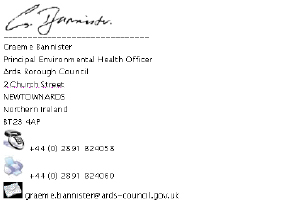
Our Ref 001-126-4-CQ
Your Ref
2 June 2010
Mr Peter McCallion
Committee Clerk
Room 412 - Committee for Social Development
Northern Ireland Assembly
Parliament Buildings
Stormont
BELFAST BT4 3XX
Dear Mr McCallion
I refer to the above and thank you for your letter dated 5 May 2010 in respect of the proposed Caravans Bill which was formally introduced to the Northern Ireland Assembly on 26 April 2010.
Belfast City Council welcomes the introduction of statutory protections for caravan owners who occupy a caravan as their main residence and caravan owners using seasonal sites. The introduction of fair treatment and protection of the property rights of caravan users is positive and the Council broadly welcomes the provisions of the Bill.
The Council seek clarification as to who will be responsible for enforcing Part 3 'Protection of residential occupiers from eviction and harassment.' In the original Caravans Bill, Part 2, "Provision for Protection of Occupiers of Caravans" it was intended that district councils would have a role in the enforcement of the protection of occupiers of caravans (by virtue of Section 7(4)). This has been omitted in the redrafted Caravans Bill and there is no explicit authority for any statutory body to enforce Part 3. Given that such offences within the private rented sector are enforced by district councils (by virtue of the Rent (Northern Ireland) Order 1978 as amended) and that district councils are responsible for licensing caravan sites (under the Caravans (Northern Ireland) Act 1963), it is suggested that the proposed legislation is amended to grant district councils the power to investigate and prosecute complaints of harassment and eviction.
In relation to this consultation, due to time constraints, officers have not yet had the opportunity to bring a report in relation to the draft bill to the Health and Environmental Services Committee. The Head of the Health and Environmental Services Department will be taking a report to the Health and Environmental Services Committee in August 2010. In the meantime, the above comments are the observations of the officers on behalf of the Council, but we will of course let you know if any further views are expressed once the matter has been reviewed by Committee.
Mr Peter McCallion
2 June 2010
The Department has stated that the Bill does not give rise to any issues selectively affecting any groups listed in Section 75 of the Northern Ireland Act 1998. Good practice dictates that Section 75 should be considered and the Council would urge that a full human rights impact assessment (including an Equality Impact Assessment) be conducted on the Bill as the legislation appears to directly affect the Irish Traveller Community and potentially the elderly.
I trust that this information has proved useful and I thank you for your interest in Belfast City Council's position with regard to these issues
Yours sincerely
CIARAN QUIGLEY
Director of Legal Services
CQ/LM/tmc
BH&HPA NORTHERN IRELAND BRANCH
211 Whitechurch Road, Ballywalter, County Down, Northern Ireland,
Tel: 028 4275 8200 Fax: 028 4275 8079 Email: ni@bhhpa.org.uk
Mr Peter McCallion
Committee Clerk
Committee for Social Development
Northern Ireland Assembly
Room 412
Parliament Buildings
Ballymiscaw
Belfast
BT4 3XX
27th May 2010
Caravans Bill
Thank you for your letter of 5 May and the opportunity to submit written evidence to the Committee for Social Development, following the publication of the Caravans Bill (the Bill).
We welcome the publication of this revised Bill that would deliver important protections for residential park home owners in Northern Ireland and align the statutory definition of a caravan with that of England and Wales. Further, we share government's objective that the rights and obligations of both parties should be recorded in writing in agreements for caravan holiday home owners to station their caravans on 'seasonal sites' for more than 28 days' occupation.
Nonetheless, we feel there are some points of concern at the practical level as we consider how the Bill will be put into practice on parks. In particular we note:
1. The definition of a 'protected site' is fundamental to the Bill's provisions, separating residential from holiday usage of a caravan stationed on a site and defining a different approach to residential occupiers from that for 'seasonal' occupiers. We endorse that this distinction should be made.
However, the Bill is silent with regard to 'seasonal' occupiers on 'protected sites'. We believe that these seasonal occupiers should receive the same treatment as 'seasonal' occupiers on 'seasonal sites'.
Many parks (or sections of parks), designated and operated as holiday parks, have planning permissions which permit twelve months' opening and do not stipulate whether this should be for holiday or residential use. These would be 'protected sites' and it is important all consumers with caravans sited on them – whether under a residential or holiday 'season' agreement are protected by the provisions of the Bill.
2. The time-scale for giving residential and seasonal agreements (within 28 days of the Bill's commencement) may present the industry with practical difficulties that could be mitigated through a longer introductory period and with further attention to timings stipulated.
3. Our experience suggests that costs of these will be significantly greater than envisaged.
Consideration
PART 5 Interpretation. Section 15(1) 'protected site'
The definition of a 'protected site' works well with the provisions of Part 1 which only apply to a 'residential agreement' as defined.
Residential agreements will be required where a person is entitled to station their park home (caravan) on a 'protected site' and occupy the park home as their main residence.
However, the Bill does not envisage seasonal agreements on 'protected sites'.
All parks with twelve months' planning permission (without holiday restrictions) and twelve months' site licence (without holiday restrictions) will be 'protected sites', as defined. In practice, many such parks may always have been legitimately operated as holiday parks where park owners have entered into agreement entitling caravan owners to station their caravan on a pitch at the park for a period of 10, 15 or more years, for holiday use only. (Some park owners with 'protected sites' may have introduced a closed period through their park rules.) However, the Bill is silent with regard to these seasonal agreements on a 'protected site'.
We are concerned that the Bill should make provision for the making of a seasonal agreement on a 'protected site' and provide the same level of consumer protection as for a seasonal agreement on a 'seasonal site'. (As currently drafted, the Bill envisages that seasonal agreements are only made on land forming part of a seasonal site as defined (section 7(1)(a) and section 7(2)).
As written, the Bill would come into force six months after Royal Assent:
We would argue that insufficient time is proposed to allow for the industry, residential and holiday park owners, existing and potential park home and caravan holiday home owners, to assimilate this entirely new legislation and prepare for its introduction.
Except in the most general of terms, little can be done to prepare for the introduction of the new legislation until it has received Royal Assent. In the normal course of events, the industry's trade associations will prepare guidance for their members, including draft documentation that cannot be finalised until the Act is in place. This process must be undertaken with great care with the benefit of legal advice. Then, it will be important to communicate such guidance to member park owners and operators through a variety of media to ensure it is properly understood.
Park owners would then need time to tailor agreements to any specifics of their business or of their individual agreement with the consumer.
At the same time, government would need to prepare guidance suitable for park owners, in particular for those not in membership of the trade associations and, importantly, for residential park home and caravan holiday home owners.
If a deal is struck for a consumer to purchase a caravan, sited under either a residential or seasonal agreement, on the day after the Bill's commencement date, in order to comply with the legislation the Written Statement would have to have been given 27 days before commencement and therefore the legal obligation was incurred.
This also means that, just five months after Royal Assent, suitable documentation will have to have been prepared, park owners fully briefed and the prospective purchaser made aware of their rights and obligations in this brand new area of law.
We consider that the time allowed in the Bill would be insufficient to allow for the preparation necessary to ensure the most effective implementation, in terms of legal preparation, consumer and industry education.
The residential agreements that would be required may have 40 or more years' duration therefore the utmost care must be exercised. We would observe that the equivalent provision in the Mobile Homes Act 1983 (Section 1(3)) which required the written statement to be given within six months of the Act coming into force, followed earlier legislation concerning agreements; most park operators were already aware of the principles involved. This process will be totally novel to park owners and consumers in Northern Ireland. The legal framework will not easily be understood and there will be an important body of work involved in communicating parks owners' new legal obligations.
The impacts on residential park businesses, and the potential uncertainty for park home owners, should not be underestimated. The cost of failing to meet the mandatory deadline is heavy and would mean that contract terms (the Express Terms) proposed by the park owner would be unenforceable (section 2(5)) and an expensive and unsettling application to the courts (section 3(3)) would be the only route to a resolution.
The courts would also have to be prepared to hear such cases within the same timeframe.
In the cases of both residential and seasonal agreements, we would urge consideration be given to the commencement date; a commencement date twelve months from the date of Royal Assent would provide a more practical timeframe within which documentation might be prepared and guidance provided.
Costs for park owners will not be insignificant. The Explanatory and Financial Memorandum offered with the Bill states:
'12. It is not anticipated that the Bill will give rise to any significant additional expenditure.
17. ... it is anticipated that the Bill will create limited additional costs for business.'
The industry's trade associations will provide their members with support and guidance to this brand new legislation. However, individual park owners will face substantial costs based on BH&HPA's experience of the introduction of the Mobile Homes Act 1983 on the mainland and bearing in mind that this is entirely new legislation in Northern Ireland.
Costs to park owners will include:
In summary, we believe that businesses' additional expenditure will certainly be significant and costs created are unlikely to be limited.
We trust that these representations will assist the Committee's consideration of the Caravans Bill.
We have confined our comments to the key issues that could stand in the way of smooth implementation as we share government's aim of appropriate protection for park home owners and clarity in contracts between park owners and all their customers. Government is committed to easing the burden of regulation on small business. The conscientious work of many park owners notwithstanding, this Bill represents a major adjustment to systems of work.
The Northern Ireland Better Regulation Strategy requires... 'Departments to undertake and publish a Regulatory Impact Assessment when considering new policy proposals, or amendments to existing policy which may impact on business; to carry out a micro business test to assess the impact on business of less than 5 employees; and to provide guidance to business on new legislation at least 12 weeks before legislation comes into operation.'
We would urge the Assembly's adherence to these important principles; in particular, that appropriate guidance will be available to business at least 12 weeks before legislation comes into force.
We would be pleased to answer any further questions that the Committee may have, either by correspondence or in person.
J. J. Kennedy,
Chairman, BH&HPA NI
CC: David Livingstone - Trading Standards Service of Northern Ireland
Committee Clerk – Committee for Enterprise, Trade and Investment
From: James Kennedy [mailto:James.Kennedy@sandycove.co.uk]
Sent: 09 August 2010 12:26
To: McCallion, Peter
Subject: FW: Model Agreements
Peter
Please find attached the selection of agreements which BH & HPA have for members use.
Kind regards
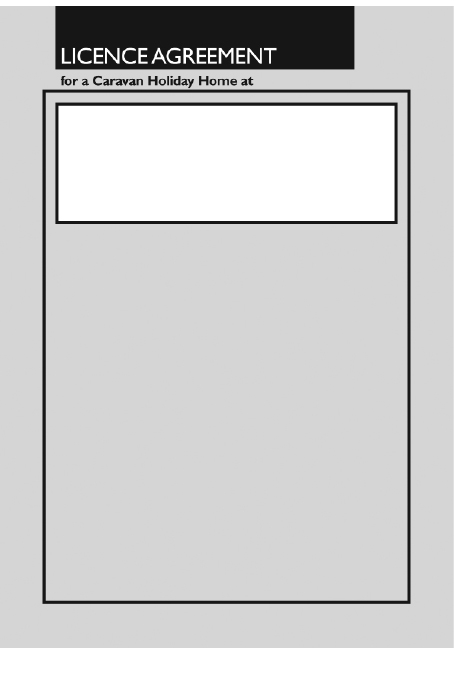
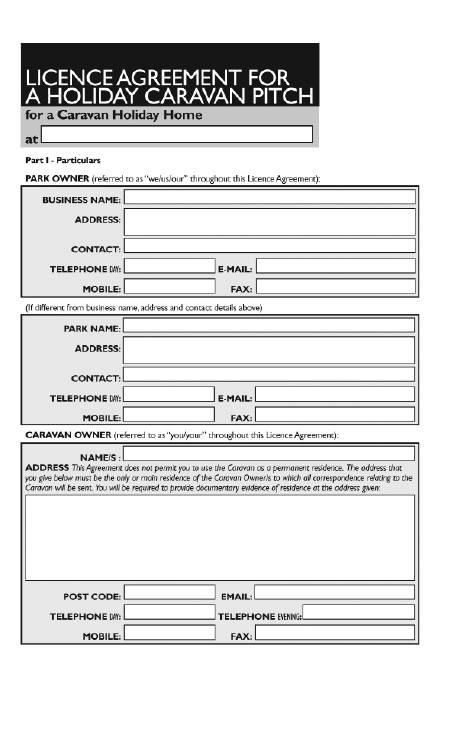
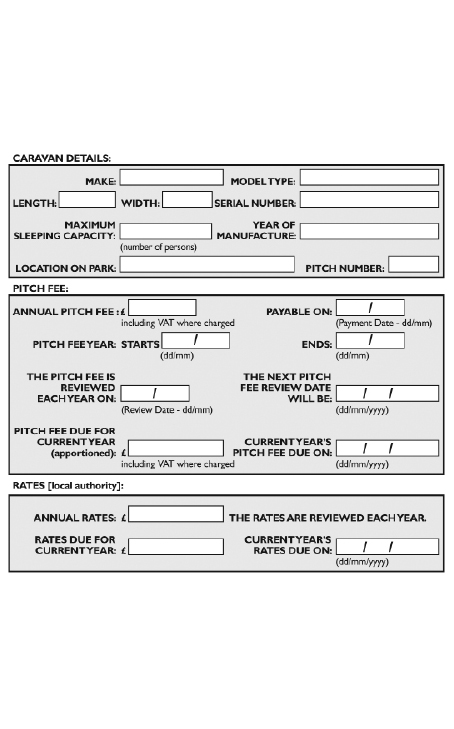
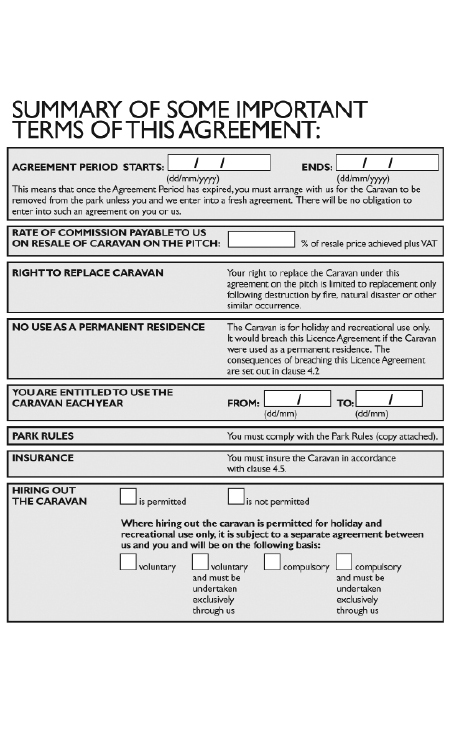
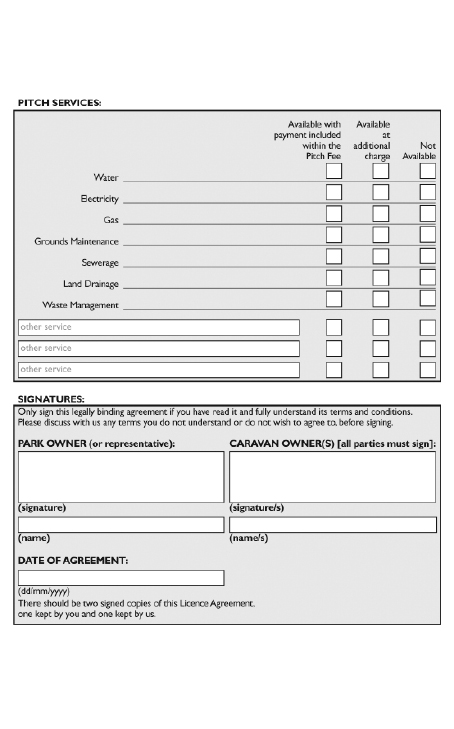
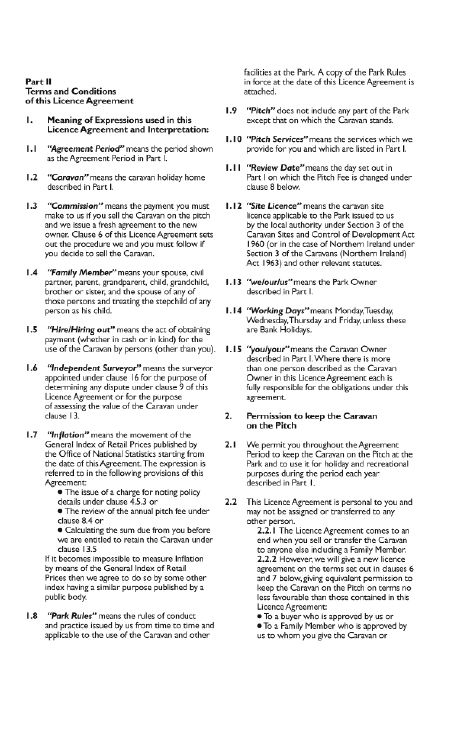
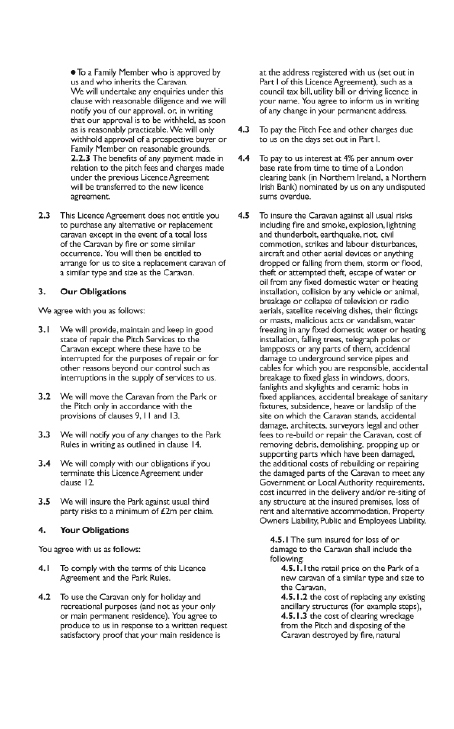
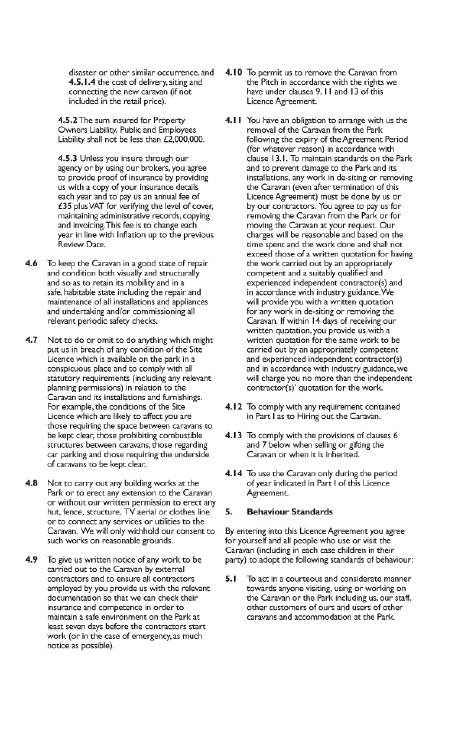
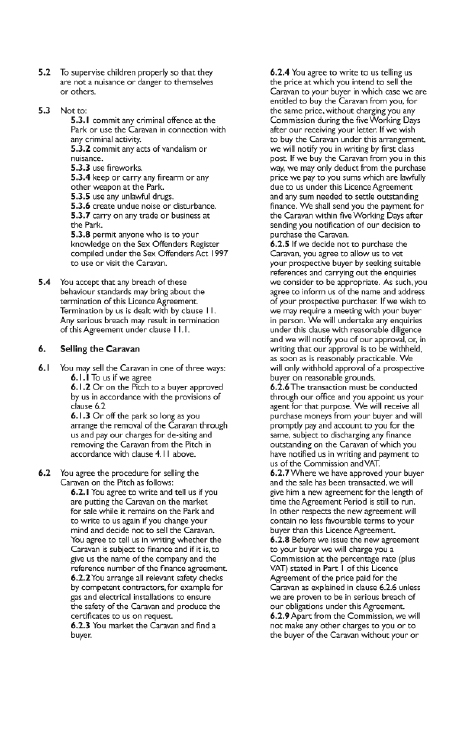
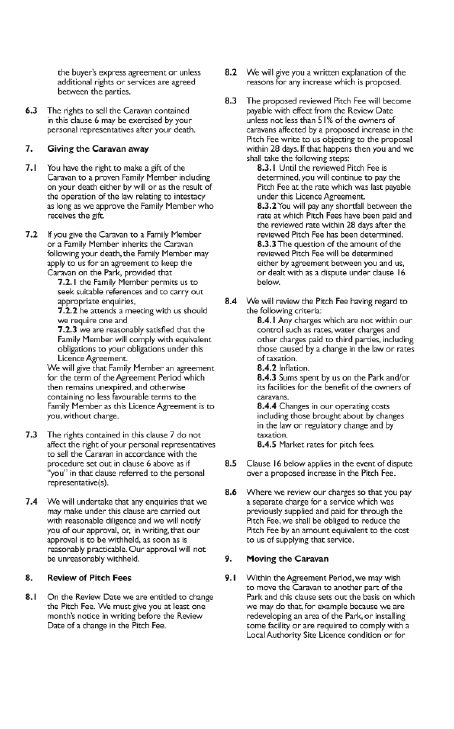
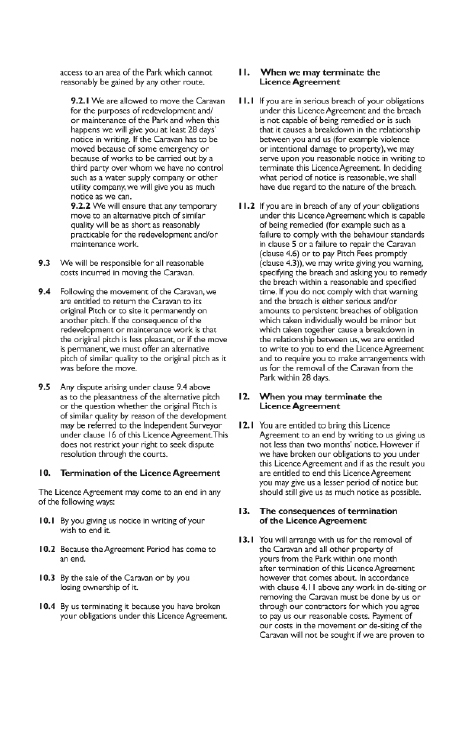
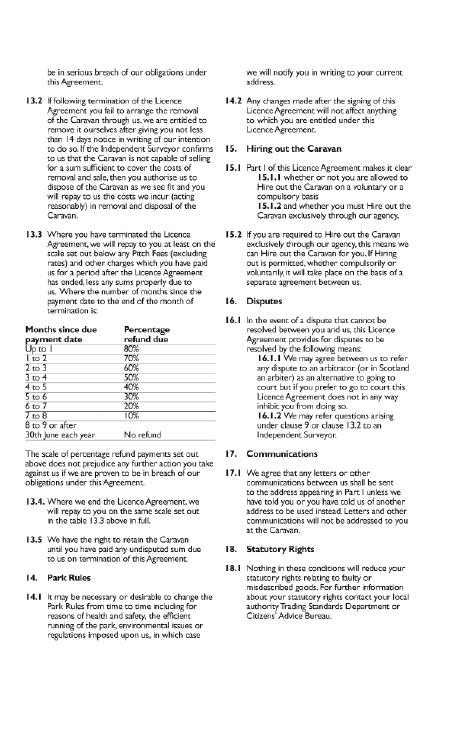

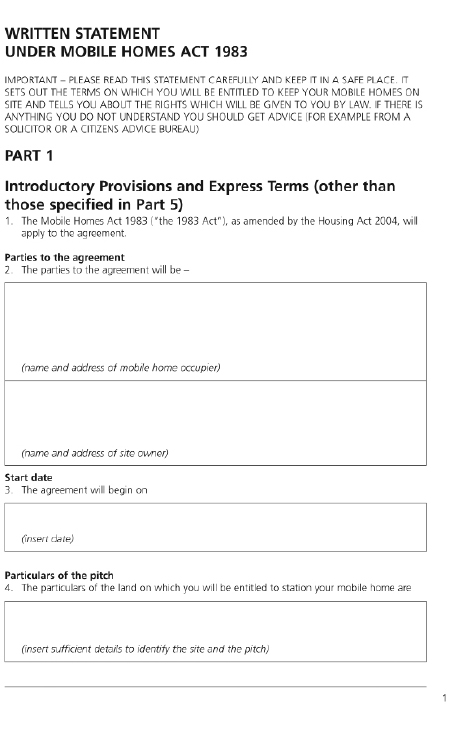

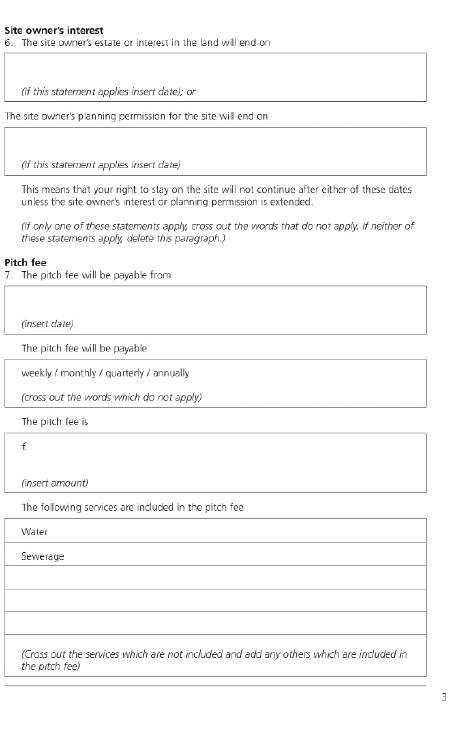

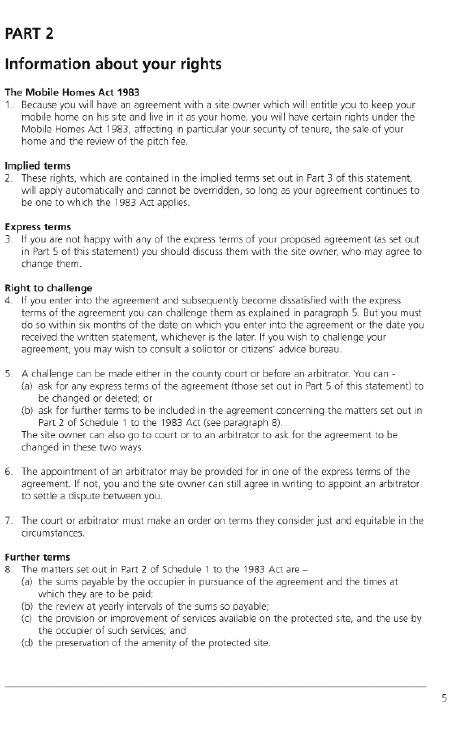
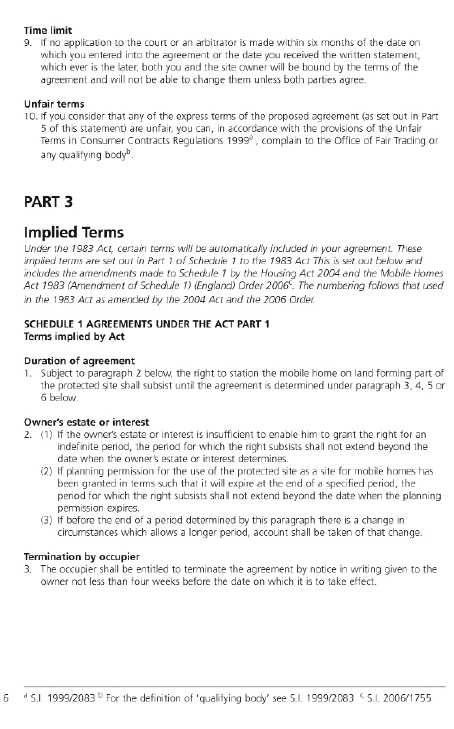
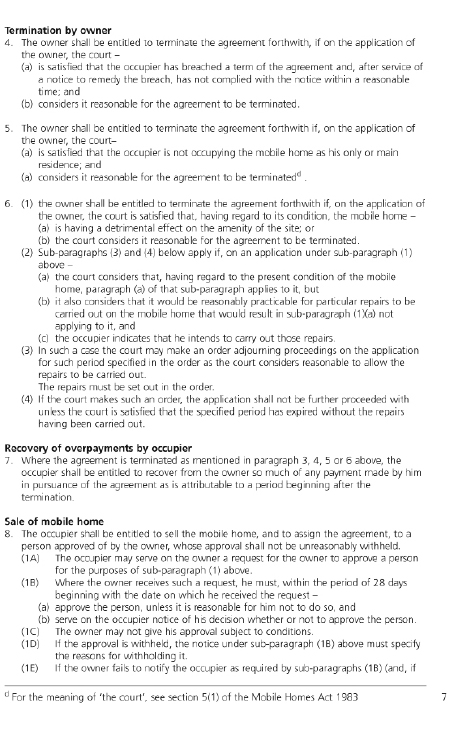
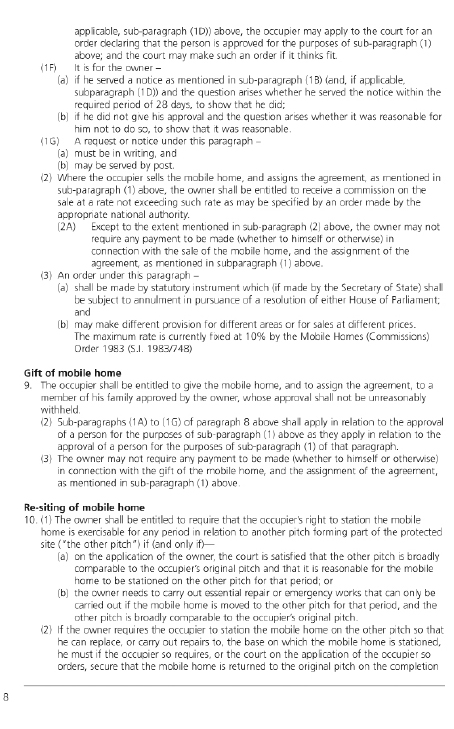
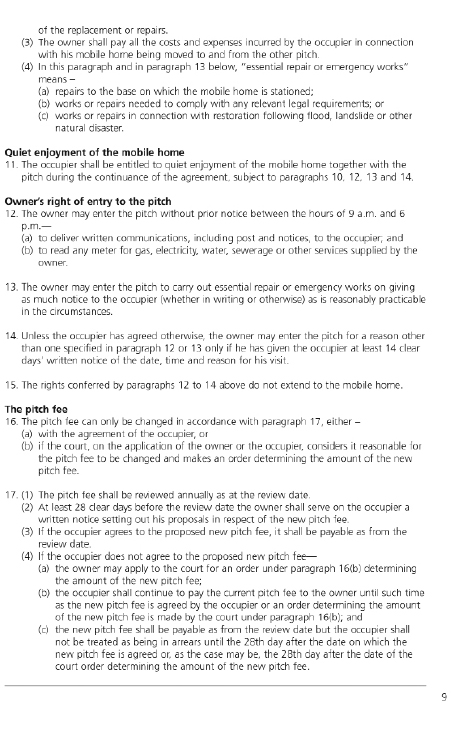
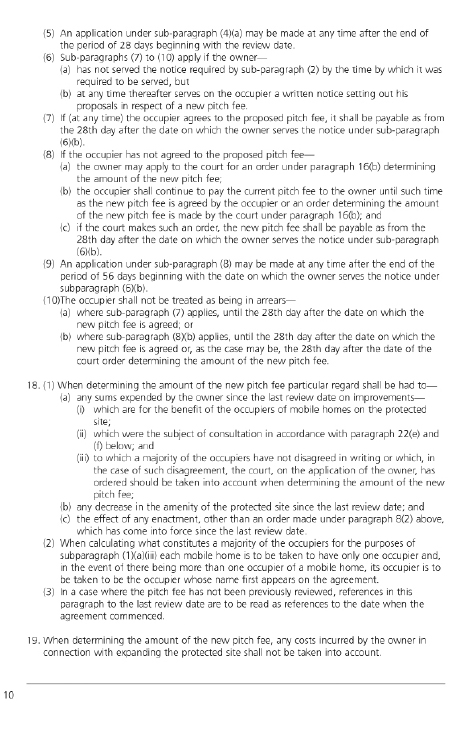
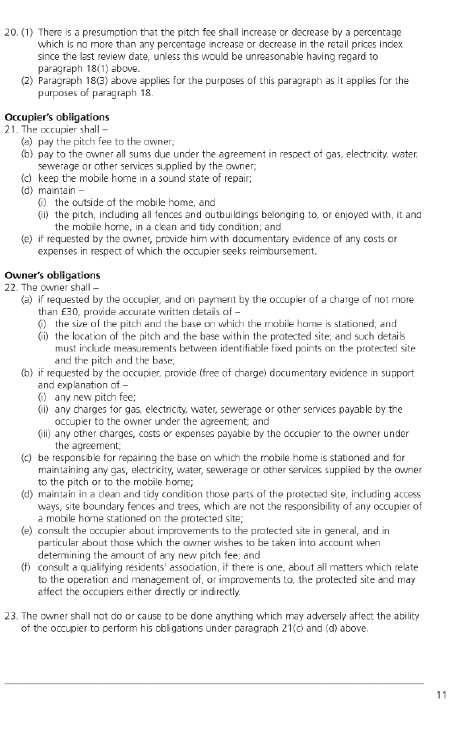
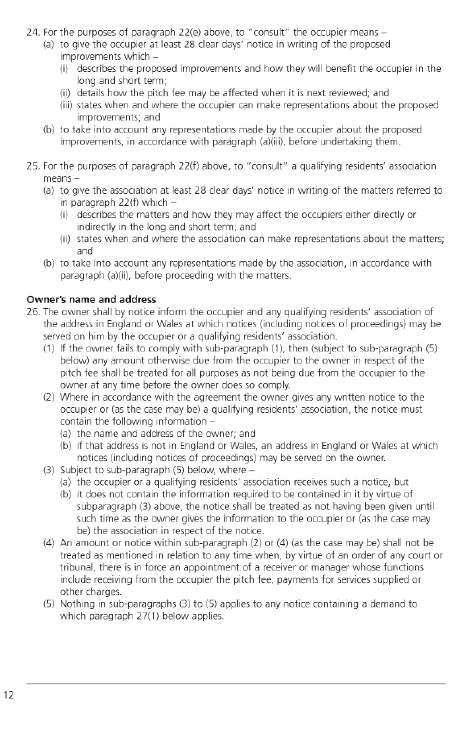
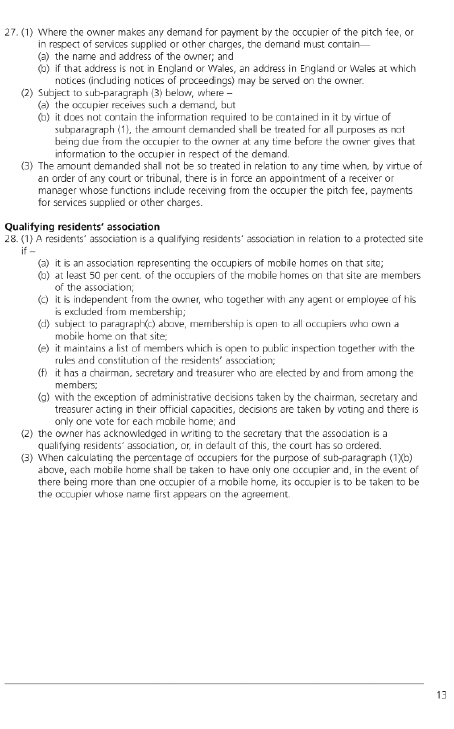
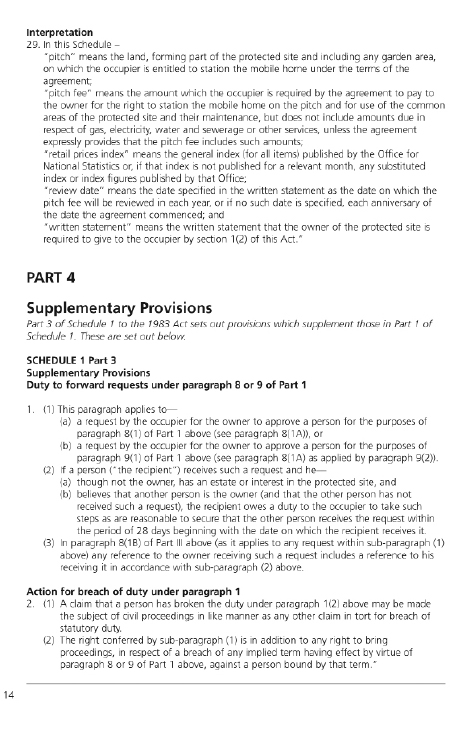
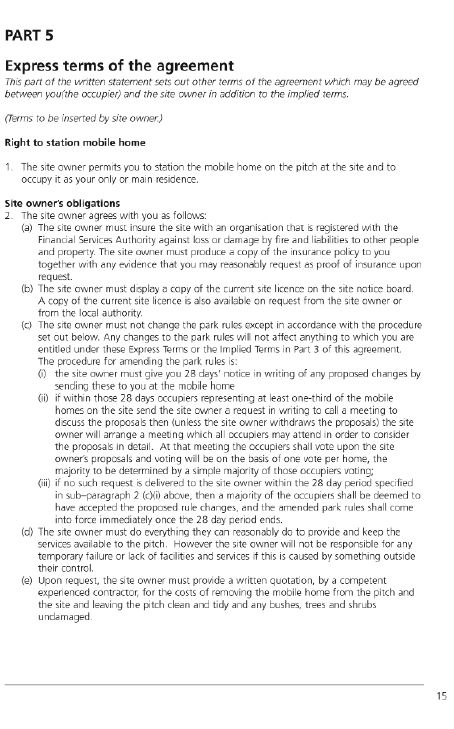
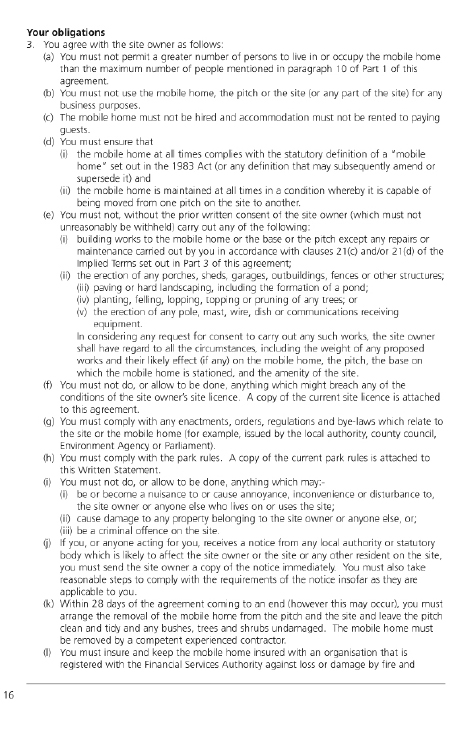
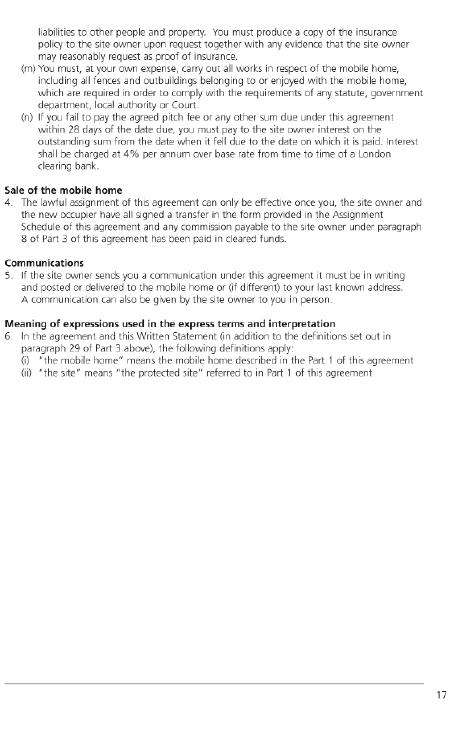
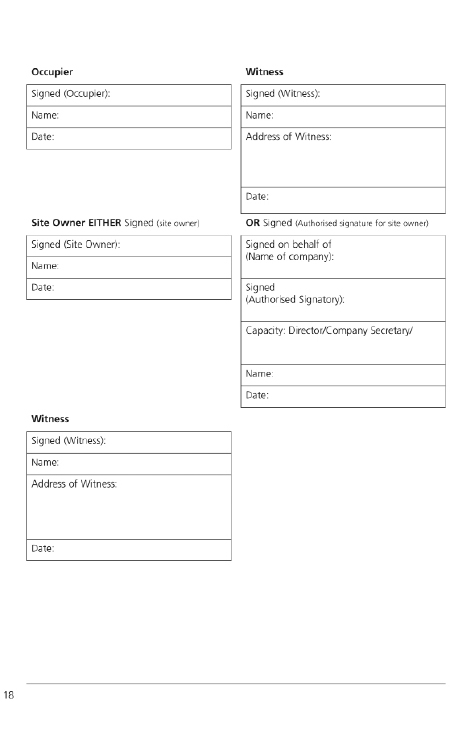
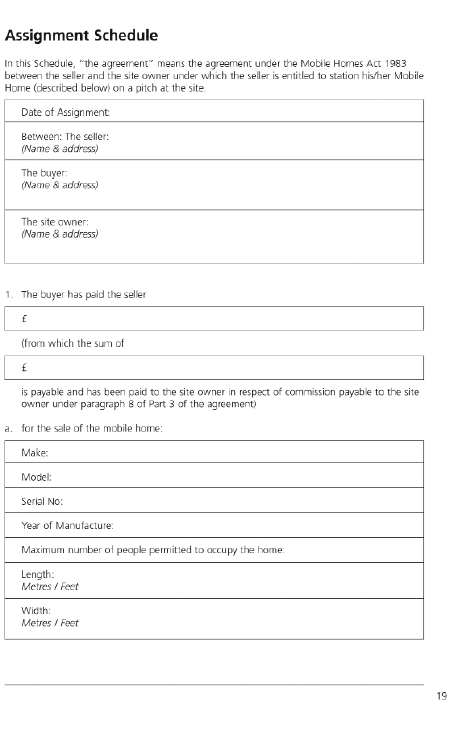
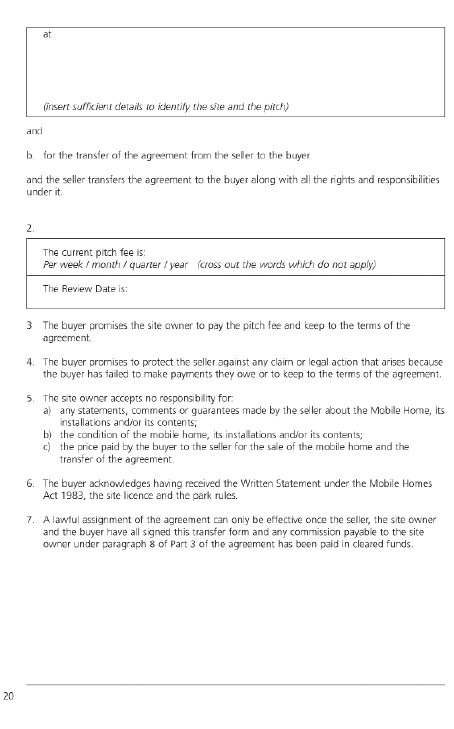
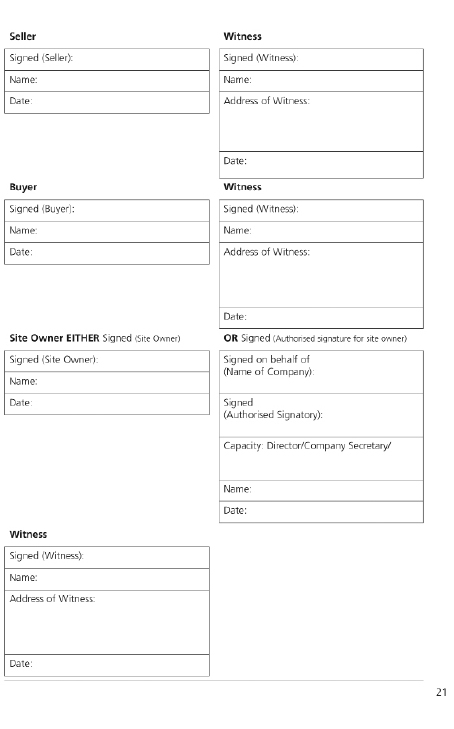


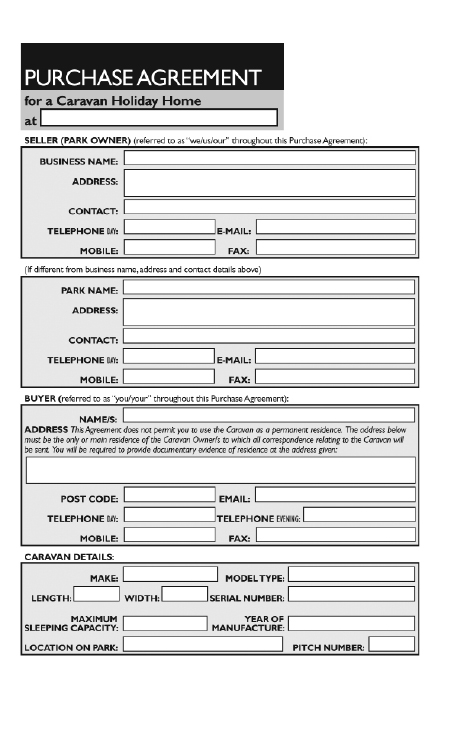
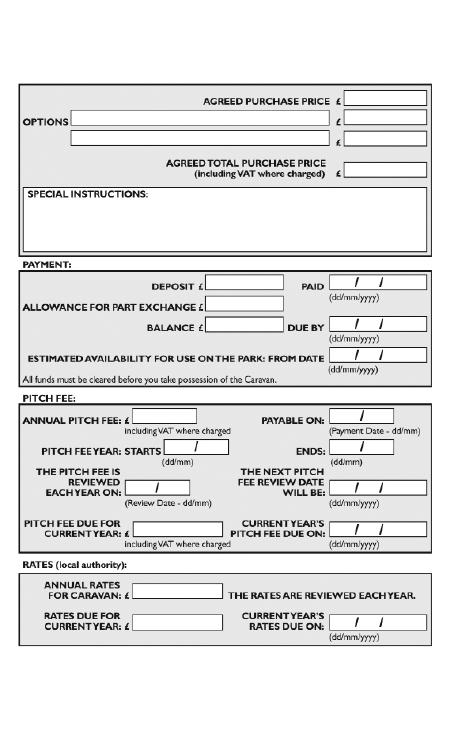
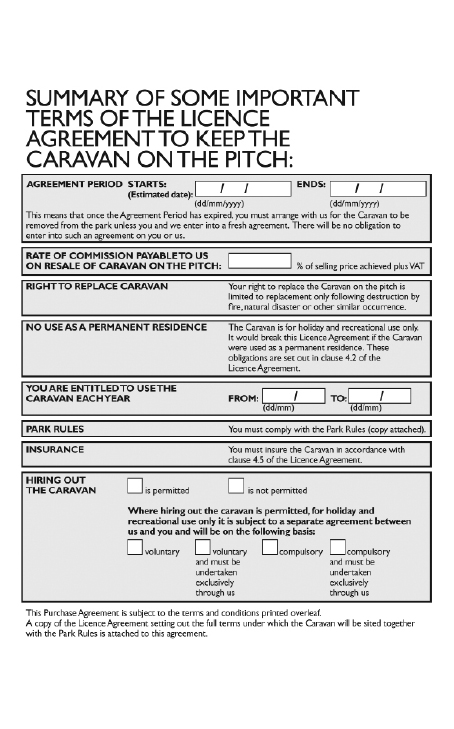
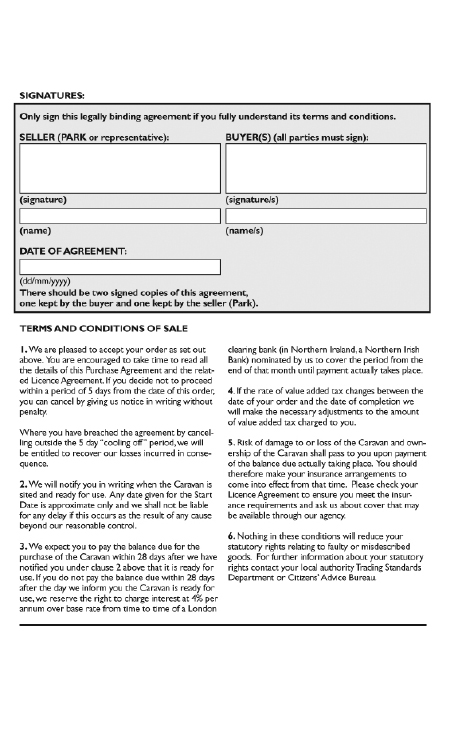
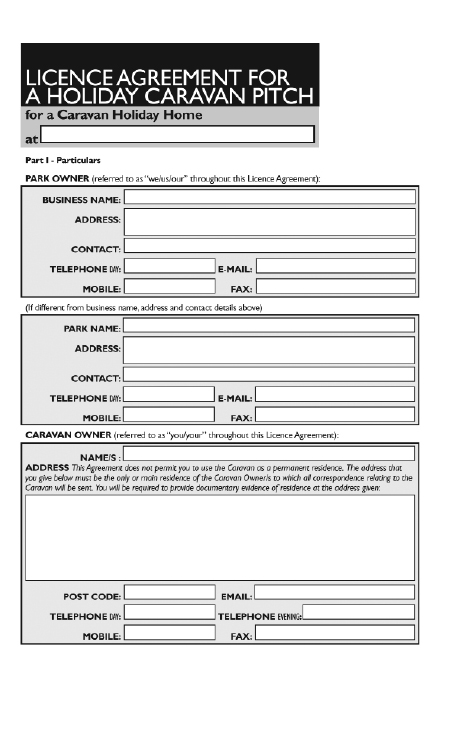
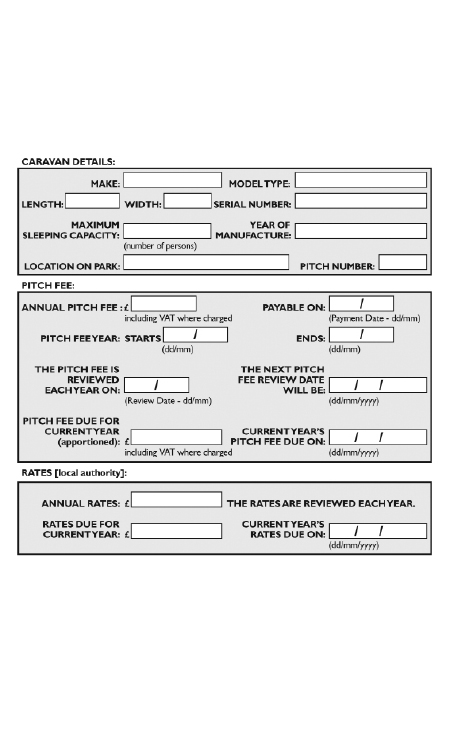
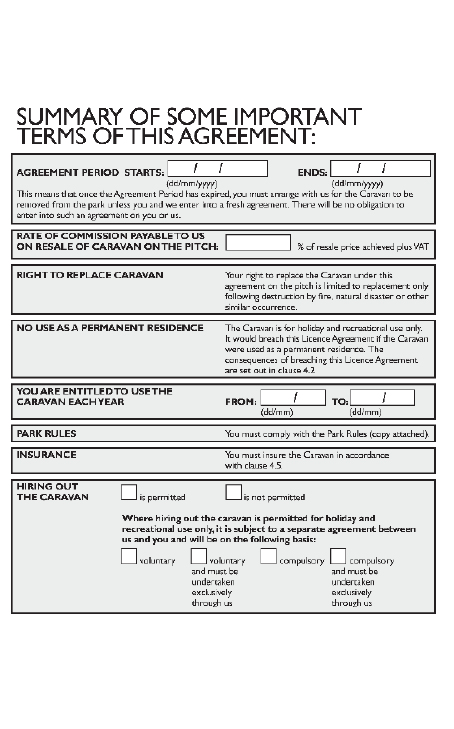
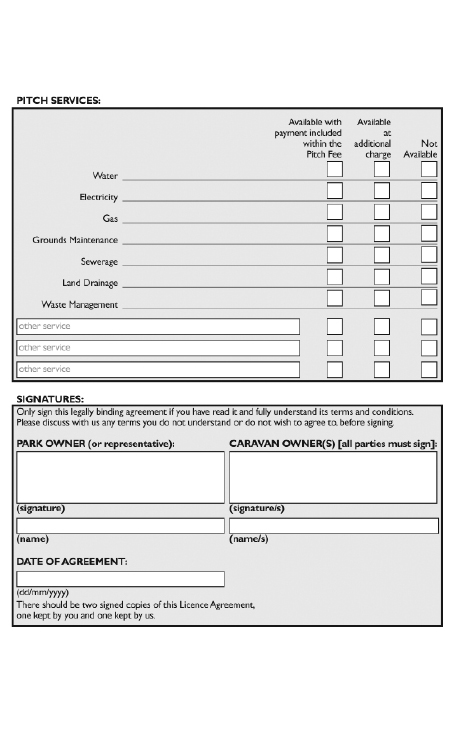
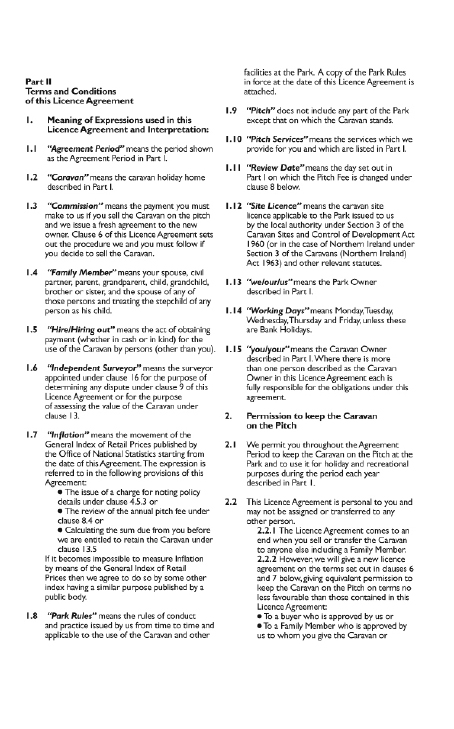
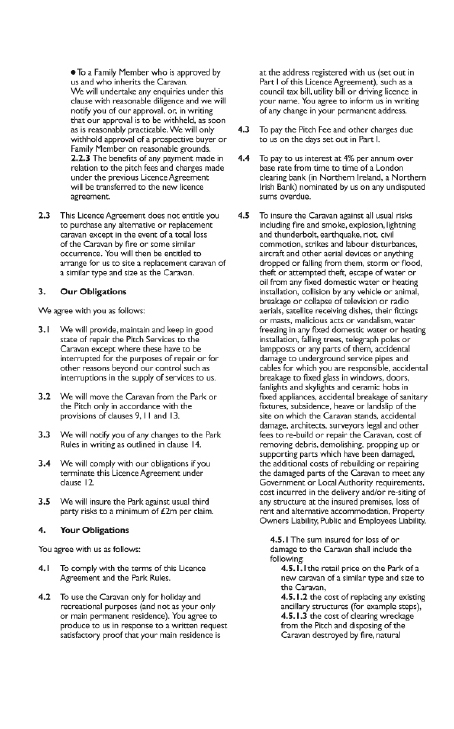
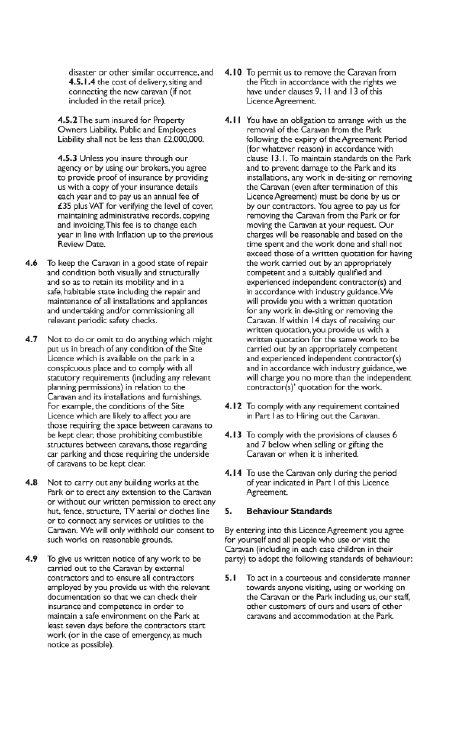
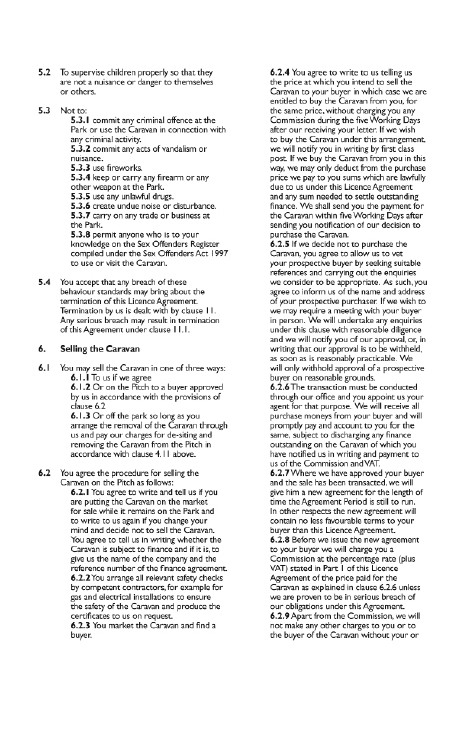
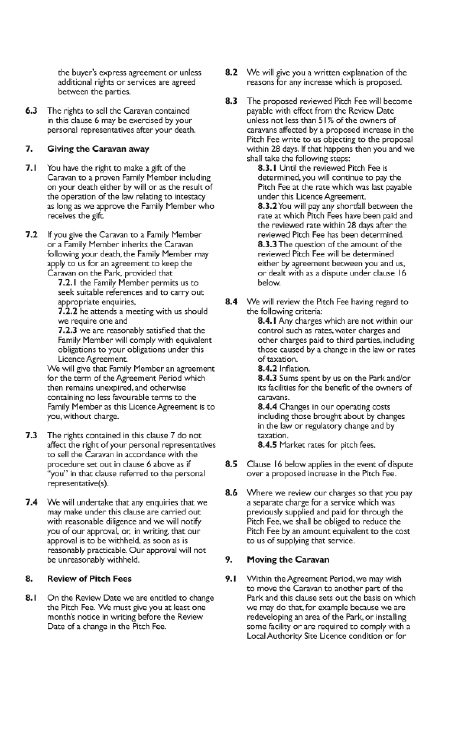
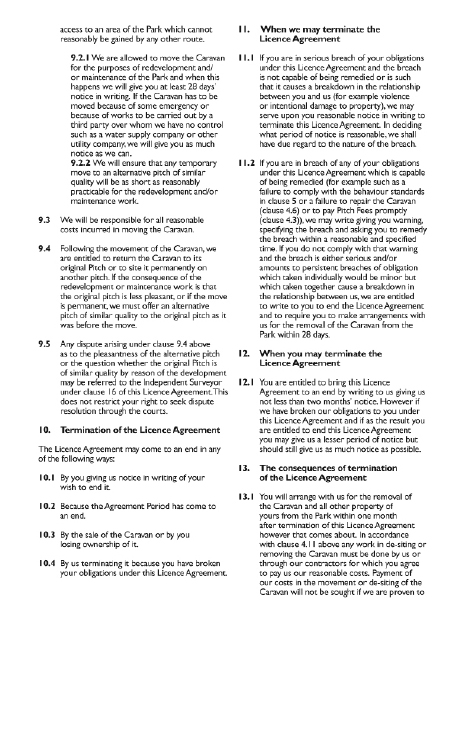
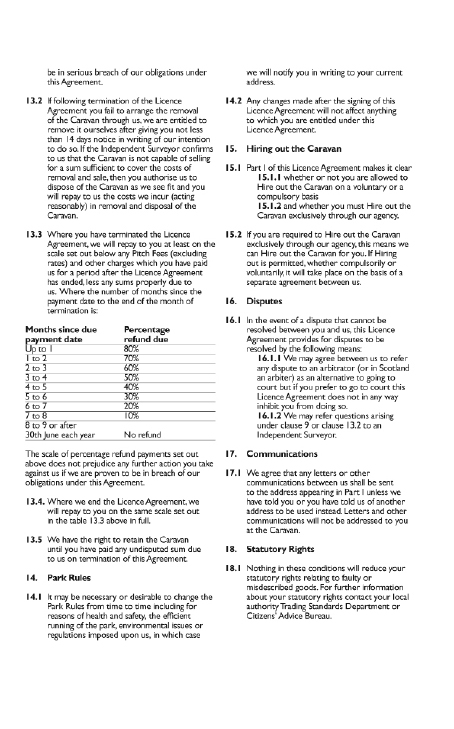

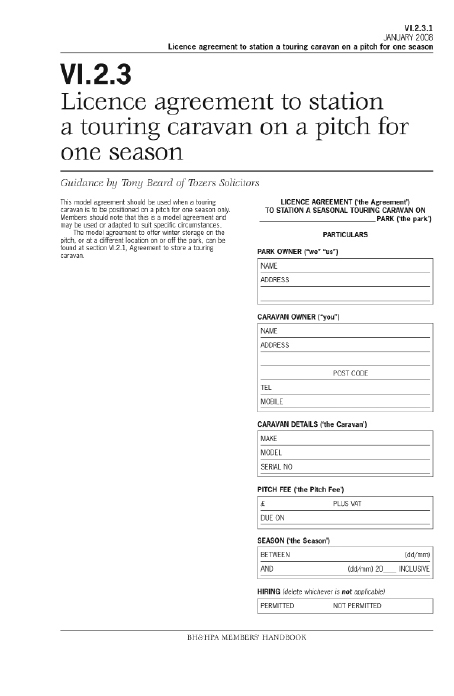
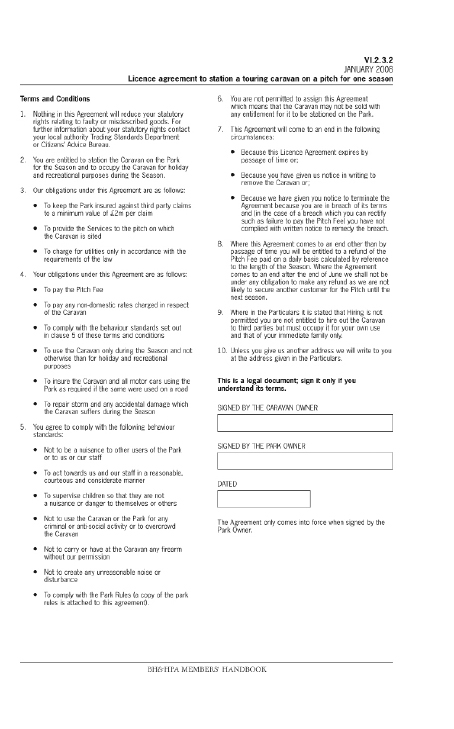
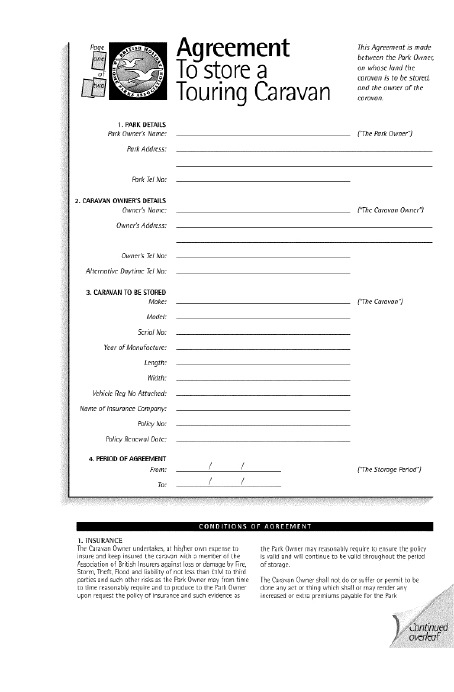
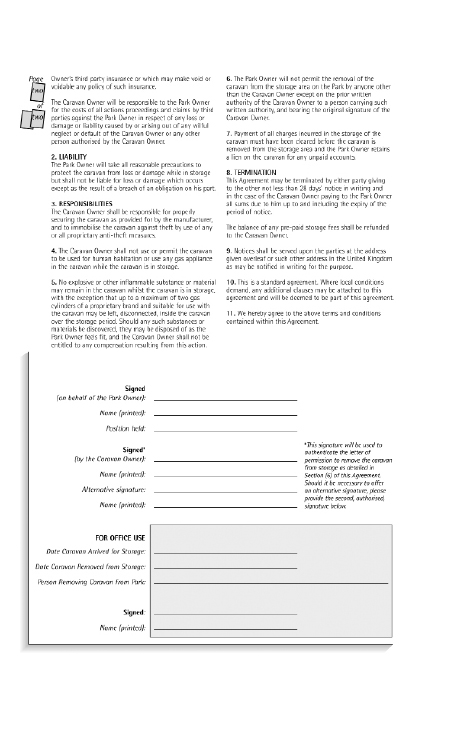
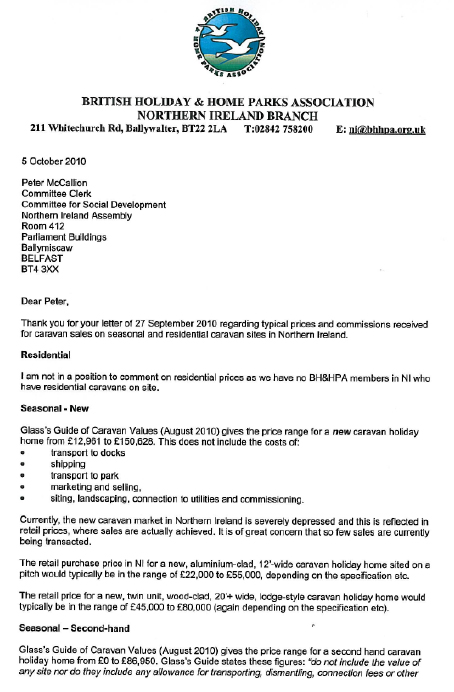
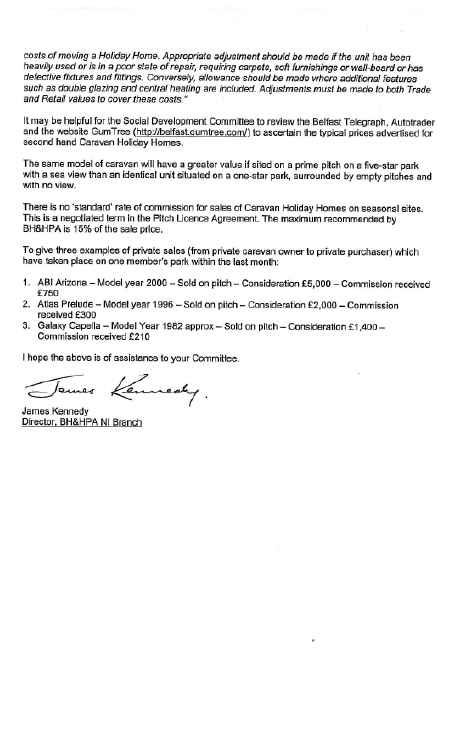
The Consumer Council will not be submitting written evidence to the Committee in relation to the Caravans Bill as this is an area which falls outside our statutory remit and is dealt with by Trading Standards Service.
Regards
Rhonda Allen
Senior Support Officer Chief Executive's Office
The Consumer Council
Elizabeth House
116 Holywood Road
Belfast
BT4 1NY
Tel: 028 9067 4817
Fax: 028 9065 7701
e-mail: rallen@consumercouncil.org.uk
web: www.consumercouncil.org.uk
www.consumerline.org
Could you be sitting on a small fortune? There is £12 million in forgotten bank accounts in Northern Ireland and £6 million in forgotten Ulster Savings Certificates. To find out if any of it belongs to you visit www.mylostaccount.org.uk for bank and building society accounts and www.dfpni.gov.uk for Ulster Savings Certificates.
If you need further help contact the Consumer Council on 0800 121 6022.
Please consider the environment. Do you really need to print this e-mail?
Dear Peter
Ref my phone call on the caravan bill
I own three caravan parks in the Kilkeel area, Co Down
Shanlieve / Cranfield Bay / Silvercove Caravan Park
We have a small Residential caravan park which is less than half full at this time / open about 10x years
With aprox 20x occupied sites
With reference to the 10% commission fee to be paid to the caravan site owner on the sale of a caravan
Comments
1/ who determines the value of the caravan, on the sale on the residential?
2/ How do you guarantee the price that the caravan owner is reporting to get for the Residential caravan is indeed correct?
3/ This 10% commission rate ,was set in the mainland UK were the prices of residential caravan can be up to 5x times more expensive
Even for the exact same caravan, check prices on the internet in England
I am sure you would agree 10% of £150,000 = £15,000 commission,
Is a lot more than the same caravan in Northern Ireland for £30,000 = £3000 commission
I feel this 10% commission level would have to be set a lot higher in the UK, mainland
If the Residential caravan prices were as low as in N Ireland
I would like you to examine these facts, as I believe the Residential Caravan industry in Northern Ireland would not
Be worth investing in if you were restricted to a margin of 10%, of a price set by the seller,
On Top of this you can give your caravan away to a member of your family as a gift? How this would be policed
Residential Park Homes can be an affordable way to have a home in Northern Ireland
But this legislation, in my opinion will stop further investment in this sector in N I
The UK main land has 55 x million people
Little N Ireland has 1.5x million people
Our annual pitch fees can be up to 300 % less than in England
Our Caravan Transport cost to get to N Ireland is high, £1500 to £2500 per unit by boat etc
Our sales of residential vans in N Ireland is a fraction of England
In UK mainland there is many many thousands of residential caravans
In N Ireland there is only a few hundred max
So sales of residential caravans in any one year in N Ireland is very small indeed
Example, the past 10x years we have sold 2.5 x Residential caravans, per year in our residential park
None this past 2x years
I think what I am saying is, N Ireland is not the UK main land & must be legislated for differently
If I sell 2x residential caravans per year on an average as demonstrated,
Then we can not afford to loose any sales or be restricted to a 10% fee of a price that can easily be hidden
I personally believe this legislation would make me re think my residential park, so in my case with both a small park &
Restrictions on profits, on sales, & fee restrictions raises would make us unprofitable
Added to the fact that I could not restrict a sale of a caravan to example an undesirable,
As this would be classed as unreasonably with holding consent when I know
The 2x caravans next door will leave the park if we can not control or vet the potential new buyer
That would become my existing customer's new neighbour
Everything in N Ireland is small in comparison to the UK main land / one size does not fit all or one legislation
These are my comments , I hope you understand , what I am trying to say
Yours Sincerely
Alan Milne
Dieci Ltd
Tel: 028 30821230
Mob: 07860 617 616
Fax: 028 3082 1583
www.dieci.org
Peter,
Down District Councils External Affairs Committee, at its meeting on 14 June 2010, considered the proposed Caravan Bill. Members support the detail contained in the proposed Bill and the specific areas outlined in the letter to Council from the Social Development Committee dated 5 May 2010.
Liam McLernon
Down District Council Policy & Equality Officer
24 Strangford Road, Co Down BT30 6SR
Tele: 4461 0807
Fax: 4461 0801
Mobile: 07977 016984
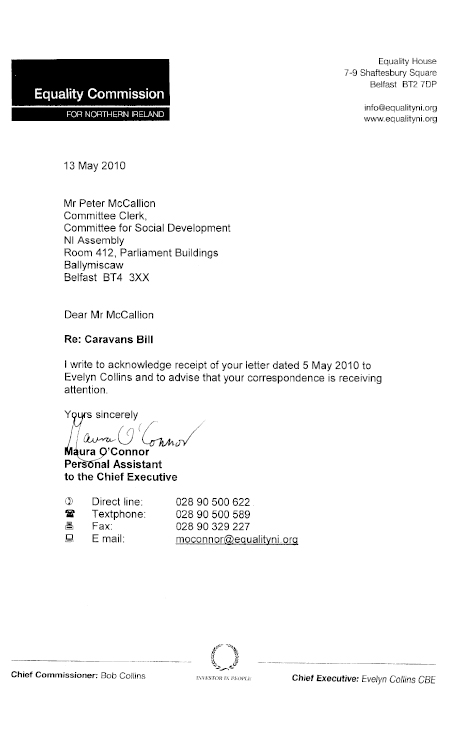
Peter McCallion
Committee Clerk
Committee for Social Development
Room 412
Parliament Buildings
Ballymiscaw
BELFAST
BT4 3XX
Dear Mr McCallion,
Caravans Bill
On behalf of the Equality Commission for Northern Ireland, I advise that we will not be providing evidence to the Committee for Social Development for the Caravans Bill.
Yours sincerely,
Simon
Simon Hookham
Policy (Public Policy) Manager
Policy & Development
Equality Commission for Northern Ireland
5th Floor
Equality House
7-9 Shaftesbury Square
Belfast
BT2 7DP
Tel: 028 90 500612
This Partnership has considered the above Bill and, in principle, welcomes the proposals that should enhance the property rights of those involved in the hobby, holiday and caravanning lifestyle and those who are engaged in the promotion and development of the holiday and leisure industry from a commercial aspect. That is regarded as positive.
However it is pointed out that the Traveller community largely live in caravans on a permanent basis and often on permanent or Transit sites, the responsibility for the provision of those is placed upon the Northern Ireland Housing Executive under the provisions of the Housing (NI) Order 2003, although there are some sites provided on a private basis including some being owned by Traveller families. Sites provided for Travellers are licensed by local councils under the provisions of the Caravans (NI) Act 1963. Further, the Traveller community is an ethnic group specifically identified under the Race relations Order and their rights to equality of treatment are safeguarded by Section 75 of the Government of Ireland Act 1998.
This Partnership has concerns that the Caravans Bill 2010 as drafted may impact adversely upon that community in so far as it amends the 1963 Act and does not appear to enhance the protection of Travellers on publicly and privately owned sites nor grants parity of protection with Travellers in "social housing".
In the circumstances the Partnership recommends that, as is the usual practice in dealing with policies that may impact upon the Traveller community, a full Equality Impact Assessment be carried out to ensure that the Traveller community will not be disadvantaged by the Bill in its current form.
In making this response, the Partnership is aware that the lack of accommodation for Travellers has been identified as a priority issue by the Northern Ireland Human Rights Commission and also that the case law of the European Court of Human Rights found that the protection afforded to Travellers in GB contrasted unfavourably with the levels of protection afforded to other tenants and thus was in breach of Article 8 of the European Rights.
If there is anything further I can do to assist please do not hesitate to ask
W.J.Newburn OBE
Secretary
Local Government Partnership on Traveller Issues.
PS For your information i attach a short background note on the Partnership
With the setting up of the Northern Ireland Local Assembly in accordance with the Belfast Good Friday Agreement, the Minister's Advisory Committee on Travellers (ACT) was not re-appointed at the end of its term in December 1999.
ACT had set up a forum for Local Councils through which they could express their views on all policy and legislative proposals relating to Travellers and offered facilities for communication with Ministers and Government agencies on relevant matters of concern.
As local councils had participated fully in the activities of ACT they decided that they must put in place suitable arrangements to enable their continued activities and lobbying access to ministers and policy makers on all issues relating to Travellers.
The Partnership was thus formally constituted in January 2000
The member Councils include:
Antrim Borough Council
Armagh City & District Council,
Ards Borough Council,
Belfast City Council
Carrickfergus Borough Council,
Coleraine Borough Council
Craigavon Borough Council
Derry City Council
Down District Council
Dungannon & South Tyrone Borough Council
Fermanagh District
Larne Borough Council
Lisburn City Council
Magherafelt District Council
Newtownabbey Borough Council
Newry & Mourne District Council
Omagh District Council
Strabane District Council
The Partnership is consulted on all proposals for new legislation and changes in public policy matters. It was represented on the working party which drew up the report upon which the most recent legislation on control of unauthorised encampments in NI was based. It contributed to the preparation of the most recent legislation on Housing. Also it was actively involved in the preparation of the assessment of Traveller accommodation needs in NI and currently has observer status on the Thematic Group on Travellers – a sub-committee of the Race Forum.
In general the Partnership acts in the nature of a support group for Member councils and speaks on their behalf on all Traveller issues, acting in a collegiate capacity.
The diverse nature of the membership ensures that it is genuinely a cross-party, cross-cultural organisation and acting only in the best interests of Travellers, the settled community and councils right across the demographic spectrum in NI.
Political interests do not enter into the deliberations on any issues being considered and indeed all decisions are inevitably reached by consensus and unanimity.
Although the Partnership is recognised by the Government as a consultee and has frequent access to Ministers, it neither seeks nor receives any funding from any Central Government source.
A number of Issues are currently being pursued by the Partnership with the appropriate Government Departments, public bodies and Ministers.
W.J.Newburn OBE
Secretary/Treasurer
24th November 2005.
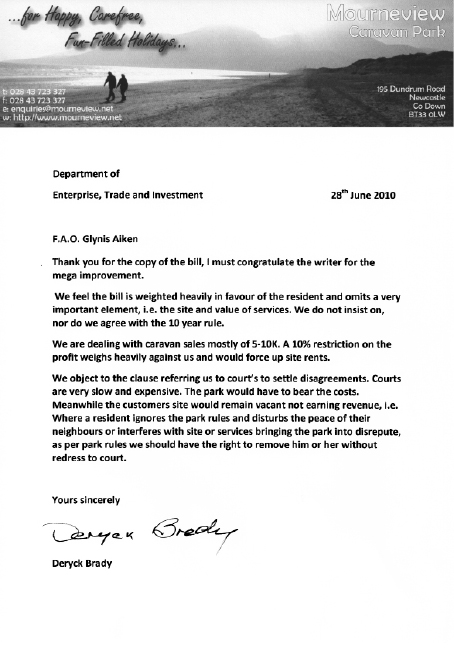
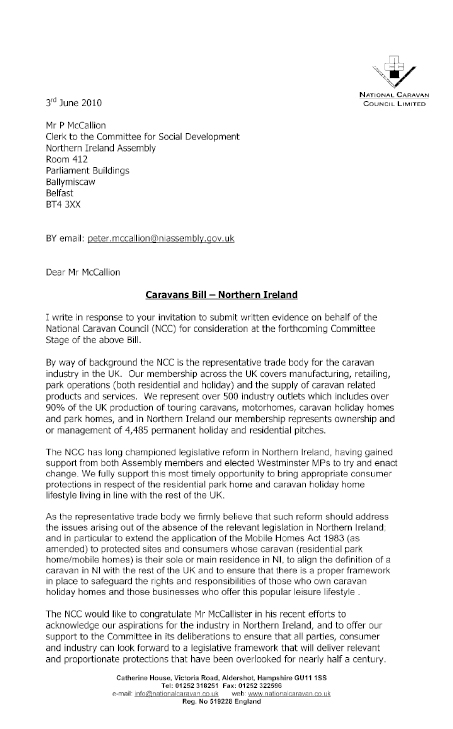
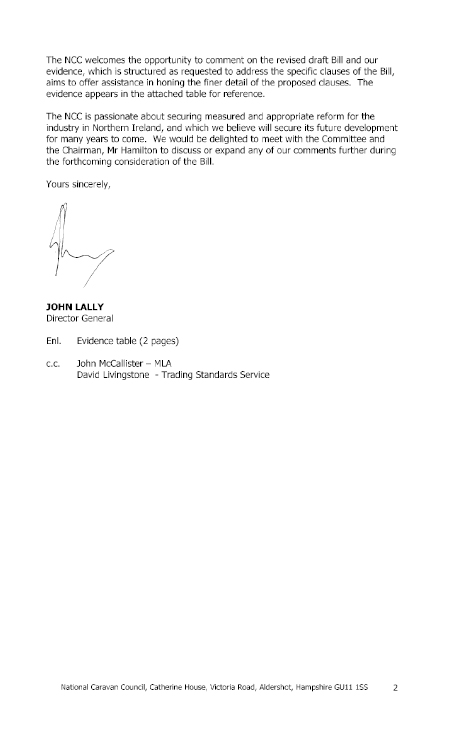
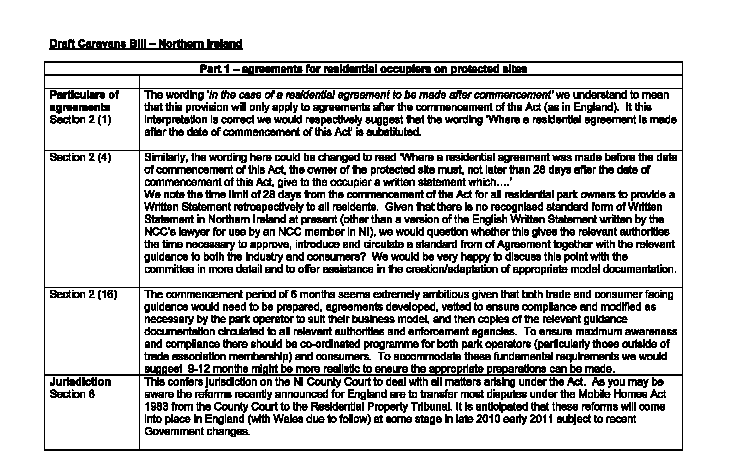
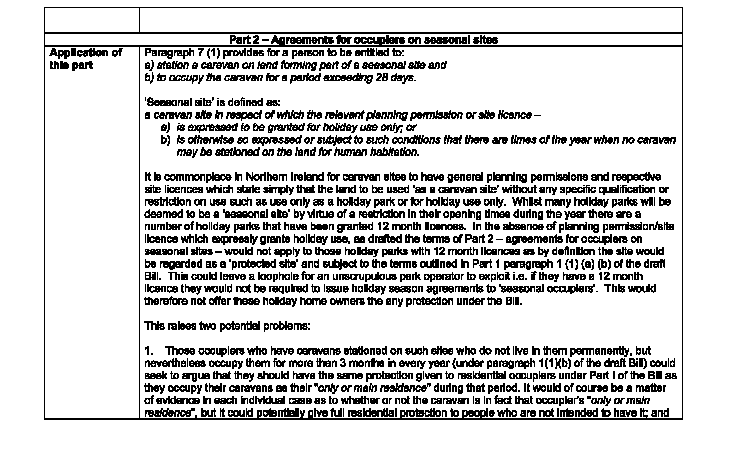
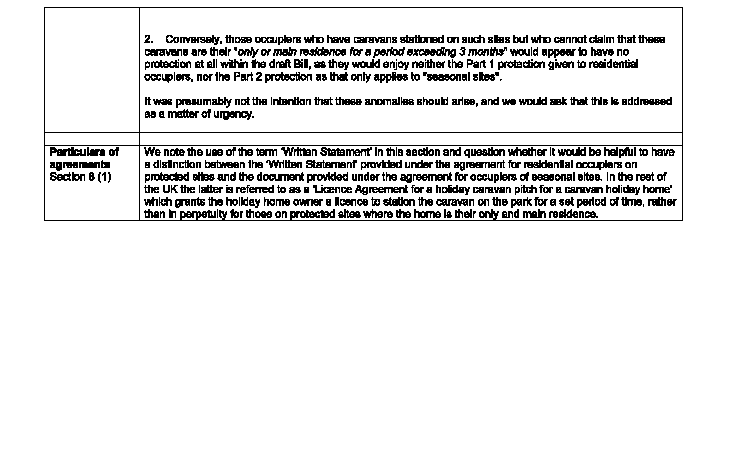
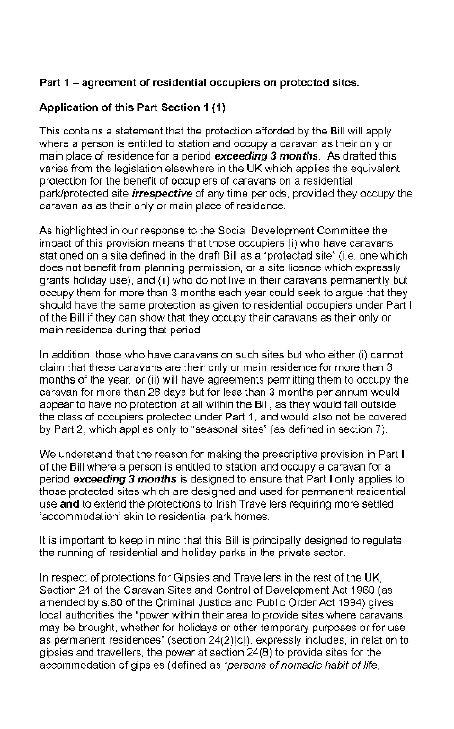
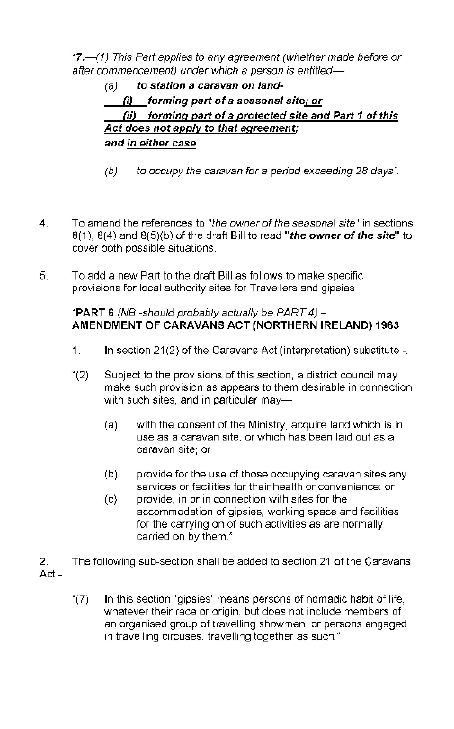
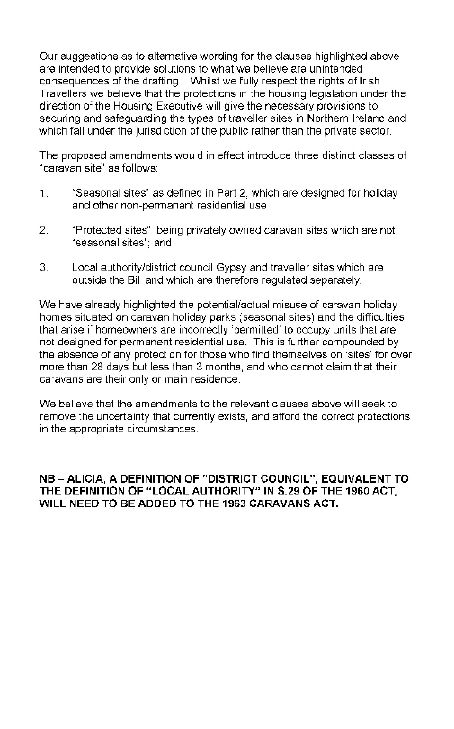
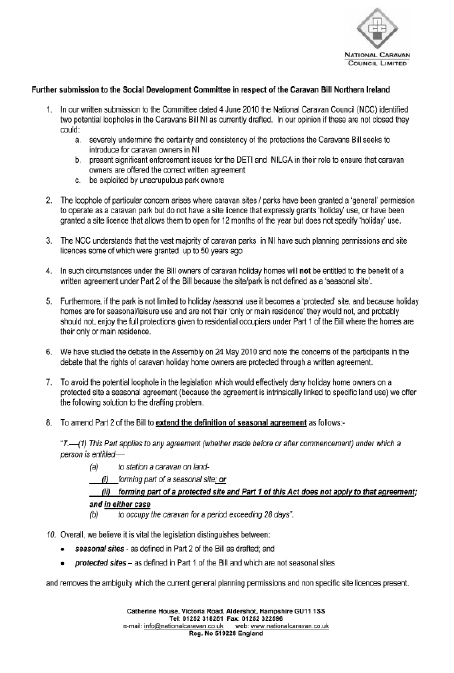
Dear Peter
Many thanks for your recent letter on behalf of the Social Development Committee. Once again thank you for the opportunity to address the Committee which I am pleased they found useful.
In response to their specific request for our model documentation (which, incidentally, I brought hard copies with me and took back home with me!) I attach the following:
The OFT advised us that on the sale of a caravan holiday home the purchase agreement should not be separated from the licence agreement for the pitch as the two are intrinsically linked. When the licence agreement for the pitch comes up for renewal a separate licence agreement document is available which is identical minus the purchase agreement part
Whilst writing I note that it is anticipated the Committee will publish its report on the Bill in the autumn. Presumably this will be after they consider the Bill clause-by-clause (and any further amendments) and before it goes for final consideration. It would be very helpful to have a steer on the processes once the Assembly returns from the summer recess and the likely timescales for the progress of the Bill towards Royal Assent.
If I can assist further please do not hesitate to contact me again.
Kind regards,
Alicia
Alicia Dunne
Deputy Director General
Direct Line Tel: 01252 796059
Mobile: 07718 528 583
Email: aliciad@nationalcaravan.co.uk
Before printing please consider the environment.
National Caravan Council Ltd,
Catherine House, Victoria Road, Aldershot, Hampshire GU111SS
Reg. No. 519228 England&Wales
The National Caravan Council is the representative body for the caravan industry in the UK
This is an external email and may contain confidential information and/or copyright material. It is intended for the use of the addressee only. Any unauthorised use may be unlawful. If you receive this email by mistake, please advise me immediately by using the reply facility in your email software. Thank you for your co-operation
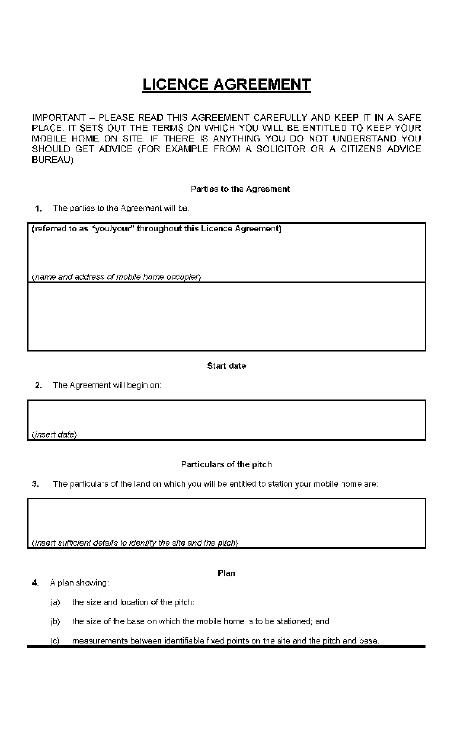

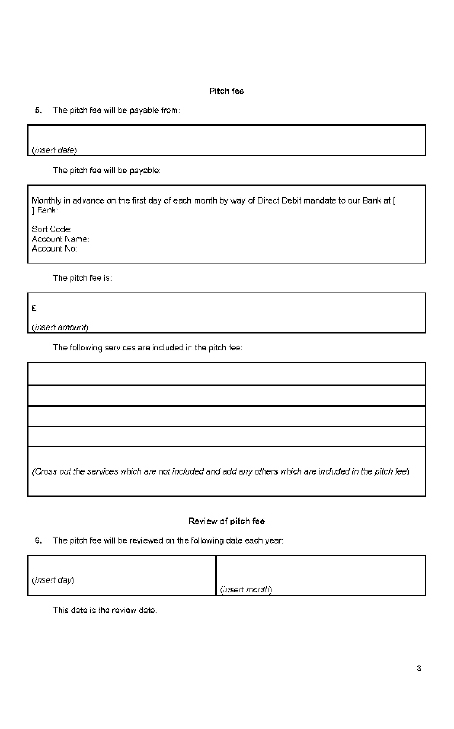
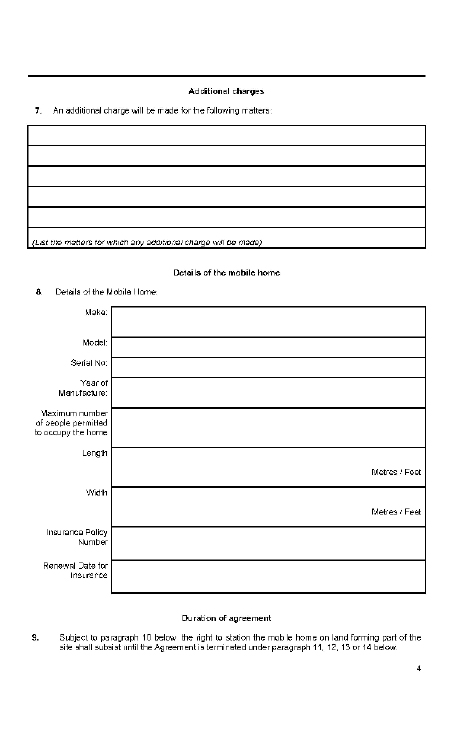
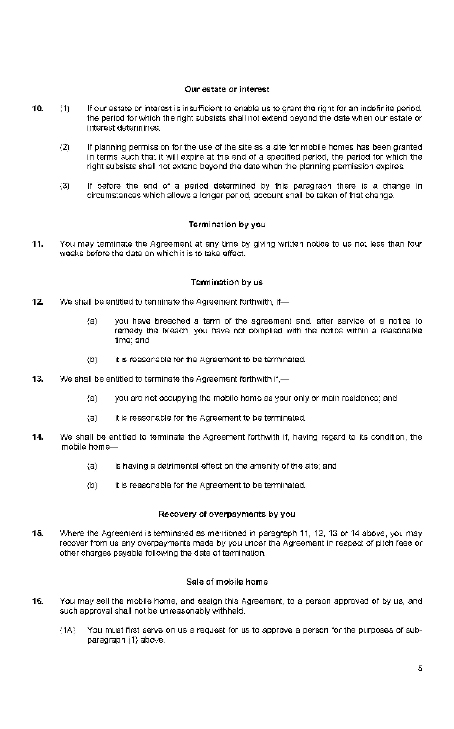
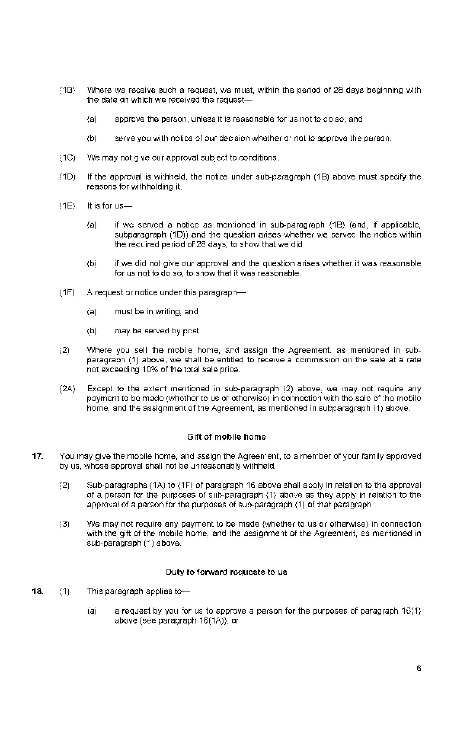
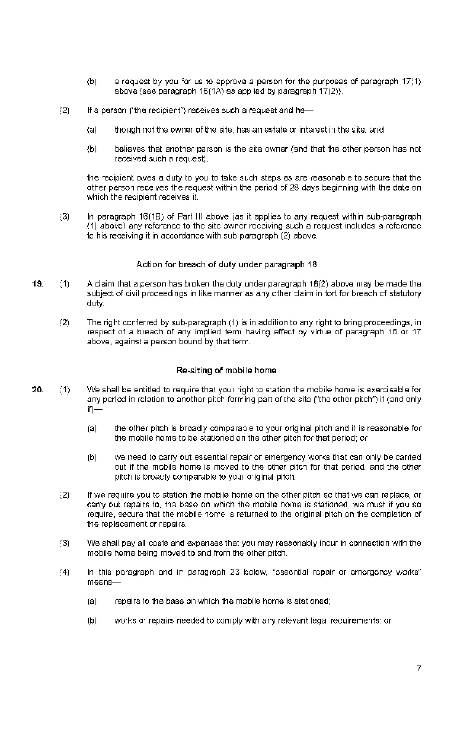
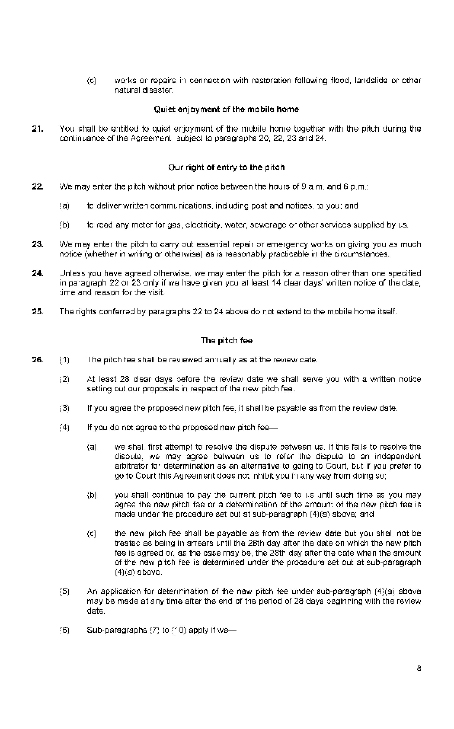
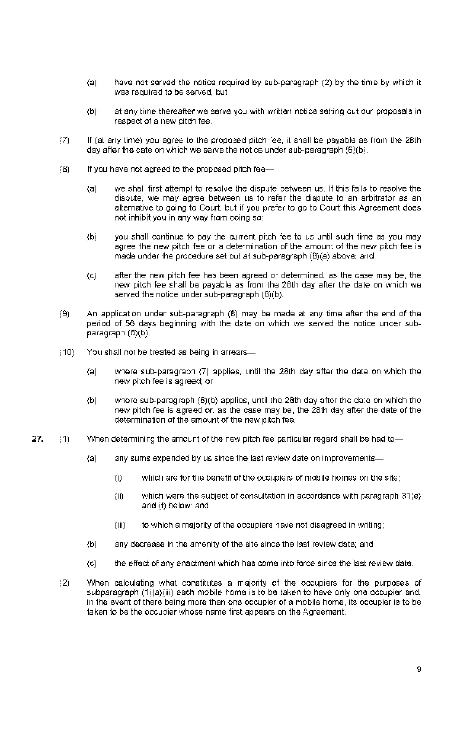
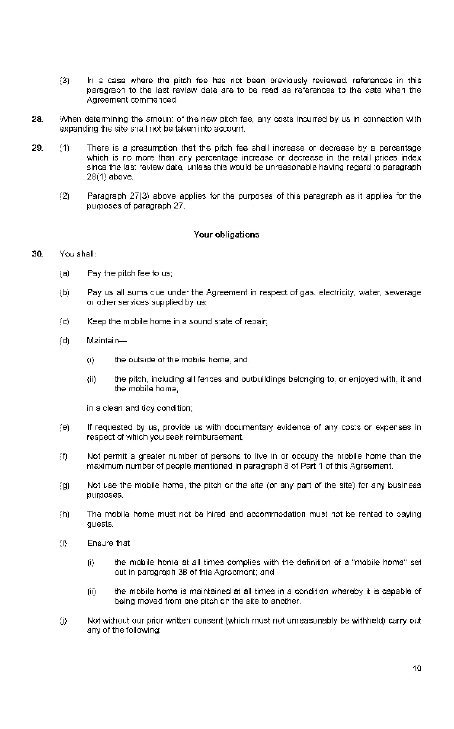
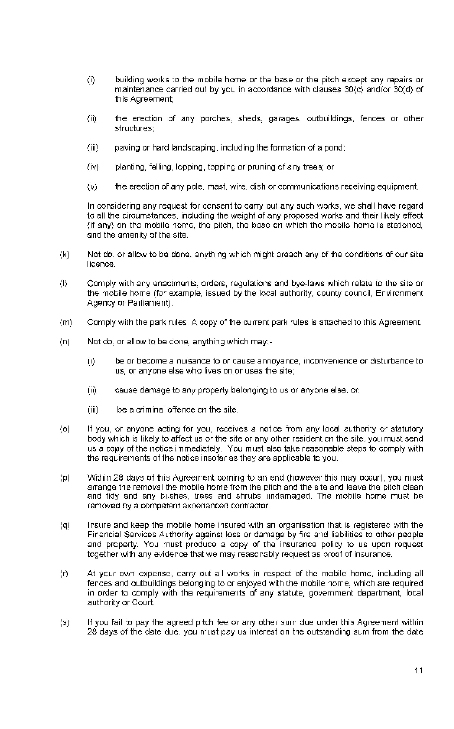
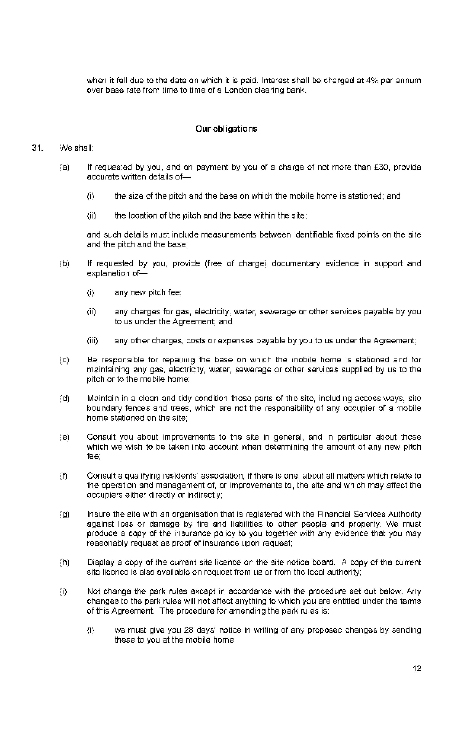
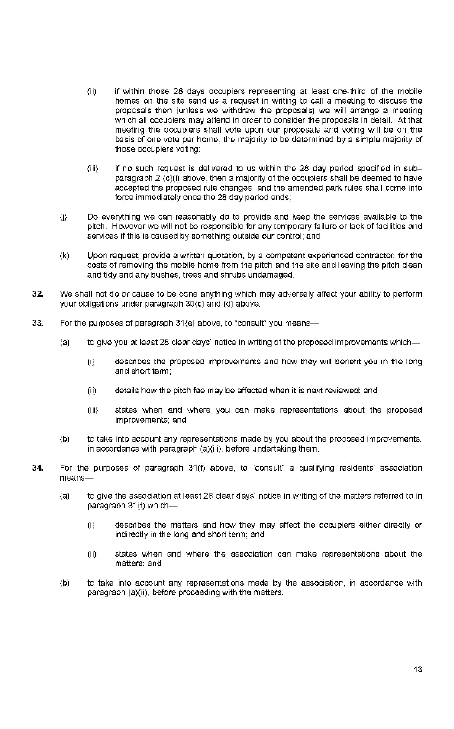
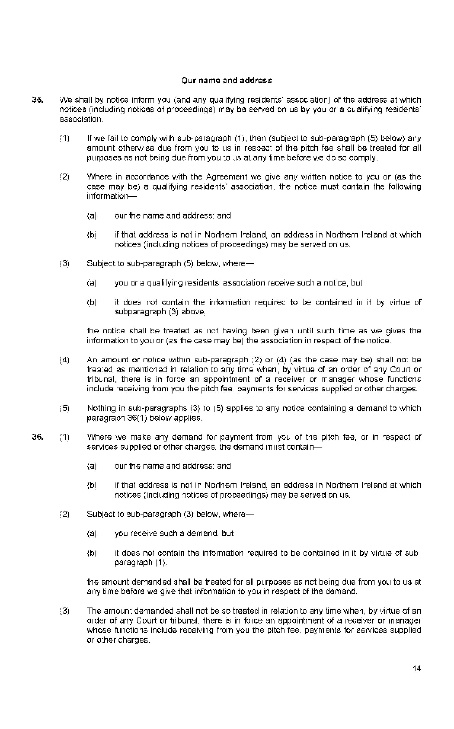
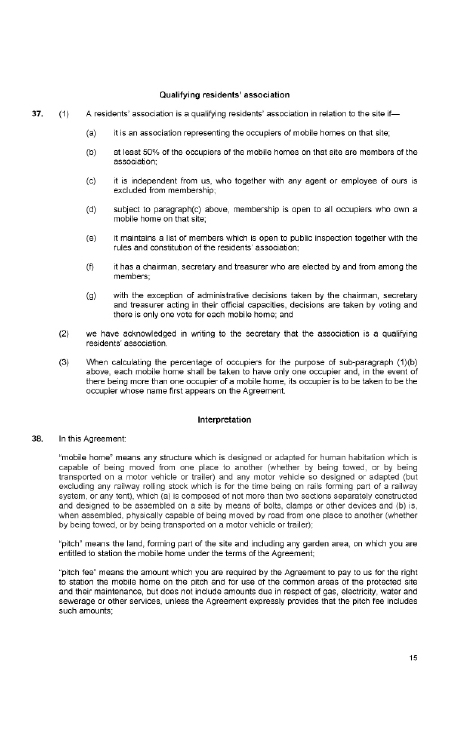

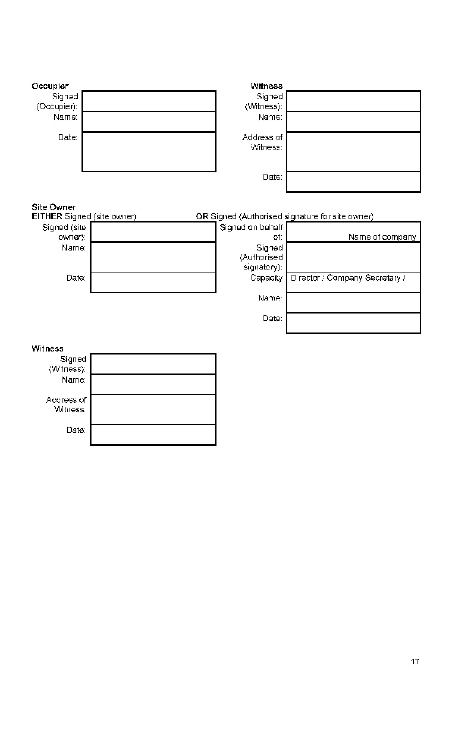

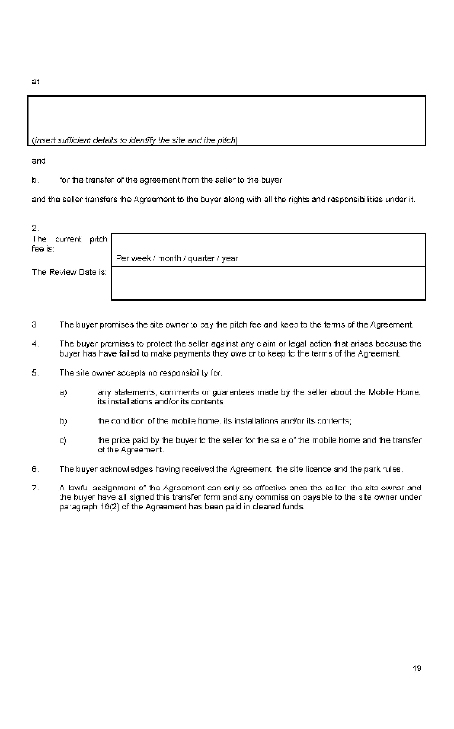
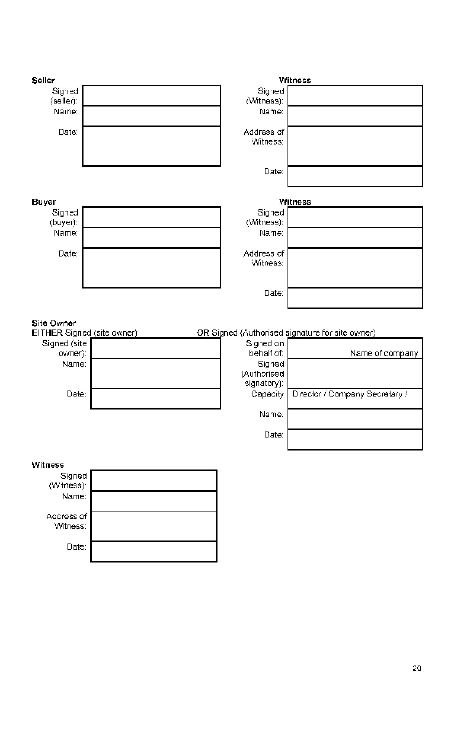

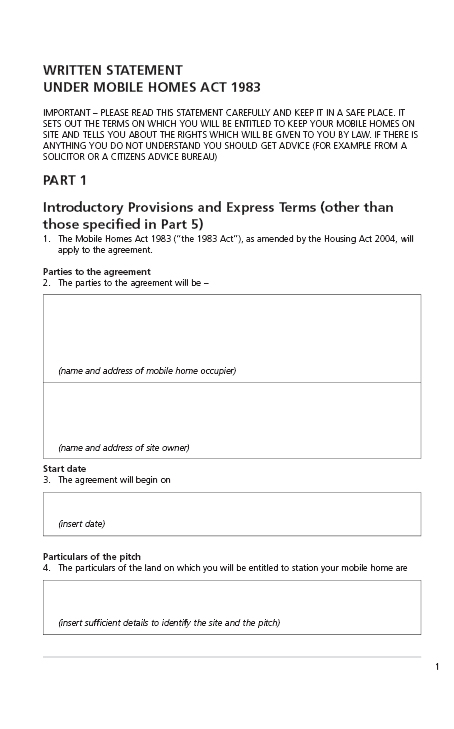

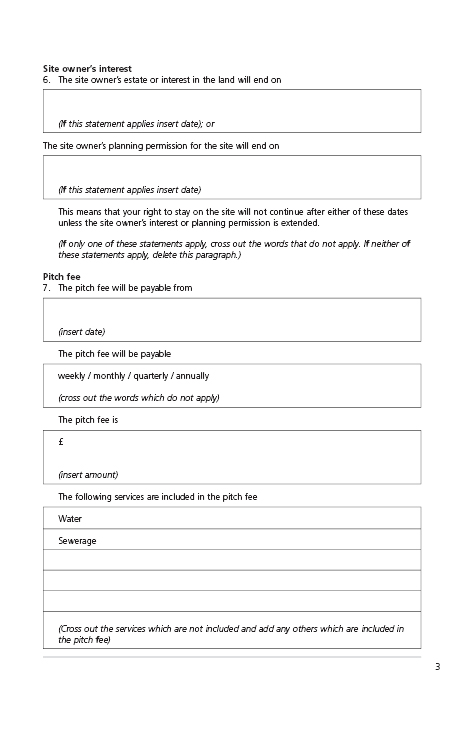

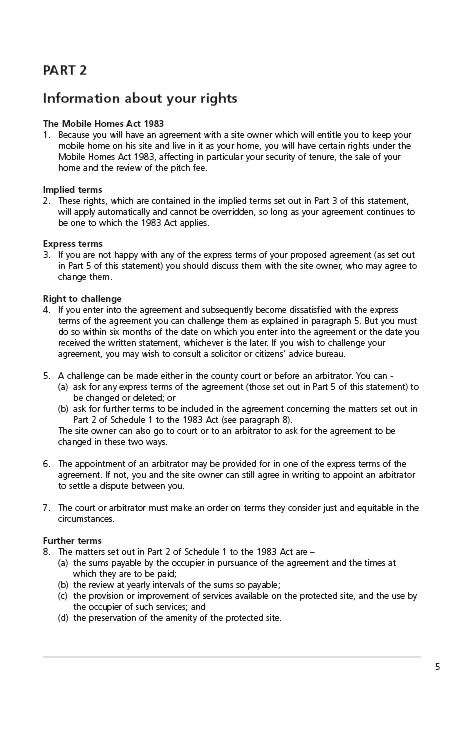
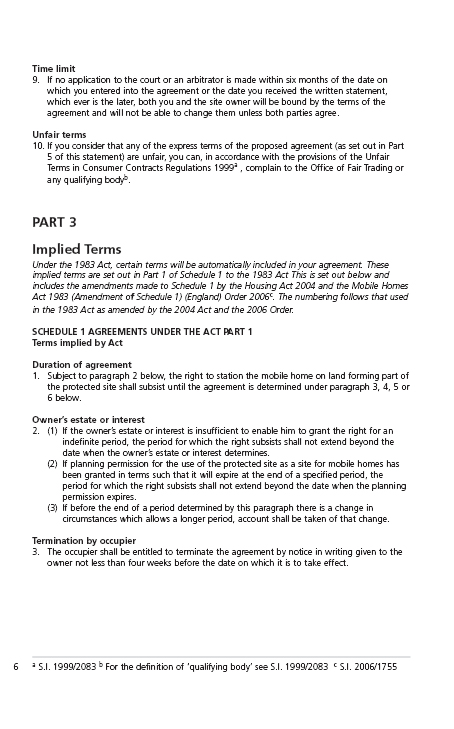
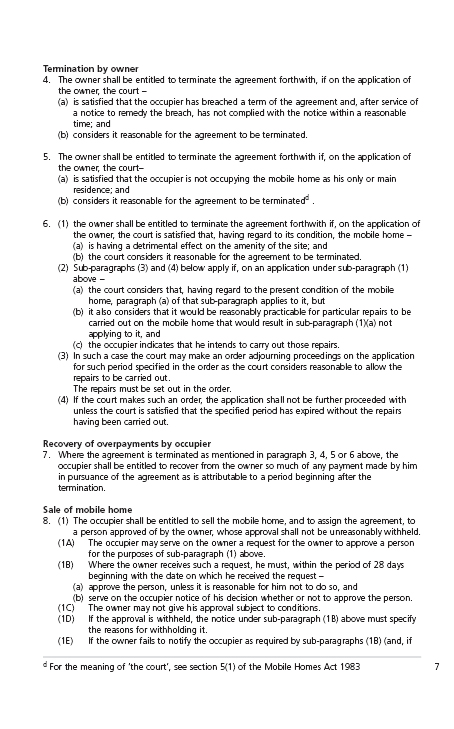
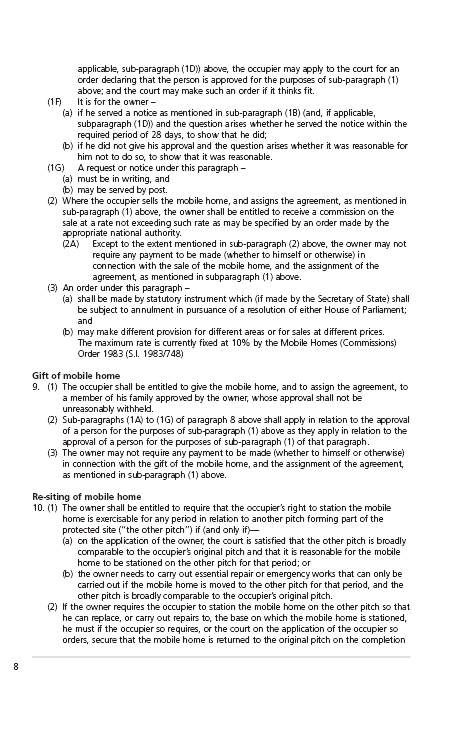
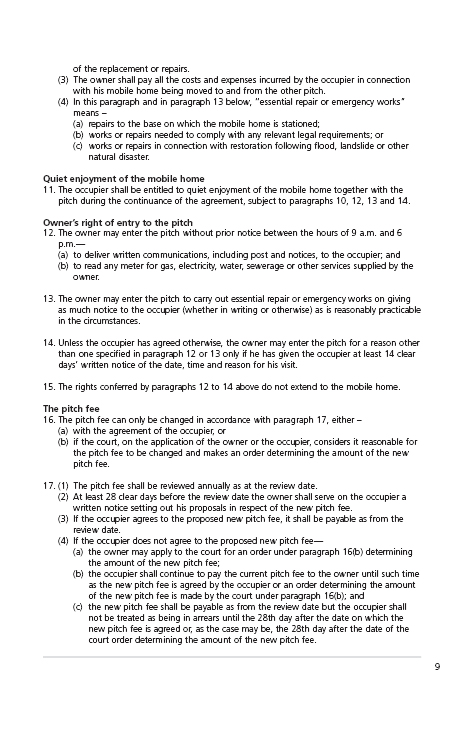
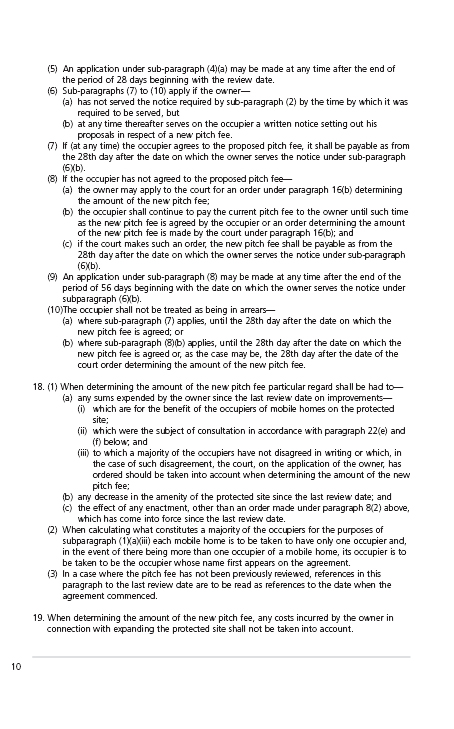
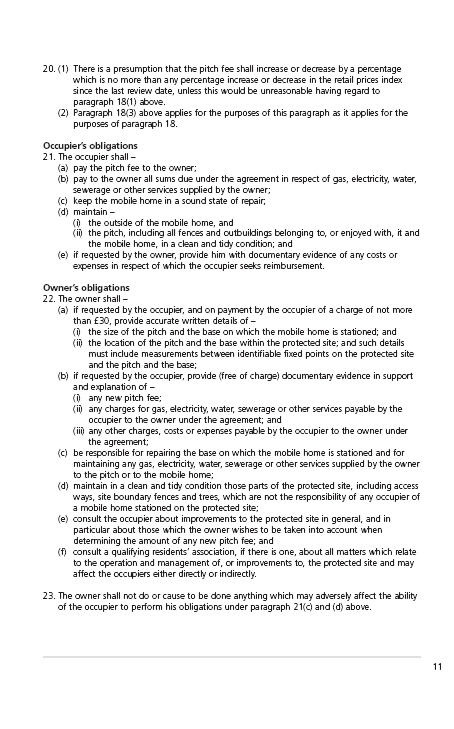
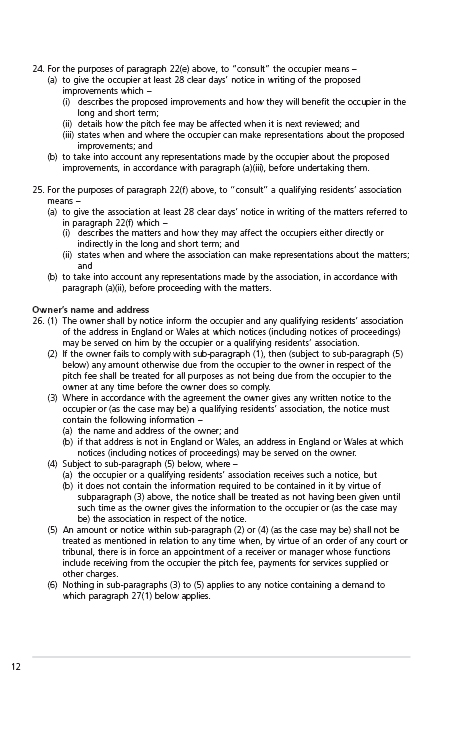
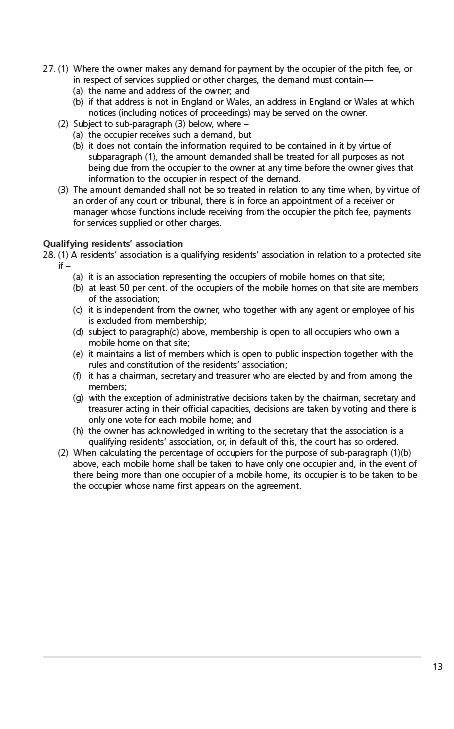
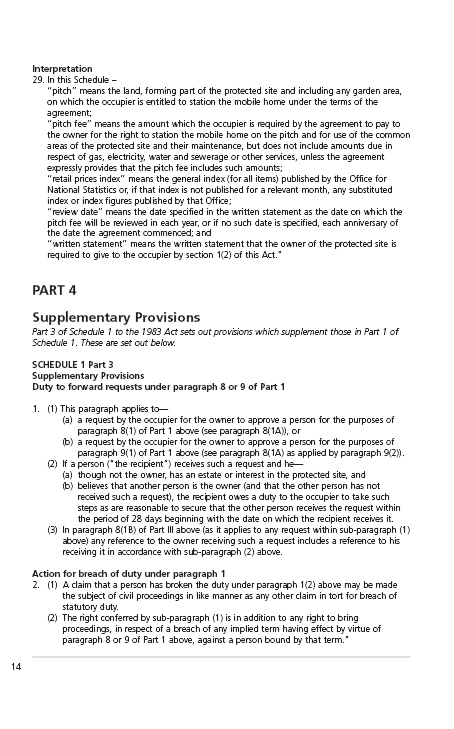
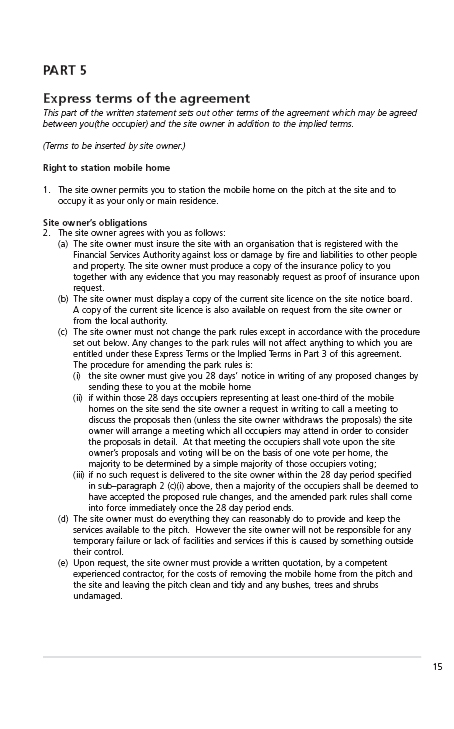
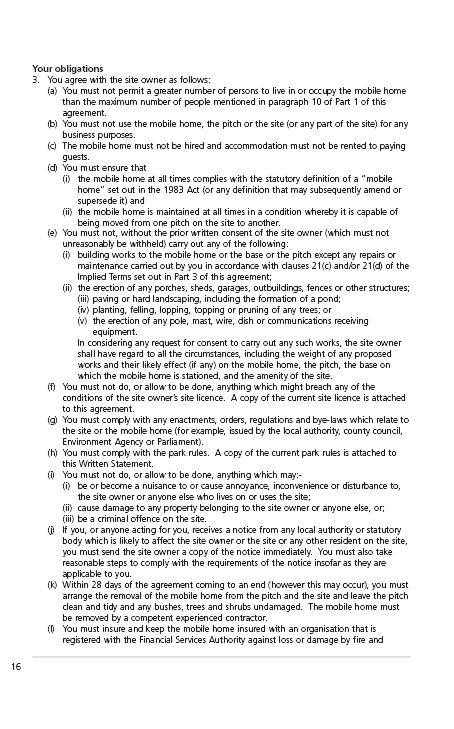
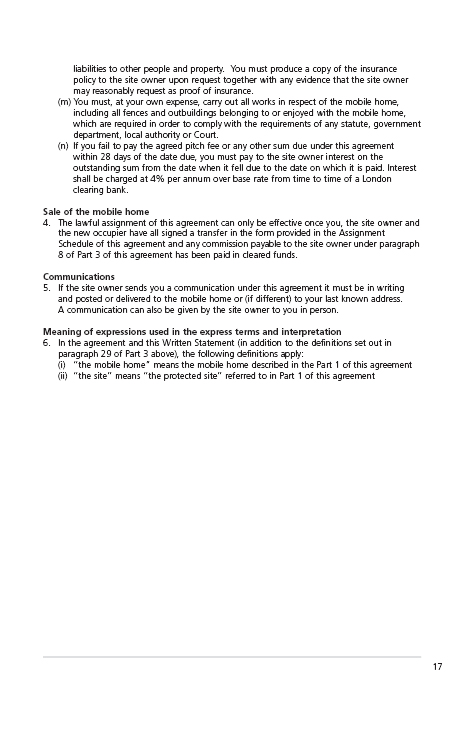

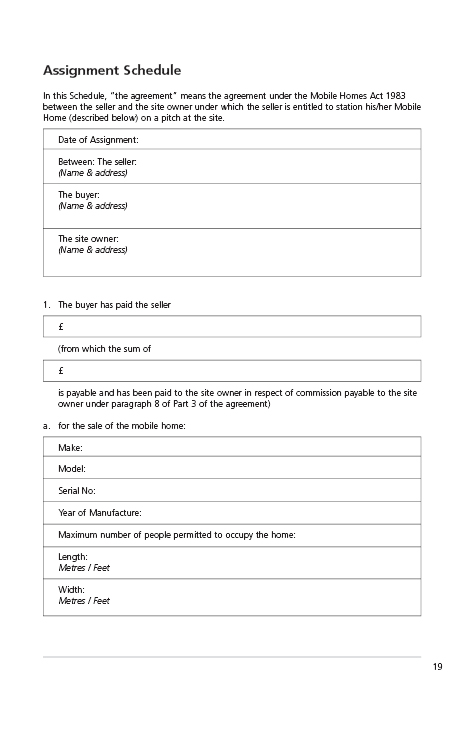



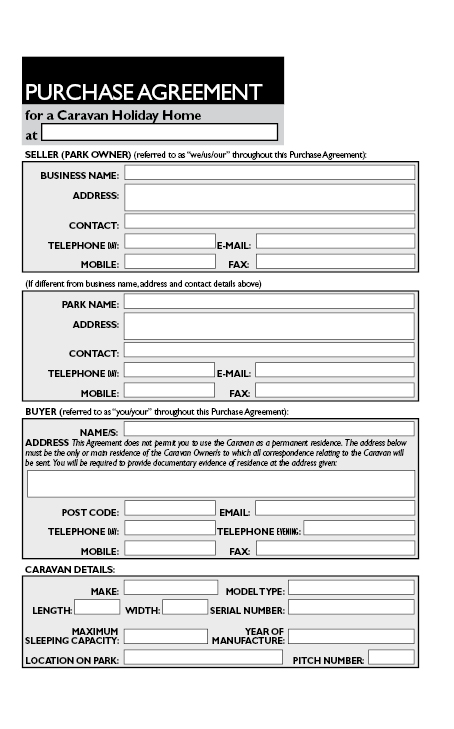
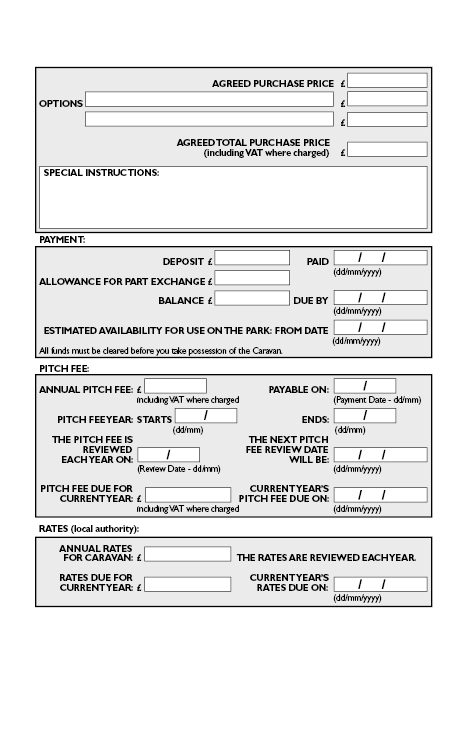
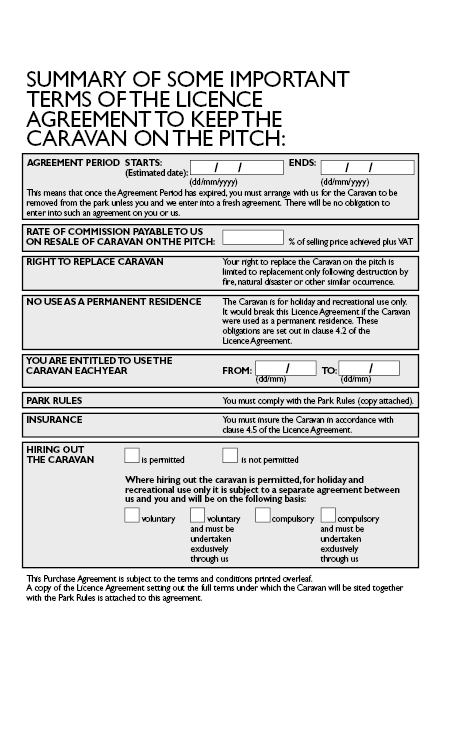
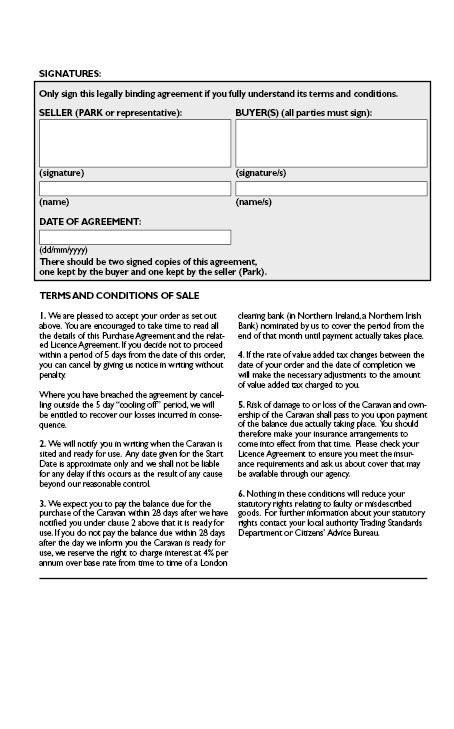
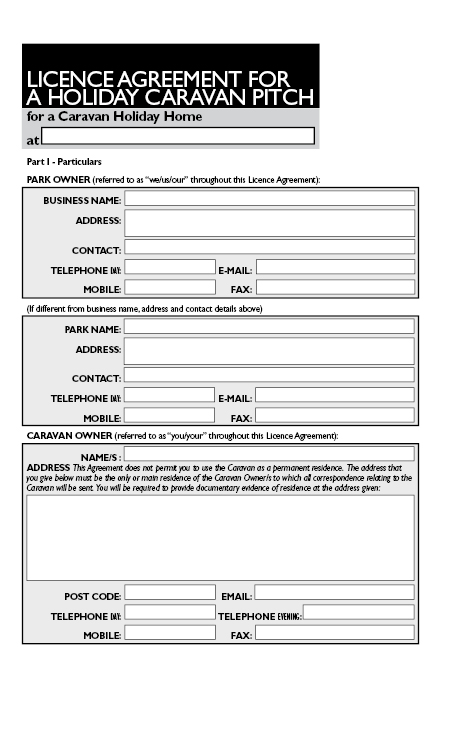
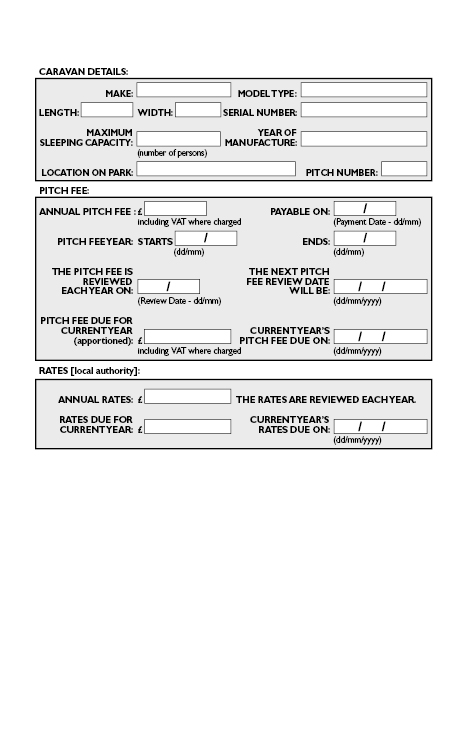
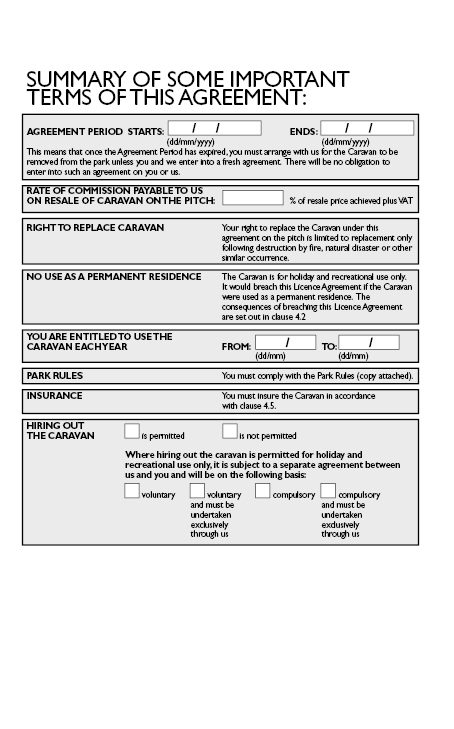
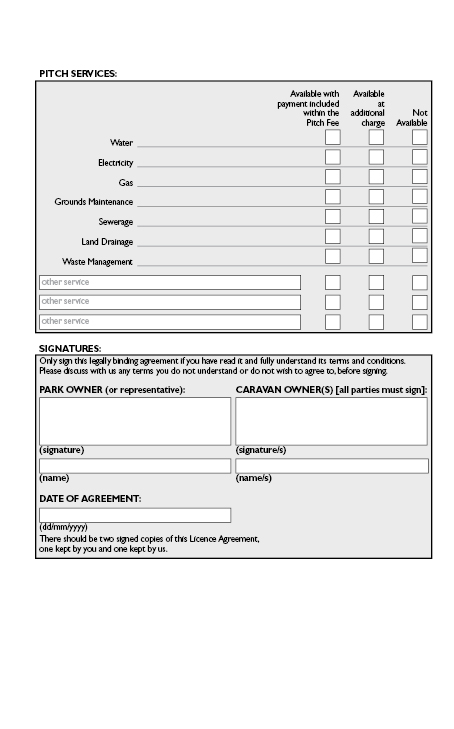
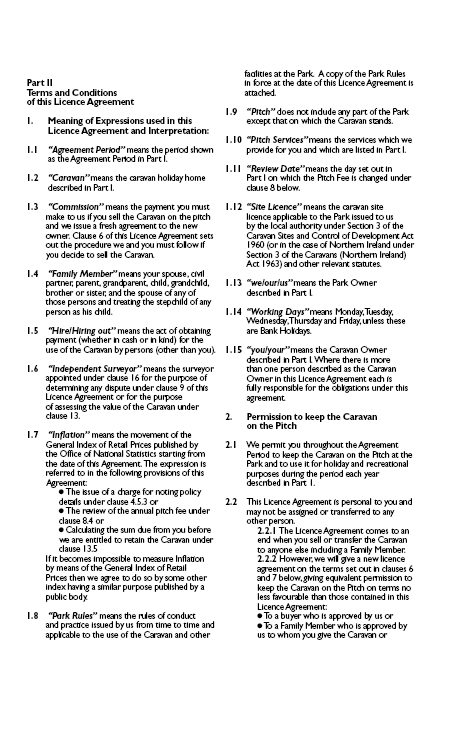
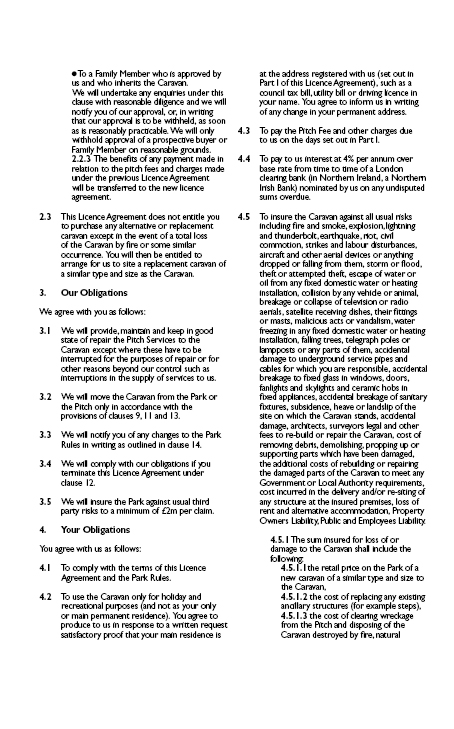
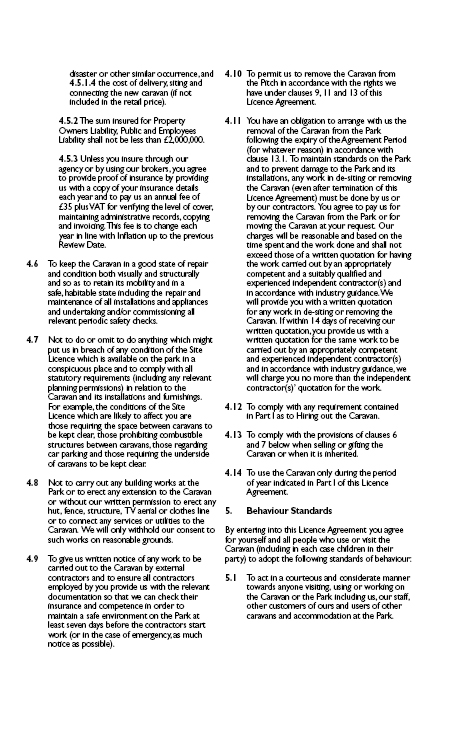
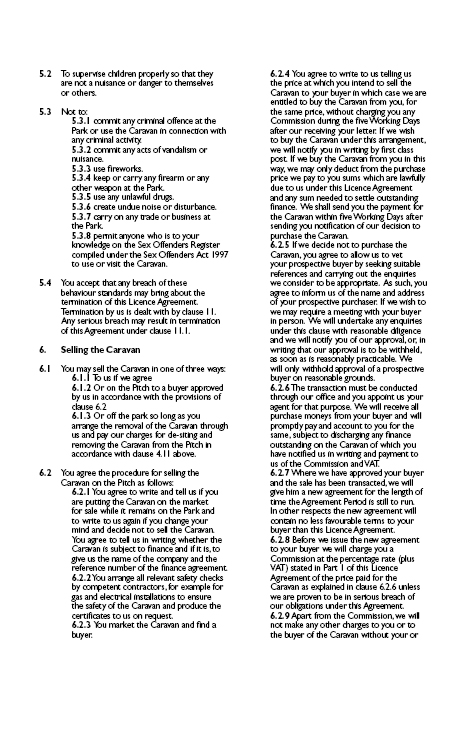
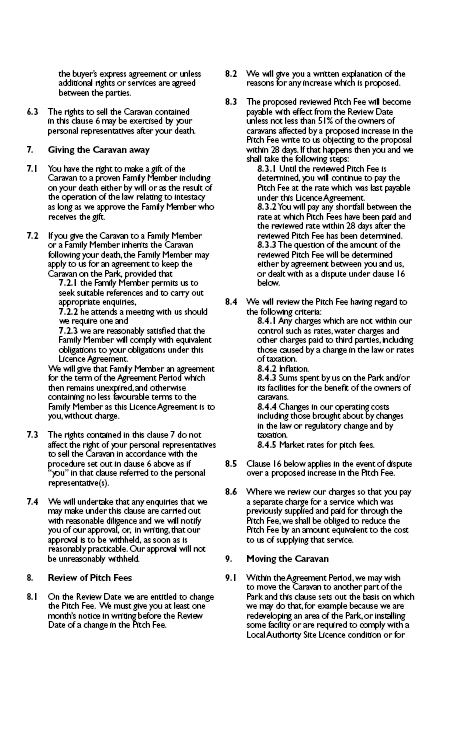
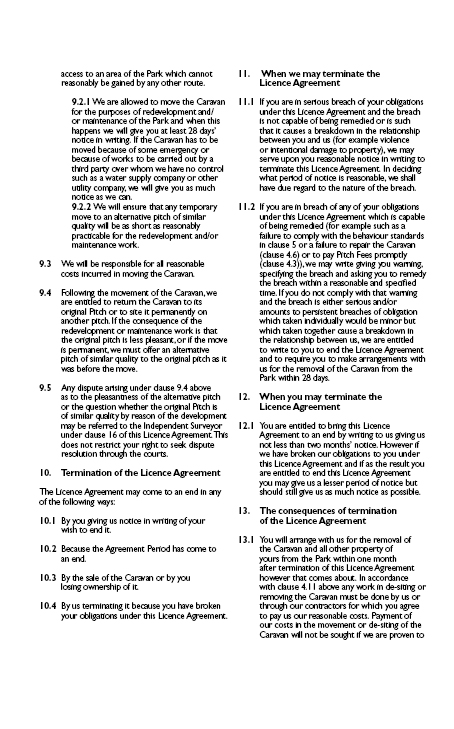
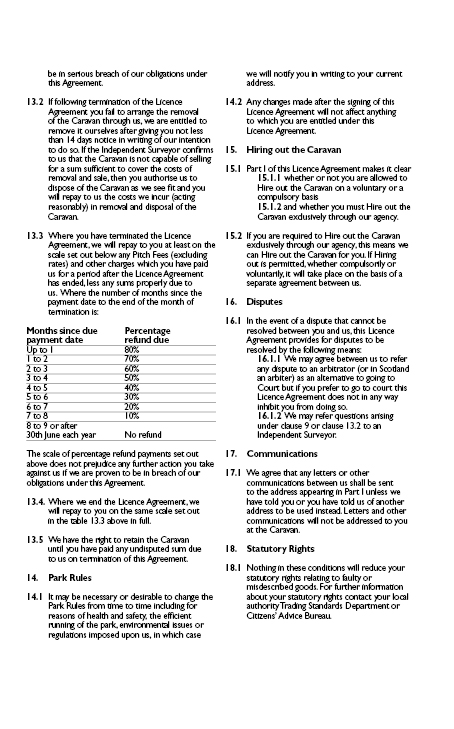
10 May 2010
Further to your correspondence regarding the above subject.
I can confirm that Jordanstown Loughshore Caravan Park which is owned and managed by Newtownabbey Borough Council has no static caravans, the terms and conditions state that a maximum stay is for two nights only.
Therefore based on this information it is felt that The Caravans Bill is not applicable to our situation.
Mr Peter McCallion
Committee Clerk
Committee for Social Development
Room 412, Parliament Buildings
Ballymiscaw
Belfast, BT4 3XX
9 September 2010
Dear Mr McCallion,
Thank you for the opportunity to submit written evidence to the Social Development Committee in relation to the proposed Caravans Bill ("the Bill").
The Bill is of interest to the Housing Executive as it will have implications, in certain circumstances, for its provision of caravan sites to members of the Irish Traveller Community. The Housing Executive has been responsible for the provision of accommodation for members of the Irish Traveller community since December 2003 following the Housing (Northern Ireland) Order 2003 which also transferred to the Housing Executive all travellers' sites then provided by the District Councils. That function is contained in Article 28A of the Housing (Northern Ireland) Order 1981, as inserted by the 2003 Order. I will refer to this as the Article 28A function. A summary of its main provisions are set out in the attached appendix as this is the existing statutory framework within which such sites are to be provided by the Housing Executive
Central to our concerns and the points as set out below is the manner in which the Housing Executive currently carries out its Article 28A function. It does so by the provision of 3 types of site namely, serviced sites, transit sites, and emergency halting sites. There are no legal or statutory definitions of these terms which appear to have evolved over time from planning circulars and indeed can be found in the "Design Guide publication for Traveller' Sites in Northern Ireland" produced and published by the DOE. While this document is undated the document reference suggests that it was published in 1997 thereby significantly predating the role of the Housing Executive.
In accordance with that design publication and established practice, the difference in the sites is essentially linked to the degree of permanency intended to be provided. Serviced sites are intended to provide a permanent place for members of the Irish Traveller community to station their caravan, to
erect timber framed sectional buildings where electricity, water and sewerage is provided and where other facilities such as communal or individual amenity units such as toilets, washing, shower facilities may be provided. The pitches within these sites are provided to members of the Irish Travelling Community on terms and conditions of tenancy which are similar to the Housing Executive's standard conditions of tenancy for dwelling houses subject, of course, to those modifications to reflect the differing nature of the accommodation, the existence of a pitch on site and amenities. The tenancy is a weekly tenancy of an indefinite duration.
In contrast, transit sites and emergency halting stops are designed to meet temporary accommodation needs of Travellers to station their caravans whilst in transit. These are let on the basis of a licence. Occupation of a transit site is governed by a licence for a maximum of three months duration, while occupation of an emergency halting site is on the basis of a licence for a maximum duration of 28 days.
The Housing Executive is mindful of the need and the appropriateness of extending protections to travellers in respect of security of tenure in light of the ECHR decision in the Connors v the UK[1] case and the House of Lords (now the Supreme Court) observations most recently in the Doherty v Birmingham City Council[2] case concerning the incompatibility of the exclusion of Gypsies occupying local authority sites from protection under The Mobile Homes Act 1983 ( the English equivalent of the Bill) with convention rights. However, the Bill as currently drafted raises a number of concerns chiefly around the potential for difficult or adverse implications for the discharge of the Housing Executive's statutory Article 28A function, particularly given the recognised constraints in obtaining the suitable sites needed. These concerns are set out below by reference to specific provisions in the Bill. I would preface this by indicating that it is the view of the Housing Executive, on the advice available to it, that all of its sites would be "protected sites " within the definition contained in clause 15 (1).
1. Section 1 of the Bill. It is understood that Section 1 is intended to apply Part 1 of the Bill to those caravan sites which in essence provide permanent accommodation for the caravan owners. For part 1 to apply, two requirements are to be met. The first is that the person is "entitled" to station the caravan on a protected site and secondly, is entitled to occupy the caravan as their only or main residence for a period exceeding 3 months. The Housing Executive notes that this will clearly apply to all those persons who hold a tenancy with the Housing Executive in respect of the serviced site. However, we have a real concern that as currently framed there is likely to be a measure of legal uncertainty and ambiguity as to the position of those persons who continue to occupy a transit or emergency site beyond 3 months and in excess of the original fixed period of occupation very probably for reasons connected to their housing needs and the unavailability of serviced sites. In our view, this has a real potential for converting what was designed and intended as temporary provision, to facilitate the nomadic aspect of the traveller lifestyle, into a serviced site thereby frustrating the provision of such temporary accommodation. The Housing Executive considers that it would be useful if it was made clear that Part 1 would not apply to any agreement in respect of a site which the Housing Executive has designated a transit or emergency halting site pursuant to its Article 28A functions.
2. It is believed that the situation as described above is distinguishable from that considered in the case of Connors and Doherty both of which involved Travellers who had occupied a site for 16 -17 years. In essence Connors was concerned with the procedural deficiencies believed to deprive him of the opportunity to challenge allegations of anti- social behaviour in the summary procedure used by the local authority to regain possession. In the Doherty case the local authority contended that it required the site to be improved and managed as temporary accommodation for travellers and the claim was not based on any allegation misconduct but rather the ability to challenge an administrative act.
3. However, in the scenario described at item 1 above the sites are designated as transit and emergency halting sites from their inception with associated agreements reflecting this position by way of licence for a fixed period. It is therefore our view that there are no reasonable grounds for them to expect to remain there indefinitely (as there would be on a serviced site with the benefit of an indefinite tenancy) despite any decisions or acts by the Housing Executive extending that stay by further periods of time which it is neither obliged to do nor is the occupier entitled to.
4. It is felt that the policy of providing short term sites to facilitate the nomadic lifestyle of members of the Irish Traveller community can reasonably be considered to be a legitimate and proportionate measure, including the taking of steps to protect those sites from being effectively converted into serviced sites. Otherwise, the reality would be that transit and emergency halting sites would be at risk of ceasing to be generally available and indefinitely allocated.
5. The absence of clarity as to the application of the Part I of the Bill in the circumstances described above may well give rise to an undesirable pressure to take steps to remove caravan owners from those sites to avoid any risk of litigation by individual caravan owners seeking to assert security of tenure under the Bill. An unwelcomed consequence of this could be the potential of exacerbating the incidence of unauthorised encampments.
6. Section 3 – implied term. The terms implied by Section 3 are set out in Part 1 of the Schedule to the Bill and the agreement will subsist until determined under paragraph 3, 4, 5 or 6. Essentially, determination is by 4 weeks' notice by the occupier; or termination by the owner for breach of the agreement, non-occupation by the occupier and the condition of the caravan, all of which are subject to the court being satisfied that it is reasonable for the agreement to be terminated. These will clearly apply to caravan owners on serviced sites and extend a comparable protection to those caravan owners as those available to secure tenants of the Housing Executive
7. It would be helpful to all parties to have it clearly recorded that the Housing Executive shall be entitled to recover part of a transit or emergency halting site upon expiration or determination of its residential agreement with a person without having to prove a fault related ground as is required by Paragraph 4, 5 or 6 of Part 1 of the Schedule of the Bill. It would, however, be preferable for legal certainty and clarity, as suggested earlier, to make a specific amendment to Clause 1 of Part 1 exempting transit and emergency halting sites from the application of this part.
8. Assignment of the residential agreement to which Part I applies. The implied terms (paragraph 8 and 9 of Part I of the Schedule of the Bill) entitle the occupier to either sell their caravan or gift it to a family member and, to assign the agreement to live on that particular pitch to that person, providing that the site owner approves that person. Given the shortage of serviced sites and indeed transit and emergency sites, the application of these terms to serviced sites (and, in certain circumstances, potentially to transit sites or emergency halting sites, unless they are expressly excluded from the scope of Part 1) could encourage and promote the occupation of pitches on those sites by those who can, for example, afford to pay the most rather than on the basis of meeting those in greatest housing need. In addition, the reasonableness of the site owner's refusal to approve the purchaser will be a matter for judicial discretion which to the extent that it is a subjective matter is difficult to anticipate.
9. The clearest way of addressing the issues identified at item 8 above would be to expressly specify within the relevant provisions that they do not apply to Housing Executive sites for members of the Irish Traveller community. This would maximise potential site availability. An alternative would be to make specific provision in paragraphs 8 and 9 obliging the Housing Executive to consider the accommodation needs of members of the Irish Traveller community in that locality and the general circumstances prevailing in relation to Housing Executive caravan sites in Northern Ireland when making an approval decision.
10. Re-siting of caravan – paragraph 10 of Part 1 of the Schedule to the Bill enables the site owner to require an occupier to move their caravan to another pitch on site, for example to allow essential or emergency works to be carried out. As drafted this would restrict the Housing Executive to relocating a caravan on the same site. This does not allow for the possibility that there may well be circumstances to move occupiers to another site depending on the nature and extent of the proposed works. In those circumstances, to avoid inadvertently limiting the extent of works that can be undertaken due to this "same site" restriction, the implied term should be amended to enable the Housing Executive to also require an occupier, to which Part 1 applies (serviced sites) to move their caravan to a pitch on another site. In addition, as serviced sites have amenity blocks and we already accept responsibility under the current standard conditions of tenancy for their repair, it would be prudent to amend the definition of "essential repair or emergency works" to include works to the amenity block on Housing Executive serviced sites allowing relocation of a caravan to be required in those circumstances.
11. Section 5 of Part 1- Section 5 makes provision for succession. We have concerns that this has the potential to exacerbate difficulties caused by the shortage of serviced sites.
12. Clause 5(3)(b) of the Bill provides that where there is no person qualified to succeed by way of being a spouse, civil partner or family member who resided with the deceased, a person can inherit the caravan either by way of the deceased's will or under the rules of intestacy. The difficulty for the Housing Executive is the combined effect of this sub-clause with sub-clause 4. If these two provisions come into play the effect is that the person who inherits the caravan (the "inheritor") takes the benefit of, and is bound by, the residential agreement. But, he does not become entitled or bound to occupy the caravan, nor can the site owner use his non-occupation as a ground for terminating the agreement (exclusion of schedule, part 1, paragraph 5), nor has the inheritor the express power to give the caravan and the residential agreement away (exclusion of schedule, part1, paragraph 9). The net effect is that the "inheritor" has an agreement which the site owner cannot terminate and which the "inheritor" can realise by sale. This means that if the inheritor does not remove the caravan from the site or seek to sell it and assign the agreement, or the site owner withholds approval of the person to whom they propose to assign the agreement, the caravan could potentially remain empty on the pitch at a time when there is a shortage of authorised sites.
13. Accordingly, it is considered that Clause 5(3)(b) should be amended so that it does not apply to sites provided by the Housing Executive pursuant to Article 28A of the Housing (NI) Order 1981.
14. The Caravans Act 1963 - The Housing Executive has been requested to give its views on the question of the site licence requirement imposed by the Caravans Act 1963. It is the Housing Executive's view that the effect of section 1 of the Caravan's Act 1963 is to require site licences for certain sites provided in its capacity as a public body charged with the implementation of the Article 28A function.
15. Section 1(1) obliges an occupier of any land not to cause or permit any part of it to be used as a caravan site unless he is holder of a site licence (under the 1963 Caravans Act, authorising the use of land for the Caravan Site) for the time being enforced. By virtue of sub- section 3, the Housing Executive is the occupier in relation to any relevant land where it is let by it by way of licence. As explained earlier the Housing Executive grants licenses to occupiers of its transit and emergency halting sites. Accordingly, section 1 requires the Housing Executive to seek and obtain a site licence in respect of those sites. The position is slightly different where the land is let under a tenancy which is the position with serviced sites. In those circumstances, the Housing Executive is the occupier, for the purposes of that Act, where the caravan site is not more than 400 square yards in area. However, where a relevant caravan site is more than 400 square yards in area and let under a tenancy, section 1(3) the 1963 Act provides that it is the tenants who are the occupiers. In those circumstances the obligation to obtain a site licence would rest with the individual Traveller tenants.
16. The Housing Executive is of the view that the application of the current licensing regime to its exercise of its Article 28A powers in respect of the development and provision of Travellers' sites imposes upon it an unnecessary and unduly bureaucratic process and that it should be exempt from such requirements. It is believed that any concerns regarding site standards can be met through the Planning Permission regime. This regime would also maintain the role of District Councils in the development of new Housing Executive sites within their areas. The case for such an exemption is also supported by the fact that when the responsibility for the provision of such sites lay with the District Councils, provision was made exempting such sites from the site licensing requirements at paragraph 11 of the Schedule to the 1963 Act. Paragraph 11 provided that a site licence shall not be required for the use of the caravan site of land occupied by the District Council. Similarly, in England, there is legislation which provides that a site licence should not be required for use of land occupied by a County Council (or in Scotland, a regional Council) as a caravan site providing sites for gypsies (paragraph 11A of the Caravan Sites and Control of Development Act 1960).
17. The absence of an exemption relating to the Housing Executive's exercise of its Article 28A powers would appear to be a legislative anomaly which can impede the effective discharge of its statutory function; for example, the imposition of unduly onerous requirements being imposed by way of site licence conditions that exceed planning requirements and/or the DOE Design Guide requirements for a particular type of site. If the Housing Executive considers a condition inappropriate, it can appeal against that condition to the local Magistrates' Court. If the magistrate is satisfied the condition is unduly burdensome, s/he may vary or cancel it. It is not considered an appropriate use of public funds or resources to litigate on such matters between public bodies and local government. Accordingly, we would seek exemption from the said licensing requirements for both the Housing Executive and individual tenants.
The Housing Executive is happy to attend a meeting of the Committee if it is considered necessary or useful in respect of any of the above issues.
Yours sincerely,
Colm McQuillan
Assistant Director
Strategic Partnerships
Article 28A of the Housing (Northern Ireland) Order 1981, as inserted by Article 125 of the Housing (NI) Order 2003, provides as follows:
"28A – (1) The Executive –
(a) shall provide such caravan sites as appear to it to be appropriate for the accommodation of caravans of members of the Irish Traveller Community and
(b) may manage those sites or lease them to some other person."
Article 28A (3) gives the Housing Executive power to provide any serviced or facilities for those occupying such sites as appears to it to be desirable and appropriate for the health or convenience of those occupants. Furthermore, sub paragraph 4 obliges the Housing Executive that in exercising its powers under this provision, the Executive shall have regard to model conditions specified by the Department of the Environment under Section 5(7) of this Caravans Act (NI) 1963. Sub paragraph 5 obliges the Housing Executive to make reasonable charges, as it may determine, in respect of the use of the caravan sites provided by it, and of any serviced or facilities as they are made available under the provision. It should be noted the Housing Executive does not have any power under Article 28A to provide caravans.
[1] Application no. 66746/01
[2] [2008] H.L.R. 45, 785
|
Northern Ireland Housing Executive Telephone: 028 9031 8409 |
|
Mr Peter McCallion
Committee Clerk
Committee for Social Development
Room 412, Parliament Buildings
Ballymiscaw
Belfast
BT4 3XX 29 September 2010
Dear Mr McCallion,
Your letter of 21 September 2010 addressed to the Department for Social Development has been forwarded to me for a response on behalf of the Housing Executive.
The Committee has sought further information from the Housing Executive in respect of three matters. Firstly, detailed information is requested regarding the current site provision by the Housing Executive in its statutory role. Secondly, our views have been sought on whether or not the extension of the period specified in Clause 1(1)(b) of the Bill from 3 months to 1 year would significantly favourably change the impact of the Bill for the Housing Executive in the context of emergency halting, transit and serviced sites. Thirdly, the Committee has asked as to how the rights of Travellers who have a tenancy exceeding one year (for these purposes, "Part 1 Tenants") would compare with social housing tenants in similar circumstances.
The Housing Executive currently manages one emergency halting site, four transit sites and five serviced sites*. These are detailed together with the additional information requested in tabulated form in the attached appendix one.
Ideally, the Housing Executive would have preferred, for absolute clarity, for express provision that Part 1 applied to its serviced sites only. It was believed that this would avoid any unintended consequences which could lead to the undermining of the long term policy objective and intent of providing a way of facilitating the nomadic aspect of the Irish Traveller lifestyle; the delivery of which is intended to be achieved in the long term by the provision of sites offering short term site accommodation rather than indefinite permanent site accommodation i.e. transit and emergency halting sites.
*Of the five serviced sites, one is owned by a Housing Association but managed by NIHE.
The original concern in respect of the impact of the Bill on emergency halting and transit sites was around the potential for legal uncertainty and associated satellite litigation. For example, where an occupant seeks to assert Part 1 Tenants rights in a situation where he/she has, in the opinion of the Housing Executive, overstayed their permitted occupancy on a transit site. It is considered that the extended period of one year should reduce this risk as well as highlighting that the objective of the Bill is to catch those sites which are intended to provide a degree of residential permanency for the purposes of the statutory protections but as noted earlier we would prefer this to relate to serviced sites only.
The Committee has also sought clarification as to how the rights of Part 1 tenants compare with those rights enjoyed by secure tenants of Housing Executive properties. It should be noted that secure tenancies are governed by various housing orders, primarily the Housing (Northern Ireland) Order 1983, as amended ("the 1983 Order"). The Caravans Bill is not, as we understand designed to replicate the rights and duties as set out in the 1983 Order for certain occupants of mobile home parks. Subject to this caveat, however, I have set out the main statutory rights of secure tenants and what appear to be those broadly corresponding rights for Part 1 Tenants under the current Bill. Again this is set out in tabulated form in appendix two.
I trust that you will find the above comments and attached appendices useful.
Yours sincerely

Assistant Director
Strategic Partnerships
| Number of Pitches | Occupancy |
|
|---|---|---|
| 1. Emergency Halting Site | ||
| Legahory Close, Craigavon | 8 |
Fully occupied by 8 families for 15 months |
| 2. Transit Sites | ||
| The Glen, Coalisland | 4 |
Fully occupied by 4 families in excess of 1 year |
| Daisyfield, Derry | 12 |
One family in occupation for some 4 months. |
| Ballyarnett, Derry | 8 |
Three families in occupation in excess of one year. |
| Greenbrae, Strabane | 8 |
Fully occupied by 8 families for a period of 8 months. |
| 3.Serviced Sites | ||
| Glen Road Heights | 10 |
Indefinite duration |
| Ballinamullan, Omagh | 6 |
Indefinite duration |
| Acorn Grove, Craigavon | 6 |
Indefinite duration |
| The Glen, Coalisland | 16 |
Indefinite duration |
| Glen Road (Clanmil Site) | 6 |
Indefinite duration |
Secured tenant's rights are contained in various Housing Orders, primarily the Housing (Northern Ireland) Order 1983 as amended by subsequent housing Orders – referred to below as the 1983 Order.
Statutory Rights |
Secure tenants |
Part 1 Tenants |
|---|---|---|
| Compensation for qualifying repairs | Yes (Article 38A, 1983 Order) | No |
| Compensation for qualifying improvements | Yes (Article 34A, 1983 Order) | No |
| Right to succession | Yes (Article 26, 1983 Order limited to one statutory succession) | Yes (Clause 5, unlimited number of statutory successions) |
| Assignment | Yes (Article 32A right to assign by way of exchange with another secure tenant and Article 32 assignment capable, but not a right in specified circumstances such as pursuance of a court order in matrimonial proceedings and persons who would be entitled to succeed by way of Article 26 had the tenant died immediately before the assignment) | Yes, (Schedule of Bill, Part 1– right to assign on sale of caravan (para 8) and by gift (para 9) and to a person entitled to inherit by will or under intestacy [Clause 5(3)(b) and Clause 5(4)]). These would appear to be wider rights of assignment than those corresponding rights of a secure tenant. |
| Right to Buy [dwelling-house] | Yes (Article 3, 1983 Order – under a statutory scheme after 5 years) | N/A (Article 28A, 1983 Order expressly provides that the Housing Executive shall not have power to provide caravans under that Article). |
| Right to take in lodgers | Yes, (Article 30, 1983 Order) | No |
| Right to sub-let part of dwelling house | Yes, (Article 30, 1983 Order) | No |
| Right to be consulted on housing management issues | Yes, (Article 40, 1983 Order) | Such a right is derived from the owner's (NIHE) obligation to consult with a qualifying residents' association (Schedule of Bill, Part 1, para 22(f)). However, it should be noted that para 22(e) obliges the owner (NIHE) to consult the occupier about improvements to the site. |
| Security of tenure | Yes, (Article 27, possession by way of court order on a statutory ground (Schedule 3 - thirteen grounds for possession)) | Yes, (Schedule of Bill, Part 1 para 4 – possession by way of court order on a statutory ground (three statutory grounds)) |
Dear Peter
We were pleased to avail of the opportunity to give evidence on the Caravans Bill to the Social Development Committee on 17 June past.
A question arose during the discussion in relation to the operational procedures used by district Councils to deal with the issue of site licences for caravan sites. Whilst this is primarily a matter for local government themselves to outline we agreed to provide some further information to the Committee on this matter:
As mentioned in our submission, the provision for district Councils to issue site licences is found in section 3 of the 1963 Caravans Act. This Act does not prescribe the internal procedures of Councils to administer such requests. We have however looked at a number of Council websites. In Belfast City Council, Dungannon & South Tyrone Borough Council and Fermanagh District Council such applications are handled by the environmental health departments of the Council. In correspondence with Belfast City Council it was confirmed to us that it was likely political authorisation (i.e. a decision by the Council or a committee) would be sought before granting a site licence, albeit that this is in the context that the City does not at present have any licensed sites.
I hope this information is of use.
Daniel Holder
Policy Worker
Northern Ireland Human Rights Commission
Temple Court, 39 North Street
Belfast BT1 1NA
tel. +44 (0)28 9024 3987
fax +44 (0)28 9024 7844
SMS: +44 (0)7786202075
textphone (028) 9024 9066
e-mail daniel.holder@nihrc.org
www.nihrc.org
1. The Northern Ireland Human Rights Commission (the Commission) is a statutory body created by the Northern Ireland Act 1998. It has a range of functions including reviewing the adequacy and effectiveness of Northern Ireland law and practice relating to the protection of human rights,[1] providing legal advice and representation in human rights proceedings,[2] and advising on whether a Bill is compatible with human rights.[3] In all of that work, the Commission bases its positions on the full range of internationally accepted human rights standards, including the European Convention on Human Rights (ECHR), other treaty obligations in the Council of Europe and United Nations systems, and the non-binding 'soft law' standards developed by the human rights bodies. In accordance with its mandate, the Commission also delivered advice to government on the content of a Bill of Rights for Northern Ireland on 10 December 2008.[4]
2. The Commission welcomes the invitation to provide written evidence to the Committee on the Caravans Bill which was introduced to the Northern Ireland Assembly on the 26 April 2010 as a Private Members' Bill by John McCallister MLA.
3. The Commission views the Bill as having the potential to fulfil a number of positive human rights obligations by affording tenancy rights to persons residing in caravans.
4. In providing advice the Commission cannot 'support' a Bill per se. Given our statutory independence, our role is limited to providing an assessment of the human rights compatibility of the proposed legislation. At present this is not fully reflected in the current explanatory notes and we would request that they be amended in due course.
5. Rights to adequate housing are provided for in international human rights standards to which the United Kingdom is party, including the International Covenant on Economic, Social and Cultural Rights (ICESCR). The authorative interpretation of a framework for 'adequate housing' under the ICESCR includes provision relating to legal security of tenure (referring to protection against forced eviction and harassment) for all types of accommodation.[5] This United Nations instrument is binding on the UK in international law, but not directly enforceable in the domestic courts.
6. The main provisions of the European Convention on Human Rights (ECHR) are directly accessible in local courts having been given further effect by the Human Rights Act 1998. That Act provides that legislation must be read and given effect in a manner compatible with ECHR rights. The ECHR does not include an explicit right to housing; however in particular circumstances duties in relation to housing can fall within the scope of ECHR rights, including the right to family life under Article 8, property rights under Article 1 of the First Protocol, and the right to protection from inhuman or degrading treatment under Article 3. These and other ECHR rights have to be read alongside the prohibition of discrimination in Article 14 of the ECHR which provides that the rights "shall be secured [to everyone within the jurisdiction of the State] without discrimination on any ground", meaning that differential treatment between protected groups has to be objectively justifiable.
7. The purpose of the Bill is to improve legal security of tenure (including protection from eviction and harassment) for persons residing in caravans on caravan sites. The Commission welcomes this intent which can positively contribute to the right to housing for all caravan dwellers. In addition to progressing security of tenure for all caravan–dwellers the Commission's particular interest in the Bill is its relationship with the accommodation needs of members of the Irish Traveller community. The Commission has identified this as a priority issue in relation to human rights compliance, and the accommodation situation for Travellers in Northern Ireland has been highlighted by United Nations and Council of Europe experts in the monitoring of compliance by the UK with its international treaty obligations.
8. In 2009 the United Nations body overseeing the UK's compliance with obligations under the ICESCR raised concerns regarding the present situation of Travellers and urged the provision of sufficient, adequate and secure sites. The Committee also commented on the discriminatory effect of the Unauthorised Encampments (Northern Ireland) Order 2005 and urged its review.[6]
9. The Council of Europe, in relation to compliance with the UK's obligations under the Framework Convention for the Protection of National Minorities (FCNM), has also singled out the accommodation situation of Irish Travellers. In response to observations on the subject by the FCNM treaty monitoring body the UK stated that in Northern Ireland there was adequate funding for accommodation for Travellers but conceded that there were 'constraints' in obtaining the suitable sites needed. The UK argued this was a problem being actively addressed by the Department for Social Development and the Northern Ireland Housing Executive (NIHE).[7] Subsequently the Council of Europe's Committee of Ministers adopted a resolution in relation to the UK's compliance with the FCNM, which included among its issues of concern:
Hostility among some people within the local population and the resistance of certain local authorities to improving the availability of authorised sites have contributed to the fact that a number of Gypsies and Travellers continue to live on unauthorised sites and may face eviction orders.[8]
10. Caravans legislation therefore, as well as addressing housing conditions for non-Travellers residing in caravans, has the potential to make a considerable impact on the accommodation situation for Travellers.
11. The Commission notes that the present situation, where there is a marked differential between tenancy rights of those residing in houses and caravans, is unsatisfactory and engages human rights compliance. As this will impact disproportionally on members of the Traveller community living in caravans, it could constitute indirect racial discrimination in the right to housing. In addition within the non-Traveller caravan resident population, if particular groups of persons, for example older persons, are strongly represented there could also be a similar disproportionate impact on them. As there appears to be some evidence of this differential it is likely that the present situation also engages protections against indirect age discrimination.
12. The UK courts, and legislators operating within a framework of ECHR compliance, must have regard to case law from the European Court of Human Rights. This includes, of particular relevance to this Bill, Connors v the UK.[9] In Connors the lack of protection against eviction afforded to Traveller sites in England, which contrasted unfavourably with the levels of protection afforded to other tenants, was found to breach Article 8 of the Convention. The UK is yet to satisfactorily discharge measures it needs to take to implement the judgement.[10] In England and Wales legislation was introduced in 2008 to amend the definition of a "protected site" in the Mobile Homes Act 1983 to cover local authority Gypsy and Traveller sites. This provision is still awaiting commencement and will not cover Northern Ireland, for which the Caravans Act 1963 is the equivalent legislation. Hence to discharge the obligation to implement the judgement legislation is required in Northern Ireland, and this can be dealt with by the present Bill.
13. The Commission is aware that the present Bill has been introduced largely in response to matters relating to security of tenure in the non-Traveller caravan site sector. However the Bill must also afford protection to sites used by Travellers. Any unjustified differential between the levels of protection between sites largely used by Travellers and those not could constitute discrimination on racial grounds. This is in addition to the need to justify objectively any differential between the protections afforded to caravan residents and those in 'bricks and mortar' accommodation (houses, apartments etc.), a differential that the Bill clearly intends to narrow or eliminate.[11]
14. This paper will look at a number of specific provisions in the Bill. Whilst the Commission has not provided commentary on every clause of the draft Bill, we will be happy to provide further commentary on request.
15. Parts 1 and 2 of the Bill provide for different levels of protection between Residential Occupiers on protected sites and seasonal sites. These are defined in the Bill as follows:
16. Part 3 of the Bill then provides for protection against eviction and harassment for persons who are entitled to station or occupy (as their only or main residence) a caravan on a protected site. There is no length of agreement limitation on these protections.
17. It would be helpful if the applicability of these definitions to the present categories of Traveller sites provided by the Northern Ireland Housing Executive could be placed on the record and made explicit. It would appear that Travellers on NIHE 'serviced sites', who have entitlements of more than three months, will be afforded the protections of residential owners on protected sites under part 1 and the protections against eviction and harassment set out in part 3 of the Bill. Travellers moving on to transit and halting sites where licences are for less than three months may be able to avail of the protections under part 3 of the Bill on eviction and harassment (or in theory part 2 of the Bill as to 'seasonal sites' – if the terms of the planning permission were 'seasonal'). As there is no statutory definition of serviced, transit etc. sites the intended applicability of the provisions is difficult to assess.
18. The Minister for Social Development (Alex Attwood MLA) touched on this issue in his comments during the Second Reading of the Bill, and indicated his understanding that part 3 applied to all Travellers on NIHE sites, and that part 1 protections would only apply to Travellers residing permanently on NIHE sites. Mr Attwood suggested that the matter be further considered at Committee stage.[14]
19. It is important that no loopholes exist whereby Travellers on Housing Executive sites could fall between definitions and hence not be afforded protections foreseen for caravan dwellers in the Bill. To this end the Commission recommends that the applicability to types of NIHE-provided Traveller site be placed on the record or made explicit in the legislation.
20. The Commission recommends that a clause be added to the Bill to amend paragraph 11 of Schedule 1 of the Caravans Act 1963 to exempt the Housing Executive, alongside district Councils, from the site licence requirement. This matter is within the competency of the Department of Environment.
21. The 1963 Act exempted local authorities from the need to apply for site licences for their own sites. The Act had been amended to state that district councils would not have to apply for site licences from themselves, which included, until 1 December 2003, provision of Traveller sites. Under the Housing (Northern Ireland) Order 2003 this power was transferred from councils to the Housing Executive. However an amendment was not made to reflect this, hence the Housing Executive, in addition to its own statutory requirements, can still be required to have a site licence. Not only does this appear to defeat the purpose of transferring these powers: it may also constitute, or could be used as, an unnecessary additional impediment to the NIHE discharging its function to provide sites. In theory this could be used to include conditions which would impact on the protections afforded by the present Bill.[16]
22. The Commission opposed the introduction of the Unauthorised Encampments (Northern Ireland) Order 2005, which came into force in mid-2006. The Commission regards the legislation as actively adding to the disadvantage facing the Traveller community, running counter to obligations under equality and human rights legislation. The Order now falls under the competency of the Department of Justice.
23. Under the Order, a police officer is empowered to direct a person to leave land and to remove any vehicle or other property from that land. The Order creates an offence of non-compliance with the officer's directions and empowers the officer to seize the belongings of the persons being directed to leave. The maximum penalty for non-compliance is three months' imprisonment, a fine of £2,500, or both.
24. There is no question that the primary impact of this Order has been on the Irish Traveller community, as the only indigenous minority with a traditionally nomadic or partly nomadic lifestyle. The objection of the Commission and others was on the basis that, in the absence of government action to ensure the provision of suitable accommodation schemes for Travellers, the legislation was likely to have a very serious adverse impact on an already disadvantaged and marginalised minority. In short, the UK has introduced measures whereby Travellers can become liable to criminal prosecution for following their traditional lifestyle as best they can in the context of the inadequate provision of halting sites and other authorised accommodation. They are liable to be evicted from their homes, to have them destroyed and then to be imprisoned and/or fined.
25. As the purpose of the present bill includes due process protections against eviction the Commission would urge consideration of the repeal of the Unauthorised Encampments (Northern Ireland) Order 2005 through the present legislation.
May 2010
Northern Ireland Human Rights Commission
Temple Court, 39 North Street
Belfast BT1 1NA
Tel: (028) 9024 3987
Textphone: (028) 9024 9066
SMS Text: 07786 202075
Fax: (028) 9024 7844
Email: information@nihrc.org
Website: www.nihrc.org
[1] Northern Ireland Act 1998, s.69(1).
[2] Ibid, s.70.
[3] Ibid, s.69(4).
[4] Ibid, s.69(7).
[5] Committee on Economic, Social and Cultural Rights (13 December 1991), General Comment 4: The Right to Adequate Housing, UN Document number E/1992/23.
[6] Committee on Economic, Social and Cultural Rights (22 May 2009), Concluding Observations on the United Kingdom, UN Document number E/C.12/GBR/CO/5, paragraph 36.
[7] Comments of the Government of the United Kingdom on the Opinion of the Advisory Committee on the Implementation of the Framework Convention for the Protection of National Minorities (26 October 2007), Council of Europe document GVT/COM/II(2007)003, page 14.
[8] Council of Europe Resolution CM/ResCMN(2008)7 (Adopted by the Committee of Ministers on 9 July 2008), page 2.
[9] Application no. 66746/01, 40 EHRR 9.
[10] Once a judgement has been made by the European Court of Human Rights responsibility to 'execute' the judgement passes to the Council of Europe's Committee of Ministers. The Committee of Ministers will oversee the response of the judgement both in terms of 'individual measures', e.g. compensation to the victims, and 'general measures', e.g. changes in legislation to prevent a recurrence of the violation to others. The Committee of Ministers most recently met to examine compliance in this case at its 1072nd (December 2009) meeting. The Committee will again review progress at its 1086th meeting (June 2010).
[11] There are still some differentials in the Bill worthy of greater examination. Paragraph 8(9) of the Schedule sets out that the site owner 'shall be entitled' to a 10 per cent commission on the sale fee of a caravan. This is considerably higher than the percentage that an estate agent would usually levy for a house sale (which itself would only apply if the estate agent had been involved in the sale). The rationale for the differential should be further explored with a view to assessing if the entitlement is reasonable at all or at the stipulated level.
[12] Clause 1 and clause 15.
[13] Clause 7(2).
[14] Hansard, Northern Ireland Assembly, 24 May 2010, Private Members Business, Caravans Bill Second Stage.
[15] This submission has also been copied to the Justice and Environment Committees respectively, as the suggested additional clauses fall within their competence.
[16] The definition of a 'caravan site' within the Bill encompasses, and hence affords protection to, both sites requiring licences and those which do not by virtue of paragraph 11 of the Schedule to the 1963 Act. This provision is referenced under clause 11(6)b of the present Bill as pertaining to district councils only, so if the 1963 Act were amended as we suggest that would require a consequential amendment to the present Bill.
Hi Peter
Further to our discussion last week I can confirm that yesterday we received the request for advice from DSD on the amendments to the above Bill sought by the Housing Executive. We will endeavour to turn this round as quickly as possible, and am conscious of the need for it in advance of the final planned Committee session on the Bill on the 7 October. I am letting you know now in case you wish to update the Chair and members to this regard at the session tomorrow, regards, Daniel
Daniel Holder
Policy Worker
Northern Ireland Human Rights Commission
Temple Court, 39 North Street
Belfast BT1 1NA
tel. +44 (0)28 9024 3987
fax +44 (0)28 9024 7844
SMS: +44 (0)7786202075
textphone (028) 9024 9066
e-mail daniel.holder@nihrc.org Website: www.nihrc.org
Twitter: twitter.com/nihrc | Facebook: facebook.com/nihrc | Youtube: youtube.com/nihrc
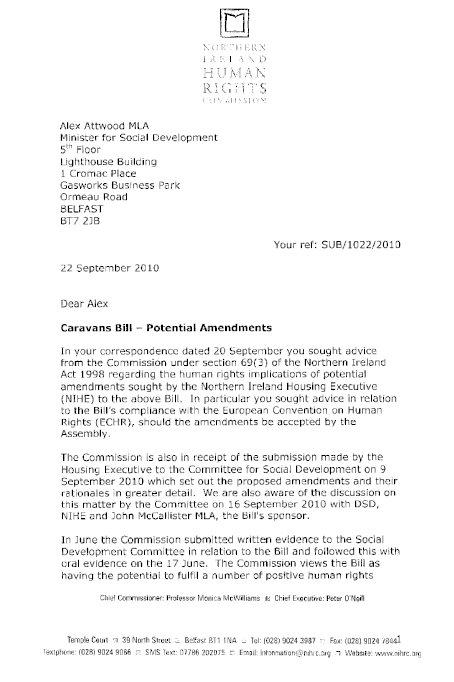
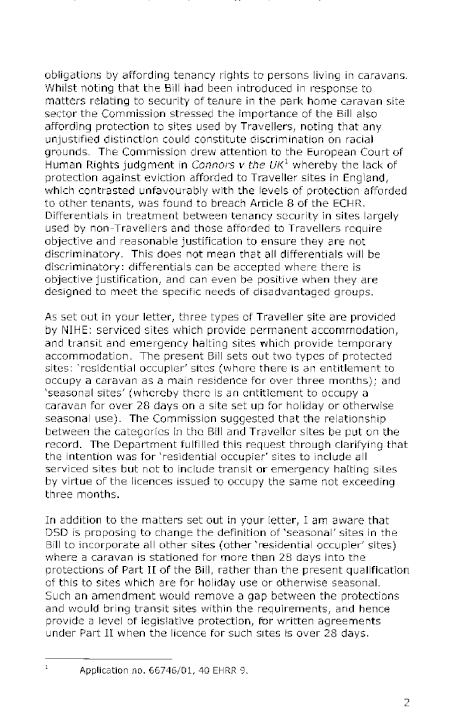
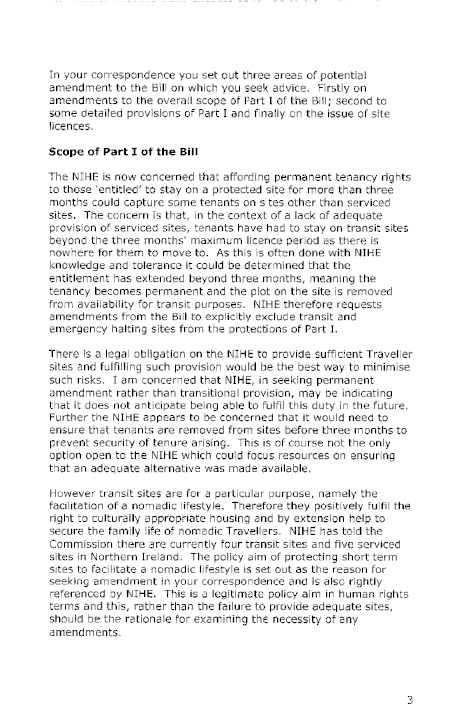
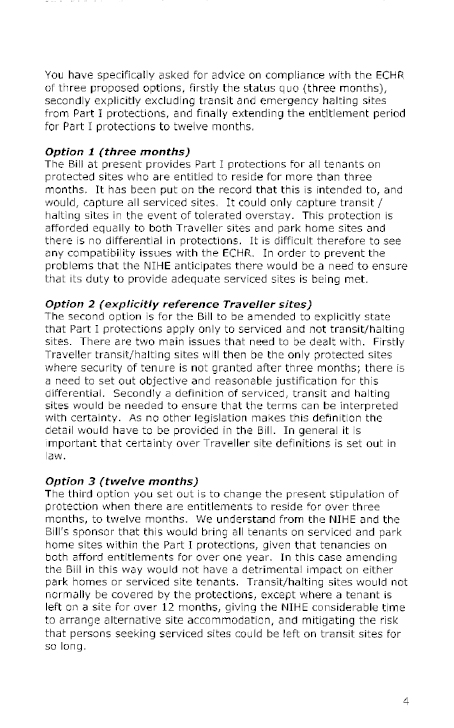
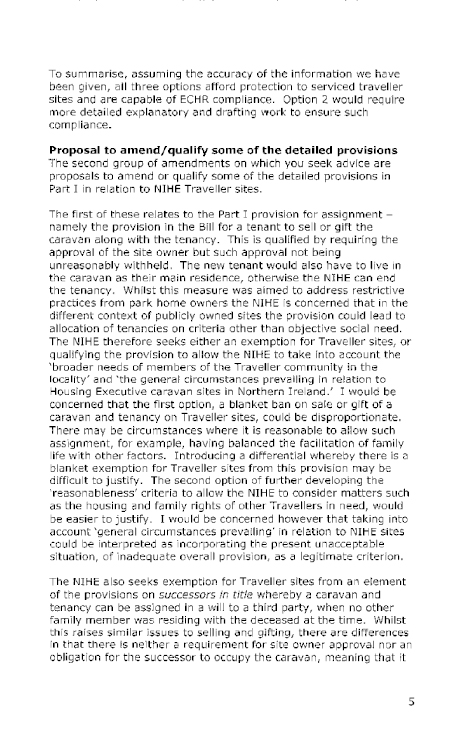
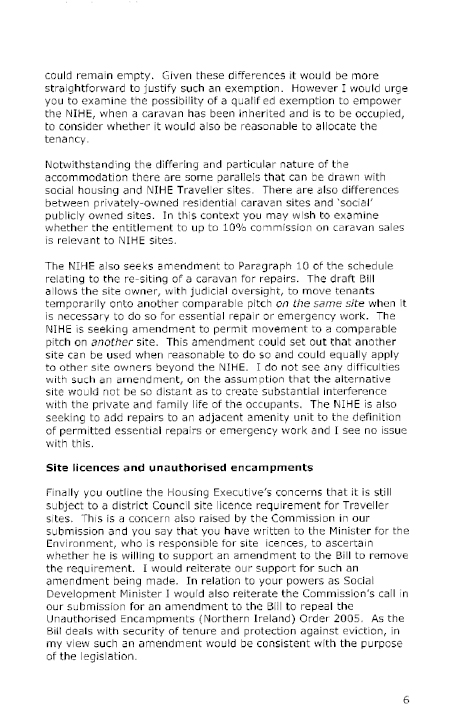
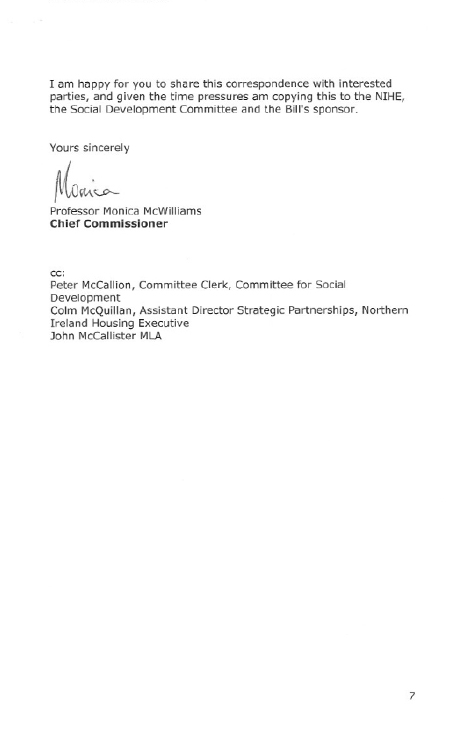
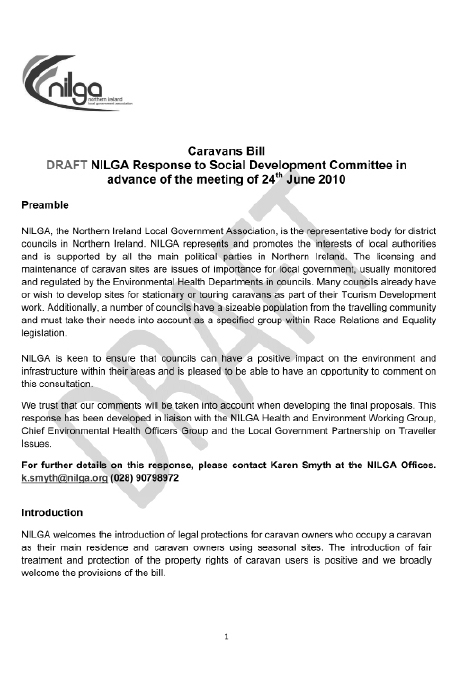
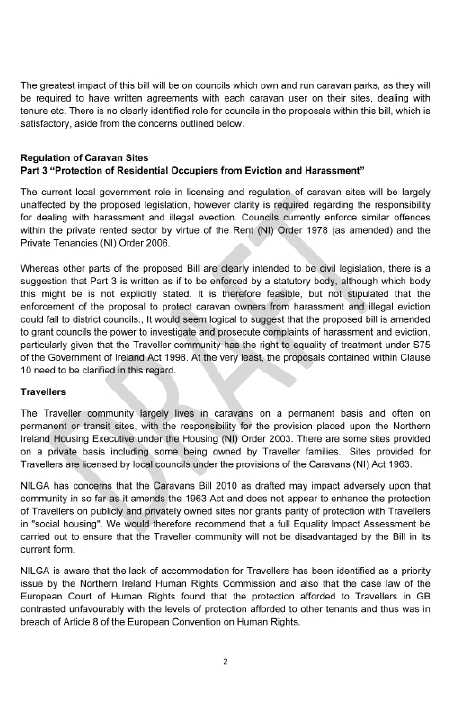

2nd June 2010
Mr Peter McCallion
Committee Clerk
Social Development Committee
Room 412
Parliament Buildings
Belfast
BT4 3XX
Dear Mr. McCallion
Thank you for your letter of 5th May 2010, on behalf of the Social Development Committee, inviting written evidence from NITB for consideration by the Committee in its scrutiny of the Caravans Bill.
NITB has been kept advised of the issues surrounding the Bill and had previously made its views known to DETI. Our principal concerns at that time related to those parts of earlier versions of the Bill which impacted on the touring caravan sector. These issues have been addressed in the current Bill.
I understand DETI is responding directly to you following your letter to the department's Trading Standards Service. NITB has no further comments to add.
Thank you for giving us the opportunity to comment.
Yours sincerely

Alan Clarke
Chief Executive
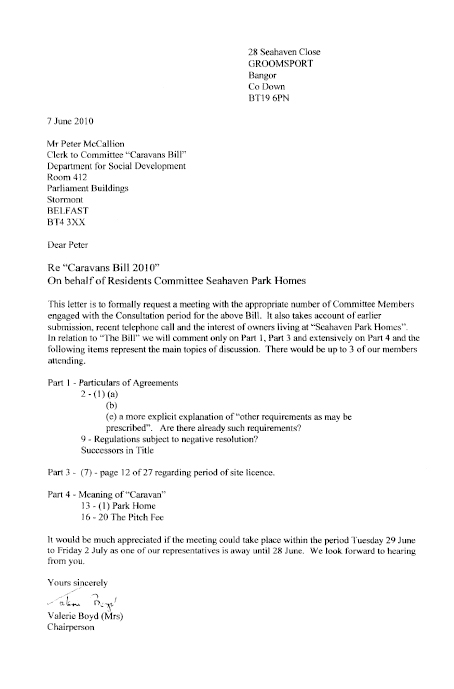
Scrutiny of Delegated Powers from the Examiner of Statutory Rules
Committee for Enterprise, Trade and Investment 19 May 2010
Memo to Enterprise, Trade and Investment 29 April 2010
Department for Enterprise, Trade and Investment 27 May 2010
Letter to Trading Standards 5 May 2010
Minister for Enterprise, Trade and Investment 14 June 2010
John McCallister – Proposed Amendment 23 June 2010
Correspondence from DSD 29 June 2010
Correspondence to DSD 21 June 2010
Correspondence from DSD 29 June 2010
Committee for Enterprise, Trade and Investment 29 June 2010
Correspondence from DSD 14 July 2010
Correspondence to DSD 5 July 2010
Correspondence to DSD 29 June 2010
Committee for the Environment 3 August 2010
John McCallister 5 August 2010
Correspondence from DSD 7 September 2010
Correspondence to DSD 1 September 2010
Committee for the Environment 10 September 2010 and 11 August 2010
Minister for Enterprise, Trade and Investment 15 September 2010
John McCallister 16 September 2010
Committee for Enterprise, Trade and Investment 24 September 2010
Committee for Enterprise, Trade and Investment 4 October 2010
Minister for the Environment 4 October 2010
Minister for Social Development 20 September 2010
Department for Enterprise, Trade and Investment 6 October 2010
Correspondence from DSD 7 October 2010
Committee for Enterprise, Trade and Investment 11 October 2010
Correspondence from DSD 19 October 2010
John McCallister 4 November 2010
John McCallister 4 November 2010
Correspondence from DSD 4 November 2010
1. The Caravans Bill is a private member's bill and this delegated powers memorandum has been prepared by the Department for Social Development on behalf of John McCallister MLA, the Bill's sponsor.
2. The purpose of the Bill is to introduce statutory protections, similar to those which already exist in Great Britain, for those who occupy a caravan as their main residence on sites which have been approved for that purpose. The Bill also creates a level of protection for caravan owners on seasonal sites by introducing a requirement for written agreements to be in place between site owners and caravan owners.
3. Parts 1, 3 and 4 of the Bill are modelled on existing legislation in Great Britain. Part 2 is unique and there is no statutory equivalent anywhere in the UK.
4. The Bill contains three powers for the Department for Social Development to make subordinate legislation to:
5. The Bill contains one power for the Department of the Environment to amend, by order, the maximum dimensions of a caravan.
Power to add further particulars to written statements in the residential caravan sector [for agreements made after commencement] (Clause 2)
Clause 2(1) of the Bill establishes the particulars which must be included in a written statement provided by the owner of a 'protected' caravan site to a prospective occupier.
Clause 2(1)(e) provides the Department for Social Development with a power to prescribe, by regulations, further particulars for inclusion in the written statement (in connection with those residential agreements made after commencement of the Caravans Bill).
The power is limited to adding requirements to the written statement and is needed to allow the Department to reflect, in a timely way, issues which may emerge over time and so ensure that the rights of residential caravan owners continue to be adequately protected.
A similar power exists for the equivalent authorities in Great Britain under section 1 of the Mobile Homes Act 1983 (c.34). Part 1 of the Caravans Bill is based on the Mobile Homes Act 1983.
Negative resolution
The form of parliamentary control for the regulations in England (section 1 of the Mobile Homes Act 1983) is negative resolution. Given this, a view was taken that a similar form of Assembly control would be appropriate and that the Assembly, like the UK Parliament, would not wish to debate the detail of the regulations.
Clause 2(4) of the Bill establishes the particulars which must be included in a written statement provided by the owner of a 'protected' caravan site to an existing occupier.
Clause 2(4)(e) provides the Department for Social Development with a power to prescribe, by regulations, further particulars for inclusion in the written statement (in connection with those residential agreements made before commencement of the Caravans Bill).
The power is limited to adding requirements to the written statement and is needed to allow the Department to reflect, in a timely way, issues which may emerge over time and so ensure that the rights of residential caravan owners continue to be adequately protected.
At present, the residential caravans sector is very small and this provision will ensure that residential caravan owners already living on protected sites before the commencement of the Caravans Bill enjoy the same rights as future residential caravan owners.
There is no similar provision in Great Britain as the Mobile Homes Act 1983 did not make arrangements for agreements made before commencement of the Act.
Negative resolution.
To ensure consistency with the power under clause 2(1)(e) of the Bill.
Part 1 of the Schedule to the Bill sets out the terms to be implied in any residential agreement. Part 2 of the Schedule allows the court to order that certain terms are implied in a residential agreement.
Clause 4 provides the Department for Social Development with a power to amend Part 1 or 2 of the Schedule to the Bill. An order made using this power can also include appropriate incidental, supplementary, consequential, transitional or savings provisions in relation to Part 1 or 2 of the Schedule. The power also permits the Department to make any consequential amendments to Part 1 of the Bill.
The primary purpose of this provision is to allow the Department to take prompt account of any decisions made in the courts in relation to the implied terms of residential agreements and ensure these are appropriately reflected in statute.
Clause 4(4) places a statutory requirement on the Department to consult appropriate persons and organisations before using its power.
Draft affirmative resolution.
As this power would allow the Department to amend elements of the Caravans Bill, draft affirmative resolution offers the most appropriate form of Assembly control.
A similar power for the equivalent authorities in England and Wales was inserted into the Mobile Homes Act 1983 (section 2A) by section 208 of the Housing Act 2004 (c34). This power for equivalent authorities in England and Wales goes somewhat further than that envisaged in the Caravans Bill as its first exercise was to have retrospective effect. The power under section 2A of the Mobile Homes Act 1983 is subject to affirmative resolution.
Clause 13 provides a statutory definition of a caravan. Sub-sections 1, 2 and 4 define the characteristics of a caravan, while sub-section 3 establishes its maximum dimensions.
Clause 13(5) provides a power for the Department of the Environment to amend the maximum dimensions of a caravan by order, following consultation with appropriate persons or organisations.
While the broader definition of a caravan is a matter of policy, the maximum dimensions is largely a technical issue linked to matters such as design standards and planning control.
Clause 13 is based on the definition of a caravan in the Caravan Sites Act 1968 (c52). Section 13(3) of the Act provides the equivalent authority in England with the power to amend the maximum dimensions of a caravan by order.
Negative resolution
The form of parliamentary control for the subordinate legislation in England is negative resolution. Given this, a view was taken that a similar form of Assembly control would be appropriate and that the Assembly, like the UK Parliament, would not wish to debate the detail of any order amending the maximum definitions of a caravan.
1. I have considered this Bill, in conjunction with the Delegated Powers Memorandum submitted by the Department Social Development, in relation to powers to make subordinate legislation.
2. The Bill contains four powers to make subordinate legislation (the first three vested in the Department for Social Development and the fourth vested in the Department of the Environment. Clause 2(1)(e) allows the Department for Social Development to make regulations subject to negative resolution prescribing further requirements for written statements in respect of residential agreements made after the commencement of the Bill.
3. All the powers to make subordinate legislation seem to be appropriate. The power to amend the implied terms set out in the Schedule to the Bill is subject to draft affirmative procedure.
4. There are no other matters to which I draw the attention of the Committee for Social Development in this regard.
Gordon Nabney
Examiner of Statutory Rules
27 August 2010
Committee for Enterprise, Trade & Investment
Room 424
Parliament Buildings
Tel: +44 (0)28 90522 1230
Fax: +44 (0) 28 9052 1355
To: Peter McCallion
Clerk to the Social Development Committee.
From: Jim McManus
Clerk to the Committee for Enterprise, Trade & Investment.
Date: 19 May 2010
1. At its meeting on the 13 May, the Committee for Enterprise, Trade & Investment discussed your memo dated 29 April with regard to the Caravans Bill.
2. It was agreed that the Committee for Enterprise, Trade and Investment should scrutinise Clauses 7 and 8 as part of the Committee Stage of the Caravans Bill.
3. The Committee also agreed that all responses to consultation should be sent to the Committee for Social Development and those pertaining to Part 2 of the Bill copied to the Clerk to the Committee for Enterprise, Trade and Investment.
Committee for Social Development
Room 412, Parliament Buildings,
Stormont,
Belfast BT4 3XX
Tel: 028 9052 1864
Mob:078 2514 1294
peter.mccallion@niassembly.gov.uk
To: Jim McManus
Clerk to the Committee for Enterprise, Trade and Investment
From: Peter McCallion
Date: 29 April 2010
Subject: Caravans Bill
As you are aware, the Caravans Bill was introduced to the Assembly on Monday 26 April 2010. A copy of the Bill and the explanatory and financial memorandum can be found at the following link:
http://archive.niassembly.gov.uk/legislation/primary/2009/nia17_09.htm
It is anticipated that the Bill will be referred to the Committee for Social Development for the Committee Stage on 17 May 2010.
The Bill is described as a Private Member's Bill – sponsor John McCallister MLA – which has been drafted with Government support. The purpose of the Bill is to introduce statutory protections for those who occupy a caravan as their main residence and to create levels of protection for caravan owners using seasonal sites. The Bill contains a number of elements.
For caravan owners for whom the caravan is their only or main residence, the Bill includes:
For caravan owners who station their caravan for a period exceeding 28 days on a seasonal caravan site, the Bill includes provisions which require caravan site owners to provide a written statement of terms and conditions.
The Bill also includes a definition of a caravan in line with that in use in England and Wales and allows the Department of the Environment to amend the definition.
I have written to key stakeholders on behalf of the Committee inviting them to submit written evidence before 4 June 2010 for consideration at the Committee Stage of the Bill. A public notice is expected to be included in the main newspapers during the week commencing 17 May 2010.
Can you please consider and identify the clauses of the Bill which the Enterprise, Trade and Investment Committee believes it should scrutinize as part of the Committee Stage of the Caravans Bill?
I would greatly appreciate a response before 14 May 2010.
Committee Clerk
ENC.
Mr Peter McCallion
Committee Clerk
Social Development Committee
Room 412
Parliament Buildings
Belfast
BT4 3XX
Dear Peter
I refer to your letter of 5 May, on behalf of the Social Development Committee, addressed to David Livingstone and requesting written evidence from the Trading Standards Service for consideration by the Committee in its scrutiny of the Caravans Bill.
The Department welcomes the introduction of the draft Bill and the protection that it will provide for those occupiers of caravans on permanent and seasonal sites. In relation to the clauses in the Bill that will affect owners of caravans on seasonal sites we support the details of these clauses.
Clause 8 of the Bill requires that park owners provide a written statement setting out the express terms of the agreement before the contract to occupy a pitch is concluded, this represents existing best practise in the industry. This provision will address a significant gap in the (consumer) protection of holiday caravan owners in Northern Ireland. It is the Department's experience that the problems that arise with those renting pitches on seasonal caravan sites typically come to light a number of years after the purchase of the caravan has been made. Under this clause the provision of written agreements will in our view improve clarity, transparency and introduce certainty in the contractual relationship between caravan owners and park owners.
The Department considers that clause 8 provisions will benefit the holiday caravan sector by increasing consumer confidence and creating a fair-trading environment which will be attractive to those considering this approach to a holiday at home.
The Department's view is that clause 8 is both proportionate and necessary, it should not impose any significant burdens on park owners and will enjoy the support of all legitimate stakeholders associated with the holiday caravan sector. The Department also considers that the implementation of this measure should reduce significantly the number of complaints received by Consumerline and the Trading Standards Service, about the behaviour of a small number of park owners, as many of these complaints concern the terms of contracts that consumers allege were not notified at the time the agreement was entered into.
The Trading Standards Service is planning to work proactively with those businesses operating in this sector to ensure that the new measure, if implemented, is publicised and adhered to across Northern Ireland's holiday caravan sites.
It is also the Department's view that, if implemented, the measure will compliment, very positively, existing fair trading laws and allow their more effective application to complaints concerning holiday caravan contracts.
John Murray
PP. David McCune
Departmental Assembly Liaison Officer
Committee for Social Development
Room 412
Parliament Buildings
Ballymiscaw
BELFAST
BT4 3XX
E-mail: peter.mccallion@niassembly.gov.uk
Tel: 028 9052 1864
Fax: 028 9052 1667
Mr David Livingstone
Trading Standards Service,
Department of Enterprise, Trade and Investment
Room 139
Netherleigh House
Belast
BT4 2JP 5 May 2010
Dear Mr Livingstone
The Caravans Bill was formally introduced to the Northern Ireland Assembly on 26 April 2010. It is anticipated that the Bill will be referred to the Committee for Social Development for the Committee Stage in May 2010.
The stated purpose of the Bill is to introduce statutory protections for those caravan owner-occupiers who occupy a caravan as their main residence and to create other protections for caravan owner-occupiers using seasonal sites. The Bill contains a number of elements.
For caravan owner-occupiers for whom the caravan is their only or main residence and who station the caravan on a protected site, the Bill appears to include:
For caravan owner-occupiers who station their caravan for a period exceeding 28 days on a seasonal caravan site, the Bill appears to include provisions which require caravan site owners to provide a written statement of terms and conditions.
The Bill also appears to include a definition of a caravan in line with that in use in England and Wales and allows the Department of the Environment to amend the definition.
On behalf of the Committee, I invite you to submit written evidence on behalf of your organisation for consideration at the anticipated Committee Stage of the Bill. Your evidence should be structured to address specific clauses of the Bill. If appropriate, it would be helpful if you could suggest alternative or additional wording to clauses - this would assist the Committee's consideration of the need for any amendments to the Bill.
A copy of the Bill and Explanatory and Financial Memorandum can be obtained from the Assembly's website –
http://archive.niassembly.gov.uk/legislation/primary/2009/nia17_09.htm
I should be grateful if you would forward any written evidence to the Committee, preferably by e-mail (in the format MS Word), to committee.socialdevelopment@niassembly.gov.uk by Friday 4 June 2010 at 4pm.
If you do not have access to the internet or e mail facilities or you have any other enquiries please contact the Committee Clerk on 028 9052 1864.
Yours sincerely

Committee Clerk
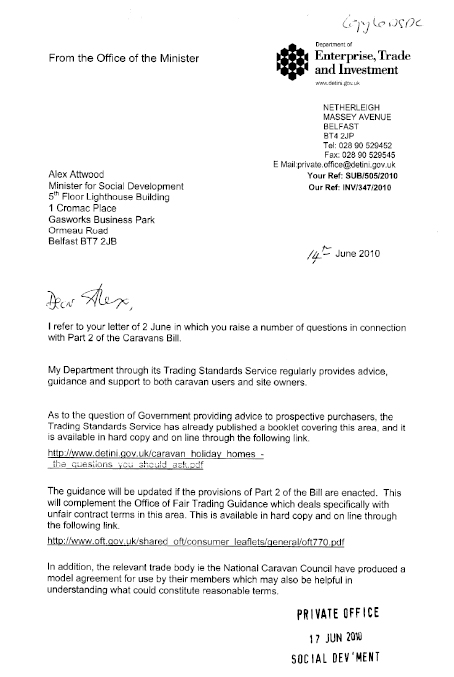
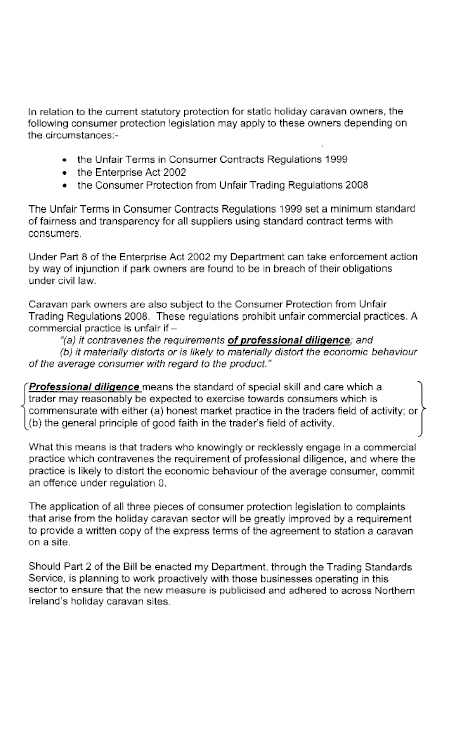

John McCallister MLA
South Down Ulster Unionist Constituency Office
19 Causeway Road, Newcastle, Co Down, BT33 0DL
Tel 028 4372 4400
Mobile 07833 668602
E-mail john.mccallister@btconnect.com
23 June 2010
Mr Peter McCallion
Clerk to the Committee for Social Development
Room 412
Parliament Buildings
Belfast
Ballymiscaw
Stormont
BT4 3XX
Dear Peter
I am writing to inform you that it is my intention to table an amendment to my Caravans Bill. The amendment will seek to include a provision that creates a "caravan owners' association" for the holiday sector similar to that in the permanent residential sector. It would not extend to touring caravans or motor homes. The purpose of the amendment is to change the present situation whereby caravan owners on holiday sites (referred to as seasonal sites in the Bill) feel they have no voice, to one where they have at least some voice.
I would suggest that the provision will be less burdensome for seasonal site owners than that which is included for the residential site owner in that there will be no obligation on the part of the site owner to take into account any representations made to him by a qualifying association; he will merely have to consult on any matters that relate to the operation and management of, or improvements to, the seasonal site and which may affect the seasonal owner-occupier directly or indirectly.
Having been involved several times in resolving disputes between disgruntled seasonal site occupiers and the site owners, I have seen first hand how early communication between the two groups can benefit all parties. Indeed it was even said to me by a number of caravan owners during one dispute over an unexpected increase in pitch fees, that had they been advised to expect the rise and with an understanding of why it was necessary, there would have been no need for them to demonstrate and seek outside help.
I believe the proposed provision to be a positive one that will benefit both the seasonal site owner and the owner of the caravan on such a site; I also believe that if drafted properly, it will further reduce the number of complaints made to Trading Standards. I have not yet sought advice on how to draft the provision but will of course provide you with a copy of any resulting provision in due course.
I trust this is satisfactory however, should you require any further clarification on this matter please do not hesitate to contact myself or Annette.
Yours sincerely

John McCallister
MLA for South Down
CC – Stephen Martin
From: Stephen Martin
Housing Division
Peter McCallion |
2nd Floor |
29 June 2010
Your Ref: CSD/001/2008/12/SK
Dear Peter
1. I refer to your letter of 21 June 2010 on the Caravans Bill. The letter sought clarification on five issues and I will cover each issue in turn.
2. Responsibility for the licensing of caravan sites falls to district councils under the Caravans Act (Northern Ireland) 1963. That Act is the policy responsibility of the Department of the Environment.
3. The issue raised by the Northern Ireland Human Rights Commission relates to the licensing of caravan sites provided by the Northern Ireland Housing Executive for Irish Travellers. The Housing Executive has a statutory duty to provide such sites under Article 125 of the Housing (Northern Ireland) Order 2003. Prior to 2003, district councils had powers to provide sites for Travellers. Caravan sites provided by district councils are exempt from the requirement to have a site license by virtue of paragraph 11 of the Schedule to the Caravans Act (Northern Ireland) 1963. Therefore, before 2003, sites provided by district councils for Travellers would have been exempt from site licensing requirements. This changed in 2003 with the transfer of responsibility for providing sites for Travellers to the Housing Executive. All such sites now require site licenses from the relevant district council.
4. As I understand it, the Human Rights Commission made two points: firstly, that the exemption from site licensing requirements should have continued on the transfer of Travellers sites to the Housing Executive in 2003 and that the law should now be changed to give effect to this and secondly that the presence of the site licensing regime has frustrated, in some cases, the proper discharge of the Housing Executive's statutory duty to provide sites for Irish Travellers under Article 125 of the Housing (Northern Ireland) Order 2003.
5. The aim of the Caravans Bill is to introduce statutory protections for park home owners similar to those which exist in Great Britain and place requirements on site owners to provide written statements to seasonal caravan owners. For these reasons, the Bill does not include wider provisions such as amending the Caravans Act (Northern Ireland) 1963 to exempt sites provided by the Housing Executive for Travellers from the site licensing regime.
6. It is the Department's intention to continue to work closely with the Department of Enterprise, Trade and Investment to produce guidance for caravan owners and park operators on the implications of the Caravans Bill. Part 1 of the Bill is very similar to existing legislation in Great Britain, the Mobile Homes Act 1983, and the Department will aim to use the available knowledge and model documents from Great Britain as a good starting point.
7. As Michael Sands indicated in his opening remarks at the Committee briefing on 17 June, Part 3 of the Bill will protect those living on all Traveller sites managed by the Housing Executive from illegal eviction and harassment. Part 1 of the Bill will cover Travellers living in the semi-settled accommodation of serviced sites, which are similar to park homes, but by virtue of clause 1, not Travellers living on the more temporary transit and halting sites.
8. When drafting this provision, we considered the alternative approach of specifying the type of Traveller sites to which each part applies. There are three main types of site provided for Irish Travellers by the Housing Executive: serviced sites, transit sites and halting sites. These sites are provided for different purposes and are not defined in statute. Placing a workable definition of each type of site in statute proved extremely difficult. For this reason, the Department opted to use the three-month time bar in clause 1 of the Bill which will exclude transit and halting sites from the protections of Part 1.
9. I understand that the Human Rights Commission suggested that the protections offered by the Bill to Travellers should be more clearly communicated either through making changes to the Explanatory and Financial Memorandum at the appropriate time or re-stating the position on the public record. In his speech during the second stage debate on 24 May, Minister Attwood made clear the extent of the protections in the Bill relating to Travellers. These points were re-iterated in our briefing of 17 June. Both of these contributions were recorded in Hansard. We would also intend to take further opportunities to re-iterate the points previously made and ensure that relevant stakeholders are made aware of the position.
10. Part 1 of the Bill applies to caravan owners on protected sites who are entitled to occupy the caravan on that site as their only or main residence for a period exceeding three months.
11. Part 2 of the Bill applies to caravan owners on seasonal sites who are entitled to occupy their caravan on that site for a period exceeding 28 days.
12. It has been brought to our attention that there may be a third group of caravan owners: seasonal users on protected sites. Neither Part 1 nor Part 2 of the Bill would apply to this group of people. It is our understanding that the number of protected sites in Northern Ireland is very small and that, therefore, the number of seasonal users on protected sites is also likely to be very small. The Department and the Department of Enterprise, Trade and Investment are currently considering a potential way forward on this matter whose aim would be to propose a way in which the protections of Part 2 of the Bill might apply to this small group.
13. The written statements under both Part 1 and Part 2 of the Bill require the site owner to set out the 'express terms' to be contained in the agreement. These express terms can potentially cover a range of issues, such as the arrangements for removing caravans from a site and the fees to be charged for any such service. Any express term which is set out in either the residential or seasonal agreement but which was not set out in the written statement is unenforceable. So, for example, unless the written statement includes provision to make particular arrangements or impose particular charges in terms of removing a caravan from a site, then no such arrangements or charges are enforceable. These provisions ensure appropriate transparency at the outset of any agreement and would guard against the unreasonable and unfair practice highlighted by the Committee on 17 June in relation to charges for removing a caravan from a site.
14. I hope the Committee finds this response helpful.
Yours sincerely,

Stephen Martin
cc: John Ball
Billy Crawford
Gareth McKinty
Committee for Social Development
Room 412
Parliament Buildings
Ballymiscaw, Stormont
BELFAST BT4 3XX
Email: peter.mccallion@niassembly.gov.uk
Tel: 028 9052 1864
Fax: 028 9052 1667
Our Ref: CSD/001/2008/12/SK
Mr John Ball
Department for Social Development
5th Floor, Lighthouse Building
1 Cromac Place
Gasworks Business Park
Ormeau Road
Belfast BT7 2JB 21 June 2010
Dear John
On behalf of the Social Development Committee, I would like to convey my thanks to the officials for their attendance at the Committee meeting on 17 June 2010. The briefing on the Caravans Bill proved very useful for the Committee.
The Committee agreed to seek clarification from the Department on several points:
I would greatly appreciate a response before 5 July 2010.
Yours sincerely

Committee Clerk
cc. John McCallister MLA
From: Stephen Martin
Housing Division
2nd Floor
Lighthouse Building
1 Cromac Place
Gasworks Business Park
Ormeau Road, Belfast
BT7 2JB
Telephone: 028 9082 9267
Fax: 028 9082 9324
E-Mail: Stephen.Martin@dsdni.gov.uk
29 June 2010
Jim McManus
Clerk to the Enterprise, Trade and Investment Committee
Room 414
Parliament Buildings
Ballymiscaw
Stormont, Belfast
BT4 3XX
Dear Jim
1. At the evidence session on 24 June on the Caravans Bill, Dr Alasdair McDonnell MP MLA asked whether residential caravans on protected sites had postal addresses and whether the occupiers of such caravans are eligible to register to vote. I undertook to look into this matter.
2. I have discussed the issue with Annette Holden, the assistant to John McCallister MLA, the Bill's sponsor. Annette has also discussed the matter with the Electoral Commission.
3. Following these conversations, I can confirm that residential caravans on protected sites which meet the qualifications under Part 1 of the Caravans Bill (i.e. where they are the only or main residence of the occupier) do have their own postal address. Furthermore, the occupiers of such caravans are eligible to register to vote, providing, of course, they meet the other statutory criteria.
4. This position would not apply to seasonal caravans which come under the auspices of Part 2 of the Bill. Such caravans are for holiday use and are not the occupier's only or main residence. It is my understanding that the owners of such caravans would register to vote at their home address.
5. I hope the Committee finds this response helpful.
Yours sincerely,

Stephen Martin
cc: John Ball
Billy Crawford
Gareth McKinty
Committee for Enterprise, Trade & Investment
Room 424
Parliament Buildings
Tel: +44 (0)28 90522 1230
Fax: +44 (0) 28 9052 1355
To: Peter McCallion
Clerk to the Social Development Committee.
From: Jim McManus
Clerk to the Committee for Enterprise, Trade & Investment.
Date: 29 June 2010
Subject: Caravans Bill – Committee Stage Scrutiny – Clauses 7&8
At its meeting on the 24 June, the Committee for Enterprise, Trade & Investment received oral evidence from DSD and DETI officials regarding Clauses 7&8 of the Caravans Bill.
Clause 7 covers the seasonal caravan sector. It covers any seasonal agreement made with caravan owners entitled to station their caravan on a seasonal caravan site for a period exceeding 28 days. The Bill is silent in relation to seasonal agreements on protected sites. Members agreed to support an amendment to Clause 7 in the Bill to extend protection to seasonal caravan owner-occupiers on protected sites. Officials agreed to consider such an amendment.
Members were content with Clause 8 as drafted.
I would be grateful if you would bring this to the attention of the Committee for Social Development. Please do not hesitate to contact me if you have any questions.

From: Stephen Martin
Housing Division
2nd Floor
Lighthouse Building
1 Cromac Place
Gasworks Business Park
Ormeau Road
BELFAST
BT7 2JB
Telephone: 028 9082 9267
Fax: 028 9082 9324
E-Mail: Stephen.Martin@dsdni.gov.uk
14 July 2010
Peter McCallion
Room 412
Parliament Buildings
Ballymiscaw
Stormont
Belfast
BT4 3XX
Your Refs: CSD/009/2008/12/SK &
CSD/014/2007/2/PM
Dear Peter
1. I refer to your letters of 29 June and 5 July 2010 on the Caravans Bill. In those letters you raised three issues: enforcement of fitness standards, RPI and potential amendments to commencement dates. I'll deal with each issue in turn.
2. The Bill makes particular provisions to ensure that residential caravans are maintained in a good state of repair. Paragraph 21 of the Schedule to the Bill places an obligation on the residential caravan owner to maintain the outside of the caravan and the pitch in a clean and tidy condition. Further to this, paragraph 6 of the Schedule allows the site owner to seek to terminate the residential agreement, through the court, where the residential caravan is not maintained in a good state of repair.
3. There is no similar provision in Part 2 of the Bill for the seasonal sector. However, the site owner could include in the 'express terms' particular provisions relating to caravan maintenance.
4. More generally, the Housing Executive has a statutory obligation under the Housing (Northern Ireland) Order 1981 to identify and address unfitness in both social and private housing. While these powers and duties relate to 'houses', the definition of 'house' for the relevant parts of the 1981 Order includes, by virtue of Article 2 of the Order, a caravan 'which is used for human habitation and has been on substantially the same site or enclosed within the same area for a period of not less than one year'.
5. Paragraph 20 of the Schedule to the Bill establishes the presumption that the pitch fee for residential caravans will only increase or decrease by the rate of the retail prices index. This index is published by the Office of National Statistics and is used as a guide by Government in, for example, determining the uprating of benefits. The main retail prices index is a UK-wide index and there is no regional breakdown. It is my understanding that the main RPI includes a number of housing costs, such as mortgage interest payments.
6. Clause 16 of the Bill deals with commencement. As the Bill stands, all of its provisions are to be commenced six months after the date on which the Bill receives Royal Assent. It would be technically possible to table amendments to commence different parts of the Bill at different times. However, it should be remembered that a number of elements within the Bill are linked and care would need to be taken if multiple commencement dates are to be considered. The two particular provisions mentioned in your letter, written statements and successors in title, are included in Part 1 and the Schedule. These elements are inextricably linked and it may not be possible, nor desirable, to commence these elements at different times.
7. I hope the Committee finds this response helpful. I am also forwarding a copy of the letter to John McCallister MLA.
Yours sincerely,

Stephen Martin
cc: John Ball
Billy Crawford
Gareth McKinty
Committee for Social Development
Room 412
Parliament Buildings
BELFAST
BT4 3XX
Email: peter.mccallion@niassembly.gov.uk
Tel: 028 9052 1864
Fax: 028 9052 1667
Our Ref: CSD/009/2008/12/SK
Mr John Ball
Department for Social Development
Lighthouse Building
1 Cromac Place
Gasworks Business Park
Ormeau Road
Belfast BT7 2JB 29 June 2010
Dear John
Caravans Bill
At its meeting of 24 June 2010 the Committee received a briefing on the Caravans Bill.
The Committee agreed to seek clarification from the Department in respect of the responsibility for the enforcement of compliance with habitation fitness standards in caravans on seasonal and protected sites.
On behalf of the Committee, I would like to pass on my thanks to Mr Stephen Martin for his briefing.
Yours sincerely

Committee Clerk
Committee for Social Development
Room 412
Parliament Buildings
Ballymiscaw
Stormont
BELFAST
BT4 3XX
Email: peter.mccallion@niassembly.gov.uk
Tel: 028 9052 1864
Fax: 028 9052 1667
Our Ref: CSD/014/2007/2/PM
Mr John Ball
Department for Social Development
Lighthouse Building
1 Cromac Place
Gasworks Business Park
Ormeau Road
Belfast BT7 2JB 5 July 2010
Dear John
At its meeting of 1 July 2010, the Committee considered oral evidence on the Caravans Bill.
The Committee agreed that the Clerk should write to the Department seeking clarification on the reference in (the Schedules of) the Bill to the use of the Retail Price Index (RPI) in determining pitch fees. Members sought information as to the RPI measure which is to be employed – will this reflect mortgage payments? will it be a UK-wide index? etc.
The Committee also agreed that the Clerk should seek information on the consequences of a possible increase in the time period - from 6 months to 1 year - between the commencement of the Bill and Royal Assent. Members sought guidance as to whether elements of the Bill e.g. the requirement to have a written residential agreement could be commenced 1 year after Royal Assent whereas the provisions relating to successors-in-title could be commenced immediately after Royal Assent?
I would be grateful if you could provide this information by 19 July 2010.
Yours sincerely

Committee Clerk
Cc: John McCallister MLA
Committee for the Environment
Room 247
Parliament Buildings
Tel: +44 (0) 28 9052 1240
Fax: +44 (0) 28 9052 1795
From: Alex McGarel
Clerk to the Committee for the Environment
Date: 3 August 2010
To: Peter McCallion
Clerk to the Committee for Social Development
Subject: Caravans Bill
1. The Environment Committee received an oral briefing on the Caravans Bill from its sponsor, Mr John McCallister, on Thursday 2 July. The Committee agreed that a summary of its discussion of the Bill should be forwarded to your Committee for its information. A copy of the Hansard Report of the meeting is also attached for you convenience.
2. Mr McCallister reminded members that Clause 13 of his Bill was the primary focus for the Environment Committee.
3. Prior to second stage the Committee was advised by the Department of the Environment that:
"Clause 13 updates the definition of "caravan" for the purposes of the Bill. The revised definition is there to provide clarity and help to ensure the effective application of the Bill. The current legal definition of a "caravan" is contained in section 25(1) of the Caravans Act (NI) 1963 which deals with District Council caravan site licensing. DOE have administrative responsibility for that Act and to qualify for a caravan site licence the applicant needs to have planning permission to use the land as a caravan site. There are also planning implications for structures that are regarded as "caravans" for the purposes of planning control as the stationing of caravans on land is development requiring planning permission.
Clause 13 of the Bill, which has the Department's support, updates the statutory definition of a "caravan" for the purposes of the Bill in line with the current statutory definition of "caravan" which applies in England and Wales. Sub-sections 1, 2, and 4 define the characteristics of a caravan while sub-section 3 establishes its statutory maximum dimensions. Clause 14 of the Bill applies the new definition of "caravan" in Clause 13 to the Caravans Act (NI) 1963 itself.
As to the secondary legislation power, Clause 13(5) provides a power for the Department to amend the maximum dimensions of a caravan by order, following consultation with appropriate persons or organisations. This provides the Department with the ability to adjust maximum dimensions in the future should, for example, it decide to align those dimensions with future revised British Standards for caravan manufacture. Similar powers currently exist with DCLG in England and there is seen to be advantage in having control over setting maximum dimensions for "caravans" in terms of planning control etc."
4. Mr McCallister reiterated that the Bill will bring the definition of touring caravans, park homes and holiday caravans into line with the definition in the rest of the UK, an integral part of updating the caravan legislation. Should caravan specifications change, the Minister of the Environment will have the power, with the Committee's support, to change the legislation accordingly.
5. Mr McCallister advised that defining the size of caravans has knock-on effects on health and safety as it is implicit in determining permitted distances between caravans, a key issue for safety considerations such as gas storage.
6. In response to a question relating to the apportionment of health and safety responsibilities on caravan sites, Mr McCallister informed the Committee that the council issuing the site licence is the enforcement body that regulates health and safety standards on the site. His concern that this was an unsatisfactory arrangement for councils that actually owned caravan sites as well as having responsibility for issuing licences was echoed by the Committee.
7. In response to a question asking about the cost of implementing the Bill, Mr McCallister indicated that the costs are exaggerated and would in fact be minimal to the industry. Whilst there might be some increase to the administrative burden in the first year, costs would be miniscule and might even remove costs from the system in future by reducing the requirement for annual site licences. He noted that the Trading Standards Service was viewing the costs as negligible.
8. In conclusion, the Committee for the Environment was very supportive of the Bill in general and satisfied with Clause 13 as drafted.
From: John McCallister [mailto:john.mccallister@btconnect.com]
Sent: 05 August 2010 10:55
To: McCallion, Peter
Subject: RE: Caravans Bill - evidence summary
Hi Peter
I just wanted to confirm in writing that we intend to table an amendment to para 8(9) of the Schedule. It currently read that upon sale of the caravan the site owner "shall be entitled to receive a commission on the sale at the rate of 10%". It should actually read "at a rate not to exceed 10%" as is the case in the Mobile Homes Act 1984.
For clarity this relates to the sale of permanent residential caravans on "protected sites" and not seasonal caravans on seasonal sites.
I hope this is clear but please do not hesitate to contact me if I can be of any further assistance.
Kind regards
Annette
John McCallister MLA
South Down Constituency
From: Stephen Martin
Housing Division
Peter McCallion |
2nd Floor |
7 September 2010
Your Ref: CSD/007/2010/PM
Dear Peter
1. I refer to your letter of 1 September 2010 on the Caravans Bill in which you requested a formal Departmental response on a range of issues.
2. Such an amendment would be unnecessary as the Bill already contains sufficient powers for the Department in this regard.
3. The Department will be monitoring the operation of Parts 1, 3 and the Schedule to the Bill and will use, as appropriate, its regulation-making powers under clause 4 of the Bill to amend the Schedule (which deals with the implied terms of residential agreements) to the Bill on the basis of evidence available to it. Any regulations made under clause 4 are subject to the affirmative resolution procedure in the Assembly and the Committee will have considerable opportunity to examine any proposed regulations in detail.
4. It would be very difficult to de-couple the individual clauses of Part 1 of the Bill and commence them at different times. Clause 5 (successors in title) relies on there being a residential agreement already in place. Clause 2 sets out the specific requirements as to what constitutes a residential agreement. Clause 5 could, therefore, not be commenced in advance of commencing the remainder of Part 1, particularly clause 2.
5. There are only a small number of residential caravan sites (park home sites) in Northern Ireland. The Department understands that some residential caravan site owners already follow the spirit of the Mobile Homes Act 1983 on which Part 1 and the Schedule to the Caravans Bill are based. This means that residential agreements, in line with the Bill's requirements, are offered and in such cases, the issue of succession in title should be covered.
6. There may be cases where there is no voluntary residential agreement in place. In these instances, there is nothing to prevent a residential site owner and a caravan owner from entering into a residential agreement now, in anticipation of the Caravans Bill becoming law. This might provide a non-statutory means of addressing any individual cases of concern.
7. Parts 1, 3 and 4 of the Bill are modelled on relevant English legislation which was on the statute books at the end of 2009. The Department is aware that during 2008 and 2009, the UK Government consulted on a number of proposed changes to the Mobile Homes Act 1983, including issues such as the transfer of disputes related to residential agreements from county courts to a Residential Property Tribunal. It is worth noting that the relevant legislation was not made before Parliament was dissolved and whether it is made in future depends on the policy of the new UK Government and the will of the current Parliament.
8. At present there is no equivalent in Northern Ireland to a Residential Property Tribunal. I have spoken to officials in the Department of Justice, which is responsible for policy on tribunals, and I understand there are currently no plans for the establishment of an equivalent tribunal for Northern Ireland.
9. Given the significant difference in scale between the size of the park homes sector in Northern Ireland (around 300 park homes) and in Great Britain (estimated at up to 200,000), it might be difficult to justify the establishment of a Residential Property Tribunal in Northern Ireland exclusively to deal with park home issues.
10. In my letter of 29 June, I indicated that the Department, along with the Department of Enterprise, Trade and Investment, was considering an amendment to the Bill to ensure that any seasonal users on protected sites are able to enjoy the protections of Part 2 of the Bill.
11. A draft amendment has been prepared, including the necessary consequential amendments required to the Bill as a result of this change. The text of the proposed amendment and the consequential amendments are as follows:
Clause 7, page 5, line 6, leave out from 'under' to end of line 7 and insert '—
(a) under which a person is entitled to station a caravan on land forming part of a caravan site and occupy the caravan for a period exceeding 28 days; but
(b) which is not a residential agreement within the meaning of Part 1.'
Clause 7, page 5, leave out lines 10 to 15
Clause 8, page 5, line 19, leave out 'seasonal' and insert 'caravan'
Clause 8, page 5, line 33, leave out 'seasonal' and insert 'caravan'
Clause 8, page 6, line 1, leave out 'seasonal' and insert 'caravan'
Clause 15, page 10, line 26, leave out 'protected site or a seasonal site' and insert 'caravan site'
Clause 15, page 10, line 32, leave out 'seasonal site' and insert 'site in respect of which the relevant planning permission or site licence—
(a) is expressed to be granted for holiday use only; or
(b) is otherwise so expressed or subject to such conditions that there are times of the year when no caravan may be stationed on the land for human habitation;'
Clause 15, page 10, leave out line 36
12. This proposed amendment addresses the concerns raised by the National Caravan Council in this regard.
13. The purpose of this amendment is unclear and it would appear to be somewhat confusing and of little value. The term 'seasonal agreement' is clear and there does not seem to be any strong rationale for changing it.
14. You asked for the Department's position on John McCallister's proposed amendment around qualifying "residents'" associations in the seasonal sector.
15. The Department for Enterprise, Trade and Investment has the lead policy responsibility for the seasonal caravan sector and Minister Attwood has written to Minister Foster to clarify her position on this matter. We will write to the Committee on receipt of Minister Foster's response.
16. The Department is content to facilitate the wishes of the Northern Ireland Local Government Association and table an amendment to provide district councils with powers under Part 3 of the Bill to investigate and prosecute complaints of illegal eviction and harassment on protected sites. Such powers will be similar to those which already exist under the Rent (Northern Ireland) Order 1978 in relation to the private rented sector.
17. The text of the proposed amendment is below:
Clause 10, page 7, line 43, at end insert —
'(12) Proceedings for an offence under this section may be instituted by the district council in whose district the site is situated.'
18. This proposed amendment could have serious consequences for the Bill. If adopted, it may be considered as incompatible with the European Convention on Human Rights. If this were the case, then the Bill could be deemed to fall outside the legislative competence of the Assembly.
19. It is important that the Bill affords comparable treatment regardless of ethnic origin. The Bill, as it stands, does this by ensuring that all those residing long-term on protected sites, whether park home owners or Travellers residing on serviced sites provided by the Northern Ireland Housing Executive, are afforded the considerable protections of Parts 1, 3 and the Schedule to the Caravans Bill.
20. This differs from the position of the Mobile Homes Act 1983 on which these elements of the Caravans Bill are modelled. Unlike the Caravans Bill, the 1983 Act excludes all sites provided for Travellers from the definition of a 'protected site', along the lines of the amendment proposed by the National Caravan Council. In doing so, Travellers do not enjoy any of the protections of the 1983 Act. This exclusion has been challenged and on the basis of these challenges, the 1983 Act has been found to be incompatible with the European Convention on Human Rights in this regard.
21. The UK Government sought a remedy to this matter through section 318 of the Housing and Regeneration Act 2008. However, this section of the 2008 Act has not yet been commenced and, therefore, the 1983 Act continues to be incompatible with the Convention.
22. In summary, the proposed amendment would be considered as a retrograde step which may have significant human rights implications.
23. The likely consequences of both proposed amendments would be to allow a higher level of commission to be paid to a site owner on sale of a residential caravan.
24. The commission figure included in paragraph 8(9) of Part 1 of the Schedule to the Bill is taken from the maximum commission allowed in English law. This figure has been closely examined on several occasions by Government in England. This extensive work on park economics would not justify setting a higher commission rate on sale and the Department has no evidence which would support a higher commission being paid.
25. This provision is not required as it already exists within the Bill. Paragraphs 4-6 of Part 1 of the Schedule deal with the grounds on which a site owner can terminate a residential agreement. This requires an application to the county court and Part 3 of the Bill deals with the court process and what constitutes legal eviction.
26. Section 75 of the Northern Ireland Act 1998 places a statutory duty on public authorities to have due regard to the need to promote equality of opportunity. Section 75(3) of the Act defines a "public authority". The Caravans Bill is a Private Member's Bill and it does not appear that an MLA is a "public authority" for the purposes of section 75 of the Act and, therefore would not be subject to its requirements.
27. It is worth noting, however, that from the evidence available, the Bill appears to do much to promote equality of opportunity for older people and Travellers. It is generally considered that most park home residents are older people who will enjoy the considerable protections of Parts 1, 3 and the Schedule to the Bill. Travellers who live in analogous circumstances to park home owners will also enjoy these protections.
28. The Unauthorised Encampments (NI) Order 2005 deals with issues of trespass and police powers in such circumstances. The subject matter is very different from that of the Caravans Bill and it seems unlikely that such an amendment could be made within the scope of the Caravans Bill.
29. Section 4 of the Caravans Act 1963 deals with the duration of site licenses. Under this provision, site licenses are issued for an indefinite period unless planning permission for a site is time-limited.
30. Paragraphs 1 and 2 of Part 1 of the Schedule to the Caravans Bill deal with the duration of a residential agreement.
31. In the case that planning permission (and therefore also the site license) is time-limited, then the residential agreement cannot extend beyond the period for which planning permission has been granted. In all other circumstances, residential agreements are granted for an indefinite period.
32. I hope the Committee finds this response helpful. I am also forwarding a copy of the letter to John McCallister MLA.
Yours sincerely,

Stephen Martin
cc: Margaret Sisk
Billy Crawford
Gareth McKinty
Committee for Social Development
Room 412
Parliament Buildings
Ballymiscaw
Stormont
BELFAST
BT4 3XX
Email: peter.mccallion@niassembly.gov.uk
Tel: 028 9052 1864
Fax: 028 9052 1667
Our Ref: CSD/007/2010/PM
Ms Margaret Sisk
Department for Social Development
Lighthouse Building
1 Cromac Place
Gasworks Business Park
Ormeau Road
Belfast BT7 2JB 1 September 2010
Dear Margaret
Following Departmental correspondence of 29 June 2010 and 14 July 2010, additional queries have been raised in respect of the Committee Stage of the Caravans Bill. A formal Departmental response on these queries and possible related amendments as indicated below would be greatly appreciated.
Stakeholders suggested that the Caravans Bill be amended to clearly set out the role of the Department in amending terms of Residential Agreements and to include a requirement for the Department to review the effectiveness of Residential Agreements and related measures. Can the Department advise on the proposed amendment?
Stakeholders also suggested in evidence to the Committee that the "Successors in title" provisions should be commenced at the earliest opportunity – perhaps at Royal Assent and prior to the introduction of Residential Agreements. Can the Department advise on this proposed amendment and the current succession arrangements for caravan owner occupiers on protected sites?
In evidence to the Committee, the National Caravan Council suggested that disputes relating to Residential Agreements could, as is planned in England, be considered by the Residential Property Tribunal. Can the Department comment on this proposal and advise if such a tribunal is to be established in Northern Ireland?
The National Caravan Council proposed the following amendment:
"7.(1) This Part applies to any agreement (whether made before or after commencement) under which a person is entitled?
(a) to station a caravan on land-
(i) forming part of a seasonal site; or
(ii) forming part of a protected site and Part 1 of this Act does not apply to that agreement;
and in either case
(b) to occupy the caravan for a period exceeding 28 days".
NCC also proposed that references to the "owner of the seasonal site" be replaced with the "owner of the Site" – so as to allow for seasonal owners staying on protected sites. Can the Department please comment on these proposals?
The National Caravan Council also suggested that a drafting amendment be made to identify the seasonal agreement as a "License Agreement". Can the Department please comment on this proposed amendment?
It is understood that the sponsor of the Bill is to introduce an amendment requiring seasonal site owners to consult with a qualifying residents' association in respect of changes to the operation and management of the site. Can the Department please comment on this proposed amendment?
NILGA suggested to the Committee that district councils be granted the power to investigate complaints of eviction and harassment and to prosecute related complaints on behalf of caravan owner occupiers who live on protected sites as their only or main residence. Can the Department please comment on this proposed amendment?
NCC further suggested that the Bill be amended to include a new definition of a protected site as follows: ""Protected site" means a caravan site, other than a seasonal site, in respect of which a site licence is required under the Caravans Act or would be so required if paragraph 11 of Schedule 1 to that Act (exemption of land occupied by district councils) were omitted but does not include any land occupied by a district council as a caravan site providing accommodation for gipsies or travellers."
Can the Department please comment on this proposed amendment?
Stakeholders proposed that the Bill be amended such that the commission on the sale of caravans would be based on an independent, market or book valuation rather than a reported sale price. Stakeholders also suggested that the limit on the commission on the sale of caravans paid to site owners be removed. Can the Department please comment on these proposed amendments?
Stakeholders suggested that the Bill be amended to give caravan site owners explicit powers to evict undesirable tenants. Can the Department please comment on this proposed amendment?
Stakeholders have commented on the absence of an Equality Impact Assessment for the Caravans Bill. Can the Department please comment on the equality implications of the Caravans Bill?
Stakeholders suggested that the Caravans Bill be used to repeal the Unauthorised Encampments (Northern Ireland) Order 2005. Can the Department please comment on this proposed amendment?
Can the Department also please provide clarity in respect of the impact of time-limited caravan site licences on residential agreements?
I would be grateful if you could provide this information as soon as possible.
Yours sincerely

Committee Clerk
Cc: John McCallister MLA
From: Alex McGarel
Clerk to the Committee for the Environment
Date: 10 September 2010
To: Peter McCallion
Clerk to the Committee for Social Development
1. At its meeting on 9 September, the Committee for the Environment considered the attached Departmental response regarding the Caravans Bill, in response to your letter of 7 July 2010.
2. Members agreed to forward the correspondence for the attention of your Committee.
Alex McGarel
21347
Mrs Alex McGarel |
Telephone: 028 90 5 40855 |
Date: 11 August 2010
Dear Alex,
I refer to the request you forwarded to the Department on behalf of the Committee for Social Development regarding the enforcement of certain provisions of the Caravans Bill.
Please find the attached comments from the Department, as requested. I should be grateful if you could forward it your colleague Peter McCallion in the Social Development Committee.
Thank you
Úna Downey
DALO
[By Email]
Central Management Branch
10-18 Clarence Court
BELFAST
BT2 8GB
Mr Peter McCallion |
Telephone: 028 90 5 40855 |
Date: 11 August 2010
Dear Peter,
Thank you for your letter dated 7 July which asked for comments from the Department of the Environment regarding NILGA's proposal for an amendment to the proposed Caravans Bill which would place a duty on district councils to investigate complaints of unfair eviction and harassment and to prosecute related complaints on behalf of caravan owner-occupiers who live on protected sites as their only or main residence.
NILGA are of the opinion that Part 3 of the proposed Caravans Bill is written as if to be enforced by a statutory body, although there appears to NILGA to be some uncertainty about which body this might be. They have therefore requested clarity as to where the responsibility for dealing with harassment and illegal eviction lies, suggesting that as Councils currently enforce similar offences within the private rented sector by virtue of the Rent (NI) Order 1978 (as amended) and the Private Tenancies (NI) Order 2006 it would seem logical that the proposed bill is amended to grant councils the power to investigate and prosecute complaints of harassment and eviction.
The Department's administrative interest in the proposed Caravans Bill is essentially limited to an amendment to the definition of a "caravan" for the purposes of the Caravans Act (Northern Ireland) 1963 (for which the Department has responsibility) and any potential implications for site licensing. The Department has in the past published model site licence conditions dealing with matters such as caravan site physical standards (density, spacing, fire prevention etc.) to which Councils are required to have regard in drawing up their own licences for sites in their area.
The 1963 Act provides, among other things, for the licensing by district councils of land to be used as a caravan site. The purpose is to ensure that there is control on the number and location of caravan sites, that sites are allocated with this in mind and with a view to ensuring the well-being of the occupants on the sites. The district council can only issue a licence if the occupier is entitled to the benefit of permission under the Planning (Northern Ireland) Order 1991 for the use of the land as a caravan site. The site licence therefore relates directly to the land for which permission for development as a caravan site has been granted and provides that basic standards are met at all sites in order to protect the health and safety of occupiers of caravans, users of caravan sites and the amenity of the land and adjoining areas. The 1963 Act does not and was never intended to address the issue of rights of tenure for occupiers of caravans which are matters beyond the remit of the Department of the Environment; hence the need for the proposed Bill.
Having considered the amendment proposed by NILGA which would essentially extend councils' powers in relation to harassment and illegal eviction within the private rented sector to "residential agreements" as provided for in the Bill, the Department is of the opinion that the proposed amendment is not directly relevant to the Caravans Act (NI) 1963 other than to observe that the residential agreements referred to will relate to occupiers of caravans stationed on certain sites that are licensed by district councils. In support of its argument for amendment of the Bill NILGA has indicated that the Councils currently enforce under the Rent (NI) Order 1978 (as amended) and the Private Tenancies (NI) Order 2006. Rent and tenancies legislation is the responsibility of the Department for Social Development and therefore the matter is not one for the Department of the Environment.
As regards the question as to whether the proposed amendment would create additional demands on council resources, given the above the Department is not in a position to determine the impact on resources on behalf of the Councils.
I trust this information is of assistance.
Yours sincerely,
Úna Downey
DALO
[By Email]
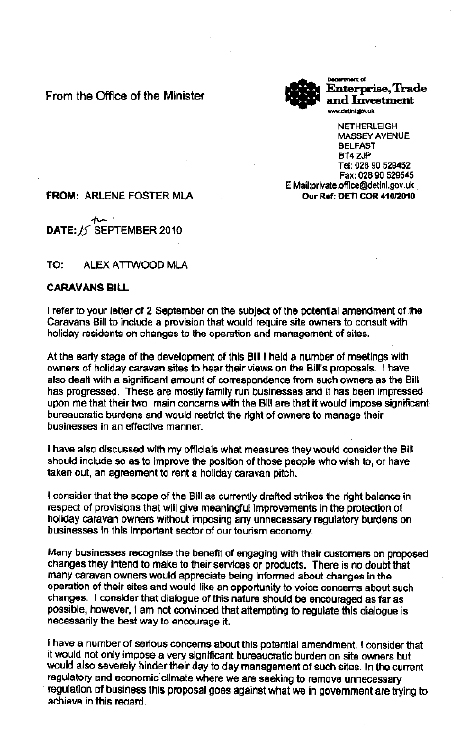
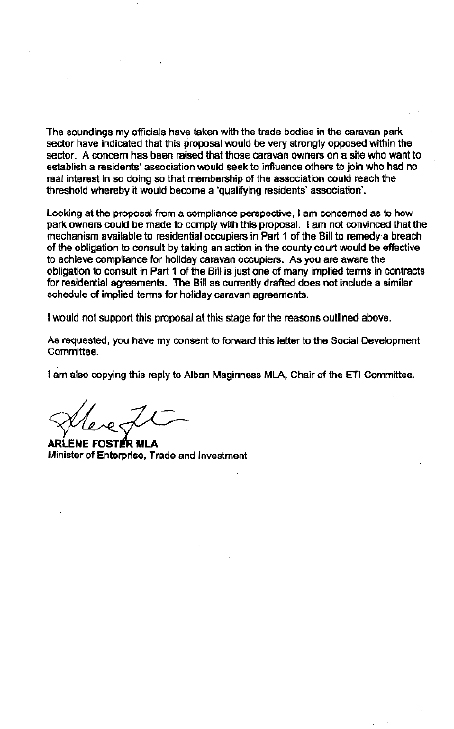
The Committee has been given advanced warning of John McCallister's intention to table an amendment to his Private Member's Bill. The amendment will seek to include a provision that creates a "caravan owners' association" for the holiday sector similar to that in the permanent residential sector. It would not extend to touring caravans or motor homes. The purpose of the amendment is to change the present situation whereby caravan owners on holiday sites (referred to as seasonal sites in the Bill) feel they have no voice, to one where they have at least some voice.
This amendment is felt necessary to "shore up" the provisions contained in Part 2 of the Bill. Indeed the Bill has been criticised for not going far enough to protect the seasonal sector, which is the larger of the two sectors here in Northern Ireland. There has been no shortage of evidence given to the Committee with regard to some of the "horror stories" recounted by unfortunate holiday caravan owners who have been forced to endure the introduction of an unexpected rise in fees, often at an exorbitant rate and without any explanation or freedom of choice. Sadly it is not uncommon that seasonal site owners attempt to set fees unilaterally, despite the guidance contained in the Office of Fair Trading's publication "Guidance on unfair terms in holiday caravan agreements" . The OFT considers it fair that the caravan owners, as a group, should be involved in discussing fees yet this still does not happen. This amendment, if accepted, will ensure that it does.
The provision will be less burdensome for seasonal site owners than that which is included for the residential site owner, in that there will be no obligation on the part of the site owner to take into account any representations made to him by a qualifying association; he will merely have to consult on any matters that relate to the operation and management of, or improvements to, the seasonal site and which may affect the seasonal owner-occupier directly or indirectly.
The aim of the provision is to give residents a voice in the management of the sites that they occupy; a collective voice can and does achieve results. The Association will serve to represent the shared views of the caravan owners and work with site owners to aid the development and running of the holiday park to the mutual benefit of the caravan owners and park owner.
The benefit of recognising an Association is illustrated perfectly in a recent landmark case in England . The owners of the holiday park proposed major works on the site and tried to pass on the costs of the works to the holiday home owners. The lack of consultation and limited choice or say was what prompted the holiday home owners to take legal action. The judgment goes further than reinforcing the OFT's guidance by making it compulsory for site owners to recognise associations set up by the holiday home owners on holiday sites. Although this case dealt with holiday chalets, the principle must be recognised as not being dissimilar to the situation many holiday caravan owners have found them selves in.
Whilst the judgment is outside the jurisdiction of Northern Ireland, it must surely act as a persuasive element and support the argument for the need to have the OFT's guidance enshrined in law, thereby giving greater protection to the holiday caravan owner without overburdening the site owner and causing severe detriment to a very important industry here.
I believe the proposed provision to be a positive one that will benefit both the seasonal site owner and the owner of the caravan on such a site; I also believe that if drafted properly, it will further reduce the number of complaints made to Trading Standards, which are still happening at an unacceptable level.
24 September 2010
Jim McManus
Clerk
Committee of Enterprise Trade and Investment
Room 424, Parliament Buildings
Stormont
BELFAST
BT4 3XX
On the 24 June the ETI Committee questioned officials from both the Department of Social Development and DETI in relation to the provisions of the draft Caravan Bill. The Chair of the committee asked officials to look at extending the Bill to cover holiday caravan owners whose caravan where stationed on a residential site.
I am writing to advise the Committee that the Office of the Legislative Counsel has drafted amendments to the Bill to be considered by the SD Committee that will ensure that holiday caravan owners stationed on residential sites will be covered by the provisions for the holiday sector. The wording of these amendments will also ensure that any holiday caravans that are stationed on holiday sites licensed to open all year round, will also be included within the scope of the holiday provisions. The details of these amendments are as follows:-
Clause 7, page 5, leave out lines 10 to 15
Clause 8, page 5, line 19, leave out 'seasonal' and insert 'caravan'
Clause 8, page 5, line 33, leave out 'seasonal' and insert 'caravan'
Clause 8, page 6, line 1, leave out 'seasonal' and insert 'caravan'
Clause 15, page 10, line 26, leave out 'protected site or a seasonal site' and insert 'caravan site'
Clause 15, page 10, line 32, leave out 'seasonal site' and insert 'site in respect of which the relevant planning permission or site licence –
(a) is expressed to be granted for holiday use only; or
(b) is otherwise so expressed or subject to such conditions that there are times of the year when no caravan may be stationed on the land for human habitation;'
Clause 15, page 10, leave out line 36
I would be grateful if you would bring this to the attention of the Enterprise Trade and Investment Committee.
Signed
David McCune
Assembly Liaison Officer
Committee for Enterprise, Trade & Investment
Room 424
Parliament Buildings
Tel: +44 (0)28 90522 1230
Fax: +44 (0) 28 9052 1355
To: Peter McCallion
Clerk to the Social Development Committee.
From: Jim McManus
Clerk to the Committee for Enterprise, Trade & Investment.
Date: 4 October 2010
Subject: Draft Caravans Bill
1. At its meeting of 30 September, the Committee for Enterprise, Trade & Investment considered a paper from the Department regarding amendments to Clause 7 of the Caravans Bill.
2. This is following the Committee's agreement to support an amendment to Clause 7 of the Bill that would extend protection to seasonal caravan owner-occupiers on protected sites.
3. I attach the paper from the Department and would be grateful if you would bring it to the attention of your Committee.
4. Please feel free to contact me if you have any questions.
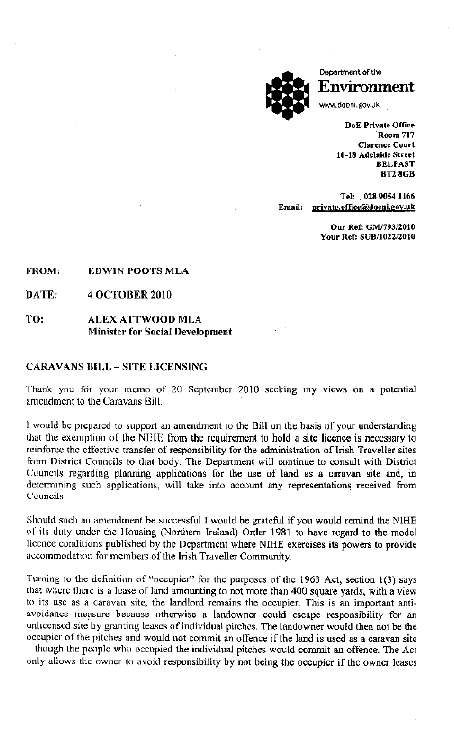

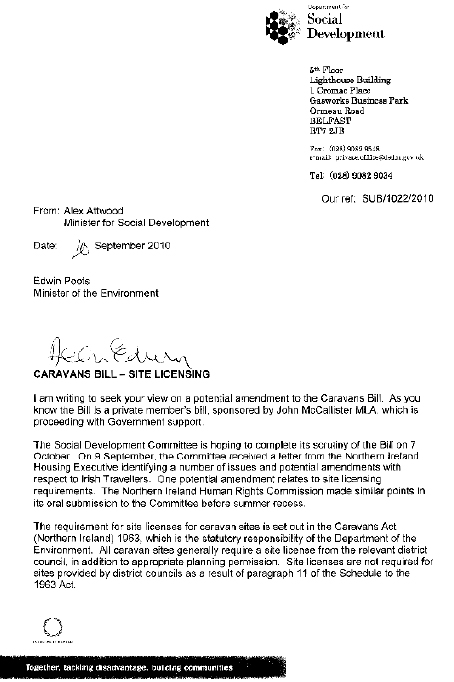
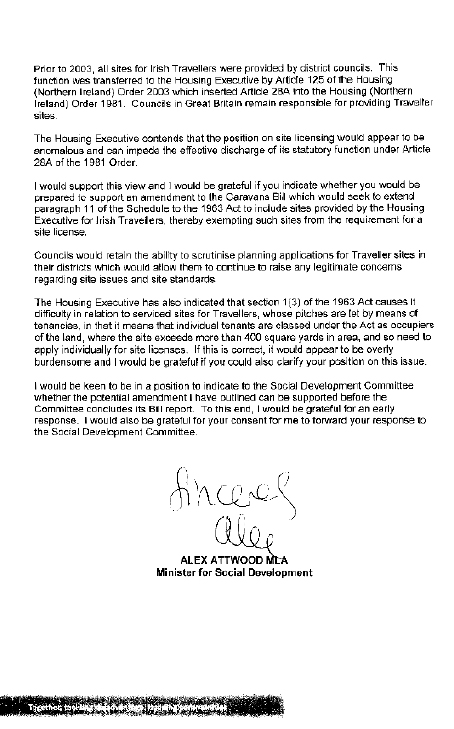
Mr Peter McCallion
Committee Clerk
Social Development Committee
Room 412
Parliament Buildings
Belfast
BT4 3XX
Dear Peter 6 October 2010
I refer to your letter of 29 September, on behalf of the Social Development Committee, addressed to David Livingstone and requesting clarification of the rights and responsibilities of seasonal caravan site owners and caravan owners in respect of the removal of a caravan from a holiday site.
When a holiday caravan owner decides to leave a caravan park and sell their caravan either on its existing pitch or off the site (which will require it being transported elsewhere) the legal situation is somewhat different to that which would normally apply to the sale of, for example, a car.
The law ordinarily allows purchasers to sell on, or `assign', to someone else what they have bought. The position with caravans, as indicated above, is not quite so straightforward, because while the caravan belongs to its owner, the pitch on which it is sited belongs to the park owner.
The caravan owner normally has a licence, granted by the park owner, to site the caravan on a pitch. If the caravan owner wishes to sell the caravan with the benefit of the unexpired portion of the licence, the park owner's consent may be required. Terms that seek to prevent the caravan owner from selling, giving or bequeathing the caravan to another suitable person (with the benefit of the unexpired portion of the licence) may be considered unfair. Unfair terms have no legal effect and cannot be enforced by park owners against caravan owners.
Park owners have a legitimate interest in preventing caravans on their parks from passing into the hands of unsuitable caravan owners, and are legitimately entitled to carry out checks as to the suitability of incoming owners. Proper control over the park is in the collective interests of the other caravan owners, but such control must be exercised reasonably by the park owner and not in an arbitrary manner.
A park owner may reserve the right to approve the prospective buyer, but should not withhold, or delay, approval unreasonably. Also, although there is no objection to park owners seeking first refusal on the caravan, at a fair price, they are expected to deal fairly with caravan owners and not to hinder private sales. If a park owner reserves a pre-emptive right to buy the caravan at a fair price, that right should only be exercisable for a short time. Any commission for the sale of the caravan which is charged to the caravan owner, must be clear and prominently set out in the holiday caravan agreement.
Any term requiring the caravan owner to sell the caravan only to the park owner would be deemed unfair. In addition, any requirement that the caravan owner must sell a caravan only through the park owner or an appointed agent may well be capable of causing financial detriment to caravan owners. In these circumstances, in order to reduce the potential for unfairness, the relevant terms must be not only in plain and intelligible language, but also be very clearly explained before the consumer enters the agreement.
If a caravan owner wishes to end their contractual arrangement with the park owner and remove the caravan from the site they should be free to do so.Park owners may, however, impose restrictions where required to do so by the site licence, health and safety legislation etc, so long as the restrictions properly and accurately reflect the requirements placed on park owners.
Park owners should not seek to be the sole suppliers of services (such as removal services) or restrict the choice of suppliers unreasonably. Terms which compel caravan owners to purchase removal services from specific sources (e.g. the park owner) are likely to be deemed uncompetitive and, consequently, unfair. This would extend to any contract terms that give park owners any kind of monopoly over the supply of goods or services that caravan owners are required to buy.
Terms, for example, that require caravan owners only to use approved contractors or maintenance staff supplied by the park owner, and that seek to enforce this by denying competent (and properly qualified, insured etc) contractors access to the park without a valid reason, are likely to be deemed unfair.
It is legitimate for park owners to reasonably restrict access to their premises for the supply of services (such as removal of caravans) on grounds relating to safety or public liability. Park owners may lawfully, therefore, place restrictions on contractors' commercial vehicles entering the park, but they must act reasonably in doing so.
Park owners will also clearly have an interest in ensuring that work carried out by contractors is to a reasonable standard, particularly where this work may affect other caravan owners or the safety or amenity of the park. Terms stating that such work needs the park owner's approval, are likely to be deemed unfair where such approval is unreasonably withheld.
Any contract terms in holiday caravan agreements which are thought to be unfair can be reported to the Trading Standards Service (TSS) (via Consumerline – Northern Irelands' Consumer Advice Telephone Helpline) on 0300 123 6262. TSS will investigate the allegations of unfairness with the Holiday Caravan Park owner concerned and, where the complaint is justified, require the offending terms to be removed from the contract in question. TSS can also take criminal legal proceedings against park owners who engage in unfair or aggressive commercial practices.
David McCune
Departmental Assembly Liaison Officer
(on behalf of DETI Consumer Affairs/Trading Standards Service)
From: Stephen Martin
Housing Division
Peter McCallion |
2nd Floor |
Peter McCallion
Room 412
Parliament Buildings
Ballymiscaw
Stormont
Belfast
BT4 3XX 7 October 2010
Dear Peter
1. Thank you for your letters of 21 September and 28 September. I understand that you also received a copy of a letter from Professor McWilliams, Chief Commissioner of the Northern Ireland Human Rights Commission, to the Minister dated 22 September (and received in the Department on 28 September).
2. My letter deals with all three pieces of correspondence.
3. In your letter of 21 September, you asked for the Department's view on a proposed amendment to clause 1(1)(b). This same issue was covered in the Minister's correspondence with the Human Rights Commission.
4. The Caravans Bill is designed to improve security of 'tenure' for residential caravan owners on protected sites (primarily through Part 1 of the Bill and the related Schedule) and improve the effectiveness of existing regulation for static holiday caravan owners by requiring written statements to be provided.
5. However, many Irish Travellers also use caravans as their main or only residence on protected sites and as a result, many of the Bill's provisions also extend to Travellers. This has created difficulties in reconciling the Bill's primary focus with its largely unintended wider impact on Traveller sites.
6. Following correspondence with the Human Rights Commission, the Department is proposing to move forward with three amendments designed to help ensure that the Bill is also workable in terms of Traveller sites and does not create unintended consequences which undermine the policy intention behind the provision of such sites and their effective operation. These amendments are as follows:
7. The extension of the qualifying period will greatly aid the Housing Executive in maintaining the integrity of transit and emergency/halting sites as sites for temporary use to facilitate a desire by many Travellers for a nomadic lifestyle while avoiding any discernible impact on park home owners for whom Part 1 of the Bill was intended.
8. It should be noted though that this approach, while preferable to the current three month period, still carries with it a residual legal risk that a court might decide to grant security of tenure on transitory sites if the 'resident' remains, with the tacit or explicit approval of the Executive, for more than one year.
9. The Housing Executive is concerned that some of the Bill's provisions on succession could lead to a situation where pitches on Traveller sites remain empty while need among the Traveller community for sites becomes more acute.
10. Clause 5(3)(b) makes provision for succession to a pitch in circumstances where there is no surviving family member residing with the caravan owner on their death. A non-resident family member of a social tenant in the same circumstances would not be able to succeed to a social tenancy and there are clear need-based grounds for exempting the Housing Executive's Traveller sites from the scope of clause 5(3)(b).
11. The Human Rights Commission has indicated a view that such a provision could be justified but has suggested the application of a qualified exemption for Housing Executive sites from this provision. This would mean that the amendment would allow the Housing Executive structured discretion to apply clause 5(3)(b) where it is satisfied that the successor is a Traveller who intends to use the caravan as their only or main residence. In these cases, the successor will be bound by the standard requirement to reside in the caravan and the Housing Executive will be able to take eviction action if the successor fails to do so.
12. Paragraph 10 of Part 1 of the Schedule enables a site owner to require a residential caravan owner to move their caravan to another pitch on the same site to allow essential repairs or emergency works to be carried out. The Housing Executive has requested that this is broadened to enable caravans to be moved to a comparable pitch on another site for a wider range of repairs, including repairs to site amenities, such as washing facilities. As this change would apply to all residential caravans, the Commission has indicated that it does not engage human rights issues and the Department would propose to make the relevant amendments.
13. The Housing Executive also proposed an amendment to the provisions in relation to the assignment of the residential agreement. The Commission has advised that such an amendment is likely to be problematic and for this reason, the Department does not intend to move forward with any amendments in this area.
14. In your letter of 28 September, you raised two issues:
15. It is implicit that all Departments review the impact of legislation for which they are responsible as part of their normal business and it is not usually regarded as appropriate or necessary to include in primary legislation a specific duty on a Department to review legislation.
16. However, it is notable that clause 24 of the Wildlife Bill, currently in the Assembly, places a duty on the Department of the Environment to review Schedules of the Wildlife Order (Northern Ireland) 1985 which deal with wildlife protection measures at least once every five years with a view to determining whether that Department should use its powers to make any amendments to those Schedules by subordinate legislation.
17. The substance of the policy relating to residential caravan agreements is in the Schedule to the Caravans Bill. Clause 4 of the Caravans Bill provides the Department with powers to amend this Schedule, and make any necessary consequential amendments to Part 1 of the Bill, by subordinate legislation subject to the draft affirmative resolution procedure.
18. These powers are similar to those of DOE in the example I have given above and the model of the Wildlife Bill could be replicated to achieve the aim outlined in your letter.
19. While the Department intends to review the impact of the provisions in the Bill relating to residential caravans as a matter of course, it would be prepared to consider including in the Bill a similar provision to clause 24 of the Wildlife Bill as a clear indication of the Department's good faith on this issue.
20. Paragraph 8(9) of Part 1 of the Schedule deals with commission to be paid to the site owner on the sale of a residential caravan. Mr McCallister's intention was that this commission should be pegged at a maximum of 10%, however this is not fully reflected in the Bill as drafted. The Committee has also asked that if the site owner and caravan owner agree a lower figure at the outset that this should be reflected in the residential agreement.
21. The Department has dealt with the issue of maximum commission by way of amendment. The other suggested amendment is more problematic and, following discussions with the legislative draftsman, it is difficult to see a way forward without undermining a fundamental principle of the Bill which is that express terms cannot override the implied terms set out in the Schedule. This is a somewhat complex technical issue which I would be happy to explain to the Committee in more detail.
22. The Human Rights Commission has also suggested that given the different nature of Traveller sites, paragraph 8(9) should not apply on such sites. This seems to be a sensible proposal and an amendment to this effect has been drafted.
23. The Department has worked with the Office of Legislative Counsel on the proposed amendments outlined and I am forwarding the text of these with this letter.
24. I hope the Committee finds this response helpful. I am also forwarding a copy of the letter to John McCallister MLA.
Yours sincerely,

cc: Margaret Sisk, Billy Crawford, Gareth McKinty, Stephen Baird
Committee for Enterprise, Trade & Investment
Room 424
Parliament Buildings
Tel: +44 (0)28 90522 1230
Fax: +44 (0) 28 9052 1355
To: Peter McCallion
Clerk to the Social Development Committee.
From: Jim McManus
Clerk to the Committee for Enterprise, Trade & Investment.
Date: 11 October 2010
1. At its meeting of 7 October, the Committee for Enterprise, Trade & Investment considered the issue of a proposed amendment to the Caravans Bill that would recognise a "caravan owners' association" for the holiday/seasonal sector, similar to that in the residential sector.
2. Members agreed to write to the Committee for Social Development to convey their views on the proposed amendment.
3. The was consensus that the Committee is sympathetic to the formation and operation of such associations, but there was division on whether associations should be statutorily recognised. The Committee did not therefore reach a formal view on the proposed amendment.
4. I would be grateful if you would bring this information to the attention of your Committee members.
5. Please feel free to contact me if you have any questions.
From: Stephen Martin
Housing Division
Peter McCallion |
2nd Floor Telephone: 028 9082 9267 |
19 October 2010
Dear Peter
1. Thank you for your letter of 8 October.
2. In its letter to the Committee of 9 September, the Housing Executive expressed its concern that the Caravans Bill as drafted posed challenges for its management of sites for Travellers and had the potential to bring transit and emergency/halting sites inappropriately within the provisions of Part 1 of the Bill.
3. The proposed amendments recently submitted by the Department largely address the Housing Executive's concerns in a way which has been deemed to be compatible with the European Convention on Human Rights.
4. The amendment in clause 1 to change the 'entitlement' period from 3 months to one year will aid the NIHE by providing space for it to put in place measures to ensure the integrity of transit sites and emergency / halting sites as sources of temporary accommodation to facilitate the desire among some Travellers to live a traditional, nomadic lifestyle.
5. If clause 1 is amended as proposed, Part 1 of the Bill will apply to those entitled to station their caravan on a protected site, and occupy it as their main or only residence, for more than one year. This should be distinguished from those who station caravans on the basis of a license to occupy on a transit or emergency/halting site (licenses which are for three months and twenty-eight days respectively).
6. Your letter raises two issues: firstly, whether the amendment to clause 1 will better safeguard the long-term policy objective of maintaining transit and emergency/halting sites for nomadic use and secondly, the actions that the Housing Executive will take to mitigate the identified residual legal risk.
7. The question of entitlement alluded to earlier is important and the amendment to clause 1 is designed to reasonably ensure that Part 1 only applies to Travellers living on serviced sites which are akin to park homes for which Part 1 was intended. This amendment aims to support the policy intention of maintaining transit and emergency/halting sites to facilitate the desire of many Travellers for a nomadic lifestyle.
8. The Housing Executive is mindful of its statutory responsibilities in relation to Traveller sites which flow from Article 28A of the Housing (Northern Ireland) Order 1981. The Housing Executive will continue to work towards the identification, procurement and development of additional transit (and other) sites to meet the identifiable need for the Irish Traveller population. To this end, the Housing Executive has commenced a comprehensive review of all Housing Executive and publicly owned land.
9. In relation to potential action in respect of a site, the NIHE will continue to consider each case on its circumstances, consistent with principles of public law and its wider policy considerations.
10. The Caravans Bill represents a significant step forward in the protection of park home owners and holiday caravan owners. It will also offer protections to Travellers living in similar circumstances. The proposed amendments are intended to further support these aims and address the points raised by the Housing Executive in its letter to the Committee dated 9 September.
11. I hope the Committee finds this response helpful. I am also forwarding a copy of the letter to John McCallister MLA.
Yours sincerely,

Stephen Martin
cc: Margaret Sisk
Billy Crawford
Gareth McKinty
Stephen Baird
( ) (1 ) In any seasonal agreement there shall be implied the terms set out in schedule 2; and this subsection shall have effect notwithstanding any express term of the agreement.
Power to amend implied terms
( ) (1) The Department of Enterprise, Trade and Investment may by order make such amendments to Schedule 2 as that Department considers appropriate.
(2) An order under this section may contain such incidental, supplementary, consequential, transitional or saving provisions as that Department considers appropriate and may in particular
(3) An order under this section may in particular –
(a) make such amendments of any provision of this Part as that Department considers appropriate in consequence of any amendment made by the order to Schedule 2.
(4) No order may be made under this section unless the Department of Enterprise, Trade and Investment has consulted –
(a) such organisations as appear to it to be representative of interests substantially affected by the order; and
(b) such other persons as it considers appropriate.
(5) No order may be made under this section unless a draft of the order has been laid before, and approved by a resolution of, the Assembly.
1. – (1) A caravan owners' association is a qualifying caravan owners' association in relation to a seasonal site if –
(a) it is an association representing the occupiers of caravans on that site;
(b) at least 50 per cent. of the occupiers of the caravans on that site are members of the association;
(c) it is independent from the owner, who together with any agent or employee of the owner is excluded from membership;
(d) subject to paragraph (c), membership is open to all occupiers who own a caravan on that site and are entitled to an agreement under clause 7(1);
(e) it maintains a list of members which is open to public inspection together with the rules and constitution of the residents' association;
(f) it has a chairman, secretary and treasurer who are elected by and from among the members on an annual basis at the Annual General meeting;
(g) with the exception of administrative decisions taken by the chairman, secretary and treasurer acting in their official capacities, decisions are taken by voting and there is only one vote for each caravan; and
(2) When calculating the percentage of occupiers for the purpose of sub-paragraph (1)(b), each caravan shall be taken to have only one occupier and, in the event of there being more than one occupier of a caravan, its occupier is to be taken to be the occupier whose name first appears on the agreement.
2. – (1) The owner shall consult a qualifying caravan owners' association, if there is one, about
(a) significant changes to the operation and management of, or improvements to, the seasonal site which affect the occupiers either directly or indirectly; and
(b) changes to site fees or service fees.
3.- For the purposes of paragraph 2, to "consult" a qualifying caravan owners' association means –
(a) to give the association at least 28 days' notice in writing of the matters referred to in paragraph 2 which –
(i) describes the matters and how they may affect the occupiers either directly or indirectly in the long and short term; and
(ii) states when and where the association can make representations about the matters.
( ) (1 ) In any seasonal agreement there shall be implied the terms set out in schedule 2; and this subsection shall have effect notwithstanding any express term of the agreement.
(2) If the owner fails to comply with schedule 2(2) and 2(3) the occupier may apply to the court for an order requiring the owner to consult with the occupier in accordance with schedule 2(2) and 2(3).
( ) (1) The county court for the county court division in which the seasonal site is situated shall have jurisdiction –
(a) to determine any question arising under this Part or any seasonal agreement, and
(b) to entertain any proceedings brought under this Part or any such agreement;
and references in this Part to "the court" shall be construed accordingly.
(2) But where the parties have agreed in writing to submit any question arising under this Part or, as the case may be, any seasonal agreement to arbitration, references in this Part to the court shall be read as references to the arbitrator.
( ) (1) The Department of Enterprise, Trade and Investment may by order make such amendments to Schedule 2 as that Department considers appropriate.
(2) An order under this section may contain such incidental, supplementary, consequential, transitional or saving provisions as that Department considers appropriate.
(3) An order under this section may in particular –
(a) make provision for or in connection with the determination by the court of such questions, or the making by the court of such orders, as are specified in the order;
(b) make such amendments of any provision of this Part as that Department considers appropriate in consequence of any amendment made by the order to Schedule 2.
(4) No order may be made under this section unless the Department of Enterprise, Trade and Investment has consulted –
(a) such organisations as appear to it to be representative of interests substantially affected by the order; and
(b) such other persons as it considers appropriate.
(5) No order may be made under this section unless a draft of the order has been laid before, and approved by a resolution of, the Assembly.
1. – (1) A caravan owners' association is a qualifying caravan owners' association in relation to a seasonal site if –
(a) it is an association representing the occupiers of caravans on that site;
(b) at least 50 per cent. of the occupiers of the caravans on that site are members of the association;
(c) it is independent from the owner, who together with any agent or employee of the owner is excluded from membership;
(d) subject to paragraph (c), membership is open to all occupiers who own a caravan on that site and are entitled to an agreement under clause 7(1);
(e) it maintains a list of members which is open to public inspection together with the rules and constitution of the residents' association;
(f) it has a chairman, secretary and treasurer who are elected by and from among the members on an annual basis at the Annual General meeting;
(g) with the exception of administrative decisions taken by the chairman, secretary and treasurer acting in their official capacities, decisions are taken by voting and there is only one vote for each caravan; and
(2) When calculating the percentage of occupiers for the purpose of sub-paragraph (1)(b), each caravan shall be taken to have only one occupier and, in the event of there being more than one occupier of a caravan, its occupier is to be taken to be the occupier whose name first appears on the agreement.
2. – (1) The owner shall consult a qualifying caravan owners' association, if there is one, about
(a) significant changes to the operation and management of, or improvements to, the seasonal site which affect the occupiers either directly or indirectly; and
(b) changes to site fees or service fees.
3.- For the purposes of paragraph 2, to "consult" a qualifying caravan owners' association means –
(a) to give the association at least 28 days' notice in writing of the matters referred to in paragraph 2 which –
(i) describes the matters and how they may affect the occupiers either directly or indirectly in the long and short term; and
(ii) states when and where the association can make representations about the matters.
Peter
As discussed earlier, please find attached the Department's proposed amendment around site licensing and Traveller sites. The main amendment is the new Part 4A. The amendments to clause 11 and 15 are consequential amendments to the main amendment.
Stephen
Clause 11, page 8, line 42, after 'paragraph 11' insert 'or 11A'
Clause 11, page 8, line 43, after 'council' insert 'or provided and managed by the Housing Executive'
After clause 14 insert —
'PART 4A
LICENSING OF CARAVAN SITES
14A. In the Schedule to the Caravans Act (sites exempt from licensing) after paragraph 11 insert —
'SITES FOR IRISH TRAVELLER COMMUNITY
11A. A site licence shall not be required for the use as a caravan site of land provided and managed by the Northern Ireland Housing Executive under Article 28A of the Housing (Northern Ireland) Order 1981 (NI 3) (provision of caravan sites for Irish Traveller Community).'
Clause 15, page 10, line 19, leave out 'paragraph 11' and insert 'paragraphs 11 and 11A'
Mr Tony Beard British Holiday & Home Parks Association
Mr James Kennedy British Holiday & Home Parks Association
Ms Ros Pritchard British Holiday & Home Parks Association
Mr John Hinds Department for Enterprise, Trade and Investment
Mr David Livingstone Department for Enterprise, Trade and Investment
Mr Stephen Martin Department for Social Development
Mr Michael Sands Department for Social Development
Mr John Clement National Caravan Council
Ms Alicia Dunne National Caravan Council
Councillor Joan Baird Northern Ireland Local Government Association
Mr Kieran Doherty Northern Ireland Local Government Association
Mr John Walsh Northern Ireland Local Government Association
Mr Colm McQuillan Northern Ireland Housing Executive
Mr Connor Smith Northern Ireland Housing Executive
Mr Daniel Holder Northern Ireland Human Rights Commission
Mr Peter O'Neil Northern Ireland Human Rights Commission
Mrs Valerie Boyd Seahaven Residents' Association
Mrs Jean McCallan Seahaven Residents' Association
Mr John McCallister Bill Sponsor
Ms Annette Holden